Customer Service Perception and Hotel Operations
VerifiedAdded on 2020/07/23
|71
|30781
|41
AI Summary
This assignment involves analyzing customer perceptions of hotel services, including their expectations, loyalty factors, and preferences for differentiated services. It also explores the importance of staff behavior, cleanliness, and effective planning in hotel operations. Respondents provide insights on how hotels can improve their services to increase customer loyalty and satisfaction.
Contribute Materials
Your contribution can guide someone’s learning journey. Share your
documents today.
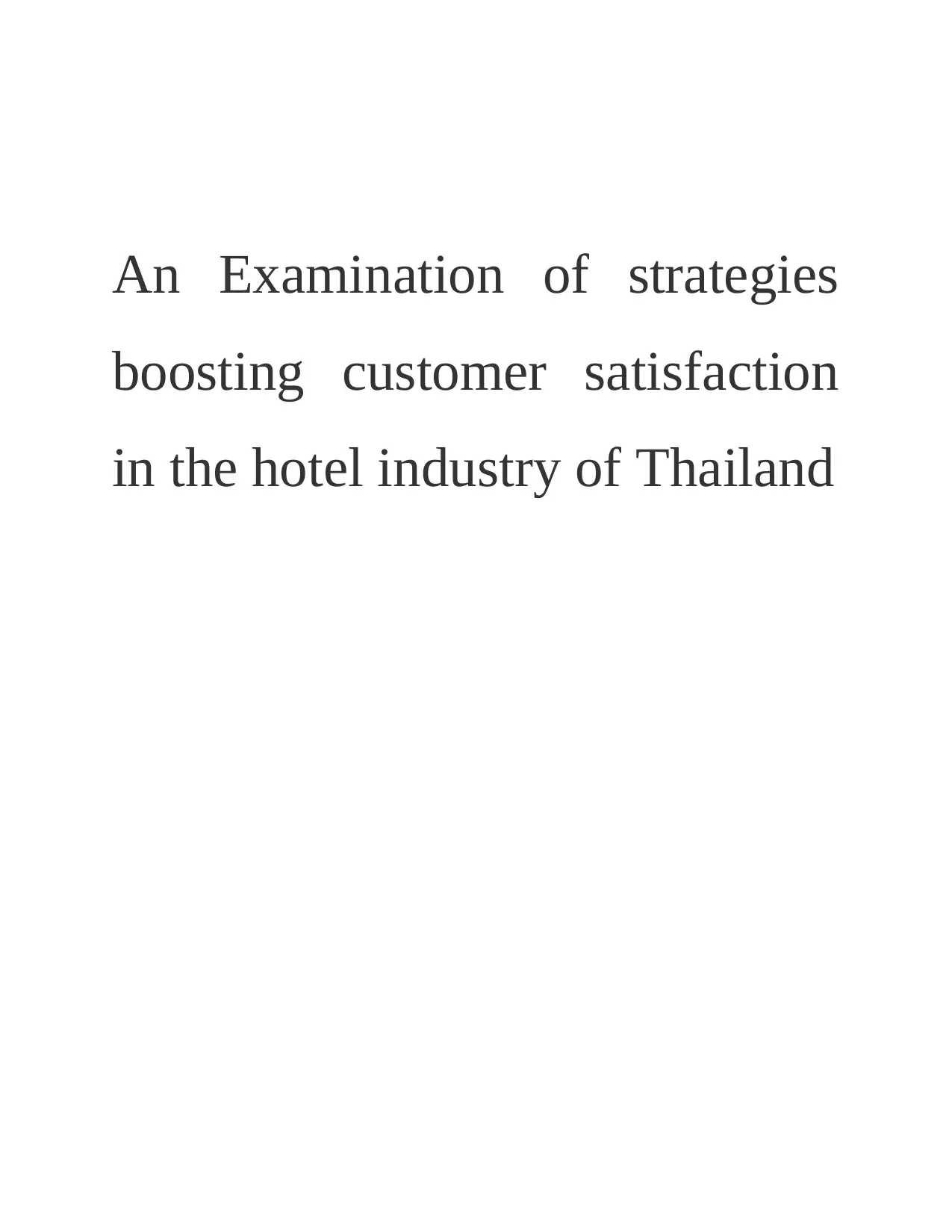
An Examination of strategies
boosting customer satisfaction
in the hotel industry of Thailand
boosting customer satisfaction
in the hotel industry of Thailand
Secure Best Marks with AI Grader
Need help grading? Try our AI Grader for instant feedback on your assignments.
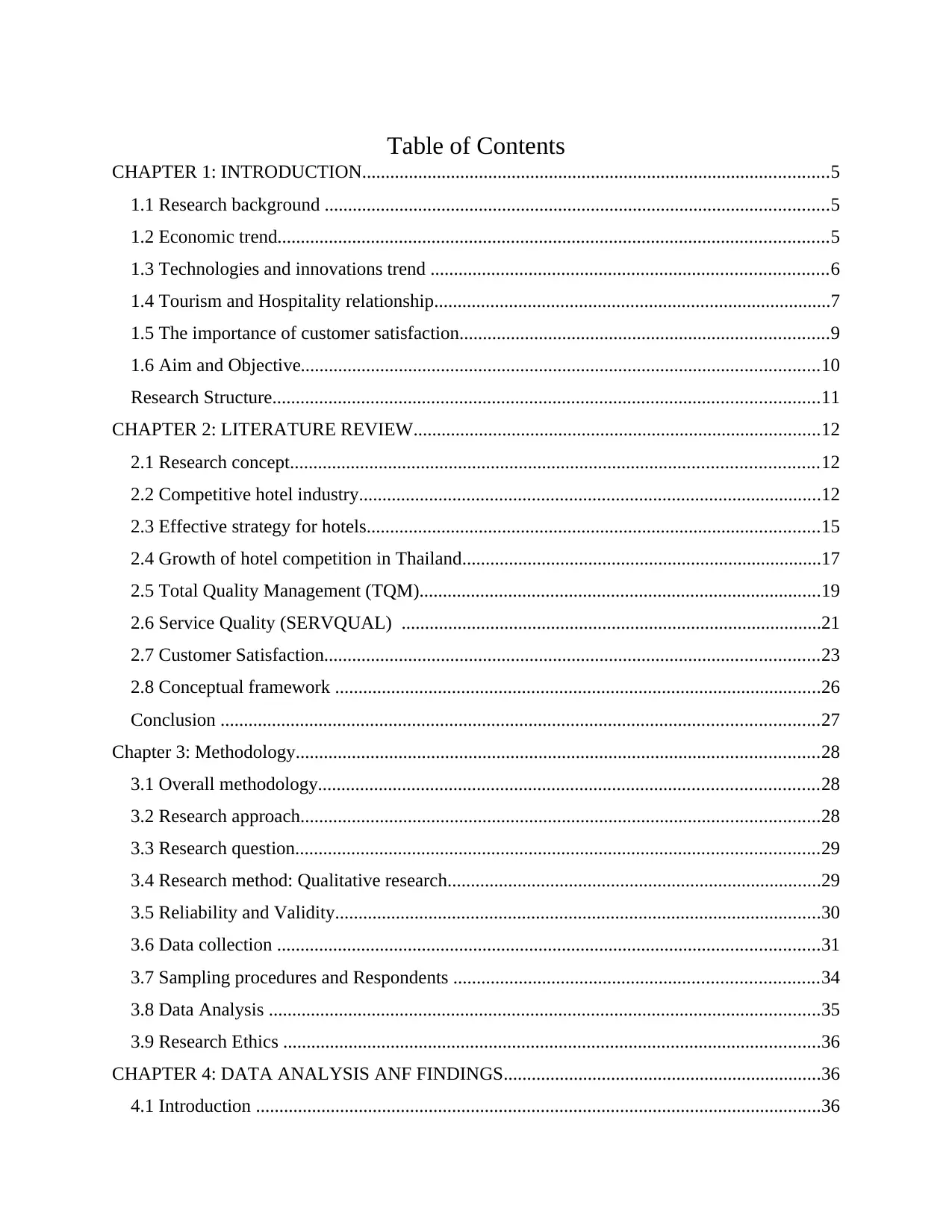
Table of Contents
CHAPTER 1: INTRODUCTION....................................................................................................5
1.1 Research background ............................................................................................................5
1.2 Economic trend......................................................................................................................5
1.3 Technologies and innovations trend .....................................................................................6
1.4 Tourism and Hospitality relationship.....................................................................................7
1.5 The importance of customer satisfaction...............................................................................9
1.6 Aim and Objective...............................................................................................................10
Research Structure.....................................................................................................................11
CHAPTER 2: LITERATURE REVIEW.......................................................................................12
2.1 Research concept.................................................................................................................12
2.2 Competitive hotel industry...................................................................................................12
2.3 Effective strategy for hotels.................................................................................................15
2.4 Growth of hotel competition in Thailand.............................................................................17
2.5 Total Quality Management (TQM)......................................................................................19
2.6 Service Quality (SERVQUAL) ..........................................................................................21
2.7 Customer Satisfaction..........................................................................................................23
2.8 Conceptual framework ........................................................................................................26
Conclusion ................................................................................................................................27
Chapter 3: Methodology................................................................................................................28
3.1 Overall methodology...........................................................................................................28
3.2 Research approach...............................................................................................................28
3.3 Research question................................................................................................................29
3.4 Research method: Qualitative research................................................................................29
3.5 Reliability and Validity........................................................................................................30
3.6 Data collection ....................................................................................................................31
3.7 Sampling procedures and Respondents ..............................................................................34
3.8 Data Analysis ......................................................................................................................35
3.9 Research Ethics ...................................................................................................................36
CHAPTER 4: DATA ANALYSIS ANF FINDINGS....................................................................36
4.1 Introduction .........................................................................................................................36
CHAPTER 1: INTRODUCTION....................................................................................................5
1.1 Research background ............................................................................................................5
1.2 Economic trend......................................................................................................................5
1.3 Technologies and innovations trend .....................................................................................6
1.4 Tourism and Hospitality relationship.....................................................................................7
1.5 The importance of customer satisfaction...............................................................................9
1.6 Aim and Objective...............................................................................................................10
Research Structure.....................................................................................................................11
CHAPTER 2: LITERATURE REVIEW.......................................................................................12
2.1 Research concept.................................................................................................................12
2.2 Competitive hotel industry...................................................................................................12
2.3 Effective strategy for hotels.................................................................................................15
2.4 Growth of hotel competition in Thailand.............................................................................17
2.5 Total Quality Management (TQM)......................................................................................19
2.6 Service Quality (SERVQUAL) ..........................................................................................21
2.7 Customer Satisfaction..........................................................................................................23
2.8 Conceptual framework ........................................................................................................26
Conclusion ................................................................................................................................27
Chapter 3: Methodology................................................................................................................28
3.1 Overall methodology...........................................................................................................28
3.2 Research approach...............................................................................................................28
3.3 Research question................................................................................................................29
3.4 Research method: Qualitative research................................................................................29
3.5 Reliability and Validity........................................................................................................30
3.6 Data collection ....................................................................................................................31
3.7 Sampling procedures and Respondents ..............................................................................34
3.8 Data Analysis ......................................................................................................................35
3.9 Research Ethics ...................................................................................................................36
CHAPTER 4: DATA ANALYSIS ANF FINDINGS....................................................................36
4.1 Introduction .........................................................................................................................36
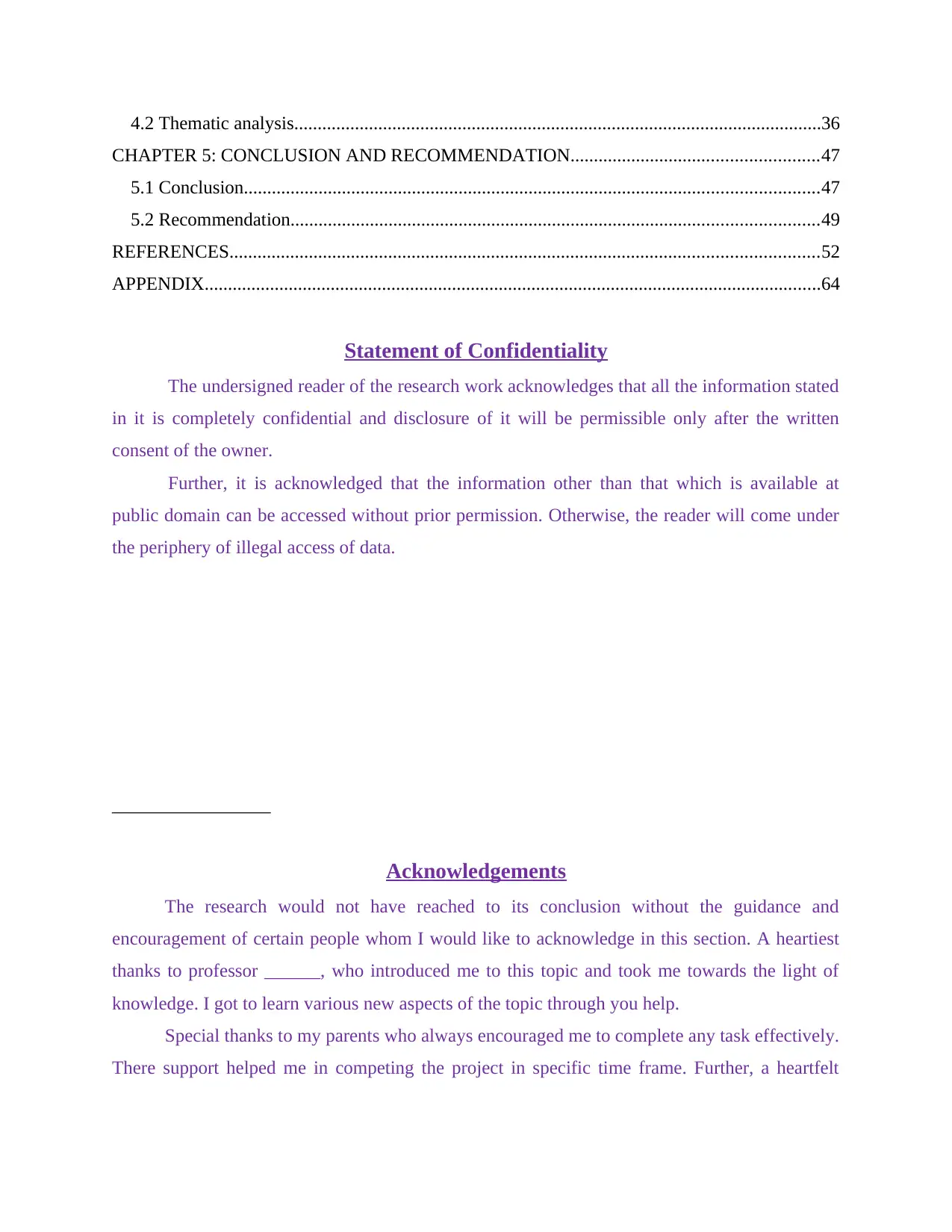
4.2 Thematic analysis.................................................................................................................36
CHAPTER 5: CONCLUSION AND RECOMMENDATION.....................................................47
5.1 Conclusion...........................................................................................................................47
5.2 Recommendation.................................................................................................................49
REFERENCES..............................................................................................................................52
APPENDIX....................................................................................................................................64
Statement of Confidentiality
The undersigned reader of the research work acknowledges that all the information stated
in it is completely confidential and disclosure of it will be permissible only after the written
consent of the owner.
Further, it is acknowledged that the information other than that which is available at
public domain can be accessed without prior permission. Otherwise, the reader will come under
the periphery of illegal access of data.
_________________
Acknowledgements
The research would not have reached to its conclusion without the guidance and
encouragement of certain people whom I would like to acknowledge in this section. A heartiest
thanks to professor ______, who introduced me to this topic and took me towards the light of
knowledge. I got to learn various new aspects of the topic through you help.
Special thanks to my parents who always encouraged me to complete any task effectively.
There support helped me in competing the project in specific time frame. Further, a heartfelt
CHAPTER 5: CONCLUSION AND RECOMMENDATION.....................................................47
5.1 Conclusion...........................................................................................................................47
5.2 Recommendation.................................................................................................................49
REFERENCES..............................................................................................................................52
APPENDIX....................................................................................................................................64
Statement of Confidentiality
The undersigned reader of the research work acknowledges that all the information stated
in it is completely confidential and disclosure of it will be permissible only after the written
consent of the owner.
Further, it is acknowledged that the information other than that which is available at
public domain can be accessed without prior permission. Otherwise, the reader will come under
the periphery of illegal access of data.
_________________
Acknowledgements
The research would not have reached to its conclusion without the guidance and
encouragement of certain people whom I would like to acknowledge in this section. A heartiest
thanks to professor ______, who introduced me to this topic and took me towards the light of
knowledge. I got to learn various new aspects of the topic through you help.
Special thanks to my parents who always encouraged me to complete any task effectively.
There support helped me in competing the project in specific time frame. Further, a heartfelt
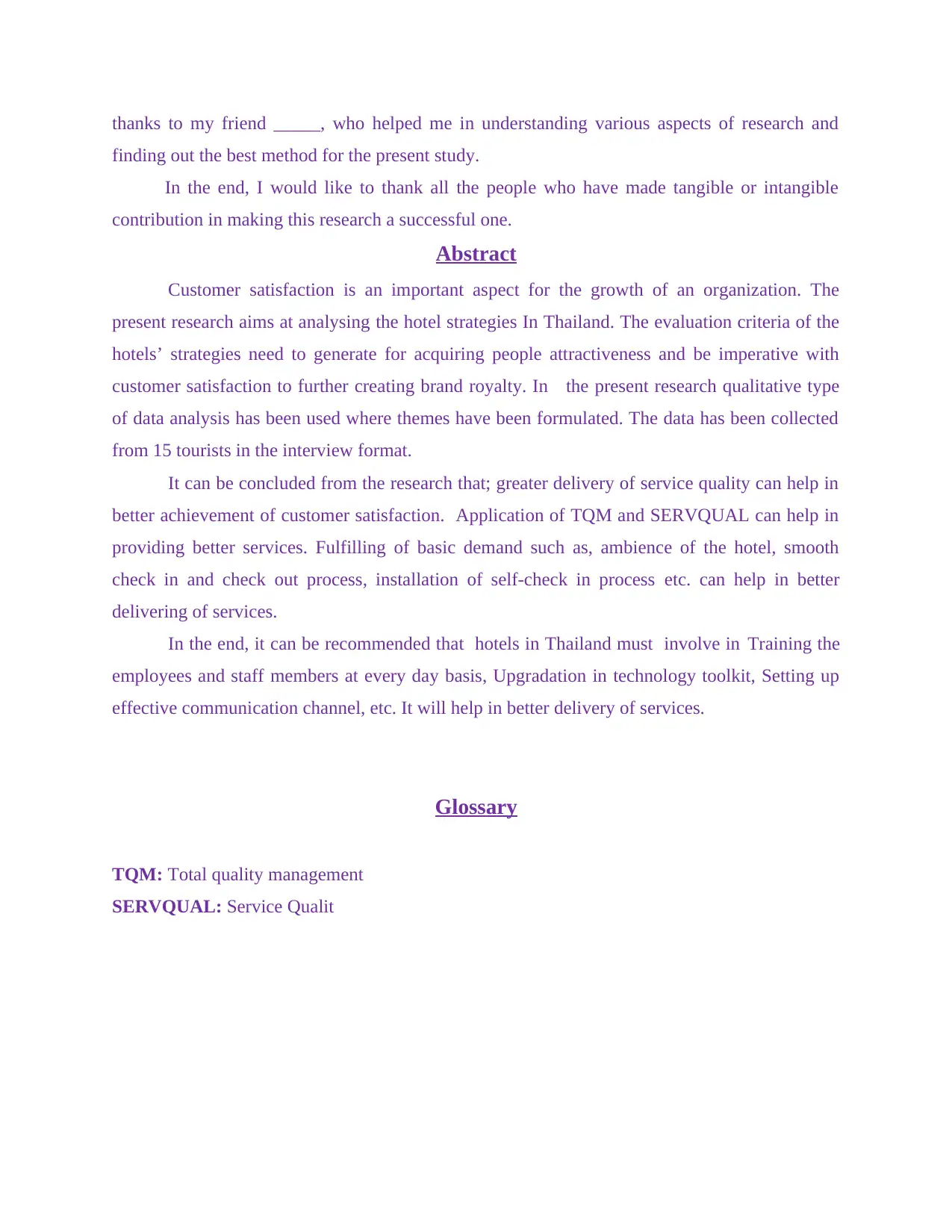
thanks to my friend _____, who helped me in understanding various aspects of research and
finding out the best method for the present study.
In the end, I would like to thank all the people who have made tangible or intangible
contribution in making this research a successful one.
Abstract
Customer satisfaction is an important aspect for the growth of an organization. The
present research aims at analysing the hotel strategies In Thailand. The evaluation criteria of the
hotels’ strategies need to generate for acquiring people attractiveness and be imperative with
customer satisfaction to further creating brand royalty. In the present research qualitative type
of data analysis has been used where themes have been formulated. The data has been collected
from 15 tourists in the interview format.
It can be concluded from the research that; greater delivery of service quality can help in
better achievement of customer satisfaction. Application of TQM and SERVQUAL can help in
providing better services. Fulfilling of basic demand such as, ambience of the hotel, smooth
check in and check out process, installation of self-check in process etc. can help in better
delivering of services.
In the end, it can be recommended that hotels in Thailand must involve in Training the
employees and staff members at every day basis, Upgradation in technology toolkit, Setting up
effective communication channel, etc. It will help in better delivery of services.
Glossary
TQM: Total quality management
SERVQUAL: Service Qualit
finding out the best method for the present study.
In the end, I would like to thank all the people who have made tangible or intangible
contribution in making this research a successful one.
Abstract
Customer satisfaction is an important aspect for the growth of an organization. The
present research aims at analysing the hotel strategies In Thailand. The evaluation criteria of the
hotels’ strategies need to generate for acquiring people attractiveness and be imperative with
customer satisfaction to further creating brand royalty. In the present research qualitative type
of data analysis has been used where themes have been formulated. The data has been collected
from 15 tourists in the interview format.
It can be concluded from the research that; greater delivery of service quality can help in
better achievement of customer satisfaction. Application of TQM and SERVQUAL can help in
providing better services. Fulfilling of basic demand such as, ambience of the hotel, smooth
check in and check out process, installation of self-check in process etc. can help in better
delivering of services.
In the end, it can be recommended that hotels in Thailand must involve in Training the
employees and staff members at every day basis, Upgradation in technology toolkit, Setting up
effective communication channel, etc. It will help in better delivery of services.
Glossary
TQM: Total quality management
SERVQUAL: Service Qualit
Secure Best Marks with AI Grader
Need help grading? Try our AI Grader for instant feedback on your assignments.
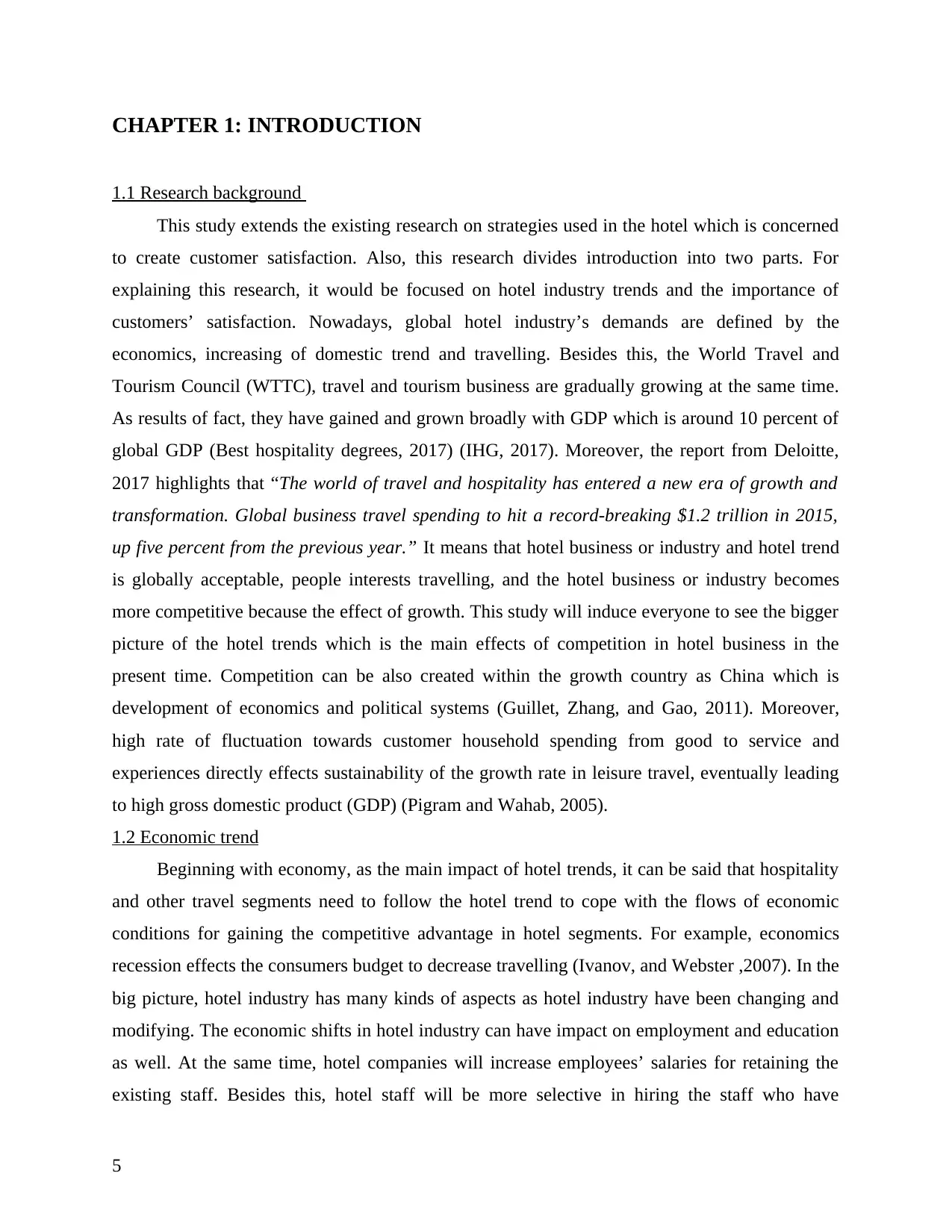
CHAPTER 1: INTRODUCTION
1.1 Research background
This study extends the existing research on strategies used in the hotel which is concerned
to create customer satisfaction. Also, this research divides introduction into two parts. For
explaining this research, it would be focused on hotel industry trends and the importance of
customers’ satisfaction. Nowadays, global hotel industry’s demands are defined by the
economics, increasing of domestic trend and travelling. Besides this, the World Travel and
Tourism Council (WTTC), travel and tourism business are gradually growing at the same time.
As results of fact, they have gained and grown broadly with GDP which is around 10 percent of
global GDP (Best hospitality degrees, 2017) (IHG, 2017). Moreover, the report from Deloitte,
2017 highlights that “The world of travel and hospitality has entered a new era of growth and
transformation. Global business travel spending to hit a record-breaking $1.2 trillion in 2015,
up five percent from the previous year.” It means that hotel business or industry and hotel trend
is globally acceptable, people interests travelling, and the hotel business or industry becomes
more competitive because the effect of growth. This study will induce everyone to see the bigger
picture of the hotel trends which is the main effects of competition in hotel business in the
present time. Competition can be also created within the growth country as China which is
development of economics and political systems (Guillet, Zhang, and Gao, 2011). Moreover,
high rate of fluctuation towards customer household spending from good to service and
experiences directly effects sustainability of the growth rate in leisure travel, eventually leading
to high gross domestic product (GDP) (Pigram and Wahab, 2005).
1.2 Economic trend
Beginning with economy, as the main impact of hotel trends, it can be said that hospitality
and other travel segments need to follow the hotel trend to cope with the flows of economic
conditions for gaining the competitive advantage in hotel segments. For example, economics
recession effects the consumers budget to decrease travelling (Ivanov, and Webster ,2007). In the
big picture, hotel industry has many kinds of aspects as hotel industry have been changing and
modifying. The economic shifts in hotel industry can have impact on employment and education
as well. At the same time, hotel companies will increase employees’ salaries for retaining the
existing staff. Besides this, hotel staff will be more selective in hiring the staff who have
5
1.1 Research background
This study extends the existing research on strategies used in the hotel which is concerned
to create customer satisfaction. Also, this research divides introduction into two parts. For
explaining this research, it would be focused on hotel industry trends and the importance of
customers’ satisfaction. Nowadays, global hotel industry’s demands are defined by the
economics, increasing of domestic trend and travelling. Besides this, the World Travel and
Tourism Council (WTTC), travel and tourism business are gradually growing at the same time.
As results of fact, they have gained and grown broadly with GDP which is around 10 percent of
global GDP (Best hospitality degrees, 2017) (IHG, 2017). Moreover, the report from Deloitte,
2017 highlights that “The world of travel and hospitality has entered a new era of growth and
transformation. Global business travel spending to hit a record-breaking $1.2 trillion in 2015,
up five percent from the previous year.” It means that hotel business or industry and hotel trend
is globally acceptable, people interests travelling, and the hotel business or industry becomes
more competitive because the effect of growth. This study will induce everyone to see the bigger
picture of the hotel trends which is the main effects of competition in hotel business in the
present time. Competition can be also created within the growth country as China which is
development of economics and political systems (Guillet, Zhang, and Gao, 2011). Moreover,
high rate of fluctuation towards customer household spending from good to service and
experiences directly effects sustainability of the growth rate in leisure travel, eventually leading
to high gross domestic product (GDP) (Pigram and Wahab, 2005).
1.2 Economic trend
Beginning with economy, as the main impact of hotel trends, it can be said that hospitality
and other travel segments need to follow the hotel trend to cope with the flows of economic
conditions for gaining the competitive advantage in hotel segments. For example, economics
recession effects the consumers budget to decrease travelling (Ivanov, and Webster ,2007). In the
big picture, hotel industry has many kinds of aspects as hotel industry have been changing and
modifying. The economic shifts in hotel industry can have impact on employment and education
as well. At the same time, hotel companies will increase employees’ salaries for retaining the
existing staff. Besides this, hotel staff will be more selective in hiring the staff who have
5
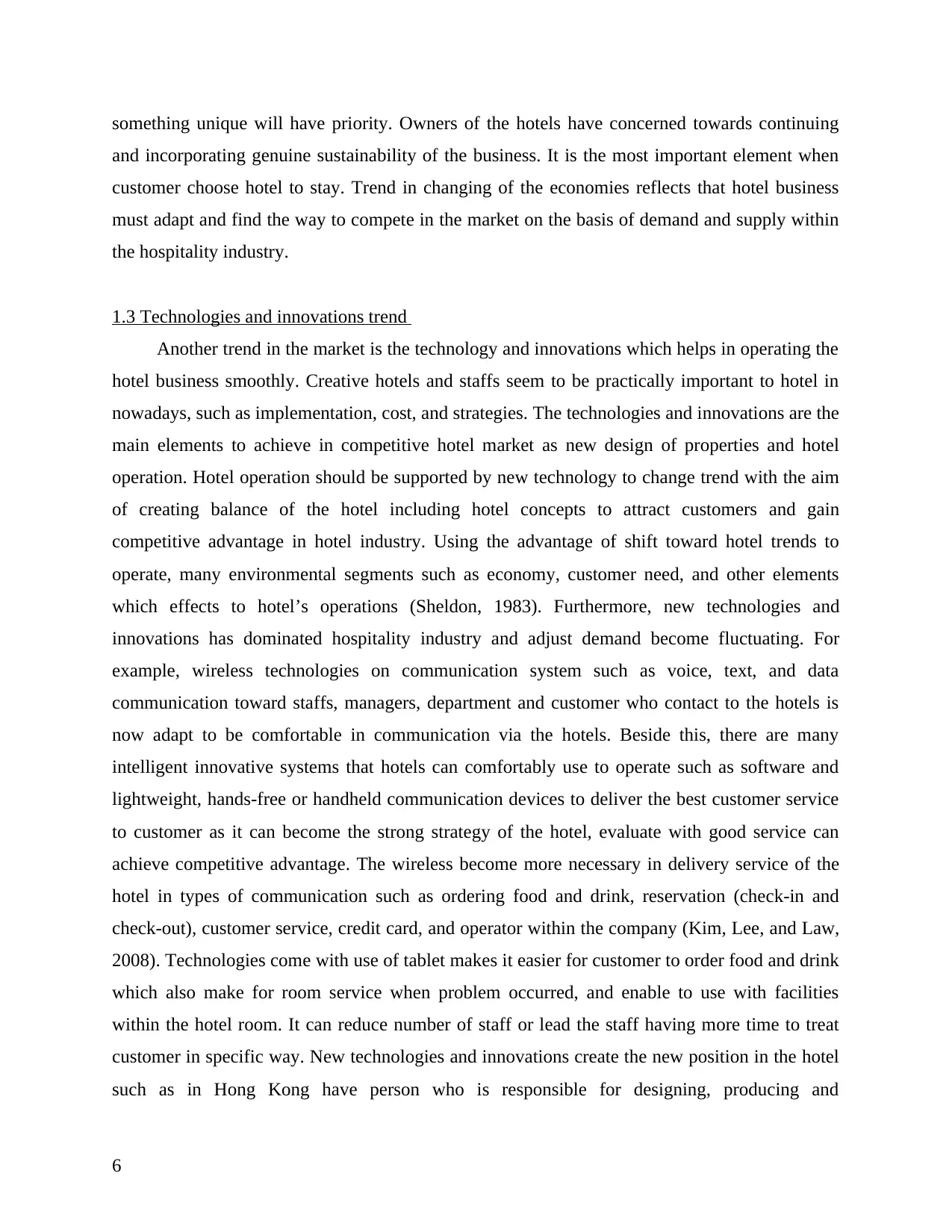
something unique will have priority. Owners of the hotels have concerned towards continuing
and incorporating genuine sustainability of the business. It is the most important element when
customer choose hotel to stay. Trend in changing of the economies reflects that hotel business
must adapt and find the way to compete in the market on the basis of demand and supply within
the hospitality industry.
1.3 Technologies and innovations trend
Another trend in the market is the technology and innovations which helps in operating the
hotel business smoothly. Creative hotels and staffs seem to be practically important to hotel in
nowadays, such as implementation, cost, and strategies. The technologies and innovations are the
main elements to achieve in competitive hotel market as new design of properties and hotel
operation. Hotel operation should be supported by new technology to change trend with the aim
of creating balance of the hotel including hotel concepts to attract customers and gain
competitive advantage in hotel industry. Using the advantage of shift toward hotel trends to
operate, many environmental segments such as economy, customer need, and other elements
which effects to hotel’s operations (Sheldon, 1983). Furthermore, new technologies and
innovations has dominated hospitality industry and adjust demand become fluctuating. For
example, wireless technologies on communication system such as voice, text, and data
communication toward staffs, managers, department and customer who contact to the hotels is
now adapt to be comfortable in communication via the hotels. Beside this, there are many
intelligent innovative systems that hotels can comfortably use to operate such as software and
lightweight, hands-free or handheld communication devices to deliver the best customer service
to customer as it can become the strong strategy of the hotel, evaluate with good service can
achieve competitive advantage. The wireless become more necessary in delivery service of the
hotel in types of communication such as ordering food and drink, reservation (check-in and
check-out), customer service, credit card, and operator within the company (Kim, Lee, and Law,
2008). Technologies come with use of tablet makes it easier for customer to order food and drink
which also make for room service when problem occurred, and enable to use with facilities
within the hotel room. It can reduce number of staff or lead the staff having more time to treat
customer in specific way. New technologies and innovations create the new position in the hotel
such as in Hong Kong have person who is responsible for designing, producing and
6
and incorporating genuine sustainability of the business. It is the most important element when
customer choose hotel to stay. Trend in changing of the economies reflects that hotel business
must adapt and find the way to compete in the market on the basis of demand and supply within
the hospitality industry.
1.3 Technologies and innovations trend
Another trend in the market is the technology and innovations which helps in operating the
hotel business smoothly. Creative hotels and staffs seem to be practically important to hotel in
nowadays, such as implementation, cost, and strategies. The technologies and innovations are the
main elements to achieve in competitive hotel market as new design of properties and hotel
operation. Hotel operation should be supported by new technology to change trend with the aim
of creating balance of the hotel including hotel concepts to attract customers and gain
competitive advantage in hotel industry. Using the advantage of shift toward hotel trends to
operate, many environmental segments such as economy, customer need, and other elements
which effects to hotel’s operations (Sheldon, 1983). Furthermore, new technologies and
innovations has dominated hospitality industry and adjust demand become fluctuating. For
example, wireless technologies on communication system such as voice, text, and data
communication toward staffs, managers, department and customer who contact to the hotels is
now adapt to be comfortable in communication via the hotels. Beside this, there are many
intelligent innovative systems that hotels can comfortably use to operate such as software and
lightweight, hands-free or handheld communication devices to deliver the best customer service
to customer as it can become the strong strategy of the hotel, evaluate with good service can
achieve competitive advantage. The wireless become more necessary in delivery service of the
hotel in types of communication such as ordering food and drink, reservation (check-in and
check-out), customer service, credit card, and operator within the company (Kim, Lee, and Law,
2008). Technologies come with use of tablet makes it easier for customer to order food and drink
which also make for room service when problem occurred, and enable to use with facilities
within the hotel room. It can reduce number of staff or lead the staff having more time to treat
customer in specific way. New technologies and innovations create the new position in the hotel
such as in Hong Kong have person who is responsible for designing, producing and
6
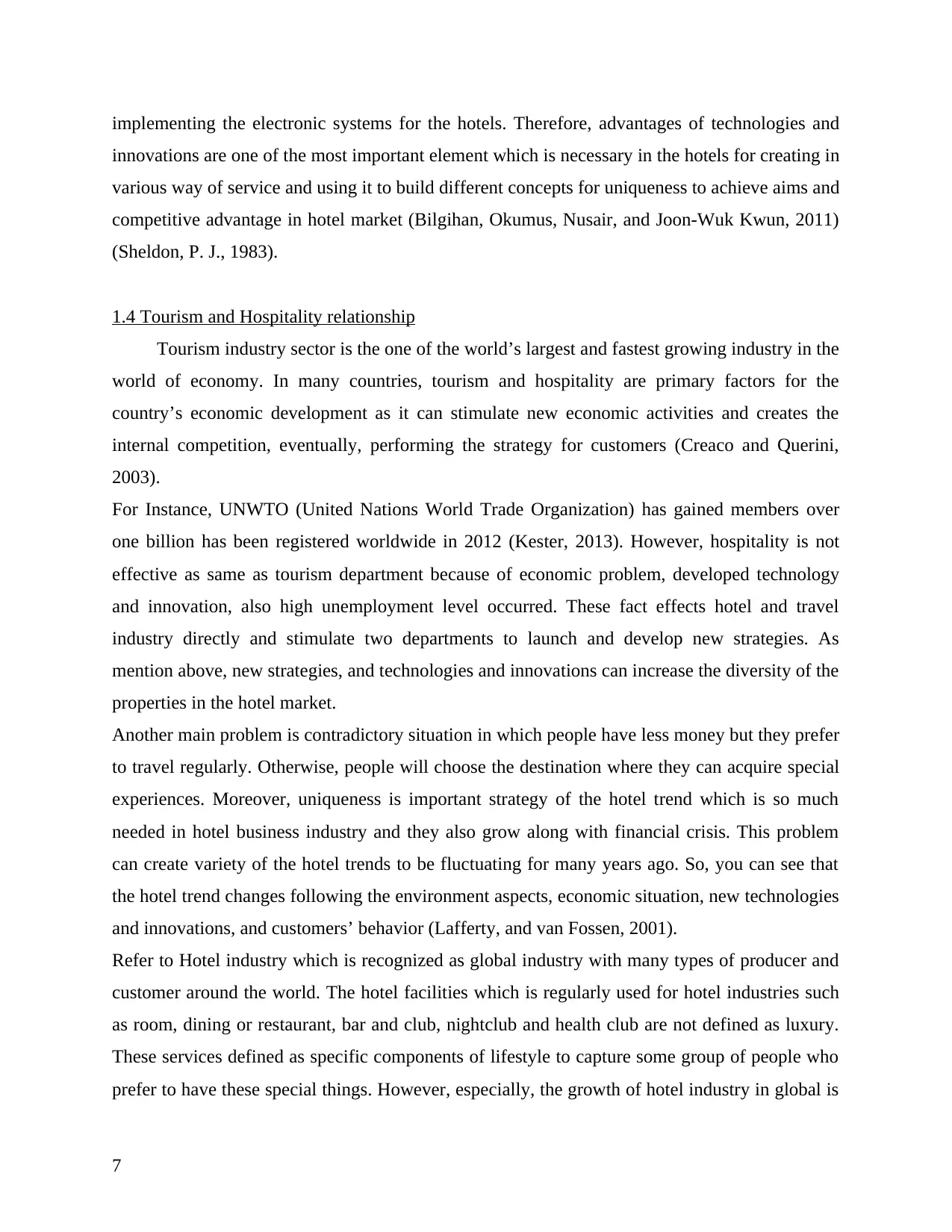
implementing the electronic systems for the hotels. Therefore, advantages of technologies and
innovations are one of the most important element which is necessary in the hotels for creating in
various way of service and using it to build different concepts for uniqueness to achieve aims and
competitive advantage in hotel market (Bilgihan, Okumus, Nusair, and Joon-Wuk Kwun, 2011)
(Sheldon, P. J., 1983).
1.4 Tourism and Hospitality relationship
Tourism industry sector is the one of the world’s largest and fastest growing industry in the
world of economy. In many countries, tourism and hospitality are primary factors for the
country’s economic development as it can stimulate new economic activities and creates the
internal competition, eventually, performing the strategy for customers (Creaco and Querini,
2003).
For Instance, UNWTO (United Nations World Trade Organization) has gained members over
one billion has been registered worldwide in 2012 (Kester, 2013). However, hospitality is not
effective as same as tourism department because of economic problem, developed technology
and innovation, also high unemployment level occurred. These fact effects hotel and travel
industry directly and stimulate two departments to launch and develop new strategies. As
mention above, new strategies, and technologies and innovations can increase the diversity of the
properties in the hotel market.
Another main problem is contradictory situation in which people have less money but they prefer
to travel regularly. Otherwise, people will choose the destination where they can acquire special
experiences. Moreover, uniqueness is important strategy of the hotel trend which is so much
needed in hotel business industry and they also grow along with financial crisis. This problem
can create variety of the hotel trends to be fluctuating for many years ago. So, you can see that
the hotel trend changes following the environment aspects, economic situation, new technologies
and innovations, and customers’ behavior (Lafferty, and van Fossen, 2001).
Refer to Hotel industry which is recognized as global industry with many types of producer and
customer around the world. The hotel facilities which is regularly used for hotel industries such
as room, dining or restaurant, bar and club, nightclub and health club are not defined as luxury.
These services defined as specific components of lifestyle to capture some group of people who
prefer to have these special things. However, especially, the growth of hotel industry in global is
7
innovations are one of the most important element which is necessary in the hotels for creating in
various way of service and using it to build different concepts for uniqueness to achieve aims and
competitive advantage in hotel market (Bilgihan, Okumus, Nusair, and Joon-Wuk Kwun, 2011)
(Sheldon, P. J., 1983).
1.4 Tourism and Hospitality relationship
Tourism industry sector is the one of the world’s largest and fastest growing industry in the
world of economy. In many countries, tourism and hospitality are primary factors for the
country’s economic development as it can stimulate new economic activities and creates the
internal competition, eventually, performing the strategy for customers (Creaco and Querini,
2003).
For Instance, UNWTO (United Nations World Trade Organization) has gained members over
one billion has been registered worldwide in 2012 (Kester, 2013). However, hospitality is not
effective as same as tourism department because of economic problem, developed technology
and innovation, also high unemployment level occurred. These fact effects hotel and travel
industry directly and stimulate two departments to launch and develop new strategies. As
mention above, new strategies, and technologies and innovations can increase the diversity of the
properties in the hotel market.
Another main problem is contradictory situation in which people have less money but they prefer
to travel regularly. Otherwise, people will choose the destination where they can acquire special
experiences. Moreover, uniqueness is important strategy of the hotel trend which is so much
needed in hotel business industry and they also grow along with financial crisis. This problem
can create variety of the hotel trends to be fluctuating for many years ago. So, you can see that
the hotel trend changes following the environment aspects, economic situation, new technologies
and innovations, and customers’ behavior (Lafferty, and van Fossen, 2001).
Refer to Hotel industry which is recognized as global industry with many types of producer and
customer around the world. The hotel facilities which is regularly used for hotel industries such
as room, dining or restaurant, bar and club, nightclub and health club are not defined as luxury.
These services defined as specific components of lifestyle to capture some group of people who
prefer to have these special things. However, especially, the growth of hotel industry in global is
7
Paraphrase This Document
Need a fresh take? Get an instant paraphrase of this document with our AI Paraphraser
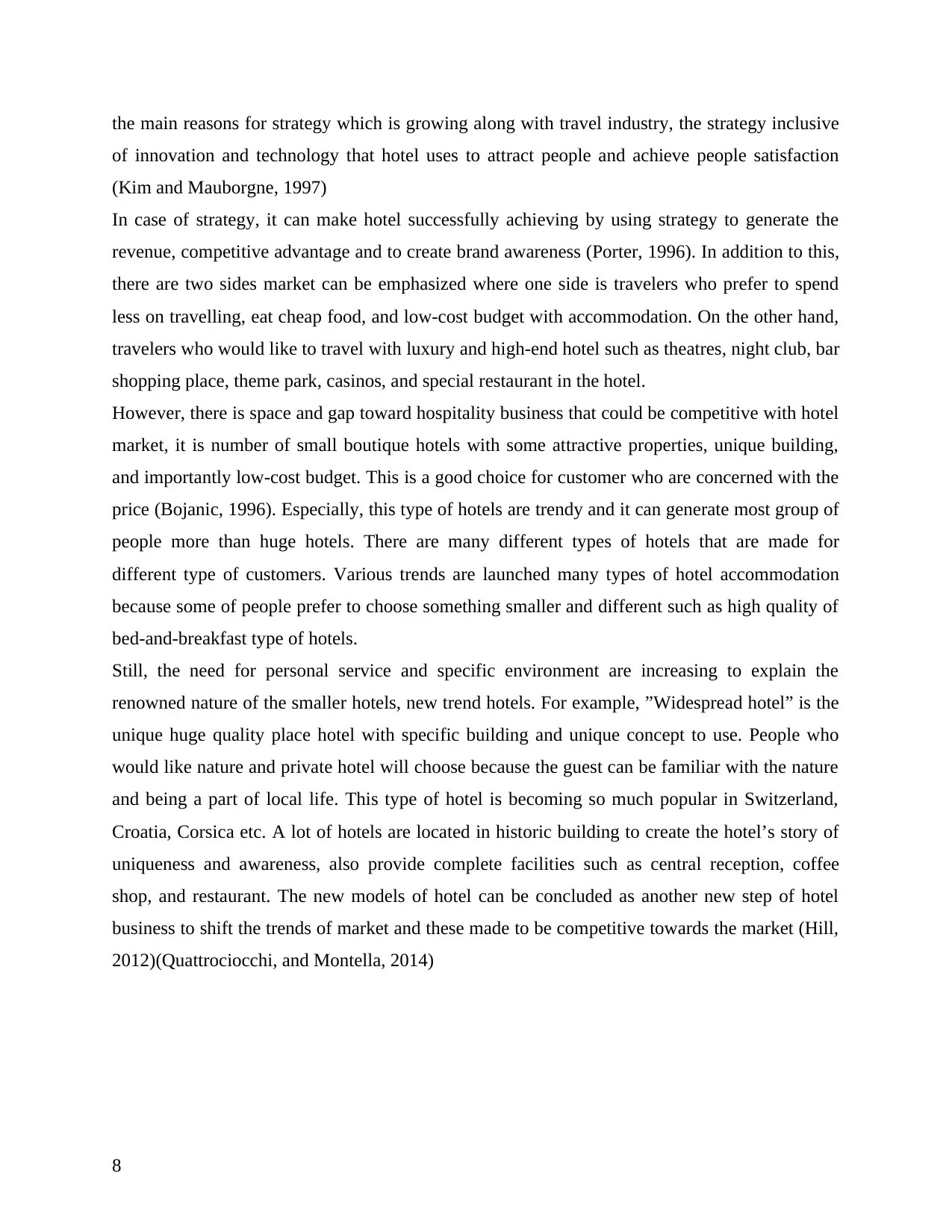
the main reasons for strategy which is growing along with travel industry, the strategy inclusive
of innovation and technology that hotel uses to attract people and achieve people satisfaction
(Kim and Mauborgne, 1997)
In case of strategy, it can make hotel successfully achieving by using strategy to generate the
revenue, competitive advantage and to create brand awareness (Porter, 1996). In addition to this,
there are two sides market can be emphasized where one side is travelers who prefer to spend
less on travelling, eat cheap food, and low-cost budget with accommodation. On the other hand,
travelers who would like to travel with luxury and high-end hotel such as theatres, night club, bar
shopping place, theme park, casinos, and special restaurant in the hotel.
However, there is space and gap toward hospitality business that could be competitive with hotel
market, it is number of small boutique hotels with some attractive properties, unique building,
and importantly low-cost budget. This is a good choice for customer who are concerned with the
price (Bojanic, 1996). Especially, this type of hotels are trendy and it can generate most group of
people more than huge hotels. There are many different types of hotels that are made for
different type of customers. Various trends are launched many types of hotel accommodation
because some of people prefer to choose something smaller and different such as high quality of
bed‐and‐breakfast type of hotels.
Still, the need for personal service and specific environment are increasing to explain the
renowned nature of the smaller hotels, new trend hotels. For example, ”Widespread hotel” is the
unique huge quality place hotel with specific building and unique concept to use. People who
would like nature and private hotel will choose because the guest can be familiar with the nature
and being a part of local life. This type of hotel is becoming so much popular in Switzerland,
Croatia, Corsica etc. A lot of hotels are located in historic building to create the hotel’s story of
uniqueness and awareness, also provide complete facilities such as central reception, coffee
shop, and restaurant. The new models of hotel can be concluded as another new step of hotel
business to shift the trends of market and these made to be competitive towards the market (Hill,
2012)(Quattrociocchi, and Montella, 2014)
8
of innovation and technology that hotel uses to attract people and achieve people satisfaction
(Kim and Mauborgne, 1997)
In case of strategy, it can make hotel successfully achieving by using strategy to generate the
revenue, competitive advantage and to create brand awareness (Porter, 1996). In addition to this,
there are two sides market can be emphasized where one side is travelers who prefer to spend
less on travelling, eat cheap food, and low-cost budget with accommodation. On the other hand,
travelers who would like to travel with luxury and high-end hotel such as theatres, night club, bar
shopping place, theme park, casinos, and special restaurant in the hotel.
However, there is space and gap toward hospitality business that could be competitive with hotel
market, it is number of small boutique hotels with some attractive properties, unique building,
and importantly low-cost budget. This is a good choice for customer who are concerned with the
price (Bojanic, 1996). Especially, this type of hotels are trendy and it can generate most group of
people more than huge hotels. There are many different types of hotels that are made for
different type of customers. Various trends are launched many types of hotel accommodation
because some of people prefer to choose something smaller and different such as high quality of
bed‐and‐breakfast type of hotels.
Still, the need for personal service and specific environment are increasing to explain the
renowned nature of the smaller hotels, new trend hotels. For example, ”Widespread hotel” is the
unique huge quality place hotel with specific building and unique concept to use. People who
would like nature and private hotel will choose because the guest can be familiar with the nature
and being a part of local life. This type of hotel is becoming so much popular in Switzerland,
Croatia, Corsica etc. A lot of hotels are located in historic building to create the hotel’s story of
uniqueness and awareness, also provide complete facilities such as central reception, coffee
shop, and restaurant. The new models of hotel can be concluded as another new step of hotel
business to shift the trends of market and these made to be competitive towards the market (Hill,
2012)(Quattrociocchi, and Montella, 2014)
8
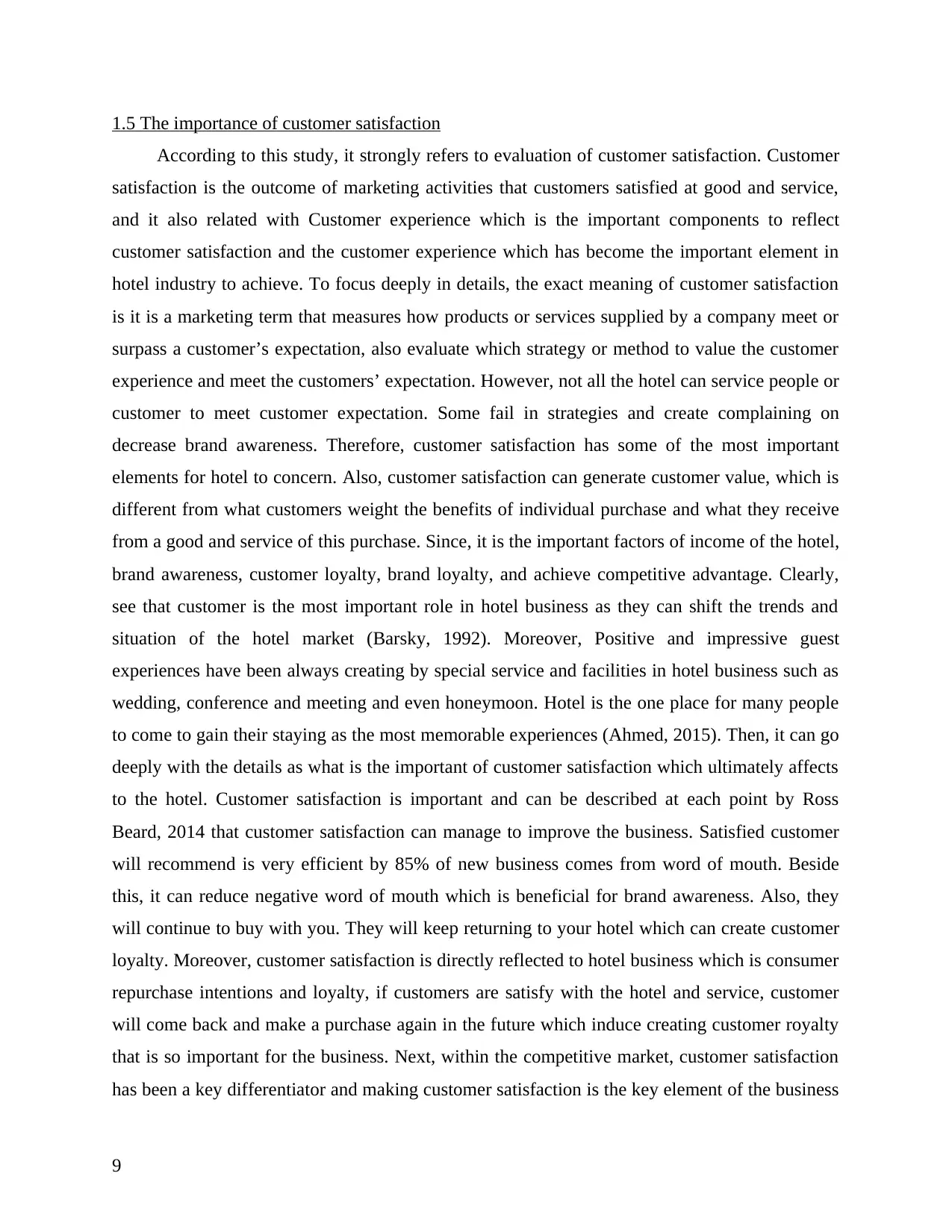
1.5 The importance of customer satisfaction
According to this study, it strongly refers to evaluation of customer satisfaction. Customer
satisfaction is the outcome of marketing activities that customers satisfied at good and service,
and it also related with Customer experience which is the important components to reflect
customer satisfaction and the customer experience which has become the important element in
hotel industry to achieve. To focus deeply in details, the exact meaning of customer satisfaction
is it is a marketing term that measures how products or services supplied by a company meet or
surpass a customer’s expectation, also evaluate which strategy or method to value the customer
experience and meet the customers’ expectation. However, not all the hotel can service people or
customer to meet customer expectation. Some fail in strategies and create complaining on
decrease brand awareness. Therefore, customer satisfaction has some of the most important
elements for hotel to concern. Also, customer satisfaction can generate customer value, which is
different from what customers weight the benefits of individual purchase and what they receive
from a good and service of this purchase. Since, it is the important factors of income of the hotel,
brand awareness, customer loyalty, brand loyalty, and achieve competitive advantage. Clearly,
see that customer is the most important role in hotel business as they can shift the trends and
situation of the hotel market (Barsky, 1992). Moreover, Positive and impressive guest
experiences have been always creating by special service and facilities in hotel business such as
wedding, conference and meeting and even honeymoon. Hotel is the one place for many people
to come to gain their staying as the most memorable experiences (Ahmed, 2015). Then, it can go
deeply with the details as what is the important of customer satisfaction which ultimately affects
to the hotel. Customer satisfaction is important and can be described at each point by Ross
Beard, 2014 that customer satisfaction can manage to improve the business. Satisfied customer
will recommend is very efficient by 85% of new business comes from word of mouth. Beside
this, it can reduce negative word of mouth which is beneficial for brand awareness. Also, they
will continue to buy with you. They will keep returning to your hotel which can create customer
loyalty. Moreover, customer satisfaction is directly reflected to hotel business which is consumer
repurchase intentions and loyalty, if customers are satisfy with the hotel and service, customer
will come back and make a purchase again in the future which induce creating customer royalty
that is so important for the business. Next, within the competitive market, customer satisfaction
has been a key differentiator and making customer satisfaction is the key element of the business
9
According to this study, it strongly refers to evaluation of customer satisfaction. Customer
satisfaction is the outcome of marketing activities that customers satisfied at good and service,
and it also related with Customer experience which is the important components to reflect
customer satisfaction and the customer experience which has become the important element in
hotel industry to achieve. To focus deeply in details, the exact meaning of customer satisfaction
is it is a marketing term that measures how products or services supplied by a company meet or
surpass a customer’s expectation, also evaluate which strategy or method to value the customer
experience and meet the customers’ expectation. However, not all the hotel can service people or
customer to meet customer expectation. Some fail in strategies and create complaining on
decrease brand awareness. Therefore, customer satisfaction has some of the most important
elements for hotel to concern. Also, customer satisfaction can generate customer value, which is
different from what customers weight the benefits of individual purchase and what they receive
from a good and service of this purchase. Since, it is the important factors of income of the hotel,
brand awareness, customer loyalty, brand loyalty, and achieve competitive advantage. Clearly,
see that customer is the most important role in hotel business as they can shift the trends and
situation of the hotel market (Barsky, 1992). Moreover, Positive and impressive guest
experiences have been always creating by special service and facilities in hotel business such as
wedding, conference and meeting and even honeymoon. Hotel is the one place for many people
to come to gain their staying as the most memorable experiences (Ahmed, 2015). Then, it can go
deeply with the details as what is the important of customer satisfaction which ultimately affects
to the hotel. Customer satisfaction is important and can be described at each point by Ross
Beard, 2014 that customer satisfaction can manage to improve the business. Satisfied customer
will recommend is very efficient by 85% of new business comes from word of mouth. Beside
this, it can reduce negative word of mouth which is beneficial for brand awareness. Also, they
will continue to buy with you. They will keep returning to your hotel which can create customer
loyalty. Moreover, customer satisfaction is directly reflected to hotel business which is consumer
repurchase intentions and loyalty, if customers are satisfy with the hotel and service, customer
will come back and make a purchase again in the future which induce creating customer royalty
that is so important for the business. Next, within the competitive market, customer satisfaction
has been a key differentiator and making customer satisfaction is the key element of the business
9
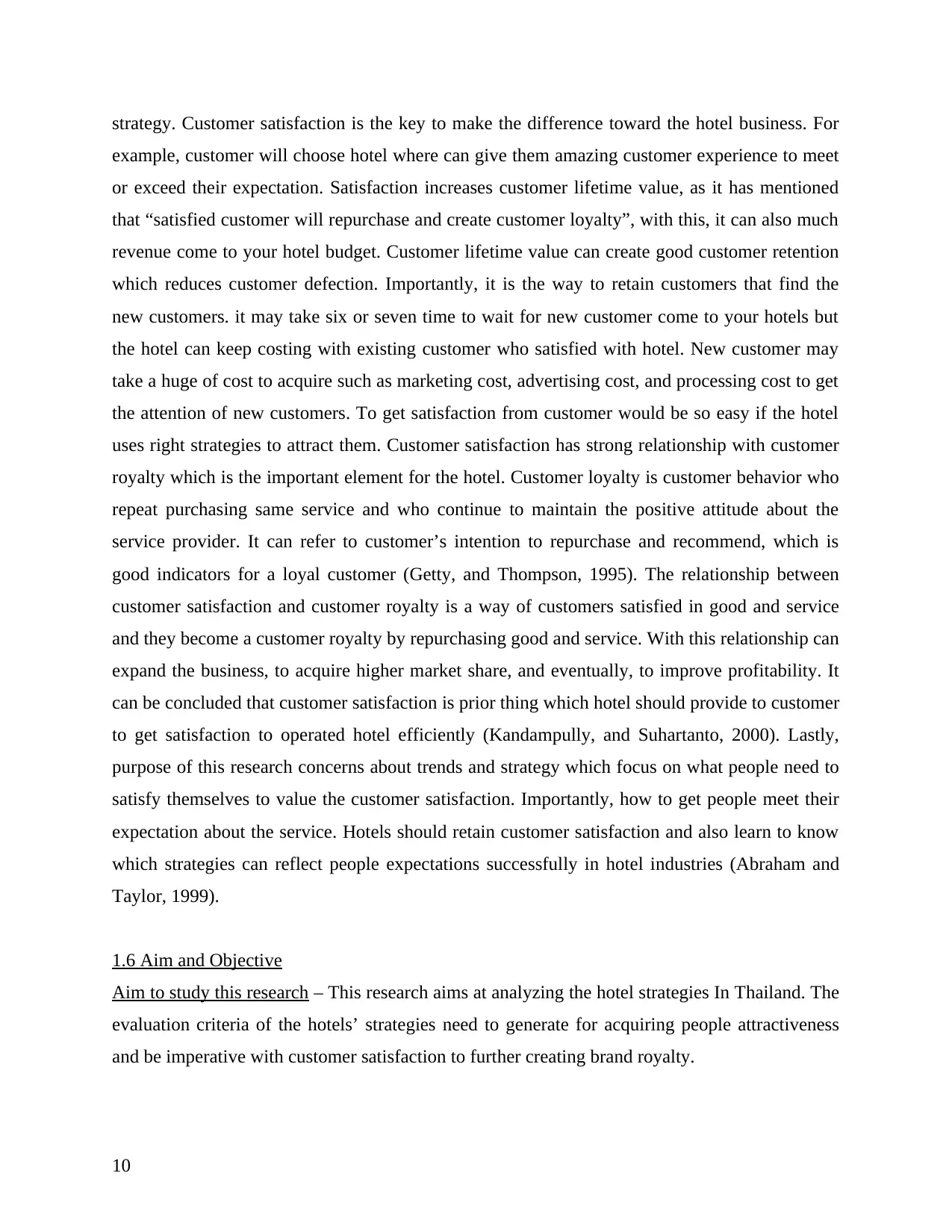
strategy. Customer satisfaction is the key to make the difference toward the hotel business. For
example, customer will choose hotel where can give them amazing customer experience to meet
or exceed their expectation. Satisfaction increases customer lifetime value, as it has mentioned
that “satisfied customer will repurchase and create customer loyalty”, with this, it can also much
revenue come to your hotel budget. Customer lifetime value can create good customer retention
which reduces customer defection. Importantly, it is the way to retain customers that find the
new customers. it may take six or seven time to wait for new customer come to your hotels but
the hotel can keep costing with existing customer who satisfied with hotel. New customer may
take a huge of cost to acquire such as marketing cost, advertising cost, and processing cost to get
the attention of new customers. To get satisfaction from customer would be so easy if the hotel
uses right strategies to attract them. Customer satisfaction has strong relationship with customer
royalty which is the important element for the hotel. Customer loyalty is customer behavior who
repeat purchasing same service and who continue to maintain the positive attitude about the
service provider. It can refer to customer’s intention to repurchase and recommend, which is
good indicators for a loyal customer (Getty, and Thompson, 1995). The relationship between
customer satisfaction and customer royalty is a way of customers satisfied in good and service
and they become a customer royalty by repurchasing good and service. With this relationship can
expand the business, to acquire higher market share, and eventually, to improve profitability. It
can be concluded that customer satisfaction is prior thing which hotel should provide to customer
to get satisfaction to operated hotel efficiently (Kandampully, and Suhartanto, 2000). Lastly,
purpose of this research concerns about trends and strategy which focus on what people need to
satisfy themselves to value the customer satisfaction. Importantly, how to get people meet their
expectation about the service. Hotels should retain customer satisfaction and also learn to know
which strategies can reflect people expectations successfully in hotel industries (Abraham and
Taylor, 1999).
1.6 Aim and Objective
Aim to study this research – This research aims at analyzing the hotel strategies In Thailand. The
evaluation criteria of the hotels’ strategies need to generate for acquiring people attractiveness
and be imperative with customer satisfaction to further creating brand royalty.
10
example, customer will choose hotel where can give them amazing customer experience to meet
or exceed their expectation. Satisfaction increases customer lifetime value, as it has mentioned
that “satisfied customer will repurchase and create customer loyalty”, with this, it can also much
revenue come to your hotel budget. Customer lifetime value can create good customer retention
which reduces customer defection. Importantly, it is the way to retain customers that find the
new customers. it may take six or seven time to wait for new customer come to your hotels but
the hotel can keep costing with existing customer who satisfied with hotel. New customer may
take a huge of cost to acquire such as marketing cost, advertising cost, and processing cost to get
the attention of new customers. To get satisfaction from customer would be so easy if the hotel
uses right strategies to attract them. Customer satisfaction has strong relationship with customer
royalty which is the important element for the hotel. Customer loyalty is customer behavior who
repeat purchasing same service and who continue to maintain the positive attitude about the
service provider. It can refer to customer’s intention to repurchase and recommend, which is
good indicators for a loyal customer (Getty, and Thompson, 1995). The relationship between
customer satisfaction and customer royalty is a way of customers satisfied in good and service
and they become a customer royalty by repurchasing good and service. With this relationship can
expand the business, to acquire higher market share, and eventually, to improve profitability. It
can be concluded that customer satisfaction is prior thing which hotel should provide to customer
to get satisfaction to operated hotel efficiently (Kandampully, and Suhartanto, 2000). Lastly,
purpose of this research concerns about trends and strategy which focus on what people need to
satisfy themselves to value the customer satisfaction. Importantly, how to get people meet their
expectation about the service. Hotels should retain customer satisfaction and also learn to know
which strategies can reflect people expectations successfully in hotel industries (Abraham and
Taylor, 1999).
1.6 Aim and Objective
Aim to study this research – This research aims at analyzing the hotel strategies In Thailand. The
evaluation criteria of the hotels’ strategies need to generate for acquiring people attractiveness
and be imperative with customer satisfaction to further creating brand royalty.
10
Secure Best Marks with AI Grader
Need help grading? Try our AI Grader for instant feedback on your assignments.
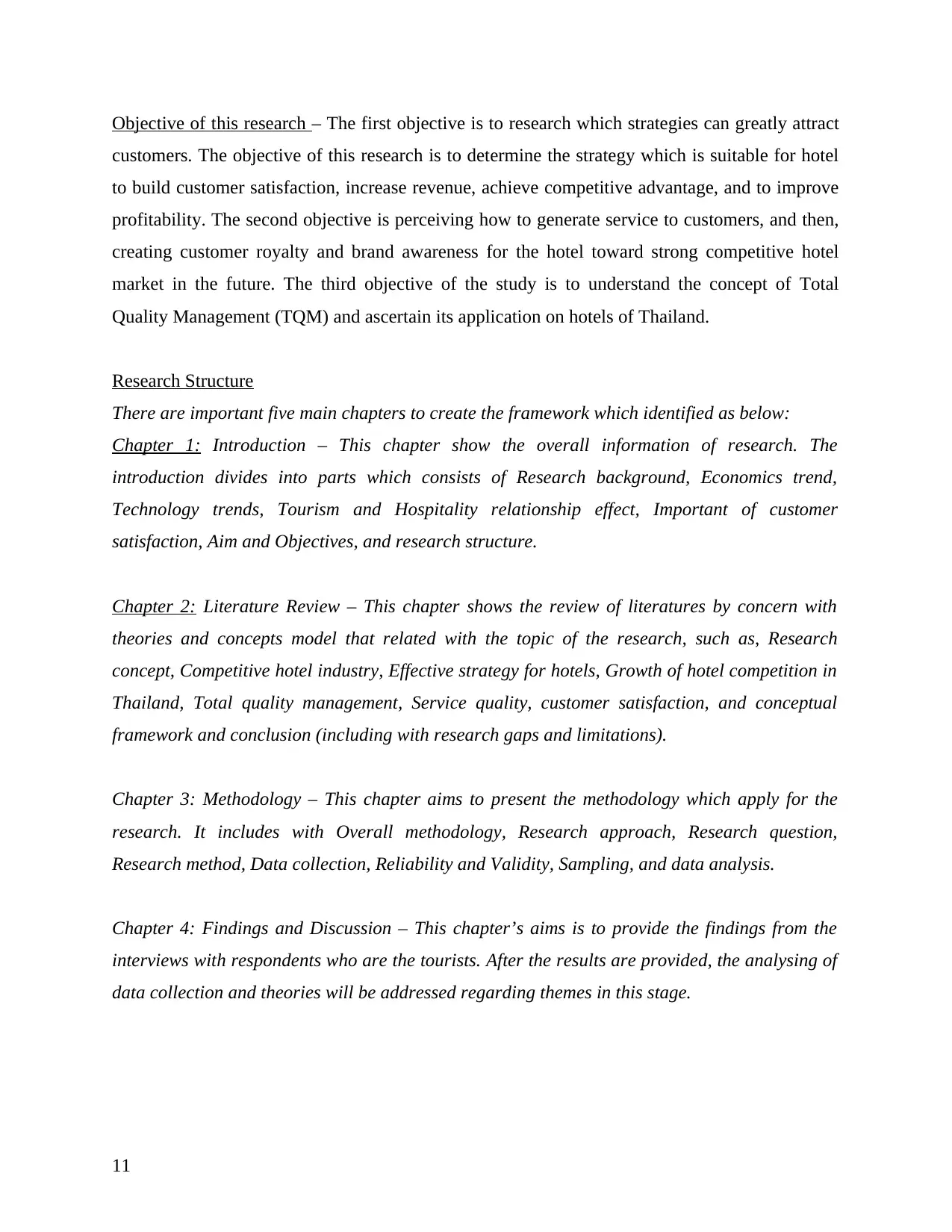
Objective of this research – The first objective is to research which strategies can greatly attract
customers. The objective of this research is to determine the strategy which is suitable for hotel
to build customer satisfaction, increase revenue, achieve competitive advantage, and to improve
profitability. The second objective is perceiving how to generate service to customers, and then,
creating customer royalty and brand awareness for the hotel toward strong competitive hotel
market in the future. The third objective of the study is to understand the concept of Total
Quality Management (TQM) and ascertain its application on hotels of Thailand.
Research Structure
There are important five main chapters to create the framework which identified as below:
Chapter 1: Introduction – This chapter show the overall information of research. The
introduction divides into parts which consists of Research background, Economics trend,
Technology trends, Tourism and Hospitality relationship effect, Important of customer
satisfaction, Aim and Objectives, and research structure.
Chapter 2: Literature Review – This chapter shows the review of literatures by concern with
theories and concepts model that related with the topic of the research, such as, Research
concept, Competitive hotel industry, Effective strategy for hotels, Growth of hotel competition in
Thailand, Total quality management, Service quality, customer satisfaction, and conceptual
framework and conclusion (including with research gaps and limitations).
Chapter 3: Methodology – This chapter aims to present the methodology which apply for the
research. It includes with Overall methodology, Research approach, Research question,
Research method, Data collection, Reliability and Validity, Sampling, and data analysis.
Chapter 4: Findings and Discussion – This chapter’s aims is to provide the findings from the
interviews with respondents who are the tourists. After the results are provided, the analysing of
data collection and theories will be addressed regarding themes in this stage.
11
customers. The objective of this research is to determine the strategy which is suitable for hotel
to build customer satisfaction, increase revenue, achieve competitive advantage, and to improve
profitability. The second objective is perceiving how to generate service to customers, and then,
creating customer royalty and brand awareness for the hotel toward strong competitive hotel
market in the future. The third objective of the study is to understand the concept of Total
Quality Management (TQM) and ascertain its application on hotels of Thailand.
Research Structure
There are important five main chapters to create the framework which identified as below:
Chapter 1: Introduction – This chapter show the overall information of research. The
introduction divides into parts which consists of Research background, Economics trend,
Technology trends, Tourism and Hospitality relationship effect, Important of customer
satisfaction, Aim and Objectives, and research structure.
Chapter 2: Literature Review – This chapter shows the review of literatures by concern with
theories and concepts model that related with the topic of the research, such as, Research
concept, Competitive hotel industry, Effective strategy for hotels, Growth of hotel competition in
Thailand, Total quality management, Service quality, customer satisfaction, and conceptual
framework and conclusion (including with research gaps and limitations).
Chapter 3: Methodology – This chapter aims to present the methodology which apply for the
research. It includes with Overall methodology, Research approach, Research question,
Research method, Data collection, Reliability and Validity, Sampling, and data analysis.
Chapter 4: Findings and Discussion – This chapter’s aims is to provide the findings from the
interviews with respondents who are the tourists. After the results are provided, the analysing of
data collection and theories will be addressed regarding themes in this stage.
11
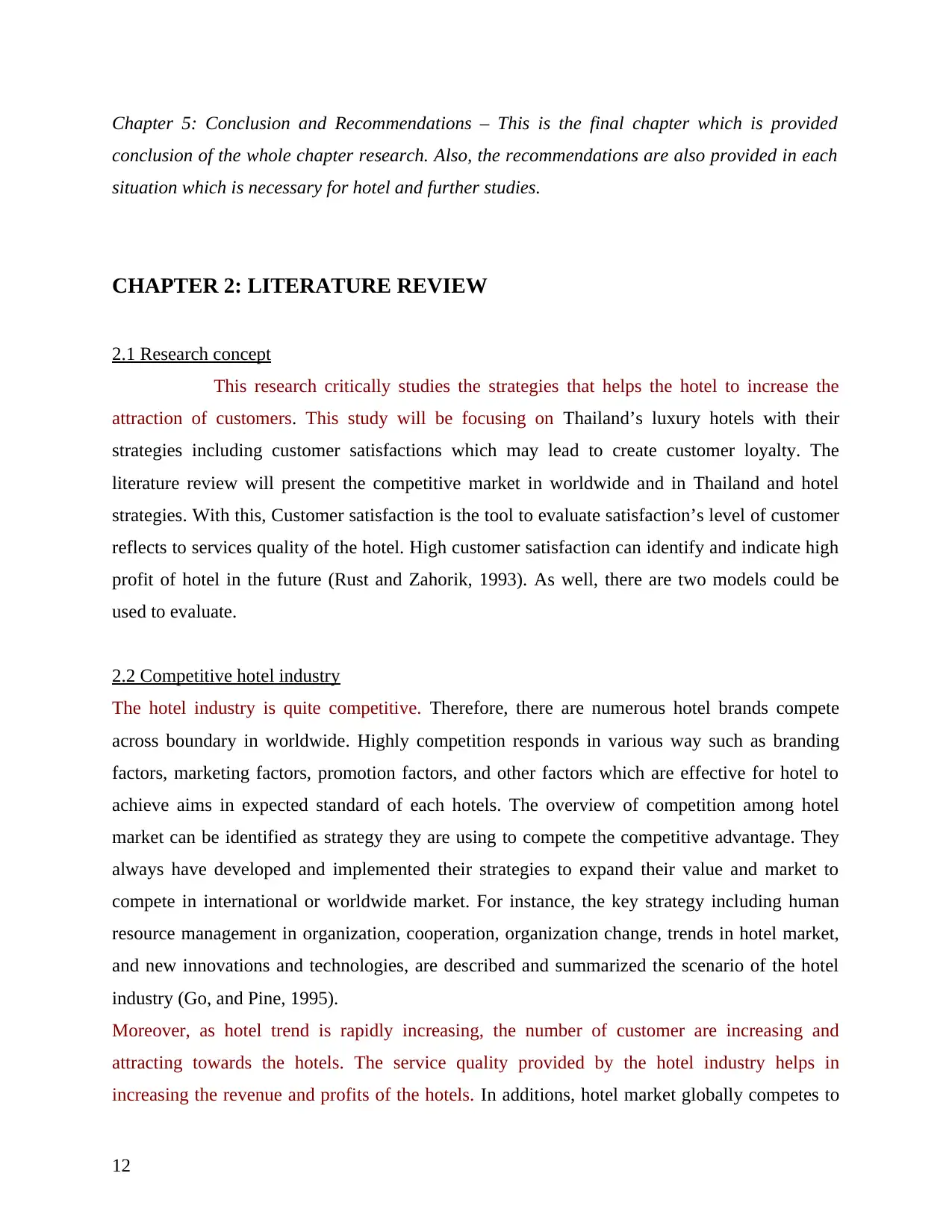
Chapter 5: Conclusion and Recommendations – This is the final chapter which is provided
conclusion of the whole chapter research. Also, the recommendations are also provided in each
situation which is necessary for hotel and further studies.
CHAPTER 2: LITERATURE REVIEW
2.1 Research concept
This research critically studies the strategies that helps the hotel to increase the
attraction of customers. This study will be focusing on Thailand’s luxury hotels with their
strategies including customer satisfactions which may lead to create customer loyalty. The
literature review will present the competitive market in worldwide and in Thailand and hotel
strategies. With this, Customer satisfaction is the tool to evaluate satisfaction’s level of customer
reflects to services quality of the hotel. High customer satisfaction can identify and indicate high
profit of hotel in the future (Rust and Zahorik, 1993). As well, there are two models could be
used to evaluate.
2.2 Competitive hotel industry
The hotel industry is quite competitive. Therefore, there are numerous hotel brands compete
across boundary in worldwide. Highly competition responds in various way such as branding
factors, marketing factors, promotion factors, and other factors which are effective for hotel to
achieve aims in expected standard of each hotels. The overview of competition among hotel
market can be identified as strategy they are using to compete the competitive advantage. They
always have developed and implemented their strategies to expand their value and market to
compete in international or worldwide market. For instance, the key strategy including human
resource management in organization, cooperation, organization change, trends in hotel market,
and new innovations and technologies, are described and summarized the scenario of the hotel
industry (Go, and Pine, 1995).
Moreover, as hotel trend is rapidly increasing, the number of customer are increasing and
attracting towards the hotels. The service quality provided by the hotel industry helps in
increasing the revenue and profits of the hotels. In additions, hotel market globally competes to
12
conclusion of the whole chapter research. Also, the recommendations are also provided in each
situation which is necessary for hotel and further studies.
CHAPTER 2: LITERATURE REVIEW
2.1 Research concept
This research critically studies the strategies that helps the hotel to increase the
attraction of customers. This study will be focusing on Thailand’s luxury hotels with their
strategies including customer satisfactions which may lead to create customer loyalty. The
literature review will present the competitive market in worldwide and in Thailand and hotel
strategies. With this, Customer satisfaction is the tool to evaluate satisfaction’s level of customer
reflects to services quality of the hotel. High customer satisfaction can identify and indicate high
profit of hotel in the future (Rust and Zahorik, 1993). As well, there are two models could be
used to evaluate.
2.2 Competitive hotel industry
The hotel industry is quite competitive. Therefore, there are numerous hotel brands compete
across boundary in worldwide. Highly competition responds in various way such as branding
factors, marketing factors, promotion factors, and other factors which are effective for hotel to
achieve aims in expected standard of each hotels. The overview of competition among hotel
market can be identified as strategy they are using to compete the competitive advantage. They
always have developed and implemented their strategies to expand their value and market to
compete in international or worldwide market. For instance, the key strategy including human
resource management in organization, cooperation, organization change, trends in hotel market,
and new innovations and technologies, are described and summarized the scenario of the hotel
industry (Go, and Pine, 1995).
Moreover, as hotel trend is rapidly increasing, the number of customer are increasing and
attracting towards the hotels. The service quality provided by the hotel industry helps in
increasing the revenue and profits of the hotels. In additions, hotel market globally competes to
12
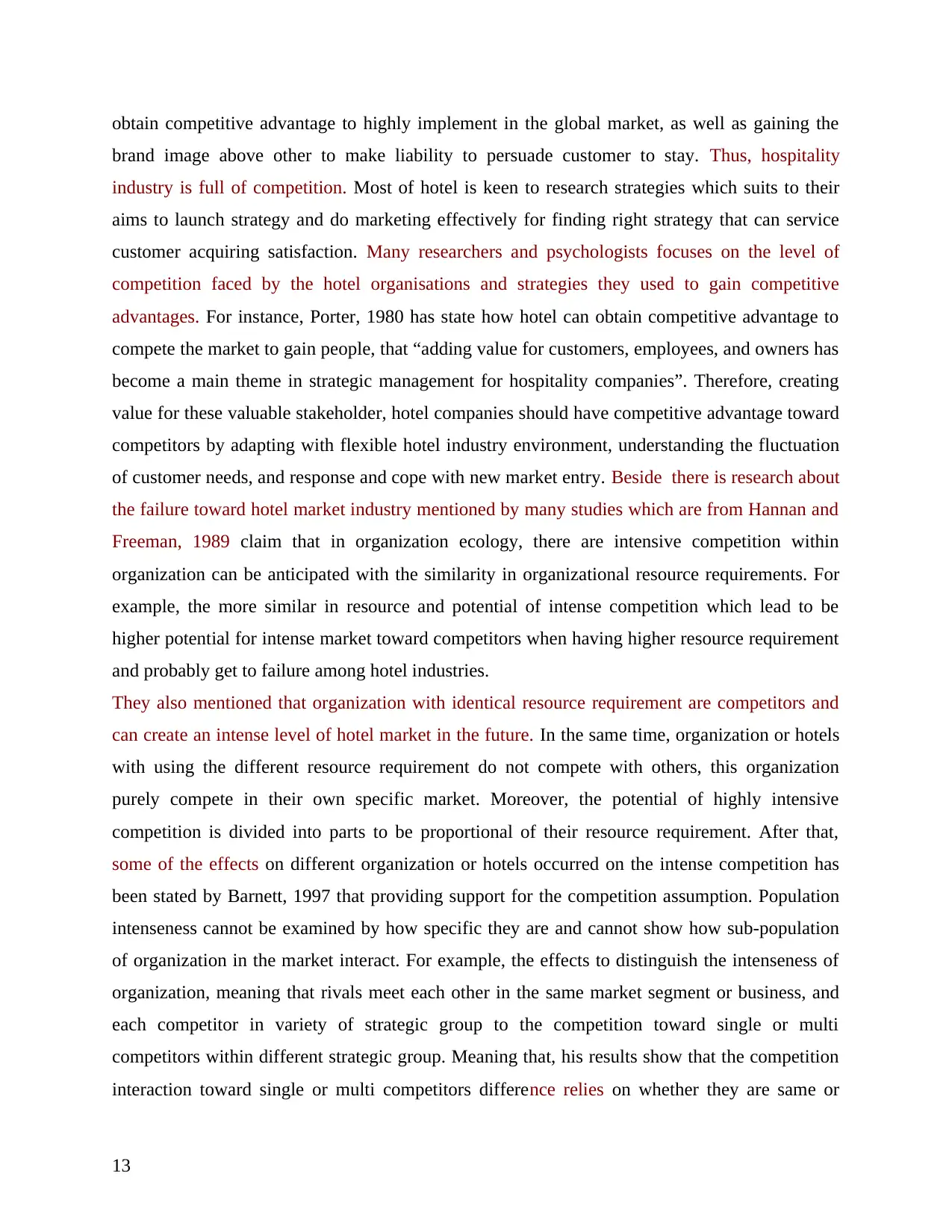
obtain competitive advantage to highly implement in the global market, as well as gaining the
brand image above other to make liability to persuade customer to stay. Thus, hospitality
industry is full of competition. Most of hotel is keen to research strategies which suits to their
aims to launch strategy and do marketing effectively for finding right strategy that can service
customer acquiring satisfaction. Many researchers and psychologists focuses on the level of
competition faced by the hotel organisations and strategies they used to gain competitive
advantages. For instance, Porter, 1980 has state how hotel can obtain competitive advantage to
compete the market to gain people, that “adding value for customers, employees, and owners has
become a main theme in strategic management for hospitality companies”. Therefore, creating
value for these valuable stakeholder, hotel companies should have competitive advantage toward
competitors by adapting with flexible hotel industry environment, understanding the fluctuation
of customer needs, and response and cope with new market entry. Beside there is research about
the failure toward hotel market industry mentioned by many studies which are from Hannan and
Freeman, 1989 claim that in organization ecology, there are intensive competition within
organization can be anticipated with the similarity in organizational resource requirements. For
example, the more similar in resource and potential of intense competition which lead to be
higher potential for intense market toward competitors when having higher resource requirement
and probably get to failure among hotel industries.
They also mentioned that organization with identical resource requirement are competitors and
can create an intense level of hotel market in the future. In the same time, organization or hotels
with using the different resource requirement do not compete with others, this organization
purely compete in their own specific market. Moreover, the potential of highly intensive
competition is divided into parts to be proportional of their resource requirement. After that,
some of the effects on different organization or hotels occurred on the intense competition has
been stated by Barnett, 1997 that providing support for the competition assumption. Population
intenseness cannot be examined by how specific they are and cannot show how sub-population
of organization in the market interact. For example, the effects to distinguish the intenseness of
organization, meaning that rivals meet each other in the same market segment or business, and
each competitor in variety of strategic group to the competition toward single or multi
competitors within different strategic group. Meaning that, his results show that the competition
interaction toward single or multi competitors difference relies on whether they are same or
13
brand image above other to make liability to persuade customer to stay. Thus, hospitality
industry is full of competition. Most of hotel is keen to research strategies which suits to their
aims to launch strategy and do marketing effectively for finding right strategy that can service
customer acquiring satisfaction. Many researchers and psychologists focuses on the level of
competition faced by the hotel organisations and strategies they used to gain competitive
advantages. For instance, Porter, 1980 has state how hotel can obtain competitive advantage to
compete the market to gain people, that “adding value for customers, employees, and owners has
become a main theme in strategic management for hospitality companies”. Therefore, creating
value for these valuable stakeholder, hotel companies should have competitive advantage toward
competitors by adapting with flexible hotel industry environment, understanding the fluctuation
of customer needs, and response and cope with new market entry. Beside there is research about
the failure toward hotel market industry mentioned by many studies which are from Hannan and
Freeman, 1989 claim that in organization ecology, there are intensive competition within
organization can be anticipated with the similarity in organizational resource requirements. For
example, the more similar in resource and potential of intense competition which lead to be
higher potential for intense market toward competitors when having higher resource requirement
and probably get to failure among hotel industries.
They also mentioned that organization with identical resource requirement are competitors and
can create an intense level of hotel market in the future. In the same time, organization or hotels
with using the different resource requirement do not compete with others, this organization
purely compete in their own specific market. Moreover, the potential of highly intensive
competition is divided into parts to be proportional of their resource requirement. After that,
some of the effects on different organization or hotels occurred on the intense competition has
been stated by Barnett, 1997 that providing support for the competition assumption. Population
intenseness cannot be examined by how specific they are and cannot show how sub-population
of organization in the market interact. For example, the effects to distinguish the intenseness of
organization, meaning that rivals meet each other in the same market segment or business, and
each competitor in variety of strategic group to the competition toward single or multi
competitors within different strategic group. Meaning that, his results show that the competition
interaction toward single or multi competitors difference relies on whether they are same or
13
Paraphrase This Document
Need a fresh take? Get an instant paraphrase of this document with our AI Paraphraser
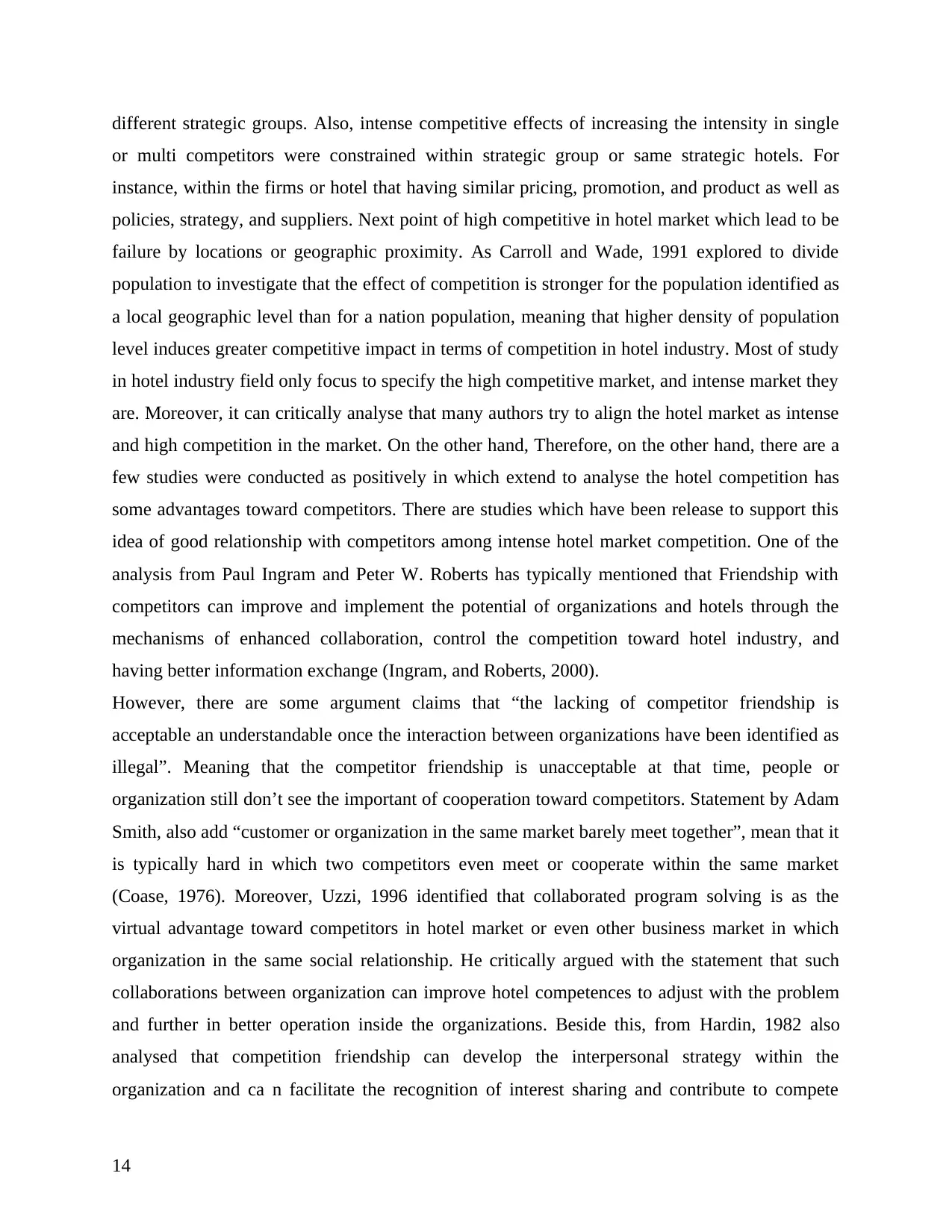
different strategic groups. Also, intense competitive effects of increasing the intensity in single
or multi competitors were constrained within strategic group or same strategic hotels. For
instance, within the firms or hotel that having similar pricing, promotion, and product as well as
policies, strategy, and suppliers. Next point of high competitive in hotel market which lead to be
failure by locations or geographic proximity. As Carroll and Wade, 1991 explored to divide
population to investigate that the effect of competition is stronger for the population identified as
a local geographic level than for a nation population, meaning that higher density of population
level induces greater competitive impact in terms of competition in hotel industry. Most of study
in hotel industry field only focus to specify the high competitive market, and intense market they
are. Moreover, it can critically analyse that many authors try to align the hotel market as intense
and high competition in the market. On the other hand, Therefore, on the other hand, there are a
few studies were conducted as positively in which extend to analyse the hotel competition has
some advantages toward competitors. There are studies which have been release to support this
idea of good relationship with competitors among intense hotel market competition. One of the
analysis from Paul Ingram and Peter W. Roberts has typically mentioned that Friendship with
competitors can improve and implement the potential of organizations and hotels through the
mechanisms of enhanced collaboration, control the competition toward hotel industry, and
having better information exchange (Ingram, and Roberts, 2000).
However, there are some argument claims that “the lacking of competitor friendship is
acceptable an understandable once the interaction between organizations have been identified as
illegal”. Meaning that the competitor friendship is unacceptable at that time, people or
organization still don’t see the important of cooperation toward competitors. Statement by Adam
Smith, also add “customer or organization in the same market barely meet together”, mean that it
is typically hard in which two competitors even meet or cooperate within the same market
(Coase, 1976). Moreover, Uzzi, 1996 identified that collaborated program solving is as the
virtual advantage toward competitors in hotel market or even other business market in which
organization in the same social relationship. He critically argued with the statement that such
collaborations between organization can improve hotel competences to adjust with the problem
and further in better operation inside the organizations. Beside this, from Hardin, 1982 also
analysed that competition friendship can develop the interpersonal strategy within the
organization and ca n facilitate the recognition of interest sharing and contribute to compete
14
or multi competitors were constrained within strategic group or same strategic hotels. For
instance, within the firms or hotel that having similar pricing, promotion, and product as well as
policies, strategy, and suppliers. Next point of high competitive in hotel market which lead to be
failure by locations or geographic proximity. As Carroll and Wade, 1991 explored to divide
population to investigate that the effect of competition is stronger for the population identified as
a local geographic level than for a nation population, meaning that higher density of population
level induces greater competitive impact in terms of competition in hotel industry. Most of study
in hotel industry field only focus to specify the high competitive market, and intense market they
are. Moreover, it can critically analyse that many authors try to align the hotel market as intense
and high competition in the market. On the other hand, Therefore, on the other hand, there are a
few studies were conducted as positively in which extend to analyse the hotel competition has
some advantages toward competitors. There are studies which have been release to support this
idea of good relationship with competitors among intense hotel market competition. One of the
analysis from Paul Ingram and Peter W. Roberts has typically mentioned that Friendship with
competitors can improve and implement the potential of organizations and hotels through the
mechanisms of enhanced collaboration, control the competition toward hotel industry, and
having better information exchange (Ingram, and Roberts, 2000).
However, there are some argument claims that “the lacking of competitor friendship is
acceptable an understandable once the interaction between organizations have been identified as
illegal”. Meaning that the competitor friendship is unacceptable at that time, people or
organization still don’t see the important of cooperation toward competitors. Statement by Adam
Smith, also add “customer or organization in the same market barely meet together”, mean that it
is typically hard in which two competitors even meet or cooperate within the same market
(Coase, 1976). Moreover, Uzzi, 1996 identified that collaborated program solving is as the
virtual advantage toward competitors in hotel market or even other business market in which
organization in the same social relationship. He critically argued with the statement that such
collaborations between organization can improve hotel competences to adjust with the problem
and further in better operation inside the organizations. Beside this, from Hardin, 1982 also
analysed that competition friendship can develop the interpersonal strategy within the
organization and ca n facilitate the recognition of interest sharing and contribute to compete
14
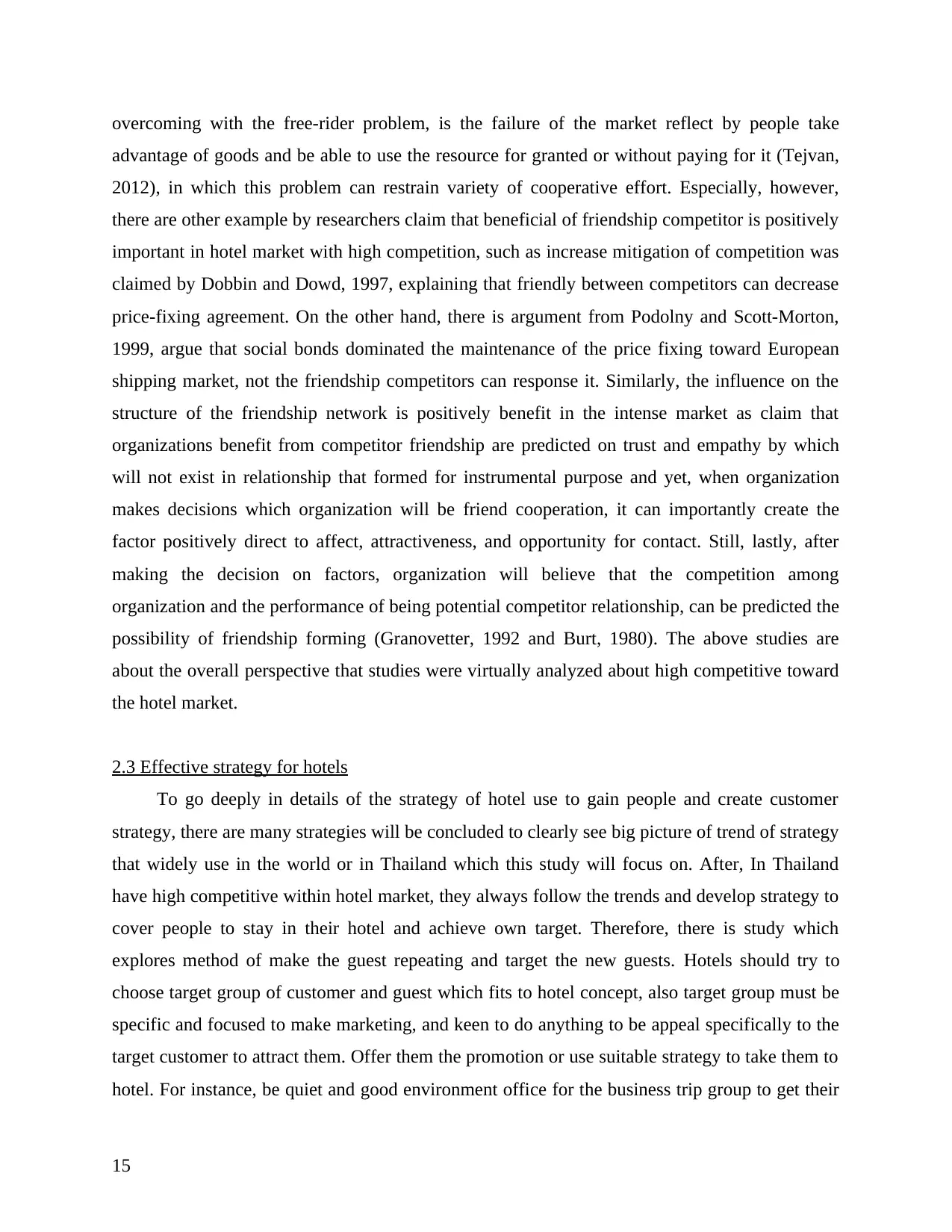
overcoming with the free-rider problem, is the failure of the market reflect by people take
advantage of goods and be able to use the resource for granted or without paying for it (Tejvan,
2012), in which this problem can restrain variety of cooperative effort. Especially, however,
there are other example by researchers claim that beneficial of friendship competitor is positively
important in hotel market with high competition, such as increase mitigation of competition was
claimed by Dobbin and Dowd, 1997, explaining that friendly between competitors can decrease
price-fixing agreement. On the other hand, there is argument from Podolny and Scott-Morton,
1999, argue that social bonds dominated the maintenance of the price fixing toward European
shipping market, not the friendship competitors can response it. Similarly, the influence on the
structure of the friendship network is positively benefit in the intense market as claim that
organizations benefit from competitor friendship are predicted on trust and empathy by which
will not exist in relationship that formed for instrumental purpose and yet, when organization
makes decisions which organization will be friend cooperation, it can importantly create the
factor positively direct to affect, attractiveness, and opportunity for contact. Still, lastly, after
making the decision on factors, organization will believe that the competition among
organization and the performance of being potential competitor relationship, can be predicted the
possibility of friendship forming (Granovetter, 1992 and Burt, 1980). The above studies are
about the overall perspective that studies were virtually analyzed about high competitive toward
the hotel market.
2.3 Effective strategy for hotels
To go deeply in details of the strategy of hotel use to gain people and create customer
strategy, there are many strategies will be concluded to clearly see big picture of trend of strategy
that widely use in the world or in Thailand which this study will focus on. After, In Thailand
have high competitive within hotel market, they always follow the trends and develop strategy to
cover people to stay in their hotel and achieve own target. Therefore, there is study which
explores method of make the guest repeating and target the new guests. Hotels should try to
choose target group of customer and guest which fits to hotel concept, also target group must be
specific and focused to make marketing, and keen to do anything to be appeal specifically to the
target customer to attract them. Offer them the promotion or use suitable strategy to take them to
hotel. For instance, be quiet and good environment office for the business trip group to get their
15
advantage of goods and be able to use the resource for granted or without paying for it (Tejvan,
2012), in which this problem can restrain variety of cooperative effort. Especially, however,
there are other example by researchers claim that beneficial of friendship competitor is positively
important in hotel market with high competition, such as increase mitigation of competition was
claimed by Dobbin and Dowd, 1997, explaining that friendly between competitors can decrease
price-fixing agreement. On the other hand, there is argument from Podolny and Scott-Morton,
1999, argue that social bonds dominated the maintenance of the price fixing toward European
shipping market, not the friendship competitors can response it. Similarly, the influence on the
structure of the friendship network is positively benefit in the intense market as claim that
organizations benefit from competitor friendship are predicted on trust and empathy by which
will not exist in relationship that formed for instrumental purpose and yet, when organization
makes decisions which organization will be friend cooperation, it can importantly create the
factor positively direct to affect, attractiveness, and opportunity for contact. Still, lastly, after
making the decision on factors, organization will believe that the competition among
organization and the performance of being potential competitor relationship, can be predicted the
possibility of friendship forming (Granovetter, 1992 and Burt, 1980). The above studies are
about the overall perspective that studies were virtually analyzed about high competitive toward
the hotel market.
2.3 Effective strategy for hotels
To go deeply in details of the strategy of hotel use to gain people and create customer
strategy, there are many strategies will be concluded to clearly see big picture of trend of strategy
that widely use in the world or in Thailand which this study will focus on. After, In Thailand
have high competitive within hotel market, they always follow the trends and develop strategy to
cover people to stay in their hotel and achieve own target. Therefore, there is study which
explores method of make the guest repeating and target the new guests. Hotels should try to
choose target group of customer and guest which fits to hotel concept, also target group must be
specific and focused to make marketing, and keen to do anything to be appeal specifically to the
target customer to attract them. Offer them the promotion or use suitable strategy to take them to
hotel. For instance, be quiet and good environment office for the business trip group to get their
15
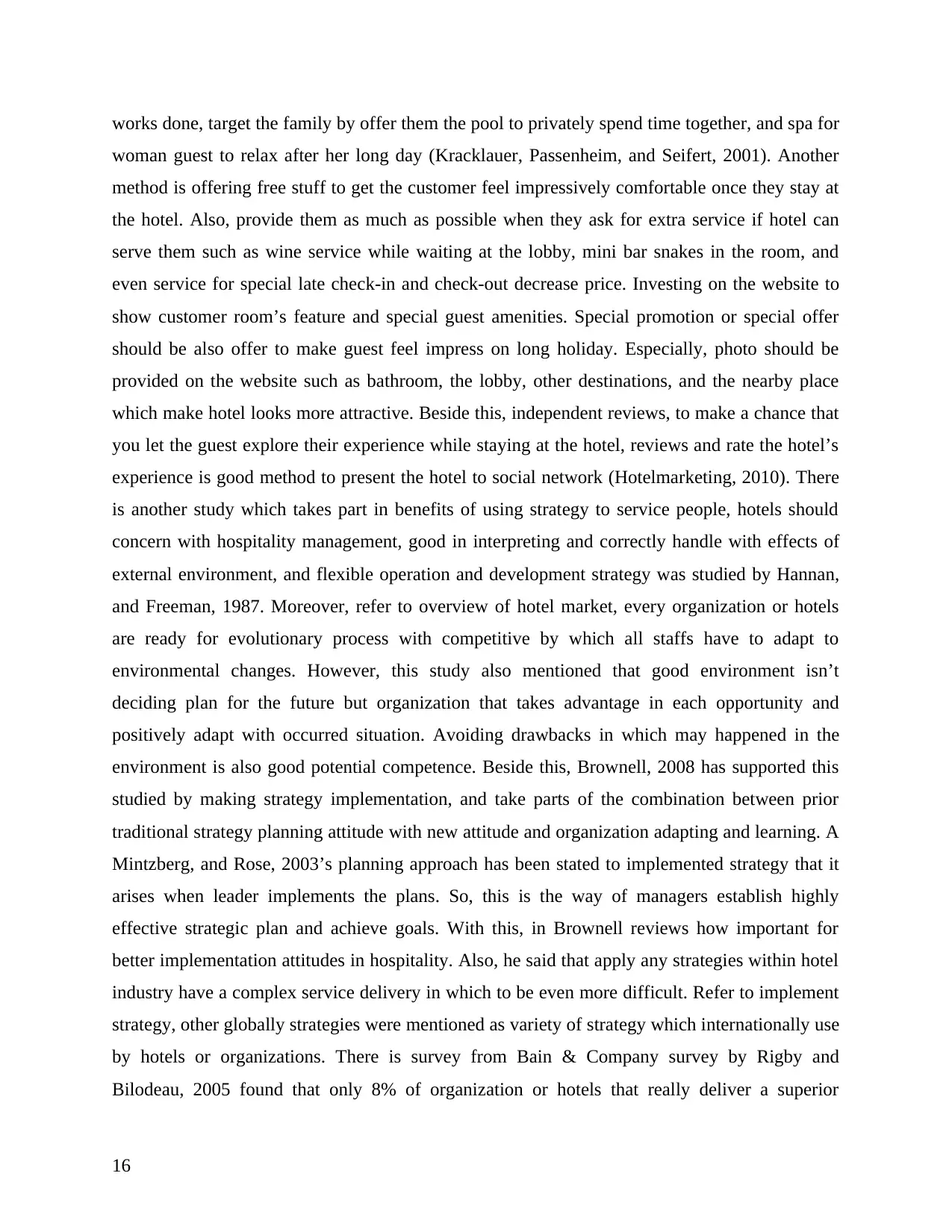
works done, target the family by offer them the pool to privately spend time together, and spa for
woman guest to relax after her long day (Kracklauer, Passenheim, and Seifert, 2001). Another
method is offering free stuff to get the customer feel impressively comfortable once they stay at
the hotel. Also, provide them as much as possible when they ask for extra service if hotel can
serve them such as wine service while waiting at the lobby, mini bar snakes in the room, and
even service for special late check-in and check-out decrease price. Investing on the website to
show customer room’s feature and special guest amenities. Special promotion or special offer
should be also offer to make guest feel impress on long holiday. Especially, photo should be
provided on the website such as bathroom, the lobby, other destinations, and the nearby place
which make hotel looks more attractive. Beside this, independent reviews, to make a chance that
you let the guest explore their experience while staying at the hotel, reviews and rate the hotel’s
experience is good method to present the hotel to social network (Hotelmarketing, 2010). There
is another study which takes part in benefits of using strategy to service people, hotels should
concern with hospitality management, good in interpreting and correctly handle with effects of
external environment, and flexible operation and development strategy was studied by Hannan,
and Freeman, 1987. Moreover, refer to overview of hotel market, every organization or hotels
are ready for evolutionary process with competitive by which all staffs have to adapt to
environmental changes. However, this study also mentioned that good environment isn’t
deciding plan for the future but organization that takes advantage in each opportunity and
positively adapt with occurred situation. Avoiding drawbacks in which may happened in the
environment is also good potential competence. Beside this, Brownell, 2008 has supported this
studied by making strategy implementation, and take parts of the combination between prior
traditional strategy planning attitude with new attitude and organization adapting and learning. A
Mintzberg, and Rose, 2003’s planning approach has been stated to implemented strategy that it
arises when leader implements the plans. So, this is the way of managers establish highly
effective strategic plan and achieve goals. With this, in Brownell reviews how important for
better implementation attitudes in hospitality. Also, he said that apply any strategies within hotel
industry have a complex service delivery in which to be even more difficult. Refer to implement
strategy, other globally strategies were mentioned as variety of strategy which internationally use
by hotels or organizations. There is survey from Bain & Company survey by Rigby and
Bilodeau, 2005 found that only 8% of organization or hotels that really deliver a superior
16
woman guest to relax after her long day (Kracklauer, Passenheim, and Seifert, 2001). Another
method is offering free stuff to get the customer feel impressively comfortable once they stay at
the hotel. Also, provide them as much as possible when they ask for extra service if hotel can
serve them such as wine service while waiting at the lobby, mini bar snakes in the room, and
even service for special late check-in and check-out decrease price. Investing on the website to
show customer room’s feature and special guest amenities. Special promotion or special offer
should be also offer to make guest feel impress on long holiday. Especially, photo should be
provided on the website such as bathroom, the lobby, other destinations, and the nearby place
which make hotel looks more attractive. Beside this, independent reviews, to make a chance that
you let the guest explore their experience while staying at the hotel, reviews and rate the hotel’s
experience is good method to present the hotel to social network (Hotelmarketing, 2010). There
is another study which takes part in benefits of using strategy to service people, hotels should
concern with hospitality management, good in interpreting and correctly handle with effects of
external environment, and flexible operation and development strategy was studied by Hannan,
and Freeman, 1987. Moreover, refer to overview of hotel market, every organization or hotels
are ready for evolutionary process with competitive by which all staffs have to adapt to
environmental changes. However, this study also mentioned that good environment isn’t
deciding plan for the future but organization that takes advantage in each opportunity and
positively adapt with occurred situation. Avoiding drawbacks in which may happened in the
environment is also good potential competence. Beside this, Brownell, 2008 has supported this
studied by making strategy implementation, and take parts of the combination between prior
traditional strategy planning attitude with new attitude and organization adapting and learning. A
Mintzberg, and Rose, 2003’s planning approach has been stated to implemented strategy that it
arises when leader implements the plans. So, this is the way of managers establish highly
effective strategic plan and achieve goals. With this, in Brownell reviews how important for
better implementation attitudes in hospitality. Also, he said that apply any strategies within hotel
industry have a complex service delivery in which to be even more difficult. Refer to implement
strategy, other globally strategies were mentioned as variety of strategy which internationally use
by hotels or organizations. There is survey from Bain & Company survey by Rigby and
Bilodeau, 2005 found that only 8% of organization or hotels that really deliver a superior
16
Secure Best Marks with AI Grader
Need help grading? Try our AI Grader for instant feedback on your assignments.
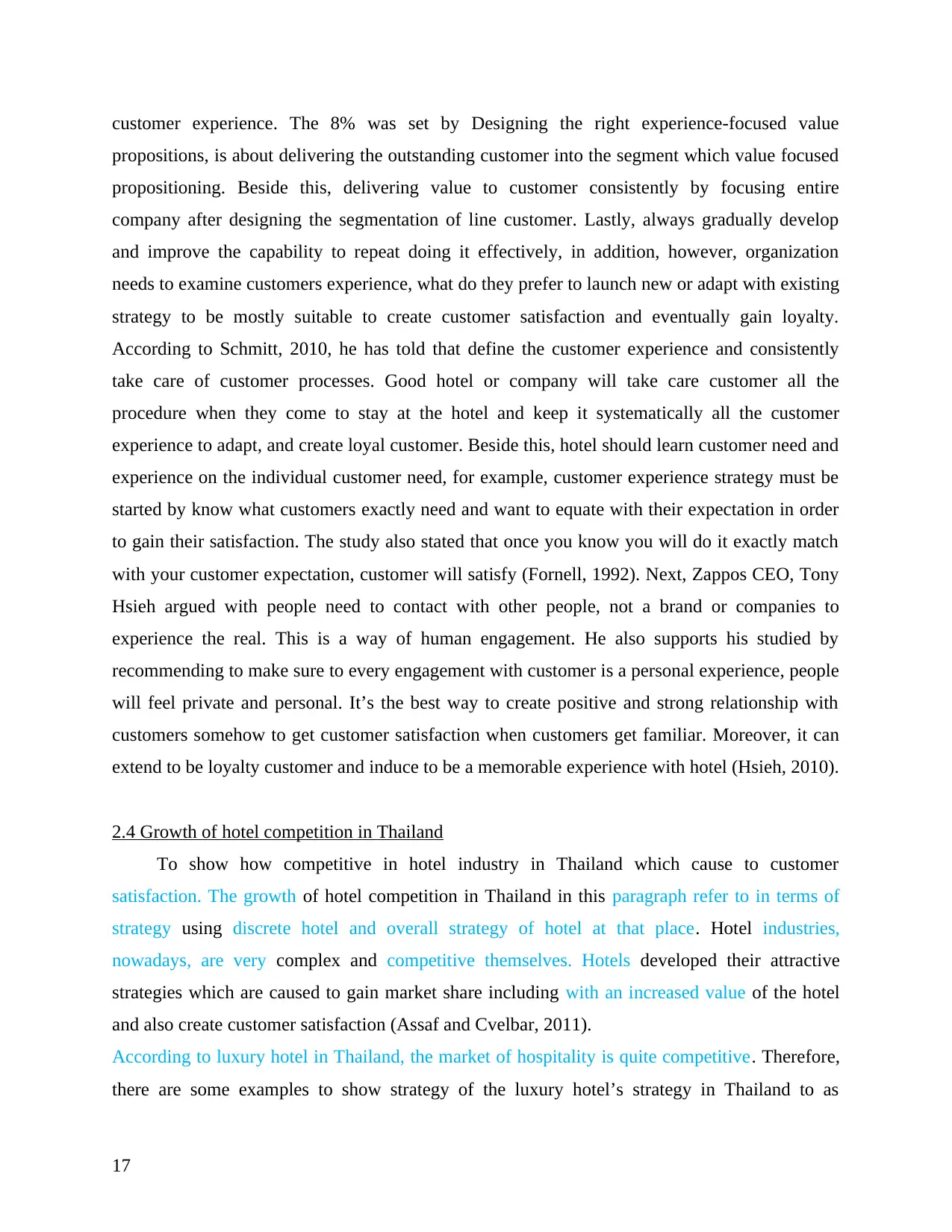
customer experience. The 8% was set by Designing the right experience-focused value
propositions, is about delivering the outstanding customer into the segment which value focused
propositioning. Beside this, delivering value to customer consistently by focusing entire
company after designing the segmentation of line customer. Lastly, always gradually develop
and improve the capability to repeat doing it effectively, in addition, however, organization
needs to examine customers experience, what do they prefer to launch new or adapt with existing
strategy to be mostly suitable to create customer satisfaction and eventually gain loyalty.
According to Schmitt, 2010, he has told that define the customer experience and consistently
take care of customer processes. Good hotel or company will take care customer all the
procedure when they come to stay at the hotel and keep it systematically all the customer
experience to adapt, and create loyal customer. Beside this, hotel should learn customer need and
experience on the individual customer need, for example, customer experience strategy must be
started by know what customers exactly need and want to equate with their expectation in order
to gain their satisfaction. The study also stated that once you know you will do it exactly match
with your customer expectation, customer will satisfy (Fornell, 1992). Next, Zappos CEO, Tony
Hsieh argued with people need to contact with other people, not a brand or companies to
experience the real. This is a way of human engagement. He also supports his studied by
recommending to make sure to every engagement with customer is a personal experience, people
will feel private and personal. It’s the best way to create positive and strong relationship with
customers somehow to get customer satisfaction when customers get familiar. Moreover, it can
extend to be loyalty customer and induce to be a memorable experience with hotel (Hsieh, 2010).
2.4 Growth of hotel competition in Thailand
To show how competitive in hotel industry in Thailand which cause to customer
satisfaction. The growth of hotel competition in Thailand in this paragraph refer to in terms of
strategy using discrete hotel and overall strategy of hotel at that place. Hotel industries,
nowadays, are very complex and competitive themselves. Hotels developed their attractive
strategies which are caused to gain market share including with an increased value of the hotel
and also create customer satisfaction (Assaf and Cvelbar, 2011).
According to luxury hotel in Thailand, the market of hospitality is quite competitive. Therefore,
there are some examples to show strategy of the luxury hotel’s strategy in Thailand to as
17
propositions, is about delivering the outstanding customer into the segment which value focused
propositioning. Beside this, delivering value to customer consistently by focusing entire
company after designing the segmentation of line customer. Lastly, always gradually develop
and improve the capability to repeat doing it effectively, in addition, however, organization
needs to examine customers experience, what do they prefer to launch new or adapt with existing
strategy to be mostly suitable to create customer satisfaction and eventually gain loyalty.
According to Schmitt, 2010, he has told that define the customer experience and consistently
take care of customer processes. Good hotel or company will take care customer all the
procedure when they come to stay at the hotel and keep it systematically all the customer
experience to adapt, and create loyal customer. Beside this, hotel should learn customer need and
experience on the individual customer need, for example, customer experience strategy must be
started by know what customers exactly need and want to equate with their expectation in order
to gain their satisfaction. The study also stated that once you know you will do it exactly match
with your customer expectation, customer will satisfy (Fornell, 1992). Next, Zappos CEO, Tony
Hsieh argued with people need to contact with other people, not a brand or companies to
experience the real. This is a way of human engagement. He also supports his studied by
recommending to make sure to every engagement with customer is a personal experience, people
will feel private and personal. It’s the best way to create positive and strong relationship with
customers somehow to get customer satisfaction when customers get familiar. Moreover, it can
extend to be loyalty customer and induce to be a memorable experience with hotel (Hsieh, 2010).
2.4 Growth of hotel competition in Thailand
To show how competitive in hotel industry in Thailand which cause to customer
satisfaction. The growth of hotel competition in Thailand in this paragraph refer to in terms of
strategy using discrete hotel and overall strategy of hotel at that place. Hotel industries,
nowadays, are very complex and competitive themselves. Hotels developed their attractive
strategies which are caused to gain market share including with an increased value of the hotel
and also create customer satisfaction (Assaf and Cvelbar, 2011).
According to luxury hotel in Thailand, the market of hospitality is quite competitive. Therefore,
there are some examples to show strategy of the luxury hotel’s strategy in Thailand to as
17
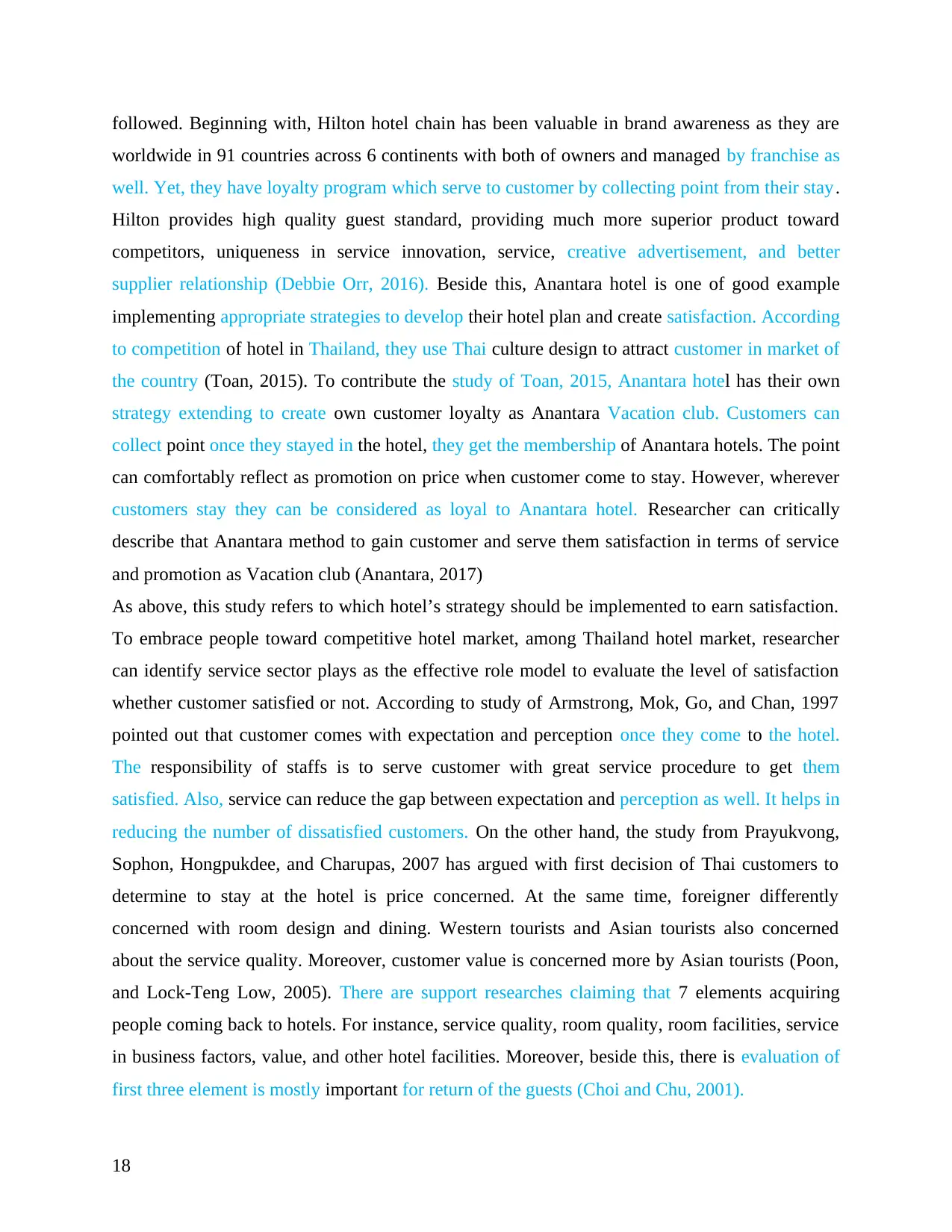
followed. Beginning with, Hilton hotel chain has been valuable in brand awareness as they are
worldwide in 91 countries across 6 continents with both of owners and managed by franchise as
well. Yet, they have loyalty program which serve to customer by collecting point from their stay.
Hilton provides high quality guest standard, providing much more superior product toward
competitors, uniqueness in service innovation, service, creative advertisement, and better
supplier relationship (Debbie Orr, 2016). Beside this, Anantara hotel is one of good example
implementing appropriate strategies to develop their hotel plan and create satisfaction. According
to competition of hotel in Thailand, they use Thai culture design to attract customer in market of
the country (Toan, 2015). To contribute the study of Toan, 2015, Anantara hotel has their own
strategy extending to create own customer loyalty as Anantara Vacation club. Customers can
collect point once they stayed in the hotel, they get the membership of Anantara hotels. The point
can comfortably reflect as promotion on price when customer come to stay. However, wherever
customers stay they can be considered as loyal to Anantara hotel. Researcher can critically
describe that Anantara method to gain customer and serve them satisfaction in terms of service
and promotion as Vacation club (Anantara, 2017)
As above, this study refers to which hotel’s strategy should be implemented to earn satisfaction.
To embrace people toward competitive hotel market, among Thailand hotel market, researcher
can identify service sector plays as the effective role model to evaluate the level of satisfaction
whether customer satisfied or not. According to study of Armstrong, Mok, Go, and Chan, 1997
pointed out that customer comes with expectation and perception once they come to the hotel.
The responsibility of staffs is to serve customer with great service procedure to get them
satisfied. Also, service can reduce the gap between expectation and perception as well. It helps in
reducing the number of dissatisfied customers. On the other hand, the study from Prayukvong,
Sophon, Hongpukdee, and Charupas, 2007 has argued with first decision of Thai customers to
determine to stay at the hotel is price concerned. At the same time, foreigner differently
concerned with room design and dining. Western tourists and Asian tourists also concerned
about the service quality. Moreover, customer value is concerned more by Asian tourists (Poon,
and Lock-Teng Low, 2005). There are support researches claiming that 7 elements acquiring
people coming back to hotels. For instance, service quality, room quality, room facilities, service
in business factors, value, and other hotel facilities. Moreover, beside this, there is evaluation of
first three element is mostly important for return of the guests (Choi and Chu, 2001).
18
worldwide in 91 countries across 6 continents with both of owners and managed by franchise as
well. Yet, they have loyalty program which serve to customer by collecting point from their stay.
Hilton provides high quality guest standard, providing much more superior product toward
competitors, uniqueness in service innovation, service, creative advertisement, and better
supplier relationship (Debbie Orr, 2016). Beside this, Anantara hotel is one of good example
implementing appropriate strategies to develop their hotel plan and create satisfaction. According
to competition of hotel in Thailand, they use Thai culture design to attract customer in market of
the country (Toan, 2015). To contribute the study of Toan, 2015, Anantara hotel has their own
strategy extending to create own customer loyalty as Anantara Vacation club. Customers can
collect point once they stayed in the hotel, they get the membership of Anantara hotels. The point
can comfortably reflect as promotion on price when customer come to stay. However, wherever
customers stay they can be considered as loyal to Anantara hotel. Researcher can critically
describe that Anantara method to gain customer and serve them satisfaction in terms of service
and promotion as Vacation club (Anantara, 2017)
As above, this study refers to which hotel’s strategy should be implemented to earn satisfaction.
To embrace people toward competitive hotel market, among Thailand hotel market, researcher
can identify service sector plays as the effective role model to evaluate the level of satisfaction
whether customer satisfied or not. According to study of Armstrong, Mok, Go, and Chan, 1997
pointed out that customer comes with expectation and perception once they come to the hotel.
The responsibility of staffs is to serve customer with great service procedure to get them
satisfied. Also, service can reduce the gap between expectation and perception as well. It helps in
reducing the number of dissatisfied customers. On the other hand, the study from Prayukvong,
Sophon, Hongpukdee, and Charupas, 2007 has argued with first decision of Thai customers to
determine to stay at the hotel is price concerned. At the same time, foreigner differently
concerned with room design and dining. Western tourists and Asian tourists also concerned
about the service quality. Moreover, customer value is concerned more by Asian tourists (Poon,
and Lock-Teng Low, 2005). There are support researches claiming that 7 elements acquiring
people coming back to hotels. For instance, service quality, room quality, room facilities, service
in business factors, value, and other hotel facilities. Moreover, beside this, there is evaluation of
first three element is mostly important for return of the guests (Choi and Chu, 2001).
18
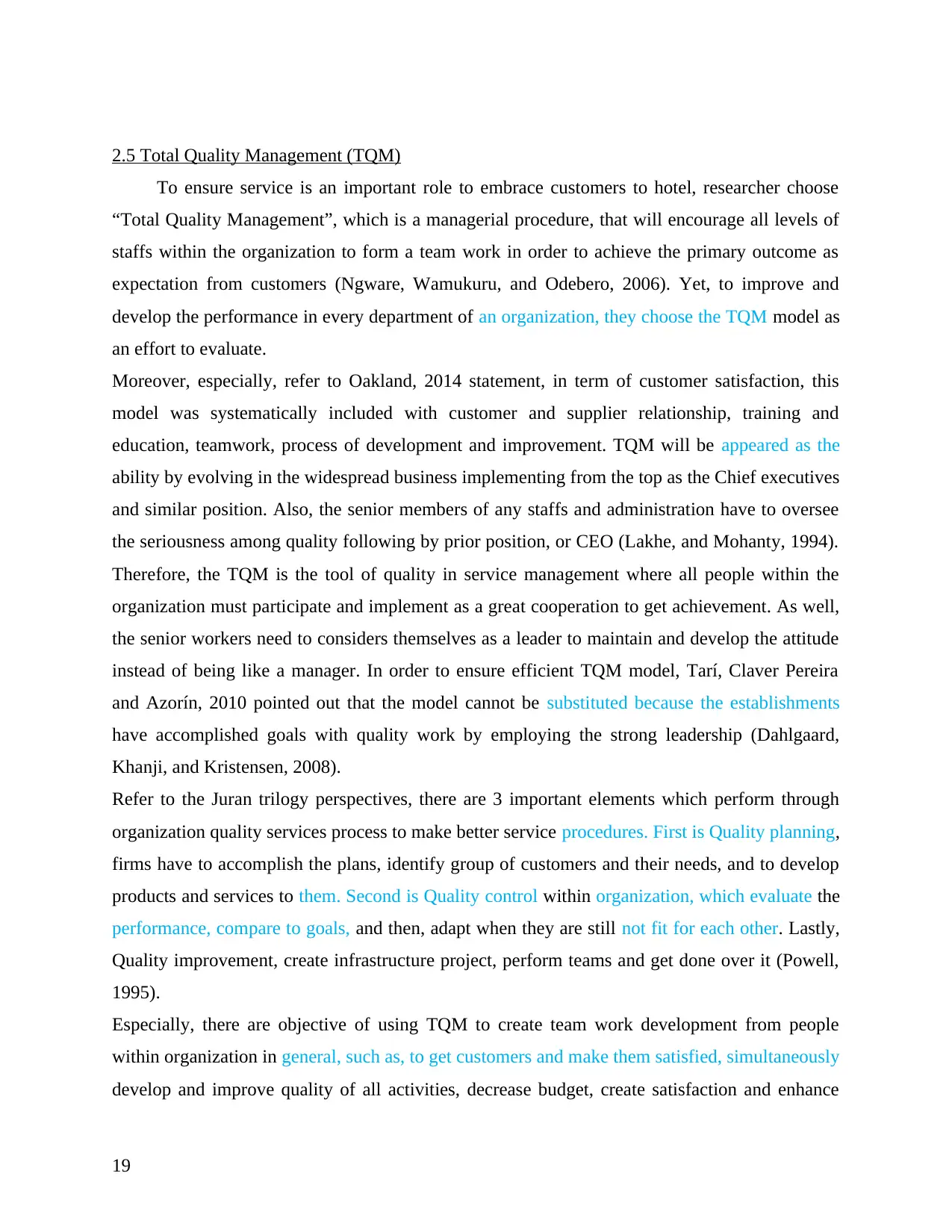
2.5 Total Quality Management (TQM)
To ensure service is an important role to embrace customers to hotel, researcher choose
“Total Quality Management”, which is a managerial procedure, that will encourage all levels of
staffs within the organization to form a team work in order to achieve the primary outcome as
expectation from customers (Ngware, Wamukuru, and Odebero, 2006). Yet, to improve and
develop the performance in every department of an organization, they choose the TQM model as
an effort to evaluate.
Moreover, especially, refer to Oakland, 2014 statement, in term of customer satisfaction, this
model was systematically included with customer and supplier relationship, training and
education, teamwork, process of development and improvement. TQM will be appeared as the
ability by evolving in the widespread business implementing from the top as the Chief executives
and similar position. Also, the senior members of any staffs and administration have to oversee
the seriousness among quality following by prior position, or CEO (Lakhe, and Mohanty, 1994).
Therefore, the TQM is the tool of quality in service management where all people within the
organization must participate and implement as a great cooperation to get achievement. As well,
the senior workers need to considers themselves as a leader to maintain and develop the attitude
instead of being like a manager. In order to ensure efficient TQM model, Tarí, Claver Pereira
and Azorín, 2010 pointed out that the model cannot be substituted because the establishments
have accomplished goals with quality work by employing the strong leadership (Dahlgaard,
Khanji, and Kristensen, 2008).
Refer to the Juran trilogy perspectives, there are 3 important elements which perform through
organization quality services process to make better service procedures. First is Quality planning,
firms have to accomplish the plans, identify group of customers and their needs, and to develop
products and services to them. Second is Quality control within organization, which evaluate the
performance, compare to goals, and then, adapt when they are still not fit for each other. Lastly,
Quality improvement, create infrastructure project, perform teams and get done over it (Powell,
1995).
Especially, there are objective of using TQM to create team work development from people
within organization in general, such as, to get customers and make them satisfied, simultaneously
develop and improve quality of all activities, decrease budget, create satisfaction and enhance
19
To ensure service is an important role to embrace customers to hotel, researcher choose
“Total Quality Management”, which is a managerial procedure, that will encourage all levels of
staffs within the organization to form a team work in order to achieve the primary outcome as
expectation from customers (Ngware, Wamukuru, and Odebero, 2006). Yet, to improve and
develop the performance in every department of an organization, they choose the TQM model as
an effort to evaluate.
Moreover, especially, refer to Oakland, 2014 statement, in term of customer satisfaction, this
model was systematically included with customer and supplier relationship, training and
education, teamwork, process of development and improvement. TQM will be appeared as the
ability by evolving in the widespread business implementing from the top as the Chief executives
and similar position. Also, the senior members of any staffs and administration have to oversee
the seriousness among quality following by prior position, or CEO (Lakhe, and Mohanty, 1994).
Therefore, the TQM is the tool of quality in service management where all people within the
organization must participate and implement as a great cooperation to get achievement. As well,
the senior workers need to considers themselves as a leader to maintain and develop the attitude
instead of being like a manager. In order to ensure efficient TQM model, Tarí, Claver Pereira
and Azorín, 2010 pointed out that the model cannot be substituted because the establishments
have accomplished goals with quality work by employing the strong leadership (Dahlgaard,
Khanji, and Kristensen, 2008).
Refer to the Juran trilogy perspectives, there are 3 important elements which perform through
organization quality services process to make better service procedures. First is Quality planning,
firms have to accomplish the plans, identify group of customers and their needs, and to develop
products and services to them. Second is Quality control within organization, which evaluate the
performance, compare to goals, and then, adapt when they are still not fit for each other. Lastly,
Quality improvement, create infrastructure project, perform teams and get done over it (Powell,
1995).
Especially, there are objective of using TQM to create team work development from people
within organization in general, such as, to get customers and make them satisfied, simultaneously
develop and improve quality of all activities, decrease budget, create satisfaction and enhance
19
Paraphrase This Document
Need a fresh take? Get an instant paraphrase of this document with our AI Paraphraser
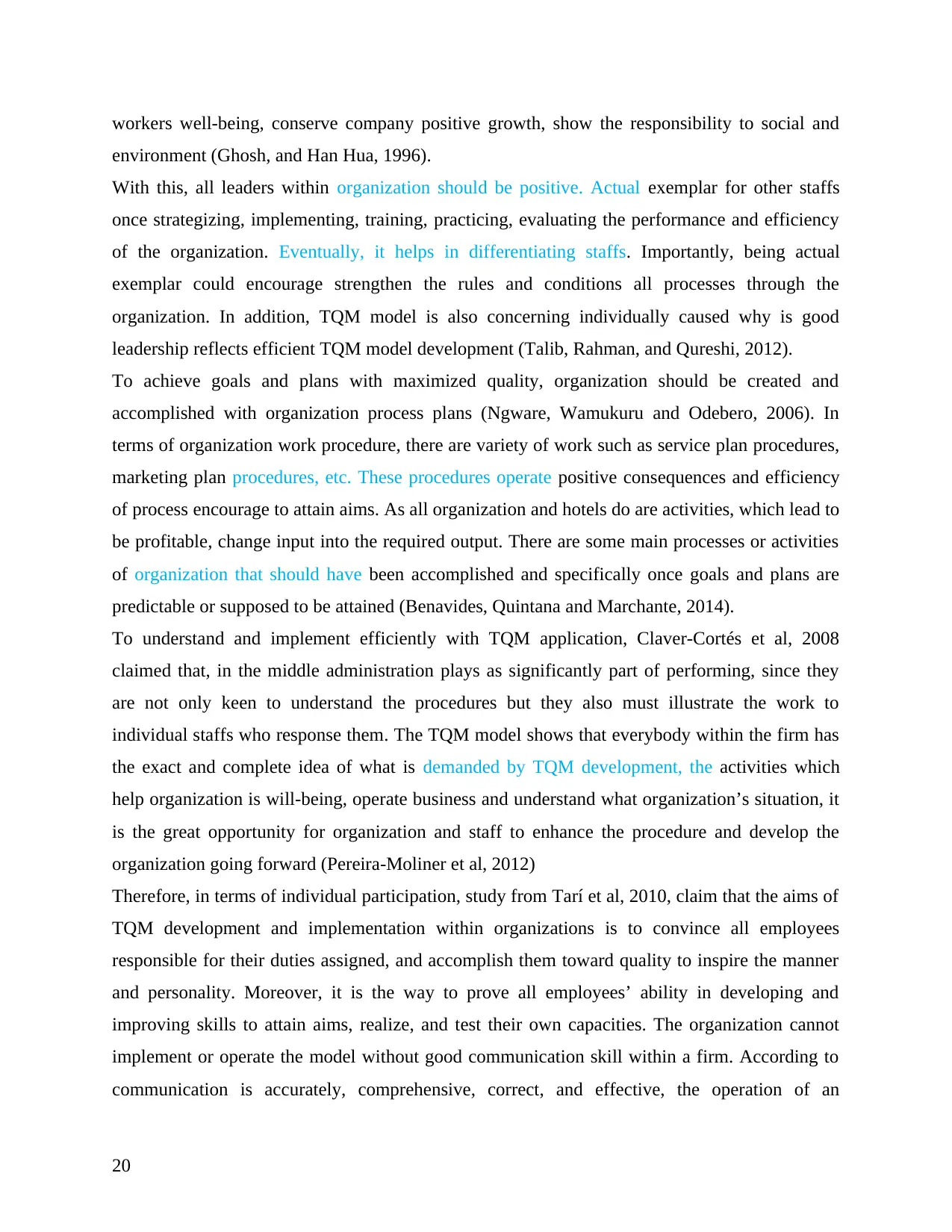
workers well-being, conserve company positive growth, show the responsibility to social and
environment (Ghosh, and Han Hua, 1996).
With this, all leaders within organization should be positive. Actual exemplar for other staffs
once strategizing, implementing, training, practicing, evaluating the performance and efficiency
of the organization. Eventually, it helps in differentiating staffs. Importantly, being actual
exemplar could encourage strengthen the rules and conditions all processes through the
organization. In addition, TQM model is also concerning individually caused why is good
leadership reflects efficient TQM model development (Talib, Rahman, and Qureshi, 2012).
To achieve goals and plans with maximized quality, organization should be created and
accomplished with organization process plans (Ngware, Wamukuru and Odebero, 2006). In
terms of organization work procedure, there are variety of work such as service plan procedures,
marketing plan procedures, etc. These procedures operate positive consequences and efficiency
of process encourage to attain aims. As all organization and hotels do are activities, which lead to
be profitable, change input into the required output. There are some main processes or activities
of organization that should have been accomplished and specifically once goals and plans are
predictable or supposed to be attained (Benavides, Quintana and Marchante, 2014).
To understand and implement efficiently with TQM application, Claver-Cortés et al, 2008
claimed that, in the middle administration plays as significantly part of performing, since they
are not only keen to understand the procedures but they also must illustrate the work to
individual staffs who response them. The TQM model shows that everybody within the firm has
the exact and complete idea of what is demanded by TQM development, the activities which
help organization is will-being, operate business and understand what organization’s situation, it
is the great opportunity for organization and staff to enhance the procedure and develop the
organization going forward (Pereira-Moliner et al, 2012)
Therefore, in terms of individual participation, study from Tarí et al, 2010, claim that the aims of
TQM development and implementation within organizations is to convince all employees
responsible for their duties assigned, and accomplish them toward quality to inspire the manner
and personality. Moreover, it is the way to prove all employees’ ability in developing and
improving skills to attain aims, realize, and test their own capacities. The organization cannot
implement or operate the model without good communication skill within a firm. According to
communication is accurately, comprehensive, correct, and effective, the operation of an
20
environment (Ghosh, and Han Hua, 1996).
With this, all leaders within organization should be positive. Actual exemplar for other staffs
once strategizing, implementing, training, practicing, evaluating the performance and efficiency
of the organization. Eventually, it helps in differentiating staffs. Importantly, being actual
exemplar could encourage strengthen the rules and conditions all processes through the
organization. In addition, TQM model is also concerning individually caused why is good
leadership reflects efficient TQM model development (Talib, Rahman, and Qureshi, 2012).
To achieve goals and plans with maximized quality, organization should be created and
accomplished with organization process plans (Ngware, Wamukuru and Odebero, 2006). In
terms of organization work procedure, there are variety of work such as service plan procedures,
marketing plan procedures, etc. These procedures operate positive consequences and efficiency
of process encourage to attain aims. As all organization and hotels do are activities, which lead to
be profitable, change input into the required output. There are some main processes or activities
of organization that should have been accomplished and specifically once goals and plans are
predictable or supposed to be attained (Benavides, Quintana and Marchante, 2014).
To understand and implement efficiently with TQM application, Claver-Cortés et al, 2008
claimed that, in the middle administration plays as significantly part of performing, since they
are not only keen to understand the procedures but they also must illustrate the work to
individual staffs who response them. The TQM model shows that everybody within the firm has
the exact and complete idea of what is demanded by TQM development, the activities which
help organization is will-being, operate business and understand what organization’s situation, it
is the great opportunity for organization and staff to enhance the procedure and develop the
organization going forward (Pereira-Moliner et al, 2012)
Therefore, in terms of individual participation, study from Tarí et al, 2010, claim that the aims of
TQM development and implementation within organizations is to convince all employees
responsible for their duties assigned, and accomplish them toward quality to inspire the manner
and personality. Moreover, it is the way to prove all employees’ ability in developing and
improving skills to attain aims, realize, and test their own capacities. The organization cannot
implement or operate the model without good communication skill within a firm. According to
communication is accurately, comprehensive, correct, and effective, the operation of an
20
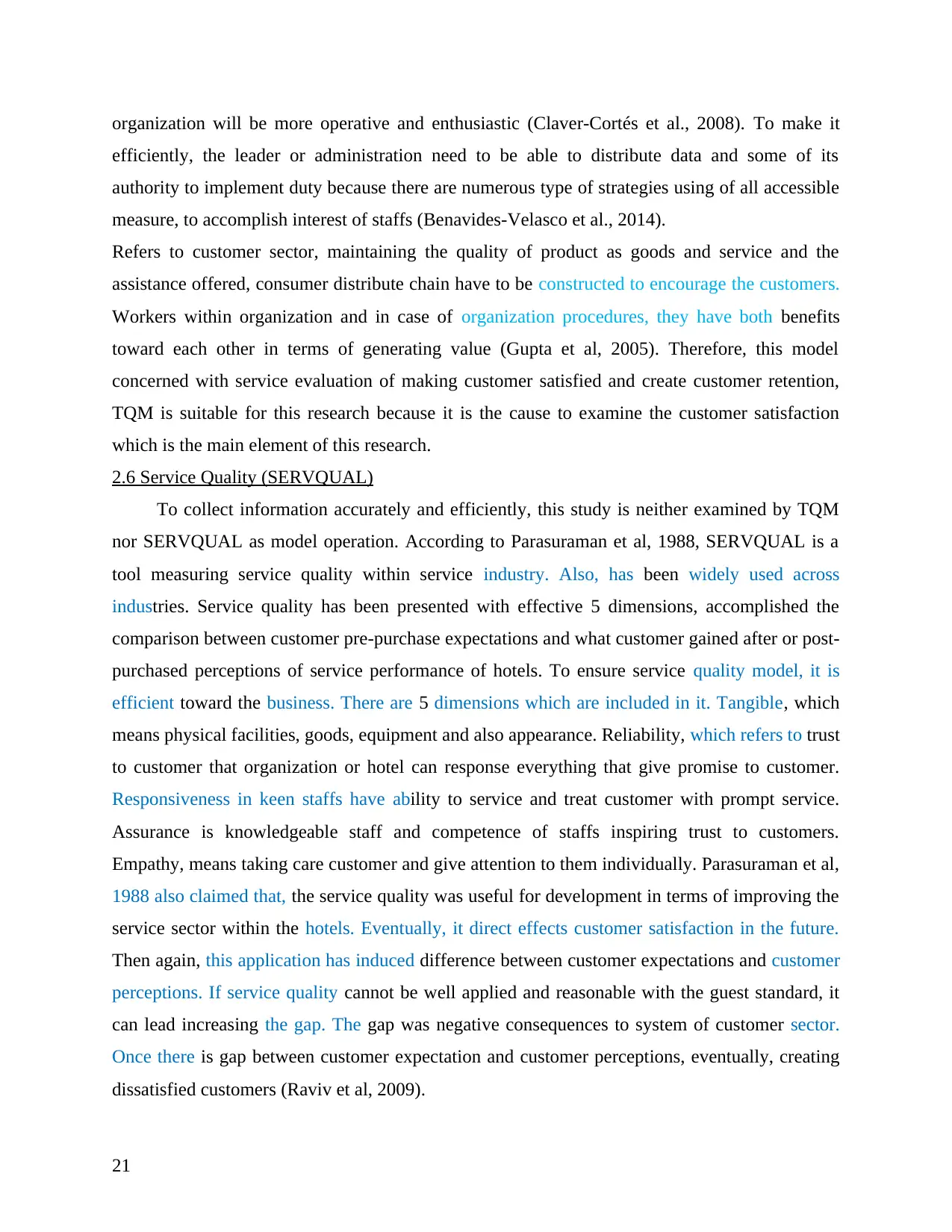
organization will be more operative and enthusiastic (Claver-Cortés et al., 2008). To make it
efficiently, the leader or administration need to be able to distribute data and some of its
authority to implement duty because there are numerous type of strategies using of all accessible
measure, to accomplish interest of staffs (Benavides-Velasco et al., 2014).
Refers to customer sector, maintaining the quality of product as goods and service and the
assistance offered, consumer distribute chain have to be constructed to encourage the customers.
Workers within organization and in case of organization procedures, they have both benefits
toward each other in terms of generating value (Gupta et al, 2005). Therefore, this model
concerned with service evaluation of making customer satisfied and create customer retention,
TQM is suitable for this research because it is the cause to examine the customer satisfaction
which is the main element of this research.
2.6 Service Quality (SERVQUAL)
To collect information accurately and efficiently, this study is neither examined by TQM
nor SERVQUAL as model operation. According to Parasuraman et al, 1988, SERVQUAL is a
tool measuring service quality within service industry. Also, has been widely used across
industries. Service quality has been presented with effective 5 dimensions, accomplished the
comparison between customer pre-purchase expectations and what customer gained after or post-
purchased perceptions of service performance of hotels. To ensure service quality model, it is
efficient toward the business. There are 5 dimensions which are included in it. Tangible, which
means physical facilities, goods, equipment and also appearance. Reliability, which refers to trust
to customer that organization or hotel can response everything that give promise to customer.
Responsiveness in keen staffs have ability to service and treat customer with prompt service.
Assurance is knowledgeable staff and competence of staffs inspiring trust to customers.
Empathy, means taking care customer and give attention to them individually. Parasuraman et al,
1988 also claimed that, the service quality was useful for development in terms of improving the
service sector within the hotels. Eventually, it direct effects customer satisfaction in the future.
Then again, this application has induced difference between customer expectations and customer
perceptions. If service quality cannot be well applied and reasonable with the guest standard, it
can lead increasing the gap. The gap was negative consequences to system of customer sector.
Once there is gap between customer expectation and customer perceptions, eventually, creating
dissatisfied customers (Raviv et al, 2009).
21
efficiently, the leader or administration need to be able to distribute data and some of its
authority to implement duty because there are numerous type of strategies using of all accessible
measure, to accomplish interest of staffs (Benavides-Velasco et al., 2014).
Refers to customer sector, maintaining the quality of product as goods and service and the
assistance offered, consumer distribute chain have to be constructed to encourage the customers.
Workers within organization and in case of organization procedures, they have both benefits
toward each other in terms of generating value (Gupta et al, 2005). Therefore, this model
concerned with service evaluation of making customer satisfied and create customer retention,
TQM is suitable for this research because it is the cause to examine the customer satisfaction
which is the main element of this research.
2.6 Service Quality (SERVQUAL)
To collect information accurately and efficiently, this study is neither examined by TQM
nor SERVQUAL as model operation. According to Parasuraman et al, 1988, SERVQUAL is a
tool measuring service quality within service industry. Also, has been widely used across
industries. Service quality has been presented with effective 5 dimensions, accomplished the
comparison between customer pre-purchase expectations and what customer gained after or post-
purchased perceptions of service performance of hotels. To ensure service quality model, it is
efficient toward the business. There are 5 dimensions which are included in it. Tangible, which
means physical facilities, goods, equipment and also appearance. Reliability, which refers to trust
to customer that organization or hotel can response everything that give promise to customer.
Responsiveness in keen staffs have ability to service and treat customer with prompt service.
Assurance is knowledgeable staff and competence of staffs inspiring trust to customers.
Empathy, means taking care customer and give attention to them individually. Parasuraman et al,
1988 also claimed that, the service quality was useful for development in terms of improving the
service sector within the hotels. Eventually, it direct effects customer satisfaction in the future.
Then again, this application has induced difference between customer expectations and customer
perceptions. If service quality cannot be well applied and reasonable with the guest standard, it
can lead increasing the gap. The gap was negative consequences to system of customer sector.
Once there is gap between customer expectation and customer perceptions, eventually, creating
dissatisfied customers (Raviv et al, 2009).
21
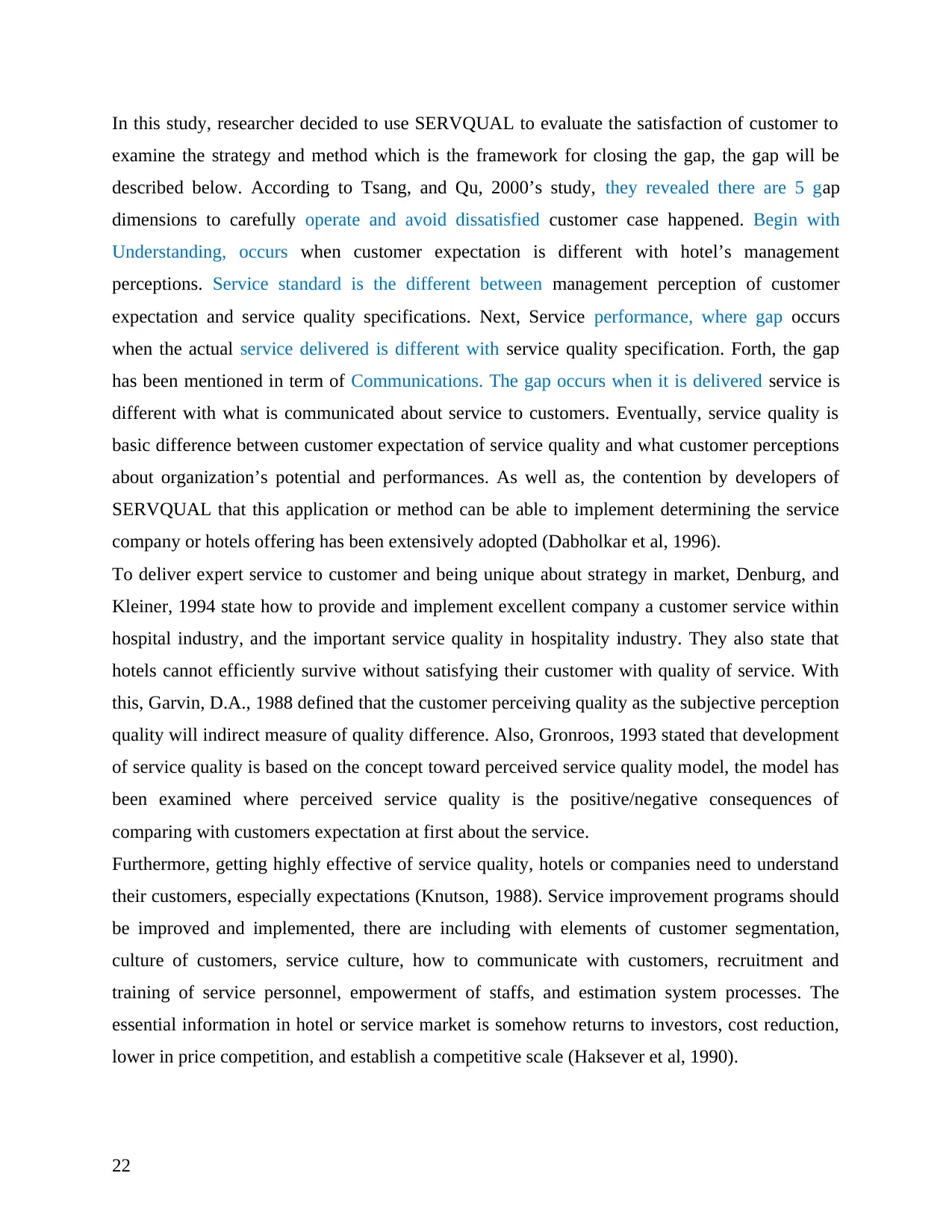
In this study, researcher decided to use SERVQUAL to evaluate the satisfaction of customer to
examine the strategy and method which is the framework for closing the gap, the gap will be
described below. According to Tsang, and Qu, 2000’s study, they revealed there are 5 gap
dimensions to carefully operate and avoid dissatisfied customer case happened. Begin with
Understanding, occurs when customer expectation is different with hotel’s management
perceptions. Service standard is the different between management perception of customer
expectation and service quality specifications. Next, Service performance, where gap occurs
when the actual service delivered is different with service quality specification. Forth, the gap
has been mentioned in term of Communications. The gap occurs when it is delivered service is
different with what is communicated about service to customers. Eventually, service quality is
basic difference between customer expectation of service quality and what customer perceptions
about organization’s potential and performances. As well as, the contention by developers of
SERVQUAL that this application or method can be able to implement determining the service
company or hotels offering has been extensively adopted (Dabholkar et al, 1996).
To deliver expert service to customer and being unique about strategy in market, Denburg, and
Kleiner, 1994 state how to provide and implement excellent company a customer service within
hospital industry, and the important service quality in hospitality industry. They also state that
hotels cannot efficiently survive without satisfying their customer with quality of service. With
this, Garvin, D.A., 1988 defined that the customer perceiving quality as the subjective perception
quality will indirect measure of quality difference. Also, Gronroos, 1993 stated that development
of service quality is based on the concept toward perceived service quality model, the model has
been examined where perceived service quality is the positive/negative consequences of
comparing with customers expectation at first about the service.
Furthermore, getting highly effective of service quality, hotels or companies need to understand
their customers, especially expectations (Knutson, 1988). Service improvement programs should
be improved and implemented, there are including with elements of customer segmentation,
culture of customers, service culture, how to communicate with customers, recruitment and
training of service personnel, empowerment of staffs, and estimation system processes. The
essential information in hotel or service market is somehow returns to investors, cost reduction,
lower in price competition, and establish a competitive scale (Haksever et al, 1990).
22
examine the strategy and method which is the framework for closing the gap, the gap will be
described below. According to Tsang, and Qu, 2000’s study, they revealed there are 5 gap
dimensions to carefully operate and avoid dissatisfied customer case happened. Begin with
Understanding, occurs when customer expectation is different with hotel’s management
perceptions. Service standard is the different between management perception of customer
expectation and service quality specifications. Next, Service performance, where gap occurs
when the actual service delivered is different with service quality specification. Forth, the gap
has been mentioned in term of Communications. The gap occurs when it is delivered service is
different with what is communicated about service to customers. Eventually, service quality is
basic difference between customer expectation of service quality and what customer perceptions
about organization’s potential and performances. As well as, the contention by developers of
SERVQUAL that this application or method can be able to implement determining the service
company or hotels offering has been extensively adopted (Dabholkar et al, 1996).
To deliver expert service to customer and being unique about strategy in market, Denburg, and
Kleiner, 1994 state how to provide and implement excellent company a customer service within
hospital industry, and the important service quality in hospitality industry. They also state that
hotels cannot efficiently survive without satisfying their customer with quality of service. With
this, Garvin, D.A., 1988 defined that the customer perceiving quality as the subjective perception
quality will indirect measure of quality difference. Also, Gronroos, 1993 stated that development
of service quality is based on the concept toward perceived service quality model, the model has
been examined where perceived service quality is the positive/negative consequences of
comparing with customers expectation at first about the service.
Furthermore, getting highly effective of service quality, hotels or companies need to understand
their customers, especially expectations (Knutson, 1988). Service improvement programs should
be improved and implemented, there are including with elements of customer segmentation,
culture of customers, service culture, how to communicate with customers, recruitment and
training of service personnel, empowerment of staffs, and estimation system processes. The
essential information in hotel or service market is somehow returns to investors, cost reduction,
lower in price competition, and establish a competitive scale (Haksever et al, 1990).
22
Secure Best Marks with AI Grader
Need help grading? Try our AI Grader for instant feedback on your assignments.
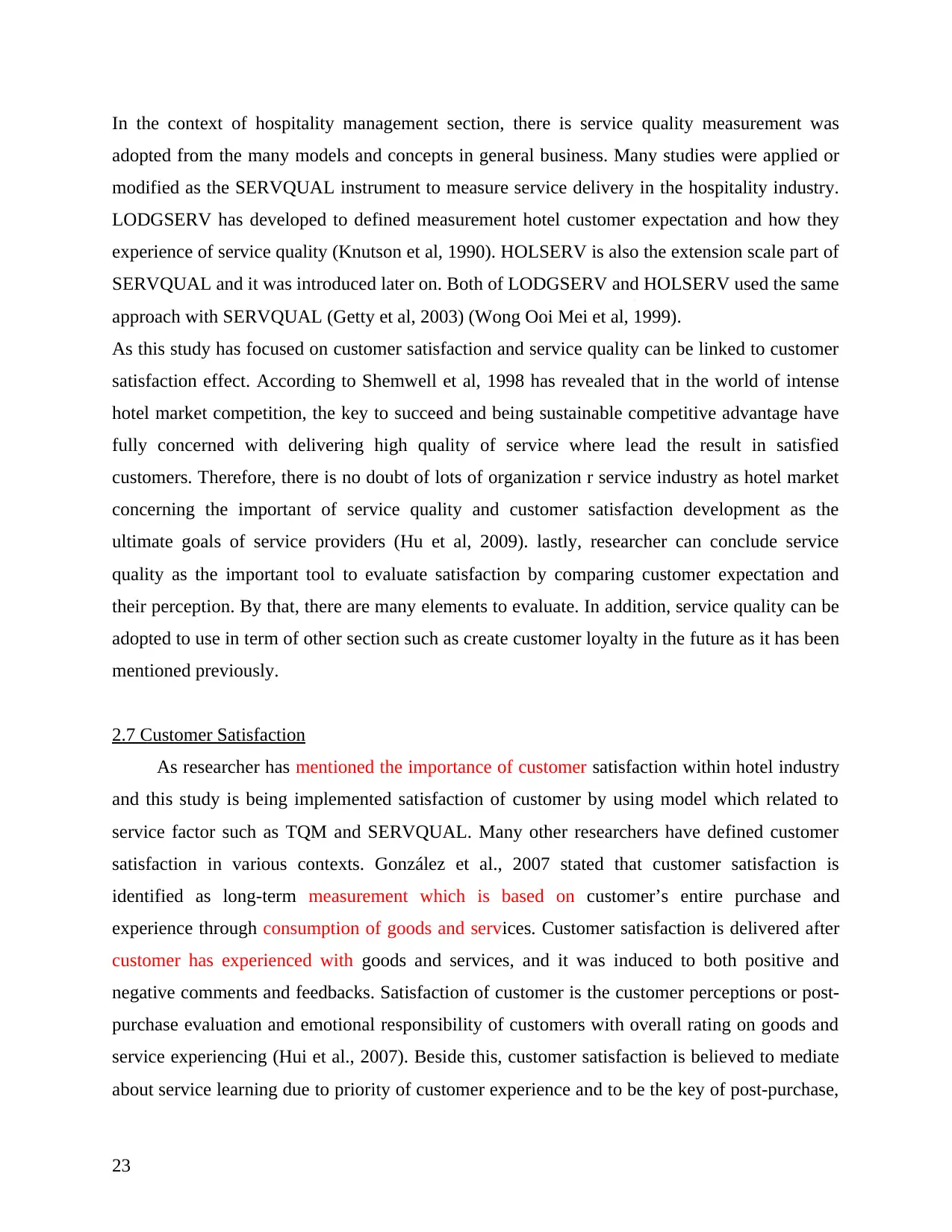
In the context of hospitality management section, there is service quality measurement was
adopted from the many models and concepts in general business. Many studies were applied or
modified as the SERVQUAL instrument to measure service delivery in the hospitality industry.
LODGSERV has developed to defined measurement hotel customer expectation and how they
experience of service quality (Knutson et al, 1990). HOLSERV is also the extension scale part of
SERVQUAL and it was introduced later on. Both of LODGSERV and HOLSERV used the same
approach with SERVQUAL (Getty et al, 2003) (Wong Ooi Mei et al, 1999).
As this study has focused on customer satisfaction and service quality can be linked to customer
satisfaction effect. According to Shemwell et al, 1998 has revealed that in the world of intense
hotel market competition, the key to succeed and being sustainable competitive advantage have
fully concerned with delivering high quality of service where lead the result in satisfied
customers. Therefore, there is no doubt of lots of organization r service industry as hotel market
concerning the important of service quality and customer satisfaction development as the
ultimate goals of service providers (Hu et al, 2009). lastly, researcher can conclude service
quality as the important tool to evaluate satisfaction by comparing customer expectation and
their perception. By that, there are many elements to evaluate. In addition, service quality can be
adopted to use in term of other section such as create customer loyalty in the future as it has been
mentioned previously.
2.7 Customer Satisfaction
As researcher has mentioned the importance of customer satisfaction within hotel industry
and this study is being implemented satisfaction of customer by using model which related to
service factor such as TQM and SERVQUAL. Many other researchers have defined customer
satisfaction in various contexts. González et al., 2007 stated that customer satisfaction is
identified as long-term measurement which is based on customer’s entire purchase and
experience through consumption of goods and services. Customer satisfaction is delivered after
customer has experienced with goods and services, and it was induced to both positive and
negative comments and feedbacks. Satisfaction of customer is the customer perceptions or post-
purchase evaluation and emotional responsibility of customers with overall rating on goods and
service experiencing (Hui et al., 2007). Beside this, customer satisfaction is believed to mediate
about service learning due to priority of customer experience and to be the key of post-purchase,
23
adopted from the many models and concepts in general business. Many studies were applied or
modified as the SERVQUAL instrument to measure service delivery in the hospitality industry.
LODGSERV has developed to defined measurement hotel customer expectation and how they
experience of service quality (Knutson et al, 1990). HOLSERV is also the extension scale part of
SERVQUAL and it was introduced later on. Both of LODGSERV and HOLSERV used the same
approach with SERVQUAL (Getty et al, 2003) (Wong Ooi Mei et al, 1999).
As this study has focused on customer satisfaction and service quality can be linked to customer
satisfaction effect. According to Shemwell et al, 1998 has revealed that in the world of intense
hotel market competition, the key to succeed and being sustainable competitive advantage have
fully concerned with delivering high quality of service where lead the result in satisfied
customers. Therefore, there is no doubt of lots of organization r service industry as hotel market
concerning the important of service quality and customer satisfaction development as the
ultimate goals of service providers (Hu et al, 2009). lastly, researcher can conclude service
quality as the important tool to evaluate satisfaction by comparing customer expectation and
their perception. By that, there are many elements to evaluate. In addition, service quality can be
adopted to use in term of other section such as create customer loyalty in the future as it has been
mentioned previously.
2.7 Customer Satisfaction
As researcher has mentioned the importance of customer satisfaction within hotel industry
and this study is being implemented satisfaction of customer by using model which related to
service factor such as TQM and SERVQUAL. Many other researchers have defined customer
satisfaction in various contexts. González et al., 2007 stated that customer satisfaction is
identified as long-term measurement which is based on customer’s entire purchase and
experience through consumption of goods and services. Customer satisfaction is delivered after
customer has experienced with goods and services, and it was induced to both positive and
negative comments and feedbacks. Satisfaction of customer is the customer perceptions or post-
purchase evaluation and emotional responsibility of customers with overall rating on goods and
service experiencing (Hui et al., 2007). Beside this, customer satisfaction is believed to mediate
about service learning due to priority of customer experience and to be the key of post-purchase,
23
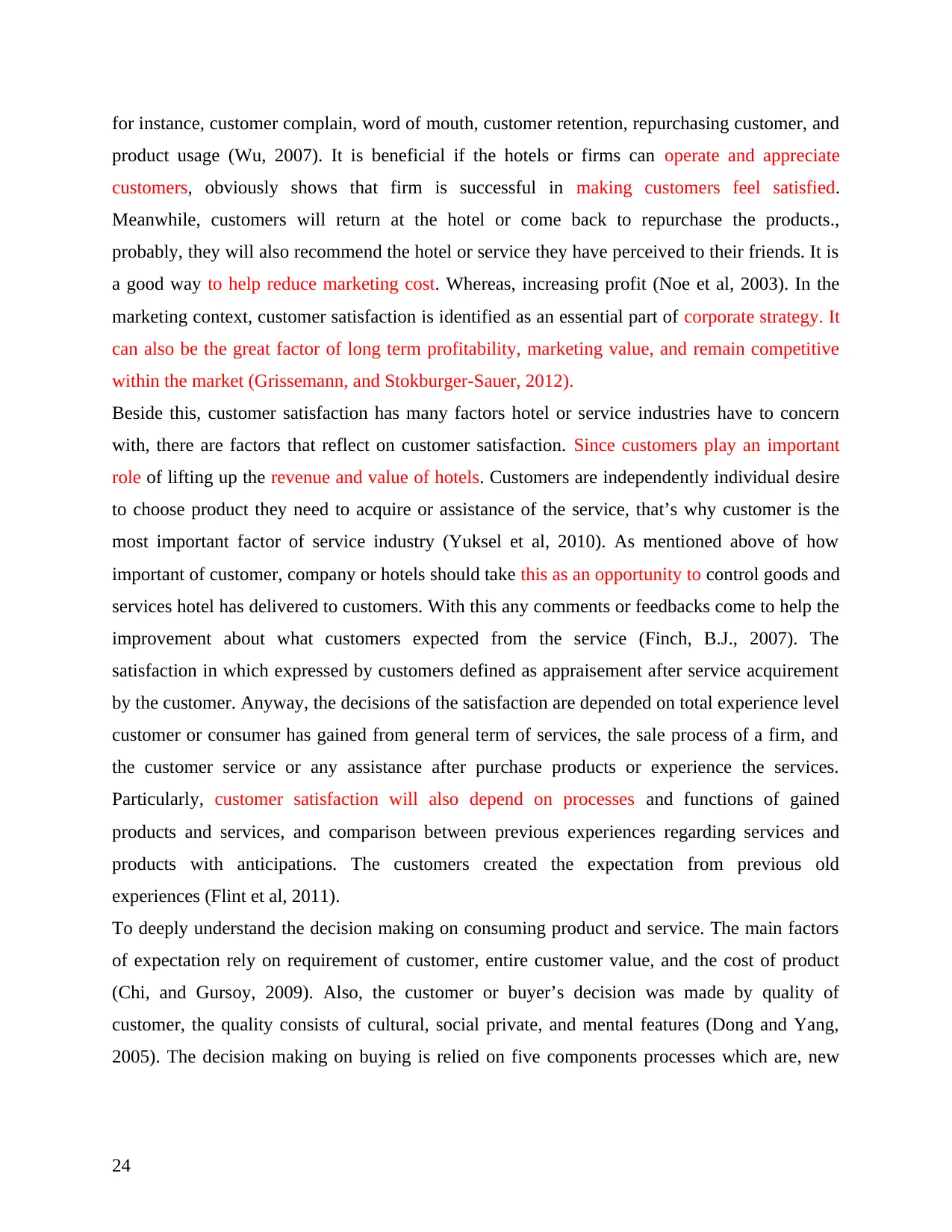
for instance, customer complain, word of mouth, customer retention, repurchasing customer, and
product usage (Wu, 2007). It is beneficial if the hotels or firms can operate and appreciate
customers, obviously shows that firm is successful in making customers feel satisfied.
Meanwhile, customers will return at the hotel or come back to repurchase the products.,
probably, they will also recommend the hotel or service they have perceived to their friends. It is
a good way to help reduce marketing cost. Whereas, increasing profit (Noe et al, 2003). In the
marketing context, customer satisfaction is identified as an essential part of corporate strategy. It
can also be the great factor of long term profitability, marketing value, and remain competitive
within the market (Grissemann, and Stokburger-Sauer, 2012).
Beside this, customer satisfaction has many factors hotel or service industries have to concern
with, there are factors that reflect on customer satisfaction. Since customers play an important
role of lifting up the revenue and value of hotels. Customers are independently individual desire
to choose product they need to acquire or assistance of the service, that’s why customer is the
most important factor of service industry (Yuksel et al, 2010). As mentioned above of how
important of customer, company or hotels should take this as an opportunity to control goods and
services hotel has delivered to customers. With this any comments or feedbacks come to help the
improvement about what customers expected from the service (Finch, B.J., 2007). The
satisfaction in which expressed by customers defined as appraisement after service acquirement
by the customer. Anyway, the decisions of the satisfaction are depended on total experience level
customer or consumer has gained from general term of services, the sale process of a firm, and
the customer service or any assistance after purchase products or experience the services.
Particularly, customer satisfaction will also depend on processes and functions of gained
products and services, and comparison between previous experiences regarding services and
products with anticipations. The customers created the expectation from previous old
experiences (Flint et al, 2011).
To deeply understand the decision making on consuming product and service. The main factors
of expectation rely on requirement of customer, entire customer value, and the cost of product
(Chi, and Gursoy, 2009). Also, the customer or buyer’s decision was made by quality of
customer, the quality consists of cultural, social private, and mental features (Dong and Yang,
2005). The decision making on buying is relied on five components processes which are, new
24
product usage (Wu, 2007). It is beneficial if the hotels or firms can operate and appreciate
customers, obviously shows that firm is successful in making customers feel satisfied.
Meanwhile, customers will return at the hotel or come back to repurchase the products.,
probably, they will also recommend the hotel or service they have perceived to their friends. It is
a good way to help reduce marketing cost. Whereas, increasing profit (Noe et al, 2003). In the
marketing context, customer satisfaction is identified as an essential part of corporate strategy. It
can also be the great factor of long term profitability, marketing value, and remain competitive
within the market (Grissemann, and Stokburger-Sauer, 2012).
Beside this, customer satisfaction has many factors hotel or service industries have to concern
with, there are factors that reflect on customer satisfaction. Since customers play an important
role of lifting up the revenue and value of hotels. Customers are independently individual desire
to choose product they need to acquire or assistance of the service, that’s why customer is the
most important factor of service industry (Yuksel et al, 2010). As mentioned above of how
important of customer, company or hotels should take this as an opportunity to control goods and
services hotel has delivered to customers. With this any comments or feedbacks come to help the
improvement about what customers expected from the service (Finch, B.J., 2007). The
satisfaction in which expressed by customers defined as appraisement after service acquirement
by the customer. Anyway, the decisions of the satisfaction are depended on total experience level
customer or consumer has gained from general term of services, the sale process of a firm, and
the customer service or any assistance after purchase products or experience the services.
Particularly, customer satisfaction will also depend on processes and functions of gained
products and services, and comparison between previous experiences regarding services and
products with anticipations. The customers created the expectation from previous old
experiences (Flint et al, 2011).
To deeply understand the decision making on consuming product and service. The main factors
of expectation rely on requirement of customer, entire customer value, and the cost of product
(Chi, and Gursoy, 2009). Also, the customer or buyer’s decision was made by quality of
customer, the quality consists of cultural, social private, and mental features (Dong and Yang,
2005). The decision making on buying is relied on five components processes which are, new
24
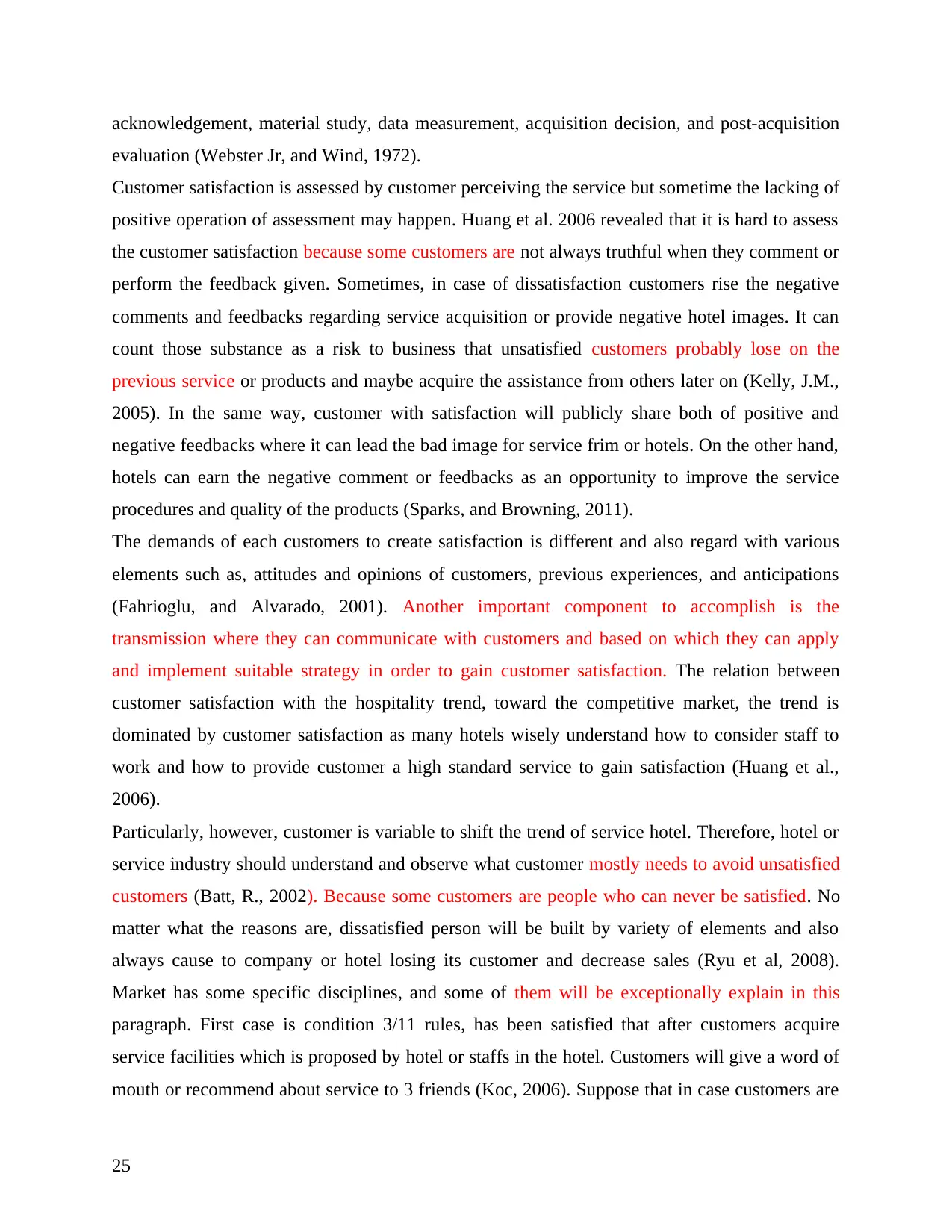
acknowledgement, material study, data measurement, acquisition decision, and post-acquisition
evaluation (Webster Jr, and Wind, 1972).
Customer satisfaction is assessed by customer perceiving the service but sometime the lacking of
positive operation of assessment may happen. Huang et al. 2006 revealed that it is hard to assess
the customer satisfaction because some customers are not always truthful when they comment or
perform the feedback given. Sometimes, in case of dissatisfaction customers rise the negative
comments and feedbacks regarding service acquisition or provide negative hotel images. It can
count those substance as a risk to business that unsatisfied customers probably lose on the
previous service or products and maybe acquire the assistance from others later on (Kelly, J.M.,
2005). In the same way, customer with satisfaction will publicly share both of positive and
negative feedbacks where it can lead the bad image for service frim or hotels. On the other hand,
hotels can earn the negative comment or feedbacks as an opportunity to improve the service
procedures and quality of the products (Sparks, and Browning, 2011).
The demands of each customers to create satisfaction is different and also regard with various
elements such as, attitudes and opinions of customers, previous experiences, and anticipations
(Fahrioglu, and Alvarado, 2001). Another important component to accomplish is the
transmission where they can communicate with customers and based on which they can apply
and implement suitable strategy in order to gain customer satisfaction. The relation between
customer satisfaction with the hospitality trend, toward the competitive market, the trend is
dominated by customer satisfaction as many hotels wisely understand how to consider staff to
work and how to provide customer a high standard service to gain satisfaction (Huang et al.,
2006).
Particularly, however, customer is variable to shift the trend of service hotel. Therefore, hotel or
service industry should understand and observe what customer mostly needs to avoid unsatisfied
customers (Batt, R., 2002). Because some customers are people who can never be satisfied. No
matter what the reasons are, dissatisfied person will be built by variety of elements and also
always cause to company or hotel losing its customer and decrease sales (Ryu et al, 2008).
Market has some specific disciplines, and some of them will be exceptionally explain in this
paragraph. First case is condition 3/11 rules, has been satisfied that after customers acquire
service facilities which is proposed by hotel or staffs in the hotel. Customers will give a word of
mouth or recommend about service to 3 friends (Koc, 2006). Suppose that in case customers are
25
evaluation (Webster Jr, and Wind, 1972).
Customer satisfaction is assessed by customer perceiving the service but sometime the lacking of
positive operation of assessment may happen. Huang et al. 2006 revealed that it is hard to assess
the customer satisfaction because some customers are not always truthful when they comment or
perform the feedback given. Sometimes, in case of dissatisfaction customers rise the negative
comments and feedbacks regarding service acquisition or provide negative hotel images. It can
count those substance as a risk to business that unsatisfied customers probably lose on the
previous service or products and maybe acquire the assistance from others later on (Kelly, J.M.,
2005). In the same way, customer with satisfaction will publicly share both of positive and
negative feedbacks where it can lead the bad image for service frim or hotels. On the other hand,
hotels can earn the negative comment or feedbacks as an opportunity to improve the service
procedures and quality of the products (Sparks, and Browning, 2011).
The demands of each customers to create satisfaction is different and also regard with various
elements such as, attitudes and opinions of customers, previous experiences, and anticipations
(Fahrioglu, and Alvarado, 2001). Another important component to accomplish is the
transmission where they can communicate with customers and based on which they can apply
and implement suitable strategy in order to gain customer satisfaction. The relation between
customer satisfaction with the hospitality trend, toward the competitive market, the trend is
dominated by customer satisfaction as many hotels wisely understand how to consider staff to
work and how to provide customer a high standard service to gain satisfaction (Huang et al.,
2006).
Particularly, however, customer is variable to shift the trend of service hotel. Therefore, hotel or
service industry should understand and observe what customer mostly needs to avoid unsatisfied
customers (Batt, R., 2002). Because some customers are people who can never be satisfied. No
matter what the reasons are, dissatisfied person will be built by variety of elements and also
always cause to company or hotel losing its customer and decrease sales (Ryu et al, 2008).
Market has some specific disciplines, and some of them will be exceptionally explain in this
paragraph. First case is condition 3/11 rules, has been satisfied that after customers acquire
service facilities which is proposed by hotel or staffs in the hotel. Customers will give a word of
mouth or recommend about service to 3 friends (Koc, 2006). Suppose that in case customers are
25
Paraphrase This Document
Need a fresh take? Get an instant paraphrase of this document with our AI Paraphraser
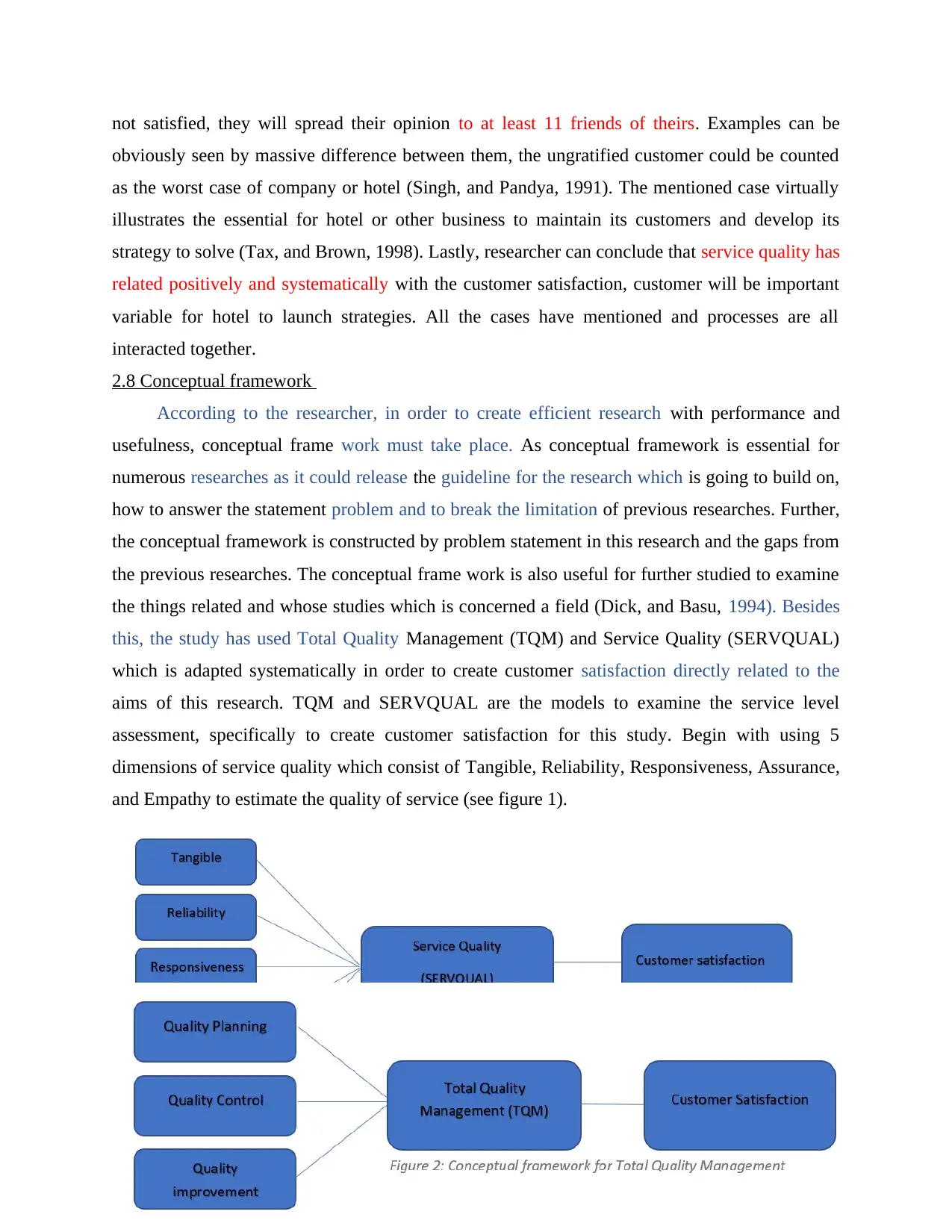
not satisfied, they will spread their opinion to at least 11 friends of theirs. Examples can be
obviously seen by massive difference between them, the ungratified customer could be counted
as the worst case of company or hotel (Singh, and Pandya, 1991). The mentioned case virtually
illustrates the essential for hotel or other business to maintain its customers and develop its
strategy to solve (Tax, and Brown, 1998). Lastly, researcher can conclude that service quality has
related positively and systematically with the customer satisfaction, customer will be important
variable for hotel to launch strategies. All the cases have mentioned and processes are all
interacted together.
2.8 Conceptual framework
According to the researcher, in order to create efficient research with performance and
usefulness, conceptual frame work must take place. As conceptual framework is essential for
numerous researches as it could release the guideline for the research which is going to build on,
how to answer the statement problem and to break the limitation of previous researches. Further,
the conceptual framework is constructed by problem statement in this research and the gaps from
the previous researches. The conceptual frame work is also useful for further studied to examine
the things related and whose studies which is concerned a field (Dick, and Basu, 1994). Besides
this, the study has used Total Quality Management (TQM) and Service Quality (SERVQUAL)
which is adapted systematically in order to create customer satisfaction directly related to the
aims of this research. TQM and SERVQUAL are the models to examine the service level
assessment, specifically to create customer satisfaction for this study. Begin with using 5
dimensions of service quality which consist of Tangible, Reliability, Responsiveness, Assurance,
and Empathy to estimate the quality of service (see figure 1).
26
obviously seen by massive difference between them, the ungratified customer could be counted
as the worst case of company or hotel (Singh, and Pandya, 1991). The mentioned case virtually
illustrates the essential for hotel or other business to maintain its customers and develop its
strategy to solve (Tax, and Brown, 1998). Lastly, researcher can conclude that service quality has
related positively and systematically with the customer satisfaction, customer will be important
variable for hotel to launch strategies. All the cases have mentioned and processes are all
interacted together.
2.8 Conceptual framework
According to the researcher, in order to create efficient research with performance and
usefulness, conceptual frame work must take place. As conceptual framework is essential for
numerous researches as it could release the guideline for the research which is going to build on,
how to answer the statement problem and to break the limitation of previous researches. Further,
the conceptual framework is constructed by problem statement in this research and the gaps from
the previous researches. The conceptual frame work is also useful for further studied to examine
the things related and whose studies which is concerned a field (Dick, and Basu, 1994). Besides
this, the study has used Total Quality Management (TQM) and Service Quality (SERVQUAL)
which is adapted systematically in order to create customer satisfaction directly related to the
aims of this research. TQM and SERVQUAL are the models to examine the service level
assessment, specifically to create customer satisfaction for this study. Begin with using 5
dimensions of service quality which consist of Tangible, Reliability, Responsiveness, Assurance,
and Empathy to estimate the quality of service (see figure 1).
26
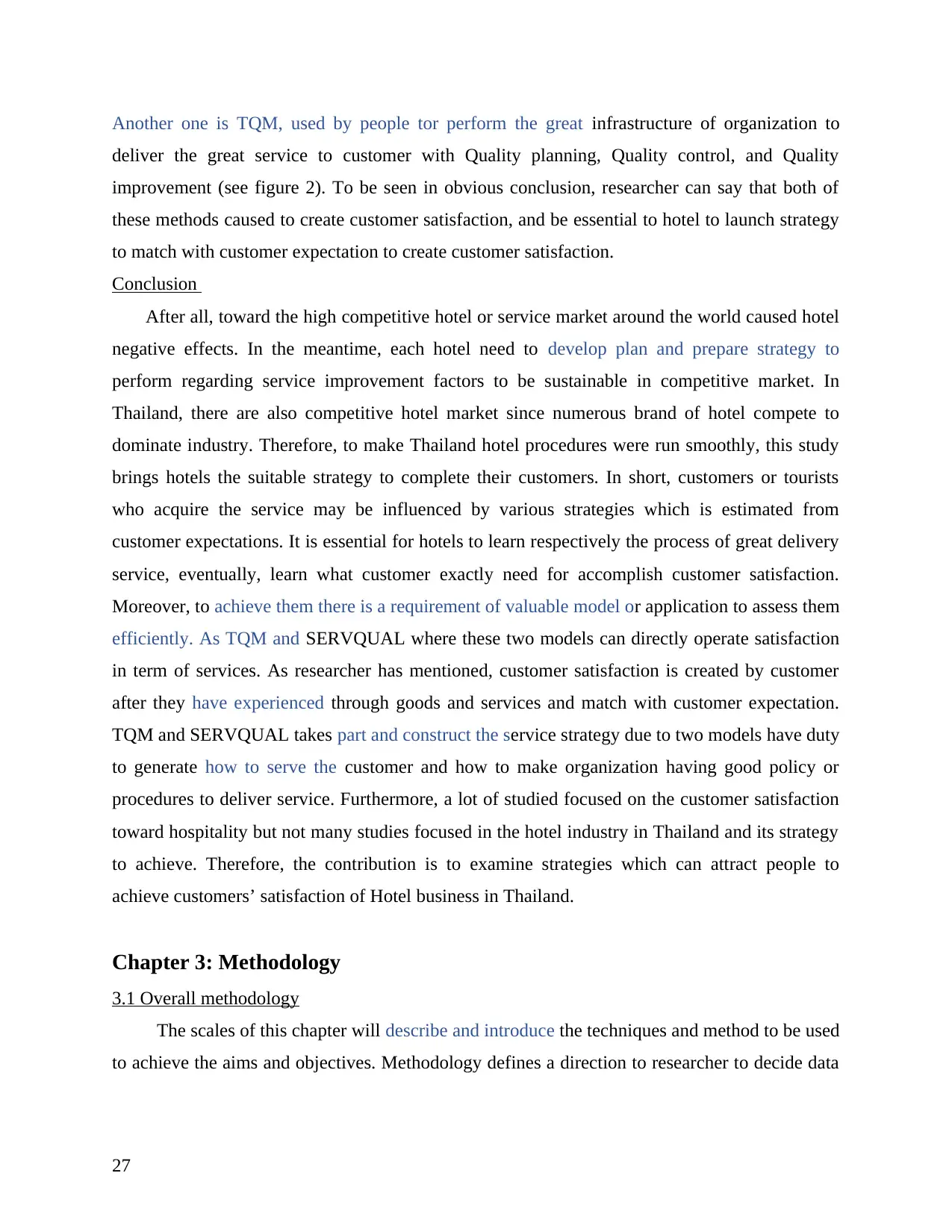
Another one is TQM, used by people tor perform the great infrastructure of organization to
deliver the great service to customer with Quality planning, Quality control, and Quality
improvement (see figure 2). To be seen in obvious conclusion, researcher can say that both of
these methods caused to create customer satisfaction, and be essential to hotel to launch strategy
to match with customer expectation to create customer satisfaction.
Conclusion
After all, toward the high competitive hotel or service market around the world caused hotel
negative effects. In the meantime, each hotel need to develop plan and prepare strategy to
perform regarding service improvement factors to be sustainable in competitive market. In
Thailand, there are also competitive hotel market since numerous brand of hotel compete to
dominate industry. Therefore, to make Thailand hotel procedures were run smoothly, this study
brings hotels the suitable strategy to complete their customers. In short, customers or tourists
who acquire the service may be influenced by various strategies which is estimated from
customer expectations. It is essential for hotels to learn respectively the process of great delivery
service, eventually, learn what customer exactly need for accomplish customer satisfaction.
Moreover, to achieve them there is a requirement of valuable model or application to assess them
efficiently. As TQM and SERVQUAL where these two models can directly operate satisfaction
in term of services. As researcher has mentioned, customer satisfaction is created by customer
after they have experienced through goods and services and match with customer expectation.
TQM and SERVQUAL takes part and construct the service strategy due to two models have duty
to generate how to serve the customer and how to make organization having good policy or
procedures to deliver service. Furthermore, a lot of studied focused on the customer satisfaction
toward hospitality but not many studies focused in the hotel industry in Thailand and its strategy
to achieve. Therefore, the contribution is to examine strategies which can attract people to
achieve customers’ satisfaction of Hotel business in Thailand.
Chapter 3: Methodology
3.1 Overall methodology
The scales of this chapter will describe and introduce the techniques and method to be used
to achieve the aims and objectives. Methodology defines a direction to researcher to decide data
27
deliver the great service to customer with Quality planning, Quality control, and Quality
improvement (see figure 2). To be seen in obvious conclusion, researcher can say that both of
these methods caused to create customer satisfaction, and be essential to hotel to launch strategy
to match with customer expectation to create customer satisfaction.
Conclusion
After all, toward the high competitive hotel or service market around the world caused hotel
negative effects. In the meantime, each hotel need to develop plan and prepare strategy to
perform regarding service improvement factors to be sustainable in competitive market. In
Thailand, there are also competitive hotel market since numerous brand of hotel compete to
dominate industry. Therefore, to make Thailand hotel procedures were run smoothly, this study
brings hotels the suitable strategy to complete their customers. In short, customers or tourists
who acquire the service may be influenced by various strategies which is estimated from
customer expectations. It is essential for hotels to learn respectively the process of great delivery
service, eventually, learn what customer exactly need for accomplish customer satisfaction.
Moreover, to achieve them there is a requirement of valuable model or application to assess them
efficiently. As TQM and SERVQUAL where these two models can directly operate satisfaction
in term of services. As researcher has mentioned, customer satisfaction is created by customer
after they have experienced through goods and services and match with customer expectation.
TQM and SERVQUAL takes part and construct the service strategy due to two models have duty
to generate how to serve the customer and how to make organization having good policy or
procedures to deliver service. Furthermore, a lot of studied focused on the customer satisfaction
toward hospitality but not many studies focused in the hotel industry in Thailand and its strategy
to achieve. Therefore, the contribution is to examine strategies which can attract people to
achieve customers’ satisfaction of Hotel business in Thailand.
Chapter 3: Methodology
3.1 Overall methodology
The scales of this chapter will describe and introduce the techniques and method to be used
to achieve the aims and objectives. Methodology defines a direction to researcher to decide data
27
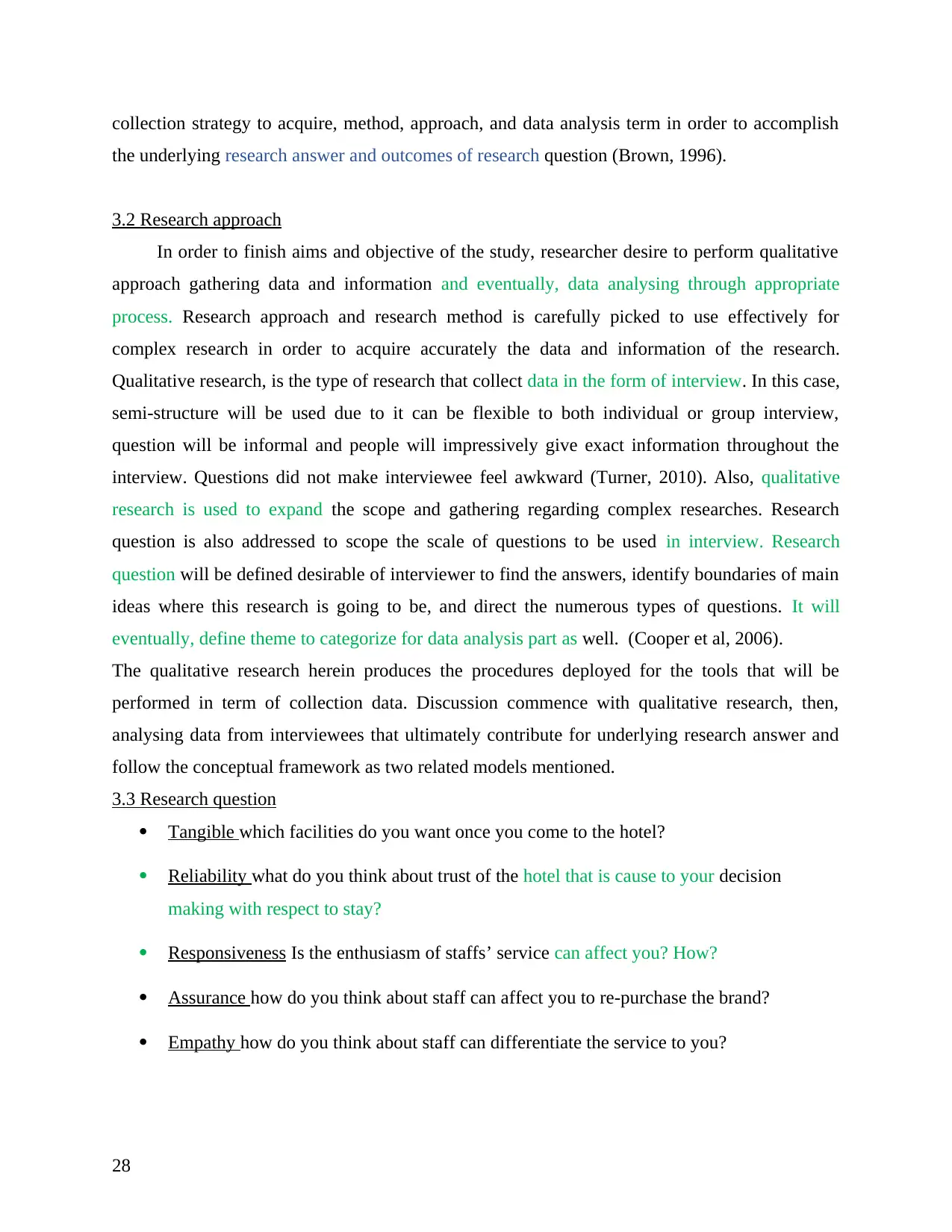
collection strategy to acquire, method, approach, and data analysis term in order to accomplish
the underlying research answer and outcomes of research question (Brown, 1996).
3.2 Research approach
In order to finish aims and objective of the study, researcher desire to perform qualitative
approach gathering data and information and eventually, data analysing through appropriate
process. Research approach and research method is carefully picked to use effectively for
complex research in order to acquire accurately the data and information of the research.
Qualitative research, is the type of research that collect data in the form of interview. In this case,
semi-structure will be used due to it can be flexible to both individual or group interview,
question will be informal and people will impressively give exact information throughout the
interview. Questions did not make interviewee feel awkward (Turner, 2010). Also, qualitative
research is used to expand the scope and gathering regarding complex researches. Research
question is also addressed to scope the scale of questions to be used in interview. Research
question will be defined desirable of interviewer to find the answers, identify boundaries of main
ideas where this research is going to be, and direct the numerous types of questions. It will
eventually, define theme to categorize for data analysis part as well. (Cooper et al, 2006).
The qualitative research herein produces the procedures deployed for the tools that will be
performed in term of collection data. Discussion commence with qualitative research, then,
analysing data from interviewees that ultimately contribute for underlying research answer and
follow the conceptual framework as two related models mentioned.
3.3 Research question
Tangible which facilities do you want once you come to the hotel?
Reliability what do you think about trust of the hotel that is cause to your decision
making with respect to stay?
Responsiveness Is the enthusiasm of staffs’ service can affect you? How?
Assurance how do you think about staff can affect you to re-purchase the brand?
Empathy how do you think about staff can differentiate the service to you?
28
the underlying research answer and outcomes of research question (Brown, 1996).
3.2 Research approach
In order to finish aims and objective of the study, researcher desire to perform qualitative
approach gathering data and information and eventually, data analysing through appropriate
process. Research approach and research method is carefully picked to use effectively for
complex research in order to acquire accurately the data and information of the research.
Qualitative research, is the type of research that collect data in the form of interview. In this case,
semi-structure will be used due to it can be flexible to both individual or group interview,
question will be informal and people will impressively give exact information throughout the
interview. Questions did not make interviewee feel awkward (Turner, 2010). Also, qualitative
research is used to expand the scope and gathering regarding complex researches. Research
question is also addressed to scope the scale of questions to be used in interview. Research
question will be defined desirable of interviewer to find the answers, identify boundaries of main
ideas where this research is going to be, and direct the numerous types of questions. It will
eventually, define theme to categorize for data analysis part as well. (Cooper et al, 2006).
The qualitative research herein produces the procedures deployed for the tools that will be
performed in term of collection data. Discussion commence with qualitative research, then,
analysing data from interviewees that ultimately contribute for underlying research answer and
follow the conceptual framework as two related models mentioned.
3.3 Research question
Tangible which facilities do you want once you come to the hotel?
Reliability what do you think about trust of the hotel that is cause to your decision
making with respect to stay?
Responsiveness Is the enthusiasm of staffs’ service can affect you? How?
Assurance how do you think about staff can affect you to re-purchase the brand?
Empathy how do you think about staff can differentiate the service to you?
28
Secure Best Marks with AI Grader
Need help grading? Try our AI Grader for instant feedback on your assignments.
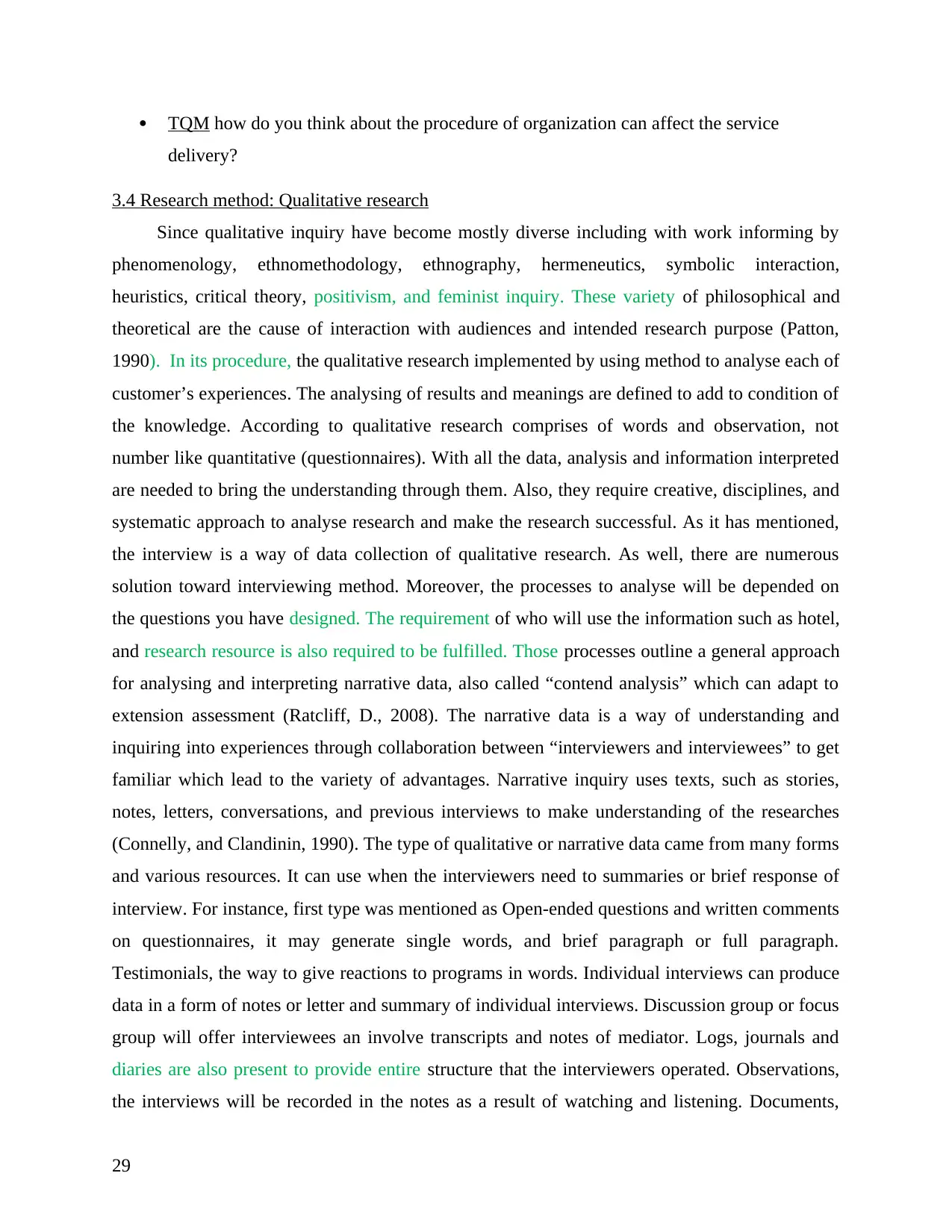
TQM how do you think about the procedure of organization can affect the service
delivery?
3.4 Research method: Qualitative research
Since qualitative inquiry have become mostly diverse including with work informing by
phenomenology, ethnomethodology, ethnography, hermeneutics, symbolic interaction,
heuristics, critical theory, positivism, and feminist inquiry. These variety of philosophical and
theoretical are the cause of interaction with audiences and intended research purpose (Patton,
1990). In its procedure, the qualitative research implemented by using method to analyse each of
customer’s experiences. The analysing of results and meanings are defined to add to condition of
the knowledge. According to qualitative research comprises of words and observation, not
number like quantitative (questionnaires). With all the data, analysis and information interpreted
are needed to bring the understanding through them. Also, they require creative, disciplines, and
systematic approach to analyse research and make the research successful. As it has mentioned,
the interview is a way of data collection of qualitative research. As well, there are numerous
solution toward interviewing method. Moreover, the processes to analyse will be depended on
the questions you have designed. The requirement of who will use the information such as hotel,
and research resource is also required to be fulfilled. Those processes outline a general approach
for analysing and interpreting narrative data, also called “contend analysis” which can adapt to
extension assessment (Ratcliff, D., 2008). The narrative data is a way of understanding and
inquiring into experiences through collaboration between “interviewers and interviewees” to get
familiar which lead to the variety of advantages. Narrative inquiry uses texts, such as stories,
notes, letters, conversations, and previous interviews to make understanding of the researches
(Connelly, and Clandinin, 1990). The type of qualitative or narrative data came from many forms
and various resources. It can use when the interviewers need to summaries or brief response of
interview. For instance, first type was mentioned as Open-ended questions and written comments
on questionnaires, it may generate single words, and brief paragraph or full paragraph.
Testimonials, the way to give reactions to programs in words. Individual interviews can produce
data in a form of notes or letter and summary of individual interviews. Discussion group or focus
group will offer interviewees an involve transcripts and notes of mediator. Logs, journals and
diaries are also present to provide entire structure that the interviewers operated. Observations,
the interviews will be recorded in the notes as a result of watching and listening. Documents,
29
delivery?
3.4 Research method: Qualitative research
Since qualitative inquiry have become mostly diverse including with work informing by
phenomenology, ethnomethodology, ethnography, hermeneutics, symbolic interaction,
heuristics, critical theory, positivism, and feminist inquiry. These variety of philosophical and
theoretical are the cause of interaction with audiences and intended research purpose (Patton,
1990). In its procedure, the qualitative research implemented by using method to analyse each of
customer’s experiences. The analysing of results and meanings are defined to add to condition of
the knowledge. According to qualitative research comprises of words and observation, not
number like quantitative (questionnaires). With all the data, analysis and information interpreted
are needed to bring the understanding through them. Also, they require creative, disciplines, and
systematic approach to analyse research and make the research successful. As it has mentioned,
the interview is a way of data collection of qualitative research. As well, there are numerous
solution toward interviewing method. Moreover, the processes to analyse will be depended on
the questions you have designed. The requirement of who will use the information such as hotel,
and research resource is also required to be fulfilled. Those processes outline a general approach
for analysing and interpreting narrative data, also called “contend analysis” which can adapt to
extension assessment (Ratcliff, D., 2008). The narrative data is a way of understanding and
inquiring into experiences through collaboration between “interviewers and interviewees” to get
familiar which lead to the variety of advantages. Narrative inquiry uses texts, such as stories,
notes, letters, conversations, and previous interviews to make understanding of the researches
(Connelly, and Clandinin, 1990). The type of qualitative or narrative data came from many forms
and various resources. It can use when the interviewers need to summaries or brief response of
interview. For instance, first type was mentioned as Open-ended questions and written comments
on questionnaires, it may generate single words, and brief paragraph or full paragraph.
Testimonials, the way to give reactions to programs in words. Individual interviews can produce
data in a form of notes or letter and summary of individual interviews. Discussion group or focus
group will offer interviewees an involve transcripts and notes of mediator. Logs, journals and
diaries are also present to provide entire structure that the interviewers operated. Observations,
the interviews will be recorded in the notes as a result of watching and listening. Documents,
29
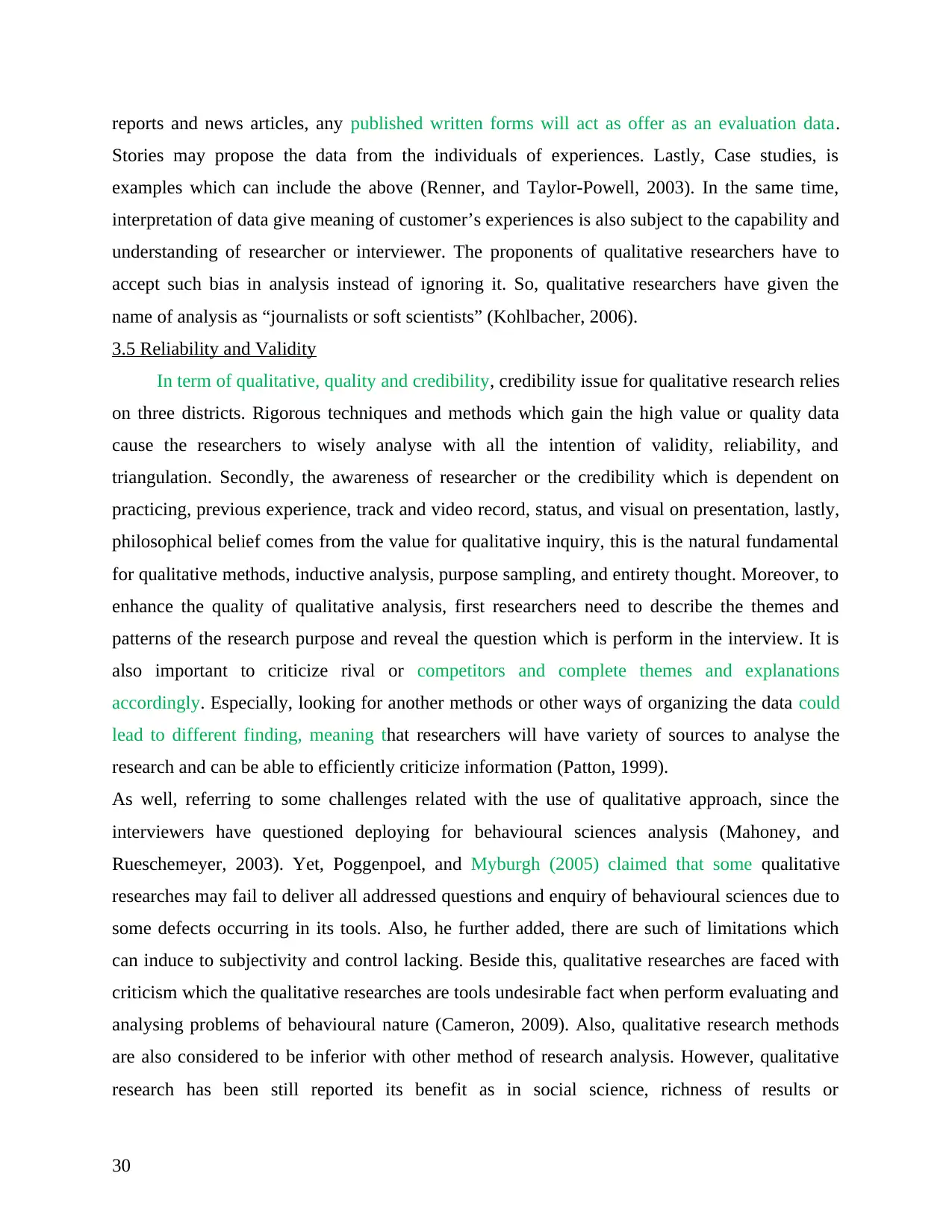
reports and news articles, any published written forms will act as offer as an evaluation data.
Stories may propose the data from the individuals of experiences. Lastly, Case studies, is
examples which can include the above (Renner, and Taylor-Powell, 2003). In the same time,
interpretation of data give meaning of customer’s experiences is also subject to the capability and
understanding of researcher or interviewer. The proponents of qualitative researchers have to
accept such bias in analysis instead of ignoring it. So, qualitative researchers have given the
name of analysis as “journalists or soft scientists” (Kohlbacher, 2006).
3.5 Reliability and Validity
In term of qualitative, quality and credibility, credibility issue for qualitative research relies
on three districts. Rigorous techniques and methods which gain the high value or quality data
cause the researchers to wisely analyse with all the intention of validity, reliability, and
triangulation. Secondly, the awareness of researcher or the credibility which is dependent on
practicing, previous experience, track and video record, status, and visual on presentation, lastly,
philosophical belief comes from the value for qualitative inquiry, this is the natural fundamental
for qualitative methods, inductive analysis, purpose sampling, and entirety thought. Moreover, to
enhance the quality of qualitative analysis, first researchers need to describe the themes and
patterns of the research purpose and reveal the question which is perform in the interview. It is
also important to criticize rival or competitors and complete themes and explanations
accordingly. Especially, looking for another methods or other ways of organizing the data could
lead to different finding, meaning that researchers will have variety of sources to analyse the
research and can be able to efficiently criticize information (Patton, 1999).
As well, referring to some challenges related with the use of qualitative approach, since the
interviewers have questioned deploying for behavioural sciences analysis (Mahoney, and
Rueschemeyer, 2003). Yet, Poggenpoel, and Myburgh (2005) claimed that some qualitative
researches may fail to deliver all addressed questions and enquiry of behavioural sciences due to
some defects occurring in its tools. Also, he further added, there are such of limitations which
can induce to subjectivity and control lacking. Beside this, qualitative researches are faced with
criticism which the qualitative researches are tools undesirable fact when perform evaluating and
analysing problems of behavioural nature (Cameron, 2009). Also, qualitative research methods
are also considered to be inferior with other method of research analysis. However, qualitative
research has been still reported its benefit as in social science, richness of results or
30
Stories may propose the data from the individuals of experiences. Lastly, Case studies, is
examples which can include the above (Renner, and Taylor-Powell, 2003). In the same time,
interpretation of data give meaning of customer’s experiences is also subject to the capability and
understanding of researcher or interviewer. The proponents of qualitative researchers have to
accept such bias in analysis instead of ignoring it. So, qualitative researchers have given the
name of analysis as “journalists or soft scientists” (Kohlbacher, 2006).
3.5 Reliability and Validity
In term of qualitative, quality and credibility, credibility issue for qualitative research relies
on three districts. Rigorous techniques and methods which gain the high value or quality data
cause the researchers to wisely analyse with all the intention of validity, reliability, and
triangulation. Secondly, the awareness of researcher or the credibility which is dependent on
practicing, previous experience, track and video record, status, and visual on presentation, lastly,
philosophical belief comes from the value for qualitative inquiry, this is the natural fundamental
for qualitative methods, inductive analysis, purpose sampling, and entirety thought. Moreover, to
enhance the quality of qualitative analysis, first researchers need to describe the themes and
patterns of the research purpose and reveal the question which is perform in the interview. It is
also important to criticize rival or competitors and complete themes and explanations
accordingly. Especially, looking for another methods or other ways of organizing the data could
lead to different finding, meaning that researchers will have variety of sources to analyse the
research and can be able to efficiently criticize information (Patton, 1999).
As well, referring to some challenges related with the use of qualitative approach, since the
interviewers have questioned deploying for behavioural sciences analysis (Mahoney, and
Rueschemeyer, 2003). Yet, Poggenpoel, and Myburgh (2005) claimed that some qualitative
researches may fail to deliver all addressed questions and enquiry of behavioural sciences due to
some defects occurring in its tools. Also, he further added, there are such of limitations which
can induce to subjectivity and control lacking. Beside this, qualitative researches are faced with
criticism which the qualitative researches are tools undesirable fact when perform evaluating and
analysing problems of behavioural nature (Cameron, 2009). Also, qualitative research methods
are also considered to be inferior with other method of research analysis. However, qualitative
research has been still reported its benefit as in social science, richness of results or
30
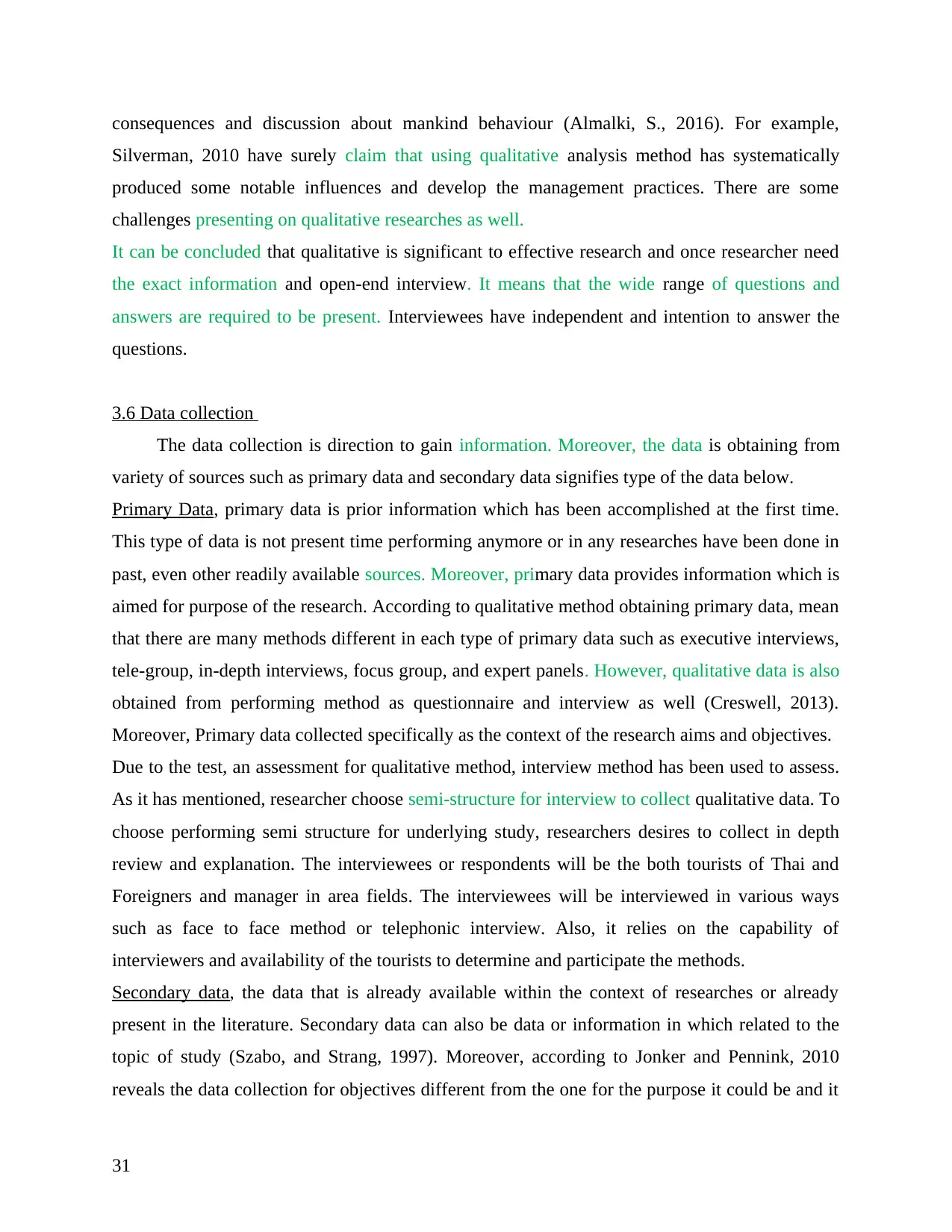
consequences and discussion about mankind behaviour (Almalki, S., 2016). For example,
Silverman, 2010 have surely claim that using qualitative analysis method has systematically
produced some notable influences and develop the management practices. There are some
challenges presenting on qualitative researches as well.
It can be concluded that qualitative is significant to effective research and once researcher need
the exact information and open-end interview. It means that the wide range of questions and
answers are required to be present. Interviewees have independent and intention to answer the
questions.
3.6 Data collection
The data collection is direction to gain information. Moreover, the data is obtaining from
variety of sources such as primary data and secondary data signifies type of the data below.
Primary Data, primary data is prior information which has been accomplished at the first time.
This type of data is not present time performing anymore or in any researches have been done in
past, even other readily available sources. Moreover, primary data provides information which is
aimed for purpose of the research. According to qualitative method obtaining primary data, mean
that there are many methods different in each type of primary data such as executive interviews,
tele-group, in-depth interviews, focus group, and expert panels. However, qualitative data is also
obtained from performing method as questionnaire and interview as well (Creswell, 2013).
Moreover, Primary data collected specifically as the context of the research aims and objectives.
Due to the test, an assessment for qualitative method, interview method has been used to assess.
As it has mentioned, researcher choose semi-structure for interview to collect qualitative data. To
choose performing semi structure for underlying study, researchers desires to collect in depth
review and explanation. The interviewees or respondents will be the both tourists of Thai and
Foreigners and manager in area fields. The interviewees will be interviewed in various ways
such as face to face method or telephonic interview. Also, it relies on the capability of
interviewers and availability of the tourists to determine and participate the methods.
Secondary data, the data that is already available within the context of researches or already
present in the literature. Secondary data can also be data or information in which related to the
topic of study (Szabo, and Strang, 1997). Moreover, according to Jonker and Pennink, 2010
reveals the data collection for objectives different from the one for the purpose it could be and it
31
Silverman, 2010 have surely claim that using qualitative analysis method has systematically
produced some notable influences and develop the management practices. There are some
challenges presenting on qualitative researches as well.
It can be concluded that qualitative is significant to effective research and once researcher need
the exact information and open-end interview. It means that the wide range of questions and
answers are required to be present. Interviewees have independent and intention to answer the
questions.
3.6 Data collection
The data collection is direction to gain information. Moreover, the data is obtaining from
variety of sources such as primary data and secondary data signifies type of the data below.
Primary Data, primary data is prior information which has been accomplished at the first time.
This type of data is not present time performing anymore or in any researches have been done in
past, even other readily available sources. Moreover, primary data provides information which is
aimed for purpose of the research. According to qualitative method obtaining primary data, mean
that there are many methods different in each type of primary data such as executive interviews,
tele-group, in-depth interviews, focus group, and expert panels. However, qualitative data is also
obtained from performing method as questionnaire and interview as well (Creswell, 2013).
Moreover, Primary data collected specifically as the context of the research aims and objectives.
Due to the test, an assessment for qualitative method, interview method has been used to assess.
As it has mentioned, researcher choose semi-structure for interview to collect qualitative data. To
choose performing semi structure for underlying study, researchers desires to collect in depth
review and explanation. The interviewees or respondents will be the both tourists of Thai and
Foreigners and manager in area fields. The interviewees will be interviewed in various ways
such as face to face method or telephonic interview. Also, it relies on the capability of
interviewers and availability of the tourists to determine and participate the methods.
Secondary data, the data that is already available within the context of researches or already
present in the literature. Secondary data can also be data or information in which related to the
topic of study (Szabo, and Strang, 1997). Moreover, according to Jonker and Pennink, 2010
reveals the data collection for objectives different from the one for the purpose it could be and it
31
Paraphrase This Document
Need a fresh take? Get an instant paraphrase of this document with our AI Paraphraser
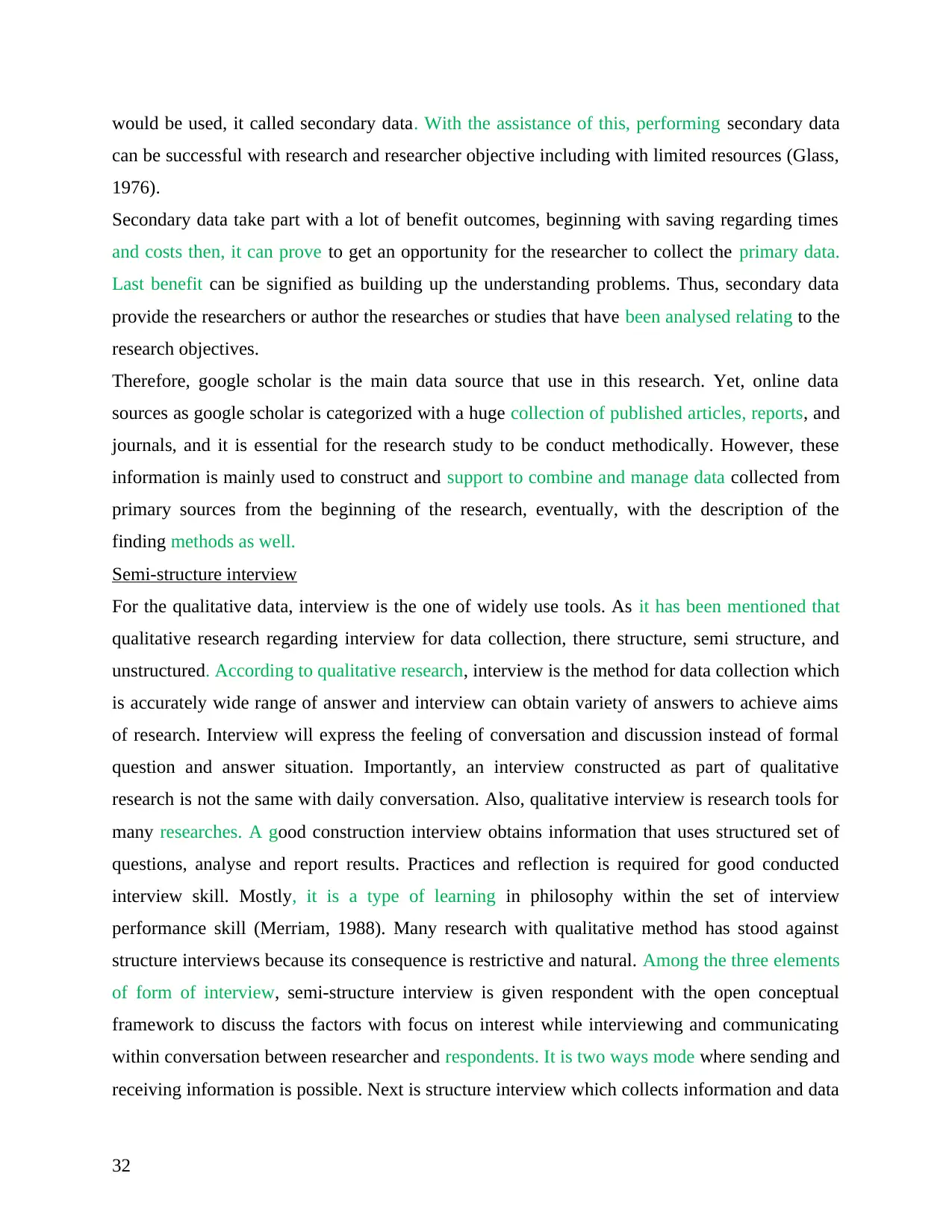
would be used, it called secondary data. With the assistance of this, performing secondary data
can be successful with research and researcher objective including with limited resources (Glass,
1976).
Secondary data take part with a lot of benefit outcomes, beginning with saving regarding times
and costs then, it can prove to get an opportunity for the researcher to collect the primary data.
Last benefit can be signified as building up the understanding problems. Thus, secondary data
provide the researchers or author the researches or studies that have been analysed relating to the
research objectives.
Therefore, google scholar is the main data source that use in this research. Yet, online data
sources as google scholar is categorized with a huge collection of published articles, reports, and
journals, and it is essential for the research study to be conduct methodically. However, these
information is mainly used to construct and support to combine and manage data collected from
primary sources from the beginning of the research, eventually, with the description of the
finding methods as well.
Semi-structure interview
For the qualitative data, interview is the one of widely use tools. As it has been mentioned that
qualitative research regarding interview for data collection, there structure, semi structure, and
unstructured. According to qualitative research, interview is the method for data collection which
is accurately wide range of answer and interview can obtain variety of answers to achieve aims
of research. Interview will express the feeling of conversation and discussion instead of formal
question and answer situation. Importantly, an interview constructed as part of qualitative
research is not the same with daily conversation. Also, qualitative interview is research tools for
many researches. A good construction interview obtains information that uses structured set of
questions, analyse and report results. Practices and reflection is required for good conducted
interview skill. Mostly, it is a type of learning in philosophy within the set of interview
performance skill (Merriam, 1988). Many research with qualitative method has stood against
structure interviews because its consequence is restrictive and natural. Among the three elements
of form of interview, semi-structure interview is given respondent with the open conceptual
framework to discuss the factors with focus on interest while interviewing and communicating
within conversation between researcher and respondents. It is two ways mode where sending and
receiving information is possible. Next is structure interview which collects information and data
32
can be successful with research and researcher objective including with limited resources (Glass,
1976).
Secondary data take part with a lot of benefit outcomes, beginning with saving regarding times
and costs then, it can prove to get an opportunity for the researcher to collect the primary data.
Last benefit can be signified as building up the understanding problems. Thus, secondary data
provide the researchers or author the researches or studies that have been analysed relating to the
research objectives.
Therefore, google scholar is the main data source that use in this research. Yet, online data
sources as google scholar is categorized with a huge collection of published articles, reports, and
journals, and it is essential for the research study to be conduct methodically. However, these
information is mainly used to construct and support to combine and manage data collected from
primary sources from the beginning of the research, eventually, with the description of the
finding methods as well.
Semi-structure interview
For the qualitative data, interview is the one of widely use tools. As it has been mentioned that
qualitative research regarding interview for data collection, there structure, semi structure, and
unstructured. According to qualitative research, interview is the method for data collection which
is accurately wide range of answer and interview can obtain variety of answers to achieve aims
of research. Interview will express the feeling of conversation and discussion instead of formal
question and answer situation. Importantly, an interview constructed as part of qualitative
research is not the same with daily conversation. Also, qualitative interview is research tools for
many researches. A good construction interview obtains information that uses structured set of
questions, analyse and report results. Practices and reflection is required for good conducted
interview skill. Mostly, it is a type of learning in philosophy within the set of interview
performance skill (Merriam, 1988). Many research with qualitative method has stood against
structure interviews because its consequence is restrictive and natural. Among the three elements
of form of interview, semi-structure interview is given respondent with the open conceptual
framework to discuss the factors with focus on interest while interviewing and communicating
within conversation between researcher and respondents. It is two ways mode where sending and
receiving information is possible. Next is structure interview which collects information and data
32
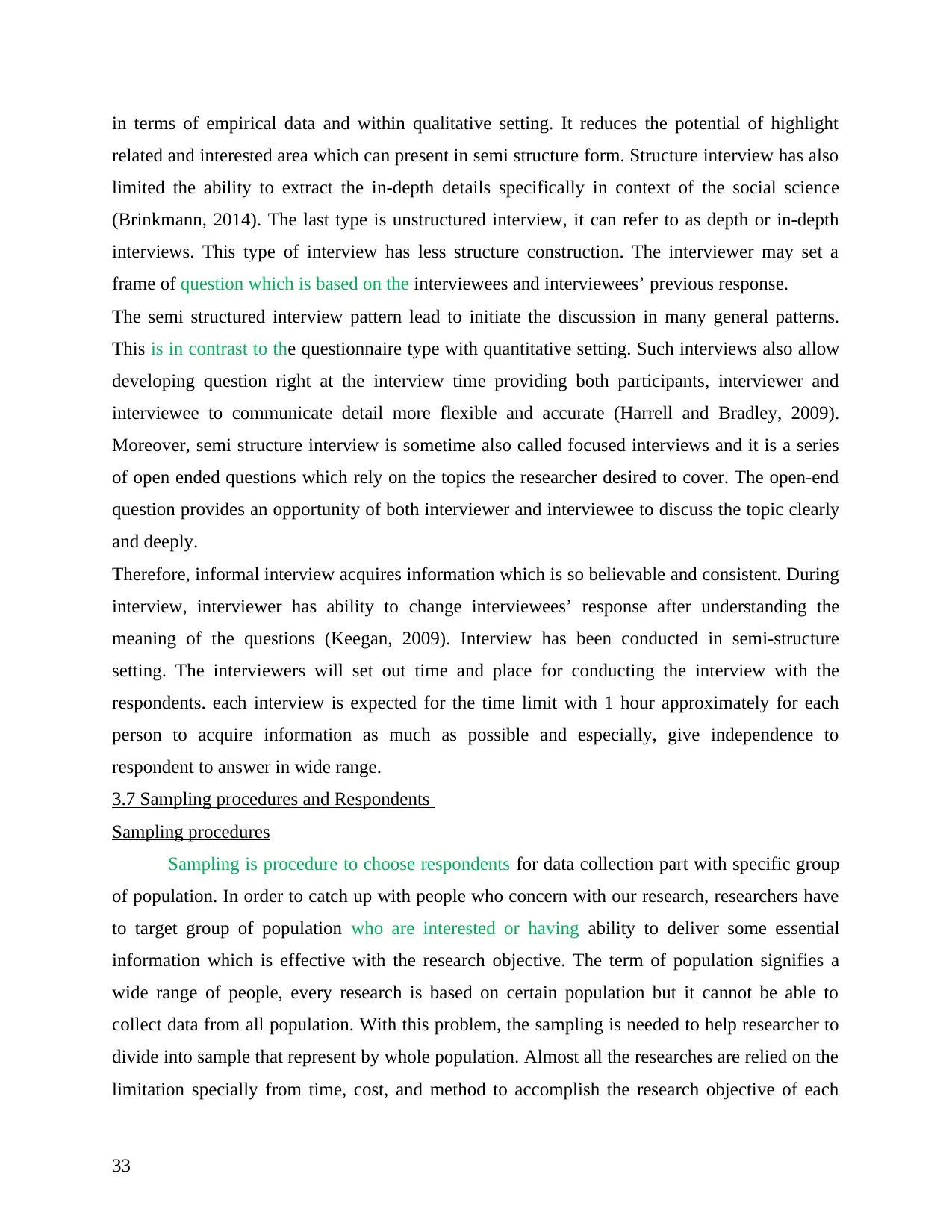
in terms of empirical data and within qualitative setting. It reduces the potential of highlight
related and interested area which can present in semi structure form. Structure interview has also
limited the ability to extract the in-depth details specifically in context of the social science
(Brinkmann, 2014). The last type is unstructured interview, it can refer to as depth or in-depth
interviews. This type of interview has less structure construction. The interviewer may set a
frame of question which is based on the interviewees and interviewees’ previous response.
The semi structured interview pattern lead to initiate the discussion in many general patterns.
This is in contrast to the questionnaire type with quantitative setting. Such interviews also allow
developing question right at the interview time providing both participants, interviewer and
interviewee to communicate detail more flexible and accurate (Harrell and Bradley, 2009).
Moreover, semi structure interview is sometime also called focused interviews and it is a series
of open ended questions which rely on the topics the researcher desired to cover. The open-end
question provides an opportunity of both interviewer and interviewee to discuss the topic clearly
and deeply.
Therefore, informal interview acquires information which is so believable and consistent. During
interview, interviewer has ability to change interviewees’ response after understanding the
meaning of the questions (Keegan, 2009). Interview has been conducted in semi-structure
setting. The interviewers will set out time and place for conducting the interview with the
respondents. each interview is expected for the time limit with 1 hour approximately for each
person to acquire information as much as possible and especially, give independence to
respondent to answer in wide range.
3.7 Sampling procedures and Respondents
Sampling procedures
Sampling is procedure to choose respondents for data collection part with specific group
of population. In order to catch up with people who concern with our research, researchers have
to target group of population who are interested or having ability to deliver some essential
information which is effective with the research objective. The term of population signifies a
wide range of people, every research is based on certain population but it cannot be able to
collect data from all population. With this problem, the sampling is needed to help researcher to
divide into sample that represent by whole population. Almost all the researches are relied on the
limitation specially from time, cost, and method to accomplish the research objective of each
33
related and interested area which can present in semi structure form. Structure interview has also
limited the ability to extract the in-depth details specifically in context of the social science
(Brinkmann, 2014). The last type is unstructured interview, it can refer to as depth or in-depth
interviews. This type of interview has less structure construction. The interviewer may set a
frame of question which is based on the interviewees and interviewees’ previous response.
The semi structured interview pattern lead to initiate the discussion in many general patterns.
This is in contrast to the questionnaire type with quantitative setting. Such interviews also allow
developing question right at the interview time providing both participants, interviewer and
interviewee to communicate detail more flexible and accurate (Harrell and Bradley, 2009).
Moreover, semi structure interview is sometime also called focused interviews and it is a series
of open ended questions which rely on the topics the researcher desired to cover. The open-end
question provides an opportunity of both interviewer and interviewee to discuss the topic clearly
and deeply.
Therefore, informal interview acquires information which is so believable and consistent. During
interview, interviewer has ability to change interviewees’ response after understanding the
meaning of the questions (Keegan, 2009). Interview has been conducted in semi-structure
setting. The interviewers will set out time and place for conducting the interview with the
respondents. each interview is expected for the time limit with 1 hour approximately for each
person to acquire information as much as possible and especially, give independence to
respondent to answer in wide range.
3.7 Sampling procedures and Respondents
Sampling procedures
Sampling is procedure to choose respondents for data collection part with specific group
of population. In order to catch up with people who concern with our research, researchers have
to target group of population who are interested or having ability to deliver some essential
information which is effective with the research objective. The term of population signifies a
wide range of people, every research is based on certain population but it cannot be able to
collect data from all population. With this problem, the sampling is needed to help researcher to
divide into sample that represent by whole population. Almost all the researches are relied on the
limitation specially from time, cost, and method to accomplish the research objective of each
33
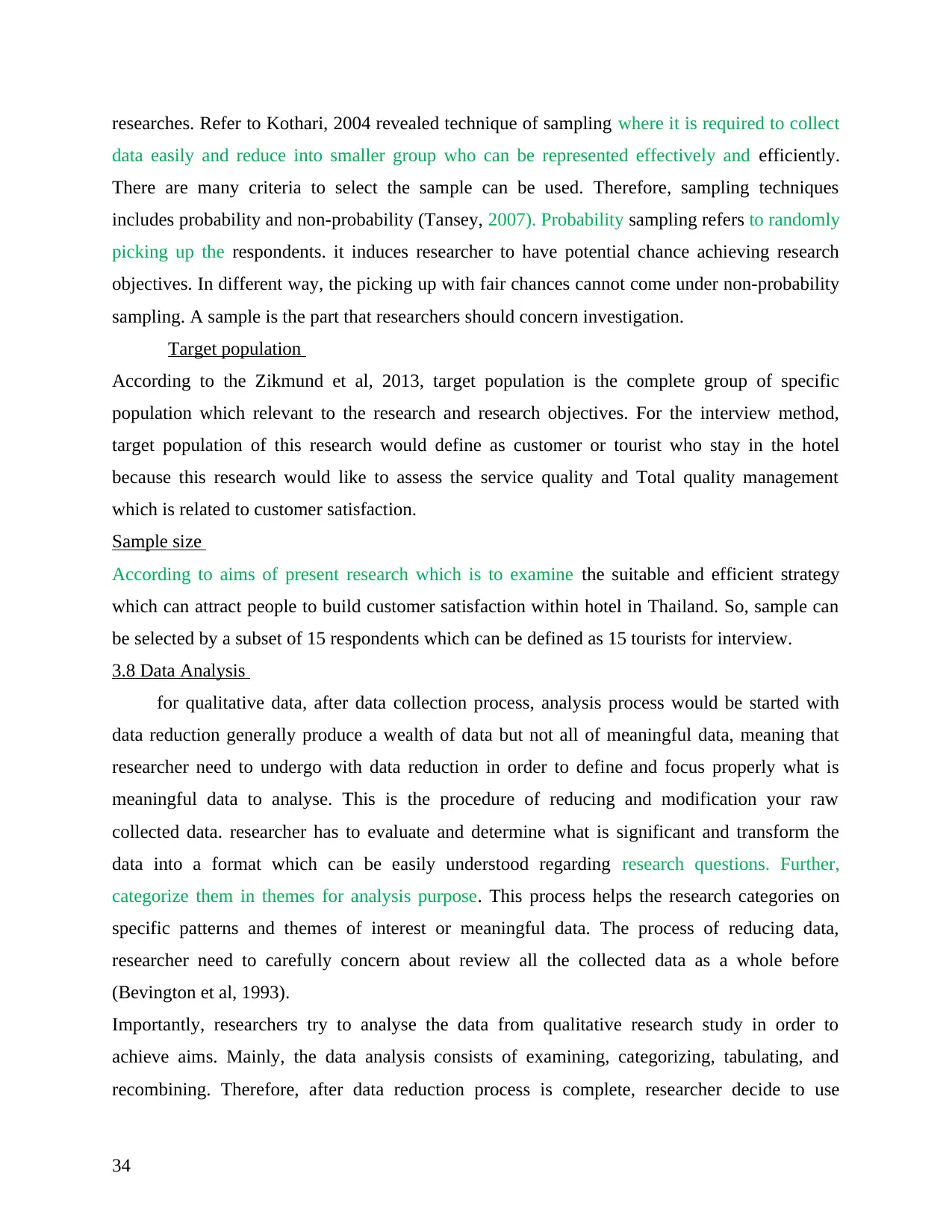
researches. Refer to Kothari, 2004 revealed technique of sampling where it is required to collect
data easily and reduce into smaller group who can be represented effectively and efficiently.
There are many criteria to select the sample can be used. Therefore, sampling techniques
includes probability and non-probability (Tansey, 2007). Probability sampling refers to randomly
picking up the respondents. it induces researcher to have potential chance achieving research
objectives. In different way, the picking up with fair chances cannot come under non-probability
sampling. A sample is the part that researchers should concern investigation.
Target population
According to the Zikmund et al, 2013, target population is the complete group of specific
population which relevant to the research and research objectives. For the interview method,
target population of this research would define as customer or tourist who stay in the hotel
because this research would like to assess the service quality and Total quality management
which is related to customer satisfaction.
Sample size
According to aims of present research which is to examine the suitable and efficient strategy
which can attract people to build customer satisfaction within hotel in Thailand. So, sample can
be selected by a subset of 15 respondents which can be defined as 15 tourists for interview.
3.8 Data Analysis
for qualitative data, after data collection process, analysis process would be started with
data reduction generally produce a wealth of data but not all of meaningful data, meaning that
researcher need to undergo with data reduction in order to define and focus properly what is
meaningful data to analyse. This is the procedure of reducing and modification your raw
collected data. researcher has to evaluate and determine what is significant and transform the
data into a format which can be easily understood regarding research questions. Further,
categorize them in themes for analysis purpose. This process helps the research categories on
specific patterns and themes of interest or meaningful data. The process of reducing data,
researcher need to carefully concern about review all the collected data as a whole before
(Bevington et al, 1993).
Importantly, researchers try to analyse the data from qualitative research study in order to
achieve aims. Mainly, the data analysis consists of examining, categorizing, tabulating, and
recombining. Therefore, after data reduction process is complete, researcher decide to use
34
data easily and reduce into smaller group who can be represented effectively and efficiently.
There are many criteria to select the sample can be used. Therefore, sampling techniques
includes probability and non-probability (Tansey, 2007). Probability sampling refers to randomly
picking up the respondents. it induces researcher to have potential chance achieving research
objectives. In different way, the picking up with fair chances cannot come under non-probability
sampling. A sample is the part that researchers should concern investigation.
Target population
According to the Zikmund et al, 2013, target population is the complete group of specific
population which relevant to the research and research objectives. For the interview method,
target population of this research would define as customer or tourist who stay in the hotel
because this research would like to assess the service quality and Total quality management
which is related to customer satisfaction.
Sample size
According to aims of present research which is to examine the suitable and efficient strategy
which can attract people to build customer satisfaction within hotel in Thailand. So, sample can
be selected by a subset of 15 respondents which can be defined as 15 tourists for interview.
3.8 Data Analysis
for qualitative data, after data collection process, analysis process would be started with
data reduction generally produce a wealth of data but not all of meaningful data, meaning that
researcher need to undergo with data reduction in order to define and focus properly what is
meaningful data to analyse. This is the procedure of reducing and modification your raw
collected data. researcher has to evaluate and determine what is significant and transform the
data into a format which can be easily understood regarding research questions. Further,
categorize them in themes for analysis purpose. This process helps the research categories on
specific patterns and themes of interest or meaningful data. The process of reducing data,
researcher need to carefully concern about review all the collected data as a whole before
(Bevington et al, 1993).
Importantly, researchers try to analyse the data from qualitative research study in order to
achieve aims. Mainly, the data analysis consists of examining, categorizing, tabulating, and
recombining. Therefore, after data reduction process is complete, researcher decide to use
34
Secure Best Marks with AI Grader
Need help grading? Try our AI Grader for instant feedback on your assignments.
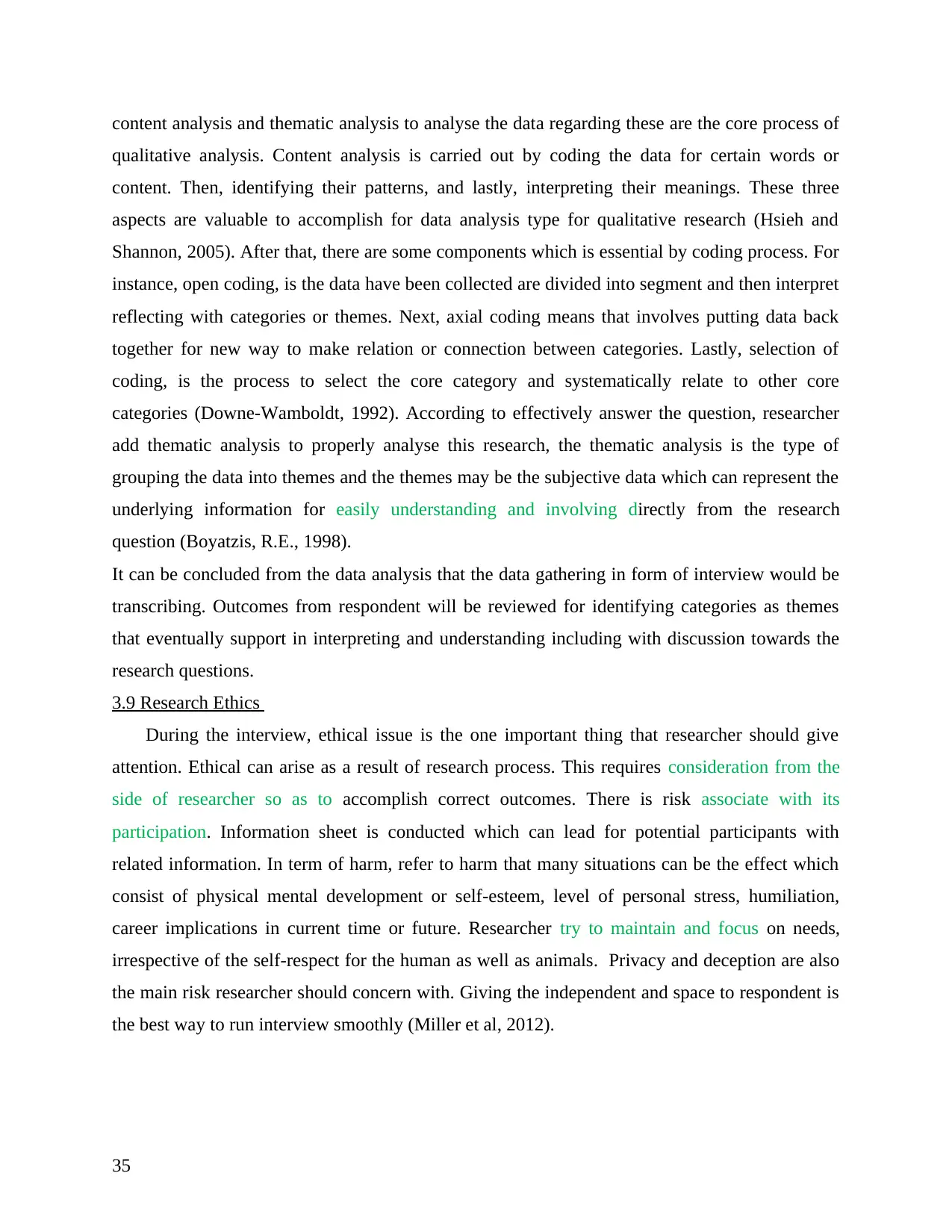
content analysis and thematic analysis to analyse the data regarding these are the core process of
qualitative analysis. Content analysis is carried out by coding the data for certain words or
content. Then, identifying their patterns, and lastly, interpreting their meanings. These three
aspects are valuable to accomplish for data analysis type for qualitative research (Hsieh and
Shannon, 2005). After that, there are some components which is essential by coding process. For
instance, open coding, is the data have been collected are divided into segment and then interpret
reflecting with categories or themes. Next, axial coding means that involves putting data back
together for new way to make relation or connection between categories. Lastly, selection of
coding, is the process to select the core category and systematically relate to other core
categories (Downe‐Wamboldt, 1992). According to effectively answer the question, researcher
add thematic analysis to properly analyse this research, the thematic analysis is the type of
grouping the data into themes and the themes may be the subjective data which can represent the
underlying information for easily understanding and involving directly from the research
question (Boyatzis, R.E., 1998).
It can be concluded from the data analysis that the data gathering in form of interview would be
transcribing. Outcomes from respondent will be reviewed for identifying categories as themes
that eventually support in interpreting and understanding including with discussion towards the
research questions.
3.9 Research Ethics
During the interview, ethical issue is the one important thing that researcher should give
attention. Ethical can arise as a result of research process. This requires consideration from the
side of researcher so as to accomplish correct outcomes. There is risk associate with its
participation. Information sheet is conducted which can lead for potential participants with
related information. In term of harm, refer to harm that many situations can be the effect which
consist of physical mental development or self-esteem, level of personal stress, humiliation,
career implications in current time or future. Researcher try to maintain and focus on needs,
irrespective of the self-respect for the human as well as animals. Privacy and deception are also
the main risk researcher should concern with. Giving the independent and space to respondent is
the best way to run interview smoothly (Miller et al, 2012).
35
qualitative analysis. Content analysis is carried out by coding the data for certain words or
content. Then, identifying their patterns, and lastly, interpreting their meanings. These three
aspects are valuable to accomplish for data analysis type for qualitative research (Hsieh and
Shannon, 2005). After that, there are some components which is essential by coding process. For
instance, open coding, is the data have been collected are divided into segment and then interpret
reflecting with categories or themes. Next, axial coding means that involves putting data back
together for new way to make relation or connection between categories. Lastly, selection of
coding, is the process to select the core category and systematically relate to other core
categories (Downe‐Wamboldt, 1992). According to effectively answer the question, researcher
add thematic analysis to properly analyse this research, the thematic analysis is the type of
grouping the data into themes and the themes may be the subjective data which can represent the
underlying information for easily understanding and involving directly from the research
question (Boyatzis, R.E., 1998).
It can be concluded from the data analysis that the data gathering in form of interview would be
transcribing. Outcomes from respondent will be reviewed for identifying categories as themes
that eventually support in interpreting and understanding including with discussion towards the
research questions.
3.9 Research Ethics
During the interview, ethical issue is the one important thing that researcher should give
attention. Ethical can arise as a result of research process. This requires consideration from the
side of researcher so as to accomplish correct outcomes. There is risk associate with its
participation. Information sheet is conducted which can lead for potential participants with
related information. In term of harm, refer to harm that many situations can be the effect which
consist of physical mental development or self-esteem, level of personal stress, humiliation,
career implications in current time or future. Researcher try to maintain and focus on needs,
irrespective of the self-respect for the human as well as animals. Privacy and deception are also
the main risk researcher should concern with. Giving the independent and space to respondent is
the best way to run interview smoothly (Miller et al, 2012).
35
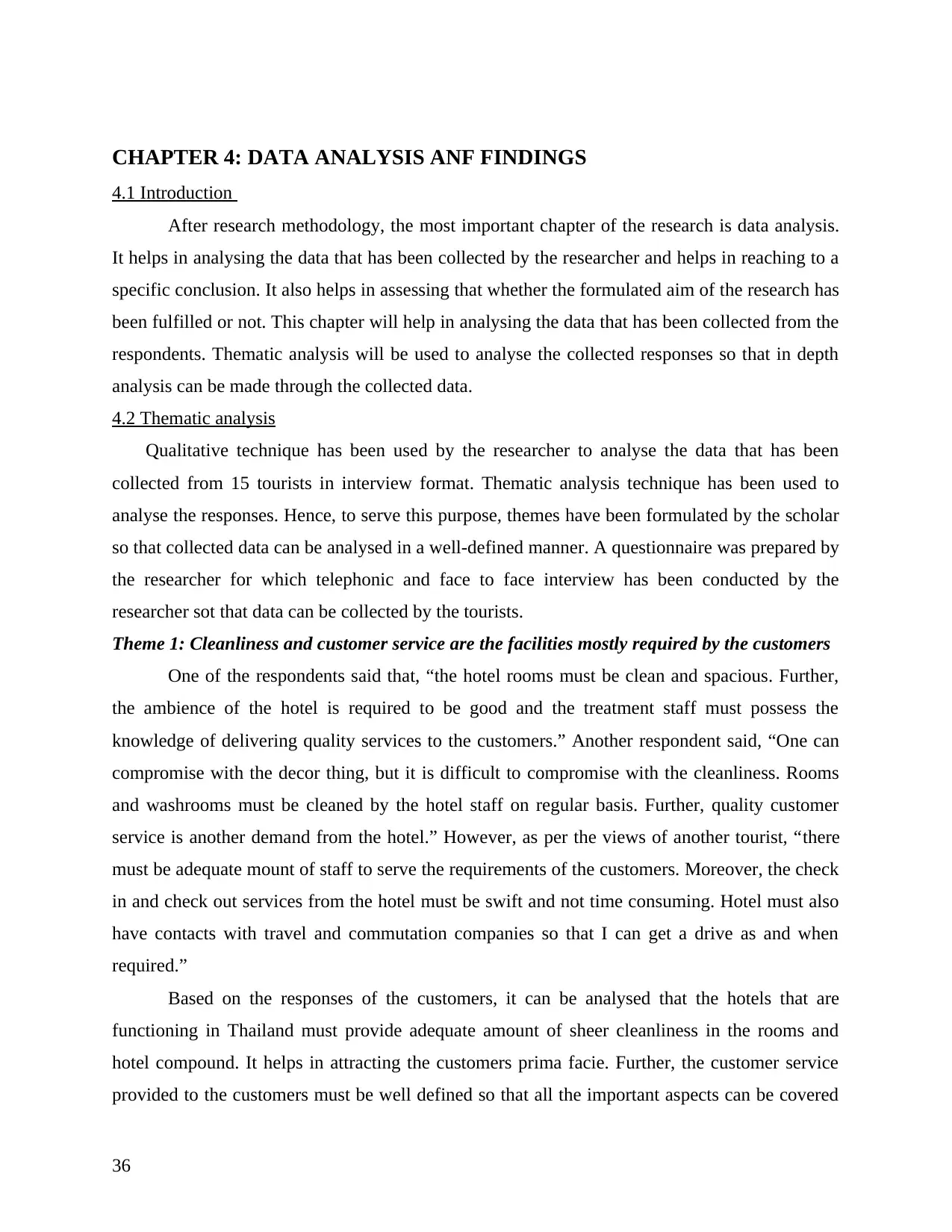
CHAPTER 4: DATA ANALYSIS ANF FINDINGS
4.1 Introduction
After research methodology, the most important chapter of the research is data analysis.
It helps in analysing the data that has been collected by the researcher and helps in reaching to a
specific conclusion. It also helps in assessing that whether the formulated aim of the research has
been fulfilled or not. This chapter will help in analysing the data that has been collected from the
respondents. Thematic analysis will be used to analyse the collected responses so that in depth
analysis can be made through the collected data.
4.2 Thematic analysis
Qualitative technique has been used by the researcher to analyse the data that has been
collected from 15 tourists in interview format. Thematic analysis technique has been used to
analyse the responses. Hence, to serve this purpose, themes have been formulated by the scholar
so that collected data can be analysed in a well-defined manner. A questionnaire was prepared by
the researcher for which telephonic and face to face interview has been conducted by the
researcher sot that data can be collected by the tourists.
Theme 1: Cleanliness and customer service are the facilities mostly required by the customers
One of the respondents said that, “the hotel rooms must be clean and spacious. Further,
the ambience of the hotel is required to be good and the treatment staff must possess the
knowledge of delivering quality services to the customers.” Another respondent said, “One can
compromise with the decor thing, but it is difficult to compromise with the cleanliness. Rooms
and washrooms must be cleaned by the hotel staff on regular basis. Further, quality customer
service is another demand from the hotel.” However, as per the views of another tourist, “there
must be adequate mount of staff to serve the requirements of the customers. Moreover, the check
in and check out services from the hotel must be swift and not time consuming. Hotel must also
have contacts with travel and commutation companies so that I can get a drive as and when
required.”
Based on the responses of the customers, it can be analysed that the hotels that are
functioning in Thailand must provide adequate amount of sheer cleanliness in the rooms and
hotel compound. It helps in attracting the customers prima facie. Further, the customer service
provided to the customers must be well defined so that all the important aspects can be covered
36
4.1 Introduction
After research methodology, the most important chapter of the research is data analysis.
It helps in analysing the data that has been collected by the researcher and helps in reaching to a
specific conclusion. It also helps in assessing that whether the formulated aim of the research has
been fulfilled or not. This chapter will help in analysing the data that has been collected from the
respondents. Thematic analysis will be used to analyse the collected responses so that in depth
analysis can be made through the collected data.
4.2 Thematic analysis
Qualitative technique has been used by the researcher to analyse the data that has been
collected from 15 tourists in interview format. Thematic analysis technique has been used to
analyse the responses. Hence, to serve this purpose, themes have been formulated by the scholar
so that collected data can be analysed in a well-defined manner. A questionnaire was prepared by
the researcher for which telephonic and face to face interview has been conducted by the
researcher sot that data can be collected by the tourists.
Theme 1: Cleanliness and customer service are the facilities mostly required by the customers
One of the respondents said that, “the hotel rooms must be clean and spacious. Further,
the ambience of the hotel is required to be good and the treatment staff must possess the
knowledge of delivering quality services to the customers.” Another respondent said, “One can
compromise with the decor thing, but it is difficult to compromise with the cleanliness. Rooms
and washrooms must be cleaned by the hotel staff on regular basis. Further, quality customer
service is another demand from the hotel.” However, as per the views of another tourist, “there
must be adequate mount of staff to serve the requirements of the customers. Moreover, the check
in and check out services from the hotel must be swift and not time consuming. Hotel must also
have contacts with travel and commutation companies so that I can get a drive as and when
required.”
Based on the responses of the customers, it can be analysed that the hotels that are
functioning in Thailand must provide adequate amount of sheer cleanliness in the rooms and
hotel compound. It helps in attracting the customers prima facie. Further, the customer service
provided to the customers must be well defined so that all the important aspects can be covered
36
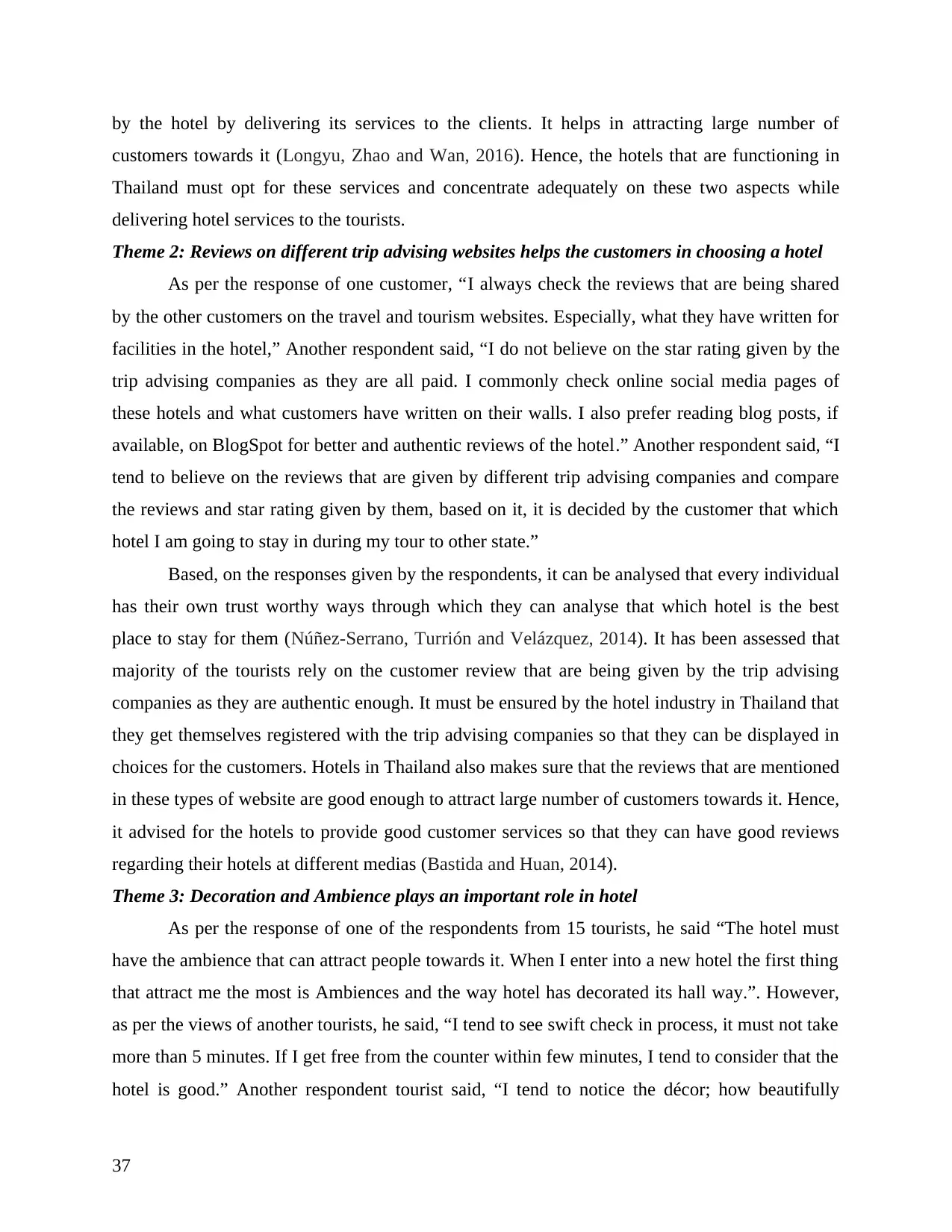
by the hotel by delivering its services to the clients. It helps in attracting large number of
customers towards it (Longyu, Zhao and Wan, 2016). Hence, the hotels that are functioning in
Thailand must opt for these services and concentrate adequately on these two aspects while
delivering hotel services to the tourists.
Theme 2: Reviews on different trip advising websites helps the customers in choosing a hotel
As per the response of one customer, “I always check the reviews that are being shared
by the other customers on the travel and tourism websites. Especially, what they have written for
facilities in the hotel,” Another respondent said, “I do not believe on the star rating given by the
trip advising companies as they are all paid. I commonly check online social media pages of
these hotels and what customers have written on their walls. I also prefer reading blog posts, if
available, on BlogSpot for better and authentic reviews of the hotel.” Another respondent said, “I
tend to believe on the reviews that are given by different trip advising companies and compare
the reviews and star rating given by them, based on it, it is decided by the customer that which
hotel I am going to stay in during my tour to other state.”
Based, on the responses given by the respondents, it can be analysed that every individual
has their own trust worthy ways through which they can analyse that which hotel is the best
place to stay for them (Núñez-Serrano, Turrión and Velázquez, 2014). It has been assessed that
majority of the tourists rely on the customer review that are being given by the trip advising
companies as they are authentic enough. It must be ensured by the hotel industry in Thailand that
they get themselves registered with the trip advising companies so that they can be displayed in
choices for the customers. Hotels in Thailand also makes sure that the reviews that are mentioned
in these types of website are good enough to attract large number of customers towards it. Hence,
it advised for the hotels to provide good customer services so that they can have good reviews
regarding their hotels at different medias (Bastida and Huan, 2014).
Theme 3: Decoration and Ambience plays an important role in hotel
As per the response of one of the respondents from 15 tourists, he said “The hotel must
have the ambience that can attract people towards it. When I enter into a new hotel the first thing
that attract me the most is Ambiences and the way hotel has decorated its hall way.”. However,
as per the views of another tourists, he said, “I tend to see swift check in process, it must not take
more than 5 minutes. If I get free from the counter within few minutes, I tend to consider that the
hotel is good.” Another respondent tourist said, “I tend to notice the décor; how beautifully
37
customers towards it (Longyu, Zhao and Wan, 2016). Hence, the hotels that are functioning in
Thailand must opt for these services and concentrate adequately on these two aspects while
delivering hotel services to the tourists.
Theme 2: Reviews on different trip advising websites helps the customers in choosing a hotel
As per the response of one customer, “I always check the reviews that are being shared
by the other customers on the travel and tourism websites. Especially, what they have written for
facilities in the hotel,” Another respondent said, “I do not believe on the star rating given by the
trip advising companies as they are all paid. I commonly check online social media pages of
these hotels and what customers have written on their walls. I also prefer reading blog posts, if
available, on BlogSpot for better and authentic reviews of the hotel.” Another respondent said, “I
tend to believe on the reviews that are given by different trip advising companies and compare
the reviews and star rating given by them, based on it, it is decided by the customer that which
hotel I am going to stay in during my tour to other state.”
Based, on the responses given by the respondents, it can be analysed that every individual
has their own trust worthy ways through which they can analyse that which hotel is the best
place to stay for them (Núñez-Serrano, Turrión and Velázquez, 2014). It has been assessed that
majority of the tourists rely on the customer review that are being given by the trip advising
companies as they are authentic enough. It must be ensured by the hotel industry in Thailand that
they get themselves registered with the trip advising companies so that they can be displayed in
choices for the customers. Hotels in Thailand also makes sure that the reviews that are mentioned
in these types of website are good enough to attract large number of customers towards it. Hence,
it advised for the hotels to provide good customer services so that they can have good reviews
regarding their hotels at different medias (Bastida and Huan, 2014).
Theme 3: Decoration and Ambience plays an important role in hotel
As per the response of one of the respondents from 15 tourists, he said “The hotel must
have the ambience that can attract people towards it. When I enter into a new hotel the first thing
that attract me the most is Ambiences and the way hotel has decorated its hall way.”. However,
as per the views of another tourists, he said, “I tend to see swift check in process, it must not take
more than 5 minutes. If I get free from the counter within few minutes, I tend to consider that the
hotel is good.” Another respondent tourist said, “I tend to notice the décor; how beautifully
37
Paraphrase This Document
Need a fresh take? Get an instant paraphrase of this document with our AI Paraphraser
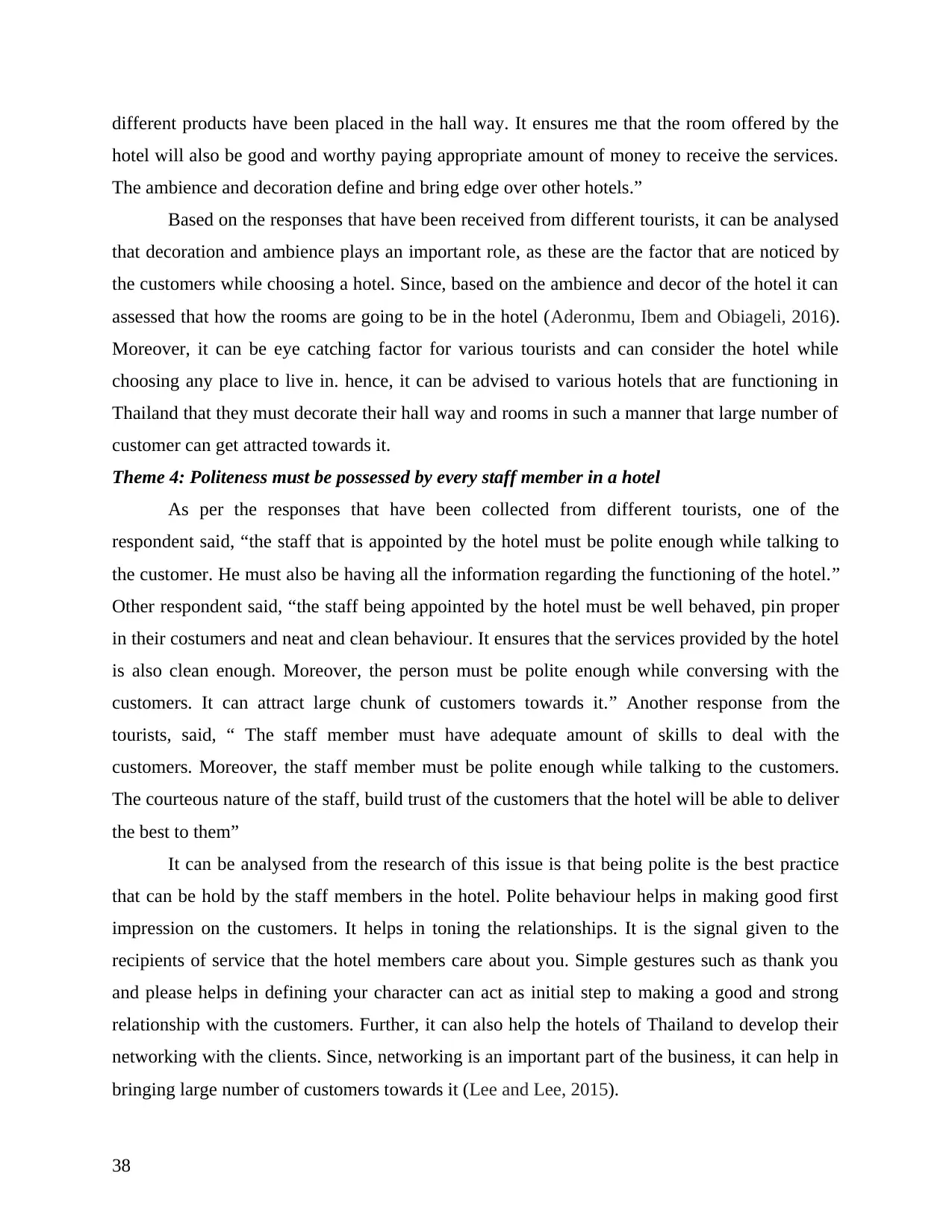
different products have been placed in the hall way. It ensures me that the room offered by the
hotel will also be good and worthy paying appropriate amount of money to receive the services.
The ambience and decoration define and bring edge over other hotels.”
Based on the responses that have been received from different tourists, it can be analysed
that decoration and ambience plays an important role, as these are the factor that are noticed by
the customers while choosing a hotel. Since, based on the ambience and decor of the hotel it can
assessed that how the rooms are going to be in the hotel (Aderonmu, Ibem and Obiageli, 2016).
Moreover, it can be eye catching factor for various tourists and can consider the hotel while
choosing any place to live in. hence, it can be advised to various hotels that are functioning in
Thailand that they must decorate their hall way and rooms in such a manner that large number of
customer can get attracted towards it.
Theme 4: Politeness must be possessed by every staff member in a hotel
As per the responses that have been collected from different tourists, one of the
respondent said, “the staff that is appointed by the hotel must be polite enough while talking to
the customer. He must also be having all the information regarding the functioning of the hotel.”
Other respondent said, “the staff being appointed by the hotel must be well behaved, pin proper
in their costumers and neat and clean behaviour. It ensures that the services provided by the hotel
is also clean enough. Moreover, the person must be polite enough while conversing with the
customers. It can attract large chunk of customers towards it.” Another response from the
tourists, said, “ The staff member must have adequate amount of skills to deal with the
customers. Moreover, the staff member must be polite enough while talking to the customers.
The courteous nature of the staff, build trust of the customers that the hotel will be able to deliver
the best to them”
It can be analysed from the research of this issue is that being polite is the best practice
that can be hold by the staff members in the hotel. Polite behaviour helps in making good first
impression on the customers. It helps in toning the relationships. It is the signal given to the
recipients of service that the hotel members care about you. Simple gestures such as thank you
and please helps in defining your character can act as initial step to making a good and strong
relationship with the customers. Further, it can also help the hotels of Thailand to develop their
networking with the clients. Since, networking is an important part of the business, it can help in
bringing large number of customers towards it (Lee and Lee, 2015).
38
hotel will also be good and worthy paying appropriate amount of money to receive the services.
The ambience and decoration define and bring edge over other hotels.”
Based on the responses that have been received from different tourists, it can be analysed
that decoration and ambience plays an important role, as these are the factor that are noticed by
the customers while choosing a hotel. Since, based on the ambience and decor of the hotel it can
assessed that how the rooms are going to be in the hotel (Aderonmu, Ibem and Obiageli, 2016).
Moreover, it can be eye catching factor for various tourists and can consider the hotel while
choosing any place to live in. hence, it can be advised to various hotels that are functioning in
Thailand that they must decorate their hall way and rooms in such a manner that large number of
customer can get attracted towards it.
Theme 4: Politeness must be possessed by every staff member in a hotel
As per the responses that have been collected from different tourists, one of the
respondent said, “the staff that is appointed by the hotel must be polite enough while talking to
the customer. He must also be having all the information regarding the functioning of the hotel.”
Other respondent said, “the staff being appointed by the hotel must be well behaved, pin proper
in their costumers and neat and clean behaviour. It ensures that the services provided by the hotel
is also clean enough. Moreover, the person must be polite enough while conversing with the
customers. It can attract large chunk of customers towards it.” Another response from the
tourists, said, “ The staff member must have adequate amount of skills to deal with the
customers. Moreover, the staff member must be polite enough while talking to the customers.
The courteous nature of the staff, build trust of the customers that the hotel will be able to deliver
the best to them”
It can be analysed from the research of this issue is that being polite is the best practice
that can be hold by the staff members in the hotel. Polite behaviour helps in making good first
impression on the customers. It helps in toning the relationships. It is the signal given to the
recipients of service that the hotel members care about you. Simple gestures such as thank you
and please helps in defining your character can act as initial step to making a good and strong
relationship with the customers. Further, it can also help the hotels of Thailand to develop their
networking with the clients. Since, networking is an important part of the business, it can help in
bringing large number of customers towards it (Lee and Lee, 2015).
38
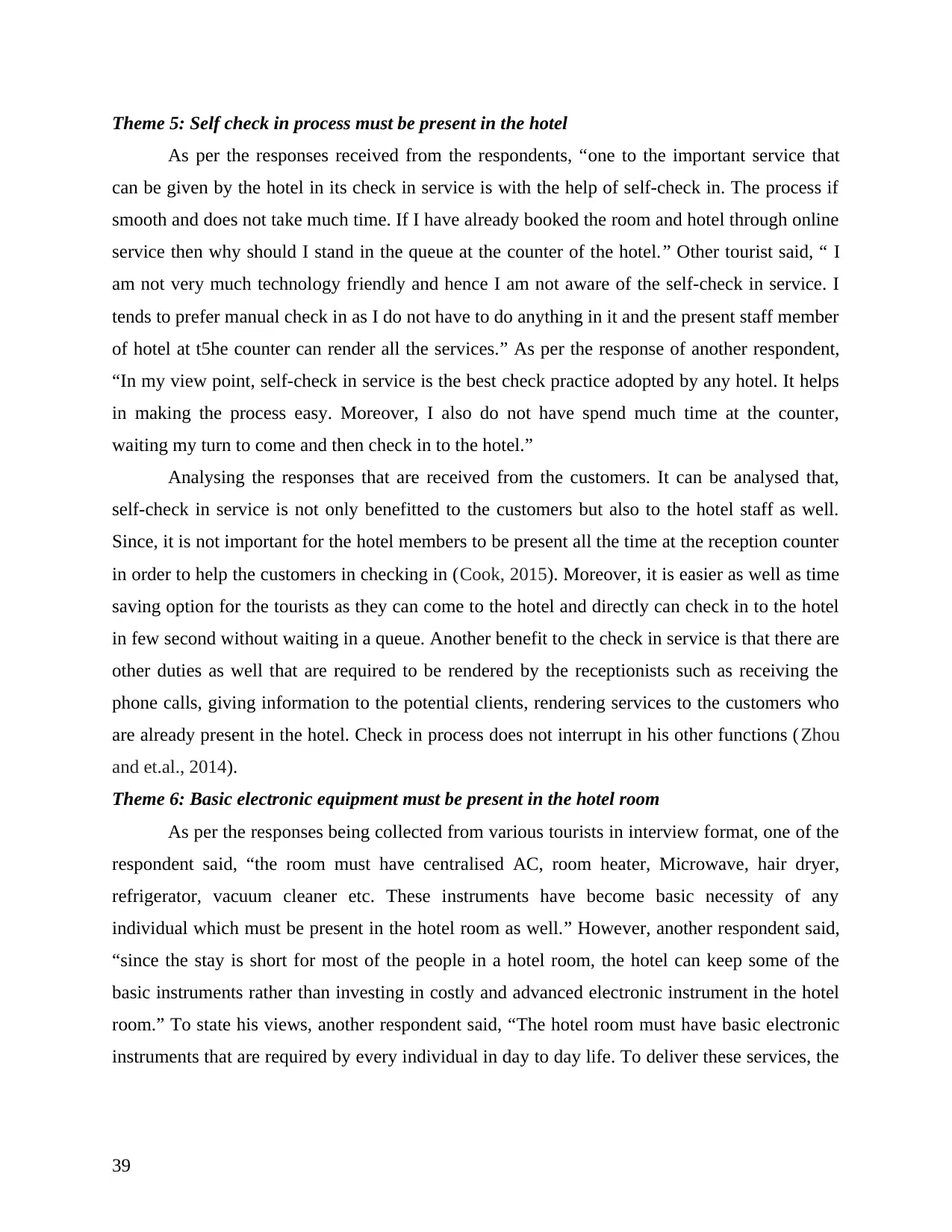
Theme 5: Self check in process must be present in the hotel
As per the responses received from the respondents, “one to the important service that
can be given by the hotel in its check in service is with the help of self-check in. The process if
smooth and does not take much time. If I have already booked the room and hotel through online
service then why should I stand in the queue at the counter of the hotel.” Other tourist said, “ I
am not very much technology friendly and hence I am not aware of the self-check in service. I
tends to prefer manual check in as I do not have to do anything in it and the present staff member
of hotel at t5he counter can render all the services.” As per the response of another respondent,
“In my view point, self-check in service is the best check practice adopted by any hotel. It helps
in making the process easy. Moreover, I also do not have spend much time at the counter,
waiting my turn to come and then check in to the hotel.”
Analysing the responses that are received from the customers. It can be analysed that,
self-check in service is not only benefitted to the customers but also to the hotel staff as well.
Since, it is not important for the hotel members to be present all the time at the reception counter
in order to help the customers in checking in (Cook, 2015). Moreover, it is easier as well as time
saving option for the tourists as they can come to the hotel and directly can check in to the hotel
in few second without waiting in a queue. Another benefit to the check in service is that there are
other duties as well that are required to be rendered by the receptionists such as receiving the
phone calls, giving information to the potential clients, rendering services to the customers who
are already present in the hotel. Check in process does not interrupt in his other functions (Zhou
and et.al., 2014).
Theme 6: Basic electronic equipment must be present in the hotel room
As per the responses being collected from various tourists in interview format, one of the
respondent said, “the room must have centralised AC, room heater, Microwave, hair dryer,
refrigerator, vacuum cleaner etc. These instruments have become basic necessity of any
individual which must be present in the hotel room as well.” However, another respondent said,
“since the stay is short for most of the people in a hotel room, the hotel can keep some of the
basic instruments rather than investing in costly and advanced electronic instrument in the hotel
room.” To state his views, another respondent said, “The hotel room must have basic electronic
instruments that are required by every individual in day to day life. To deliver these services, the
39
As per the responses received from the respondents, “one to the important service that
can be given by the hotel in its check in service is with the help of self-check in. The process if
smooth and does not take much time. If I have already booked the room and hotel through online
service then why should I stand in the queue at the counter of the hotel.” Other tourist said, “ I
am not very much technology friendly and hence I am not aware of the self-check in service. I
tends to prefer manual check in as I do not have to do anything in it and the present staff member
of hotel at t5he counter can render all the services.” As per the response of another respondent,
“In my view point, self-check in service is the best check practice adopted by any hotel. It helps
in making the process easy. Moreover, I also do not have spend much time at the counter,
waiting my turn to come and then check in to the hotel.”
Analysing the responses that are received from the customers. It can be analysed that,
self-check in service is not only benefitted to the customers but also to the hotel staff as well.
Since, it is not important for the hotel members to be present all the time at the reception counter
in order to help the customers in checking in (Cook, 2015). Moreover, it is easier as well as time
saving option for the tourists as they can come to the hotel and directly can check in to the hotel
in few second without waiting in a queue. Another benefit to the check in service is that there are
other duties as well that are required to be rendered by the receptionists such as receiving the
phone calls, giving information to the potential clients, rendering services to the customers who
are already present in the hotel. Check in process does not interrupt in his other functions (Zhou
and et.al., 2014).
Theme 6: Basic electronic equipment must be present in the hotel room
As per the responses being collected from various tourists in interview format, one of the
respondent said, “the room must have centralised AC, room heater, Microwave, hair dryer,
refrigerator, vacuum cleaner etc. These instruments have become basic necessity of any
individual which must be present in the hotel room as well.” However, another respondent said,
“since the stay is short for most of the people in a hotel room, the hotel can keep some of the
basic instruments rather than investing in costly and advanced electronic instrument in the hotel
room.” To state his views, another respondent said, “The hotel room must have basic electronic
instruments that are required by every individual in day to day life. To deliver these services, the
39
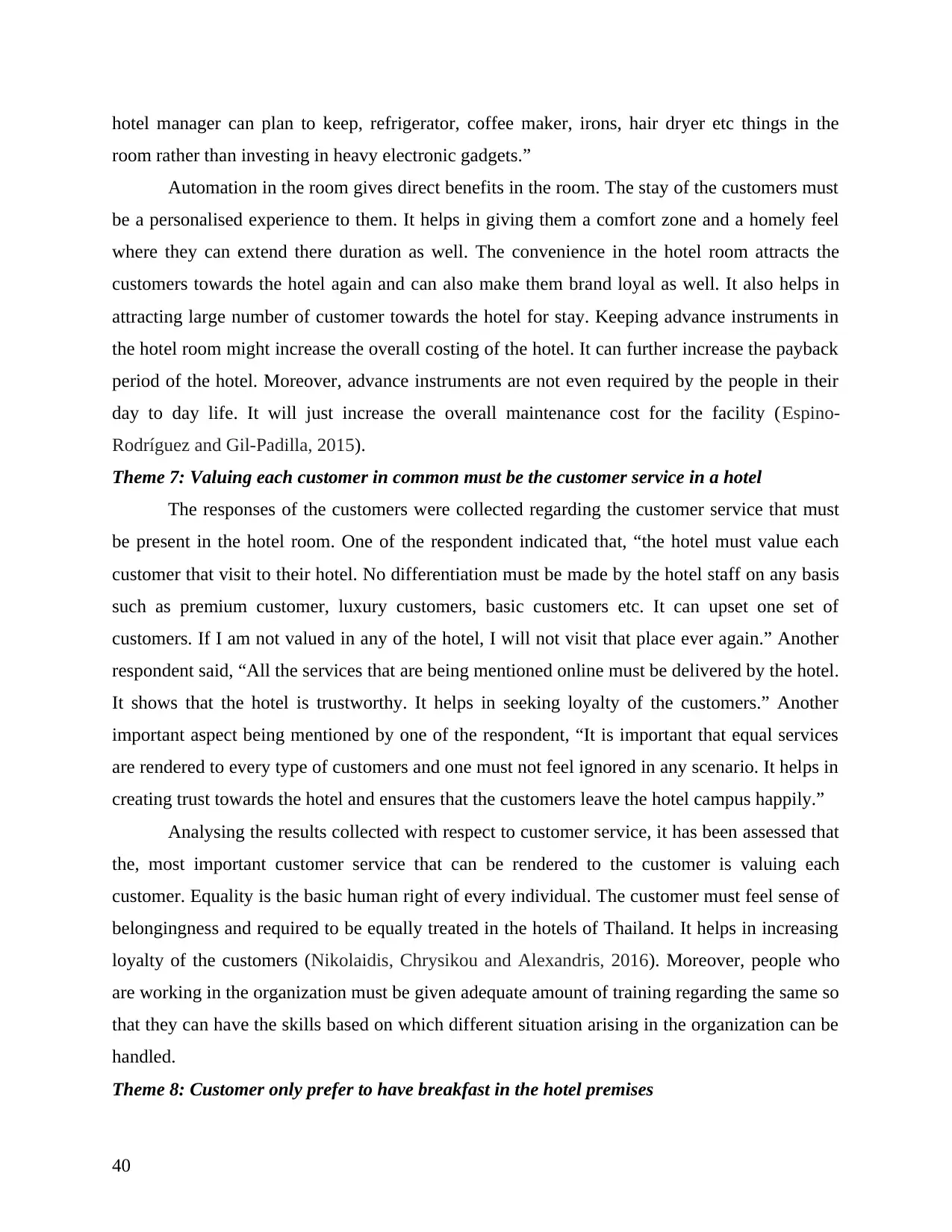
hotel manager can plan to keep, refrigerator, coffee maker, irons, hair dryer etc things in the
room rather than investing in heavy electronic gadgets.”
Automation in the room gives direct benefits in the room. The stay of the customers must
be a personalised experience to them. It helps in giving them a comfort zone and a homely feel
where they can extend there duration as well. The convenience in the hotel room attracts the
customers towards the hotel again and can also make them brand loyal as well. It also helps in
attracting large number of customer towards the hotel for stay. Keeping advance instruments in
the hotel room might increase the overall costing of the hotel. It can further increase the payback
period of the hotel. Moreover, advance instruments are not even required by the people in their
day to day life. It will just increase the overall maintenance cost for the facility (Espino-
Rodríguez and Gil-Padilla, 2015).
Theme 7: Valuing each customer in common must be the customer service in a hotel
The responses of the customers were collected regarding the customer service that must
be present in the hotel room. One of the respondent indicated that, “the hotel must value each
customer that visit to their hotel. No differentiation must be made by the hotel staff on any basis
such as premium customer, luxury customers, basic customers etc. It can upset one set of
customers. If I am not valued in any of the hotel, I will not visit that place ever again.” Another
respondent said, “All the services that are being mentioned online must be delivered by the hotel.
It shows that the hotel is trustworthy. It helps in seeking loyalty of the customers.” Another
important aspect being mentioned by one of the respondent, “It is important that equal services
are rendered to every type of customers and one must not feel ignored in any scenario. It helps in
creating trust towards the hotel and ensures that the customers leave the hotel campus happily.”
Analysing the results collected with respect to customer service, it has been assessed that
the, most important customer service that can be rendered to the customer is valuing each
customer. Equality is the basic human right of every individual. The customer must feel sense of
belongingness and required to be equally treated in the hotels of Thailand. It helps in increasing
loyalty of the customers (Nikolaidis, Chrysikou and Alexandris, 2016). Moreover, people who
are working in the organization must be given adequate amount of training regarding the same so
that they can have the skills based on which different situation arising in the organization can be
handled.
Theme 8: Customer only prefer to have breakfast in the hotel premises
40
room rather than investing in heavy electronic gadgets.”
Automation in the room gives direct benefits in the room. The stay of the customers must
be a personalised experience to them. It helps in giving them a comfort zone and a homely feel
where they can extend there duration as well. The convenience in the hotel room attracts the
customers towards the hotel again and can also make them brand loyal as well. It also helps in
attracting large number of customer towards the hotel for stay. Keeping advance instruments in
the hotel room might increase the overall costing of the hotel. It can further increase the payback
period of the hotel. Moreover, advance instruments are not even required by the people in their
day to day life. It will just increase the overall maintenance cost for the facility (Espino-
Rodríguez and Gil-Padilla, 2015).
Theme 7: Valuing each customer in common must be the customer service in a hotel
The responses of the customers were collected regarding the customer service that must
be present in the hotel room. One of the respondent indicated that, “the hotel must value each
customer that visit to their hotel. No differentiation must be made by the hotel staff on any basis
such as premium customer, luxury customers, basic customers etc. It can upset one set of
customers. If I am not valued in any of the hotel, I will not visit that place ever again.” Another
respondent said, “All the services that are being mentioned online must be delivered by the hotel.
It shows that the hotel is trustworthy. It helps in seeking loyalty of the customers.” Another
important aspect being mentioned by one of the respondent, “It is important that equal services
are rendered to every type of customers and one must not feel ignored in any scenario. It helps in
creating trust towards the hotel and ensures that the customers leave the hotel campus happily.”
Analysing the results collected with respect to customer service, it has been assessed that
the, most important customer service that can be rendered to the customer is valuing each
customer. Equality is the basic human right of every individual. The customer must feel sense of
belongingness and required to be equally treated in the hotels of Thailand. It helps in increasing
loyalty of the customers (Nikolaidis, Chrysikou and Alexandris, 2016). Moreover, people who
are working in the organization must be given adequate amount of training regarding the same so
that they can have the skills based on which different situation arising in the organization can be
handled.
Theme 8: Customer only prefer to have breakfast in the hotel premises
40
Secure Best Marks with AI Grader
Need help grading? Try our AI Grader for instant feedback on your assignments.
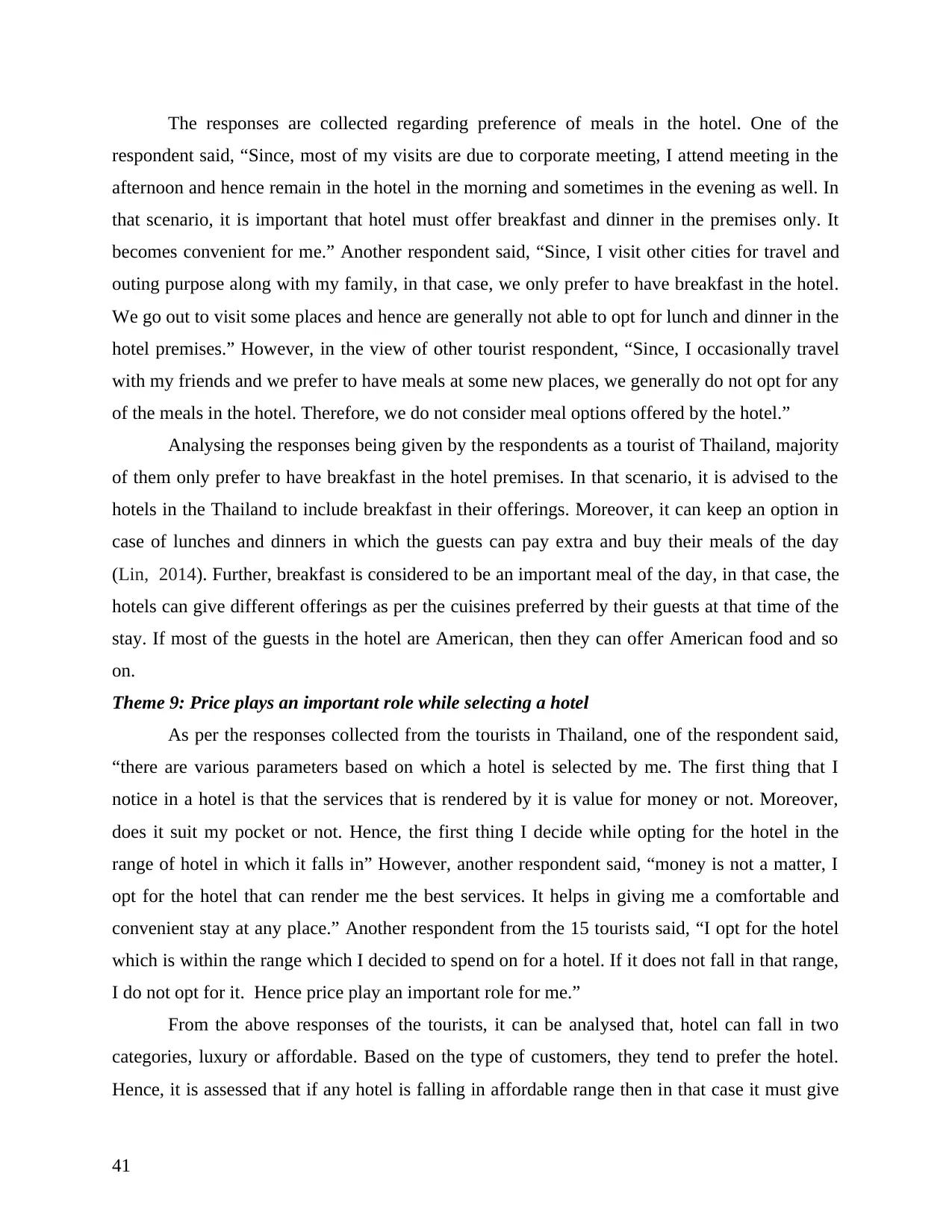
The responses are collected regarding preference of meals in the hotel. One of the
respondent said, “Since, most of my visits are due to corporate meeting, I attend meeting in the
afternoon and hence remain in the hotel in the morning and sometimes in the evening as well. In
that scenario, it is important that hotel must offer breakfast and dinner in the premises only. It
becomes convenient for me.” Another respondent said, “Since, I visit other cities for travel and
outing purpose along with my family, in that case, we only prefer to have breakfast in the hotel.
We go out to visit some places and hence are generally not able to opt for lunch and dinner in the
hotel premises.” However, in the view of other tourist respondent, “Since, I occasionally travel
with my friends and we prefer to have meals at some new places, we generally do not opt for any
of the meals in the hotel. Therefore, we do not consider meal options offered by the hotel.”
Analysing the responses being given by the respondents as a tourist of Thailand, majority
of them only prefer to have breakfast in the hotel premises. In that scenario, it is advised to the
hotels in the Thailand to include breakfast in their offerings. Moreover, it can keep an option in
case of lunches and dinners in which the guests can pay extra and buy their meals of the day
(Lin, 2014). Further, breakfast is considered to be an important meal of the day, in that case, the
hotels can give different offerings as per the cuisines preferred by their guests at that time of the
stay. If most of the guests in the hotel are American, then they can offer American food and so
on.
Theme 9: Price plays an important role while selecting a hotel
As per the responses collected from the tourists in Thailand, one of the respondent said,
“there are various parameters based on which a hotel is selected by me. The first thing that I
notice in a hotel is that the services that is rendered by it is value for money or not. Moreover,
does it suit my pocket or not. Hence, the first thing I decide while opting for the hotel in the
range of hotel in which it falls in” However, another respondent said, “money is not a matter, I
opt for the hotel that can render me the best services. It helps in giving me a comfortable and
convenient stay at any place.” Another respondent from the 15 tourists said, “I opt for the hotel
which is within the range which I decided to spend on for a hotel. If it does not fall in that range,
I do not opt for it. Hence price play an important role for me.”
From the above responses of the tourists, it can be analysed that, hotel can fall in two
categories, luxury or affordable. Based on the type of customers, they tend to prefer the hotel.
Hence, it is assessed that if any hotel is falling in affordable range then in that case it must give
41
respondent said, “Since, most of my visits are due to corporate meeting, I attend meeting in the
afternoon and hence remain in the hotel in the morning and sometimes in the evening as well. In
that scenario, it is important that hotel must offer breakfast and dinner in the premises only. It
becomes convenient for me.” Another respondent said, “Since, I visit other cities for travel and
outing purpose along with my family, in that case, we only prefer to have breakfast in the hotel.
We go out to visit some places and hence are generally not able to opt for lunch and dinner in the
hotel premises.” However, in the view of other tourist respondent, “Since, I occasionally travel
with my friends and we prefer to have meals at some new places, we generally do not opt for any
of the meals in the hotel. Therefore, we do not consider meal options offered by the hotel.”
Analysing the responses being given by the respondents as a tourist of Thailand, majority
of them only prefer to have breakfast in the hotel premises. In that scenario, it is advised to the
hotels in the Thailand to include breakfast in their offerings. Moreover, it can keep an option in
case of lunches and dinners in which the guests can pay extra and buy their meals of the day
(Lin, 2014). Further, breakfast is considered to be an important meal of the day, in that case, the
hotels can give different offerings as per the cuisines preferred by their guests at that time of the
stay. If most of the guests in the hotel are American, then they can offer American food and so
on.
Theme 9: Price plays an important role while selecting a hotel
As per the responses collected from the tourists in Thailand, one of the respondent said,
“there are various parameters based on which a hotel is selected by me. The first thing that I
notice in a hotel is that the services that is rendered by it is value for money or not. Moreover,
does it suit my pocket or not. Hence, the first thing I decide while opting for the hotel in the
range of hotel in which it falls in” However, another respondent said, “money is not a matter, I
opt for the hotel that can render me the best services. It helps in giving me a comfortable and
convenient stay at any place.” Another respondent from the 15 tourists said, “I opt for the hotel
which is within the range which I decided to spend on for a hotel. If it does not fall in that range,
I do not opt for it. Hence price play an important role for me.”
From the above responses of the tourists, it can be analysed that, hotel can fall in two
categories, luxury or affordable. Based on the type of customers, they tend to prefer the hotel.
Hence, it is assessed that if any hotel is falling in affordable range then in that case it must give
41
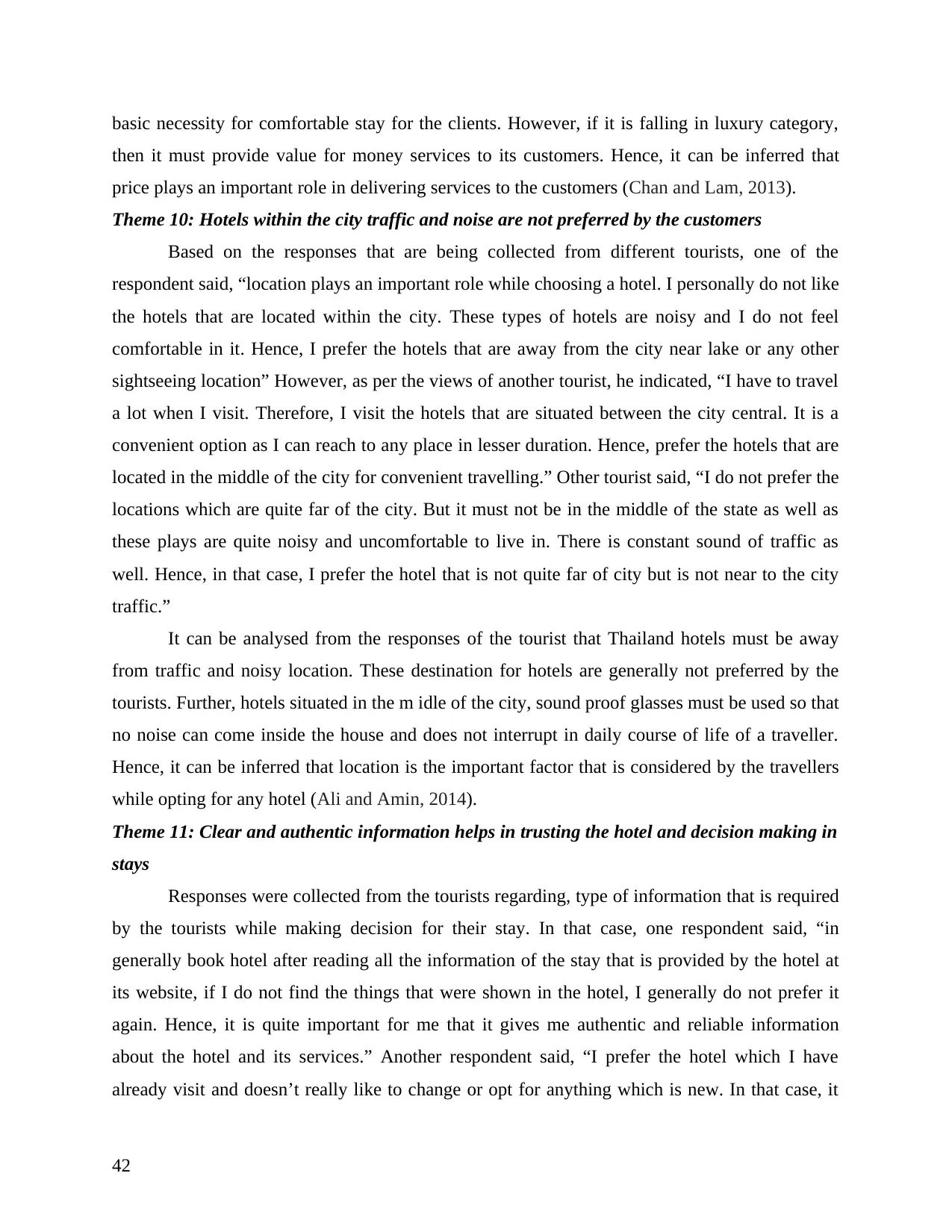
basic necessity for comfortable stay for the clients. However, if it is falling in luxury category,
then it must provide value for money services to its customers. Hence, it can be inferred that
price plays an important role in delivering services to the customers (Chan and Lam, 2013).
Theme 10: Hotels within the city traffic and noise are not preferred by the customers
Based on the responses that are being collected from different tourists, one of the
respondent said, “location plays an important role while choosing a hotel. I personally do not like
the hotels that are located within the city. These types of hotels are noisy and I do not feel
comfortable in it. Hence, I prefer the hotels that are away from the city near lake or any other
sightseeing location” However, as per the views of another tourist, he indicated, “I have to travel
a lot when I visit. Therefore, I visit the hotels that are situated between the city central. It is a
convenient option as I can reach to any place in lesser duration. Hence, prefer the hotels that are
located in the middle of the city for convenient travelling.” Other tourist said, “I do not prefer the
locations which are quite far of the city. But it must not be in the middle of the state as well as
these plays are quite noisy and uncomfortable to live in. There is constant sound of traffic as
well. Hence, in that case, I prefer the hotel that is not quite far of city but is not near to the city
traffic.”
It can be analysed from the responses of the tourist that Thailand hotels must be away
from traffic and noisy location. These destination for hotels are generally not preferred by the
tourists. Further, hotels situated in the m idle of the city, sound proof glasses must be used so that
no noise can come inside the house and does not interrupt in daily course of life of a traveller.
Hence, it can be inferred that location is the important factor that is considered by the travellers
while opting for any hotel (Ali and Amin, 2014).
Theme 11: Clear and authentic information helps in trusting the hotel and decision making in
stays
Responses were collected from the tourists regarding, type of information that is required
by the tourists while making decision for their stay. In that case, one respondent said, “in
generally book hotel after reading all the information of the stay that is provided by the hotel at
its website, if I do not find the things that were shown in the hotel, I generally do not prefer it
again. Hence, it is quite important for me that it gives me authentic and reliable information
about the hotel and its services.” Another respondent said, “I prefer the hotel which I have
already visit and doesn’t really like to change or opt for anything which is new. In that case, it
42
then it must provide value for money services to its customers. Hence, it can be inferred that
price plays an important role in delivering services to the customers (Chan and Lam, 2013).
Theme 10: Hotels within the city traffic and noise are not preferred by the customers
Based on the responses that are being collected from different tourists, one of the
respondent said, “location plays an important role while choosing a hotel. I personally do not like
the hotels that are located within the city. These types of hotels are noisy and I do not feel
comfortable in it. Hence, I prefer the hotels that are away from the city near lake or any other
sightseeing location” However, as per the views of another tourist, he indicated, “I have to travel
a lot when I visit. Therefore, I visit the hotels that are situated between the city central. It is a
convenient option as I can reach to any place in lesser duration. Hence, prefer the hotels that are
located in the middle of the city for convenient travelling.” Other tourist said, “I do not prefer the
locations which are quite far of the city. But it must not be in the middle of the state as well as
these plays are quite noisy and uncomfortable to live in. There is constant sound of traffic as
well. Hence, in that case, I prefer the hotel that is not quite far of city but is not near to the city
traffic.”
It can be analysed from the responses of the tourist that Thailand hotels must be away
from traffic and noisy location. These destination for hotels are generally not preferred by the
tourists. Further, hotels situated in the m idle of the city, sound proof glasses must be used so that
no noise can come inside the house and does not interrupt in daily course of life of a traveller.
Hence, it can be inferred that location is the important factor that is considered by the travellers
while opting for any hotel (Ali and Amin, 2014).
Theme 11: Clear and authentic information helps in trusting the hotel and decision making in
stays
Responses were collected from the tourists regarding, type of information that is required
by the tourists while making decision for their stay. In that case, one respondent said, “in
generally book hotel after reading all the information of the stay that is provided by the hotel at
its website, if I do not find the things that were shown in the hotel, I generally do not prefer it
again. Hence, it is quite important for me that it gives me authentic and reliable information
about the hotel and its services.” Another respondent said, “I prefer the hotel which I have
already visit and doesn’t really like to change or opt for anything which is new. In that case, it
42
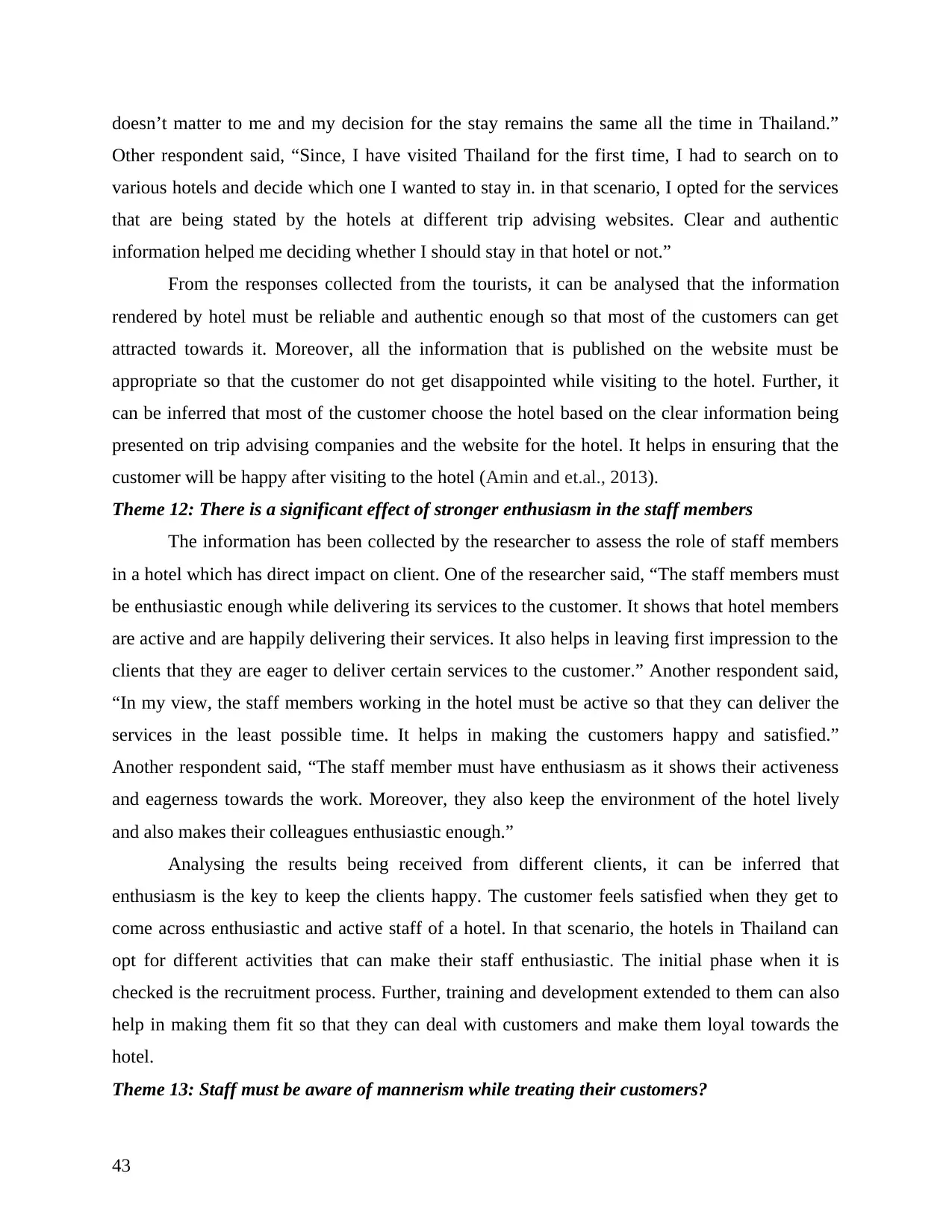
doesn’t matter to me and my decision for the stay remains the same all the time in Thailand.”
Other respondent said, “Since, I have visited Thailand for the first time, I had to search on to
various hotels and decide which one I wanted to stay in. in that scenario, I opted for the services
that are being stated by the hotels at different trip advising websites. Clear and authentic
information helped me deciding whether I should stay in that hotel or not.”
From the responses collected from the tourists, it can be analysed that the information
rendered by hotel must be reliable and authentic enough so that most of the customers can get
attracted towards it. Moreover, all the information that is published on the website must be
appropriate so that the customer do not get disappointed while visiting to the hotel. Further, it
can be inferred that most of the customer choose the hotel based on the clear information being
presented on trip advising companies and the website for the hotel. It helps in ensuring that the
customer will be happy after visiting to the hotel (Amin and et.al., 2013).
Theme 12: There is a significant effect of stronger enthusiasm in the staff members
The information has been collected by the researcher to assess the role of staff members
in a hotel which has direct impact on client. One of the researcher said, “The staff members must
be enthusiastic enough while delivering its services to the customer. It shows that hotel members
are active and are happily delivering their services. It also helps in leaving first impression to the
clients that they are eager to deliver certain services to the customer.” Another respondent said,
“In my view, the staff members working in the hotel must be active so that they can deliver the
services in the least possible time. It helps in making the customers happy and satisfied.”
Another respondent said, “The staff member must have enthusiasm as it shows their activeness
and eagerness towards the work. Moreover, they also keep the environment of the hotel lively
and also makes their colleagues enthusiastic enough.”
Analysing the results being received from different clients, it can be inferred that
enthusiasm is the key to keep the clients happy. The customer feels satisfied when they get to
come across enthusiastic and active staff of a hotel. In that scenario, the hotels in Thailand can
opt for different activities that can make their staff enthusiastic. The initial phase when it is
checked is the recruitment process. Further, training and development extended to them can also
help in making them fit so that they can deal with customers and make them loyal towards the
hotel.
Theme 13: Staff must be aware of mannerism while treating their customers?
43
Other respondent said, “Since, I have visited Thailand for the first time, I had to search on to
various hotels and decide which one I wanted to stay in. in that scenario, I opted for the services
that are being stated by the hotels at different trip advising websites. Clear and authentic
information helped me deciding whether I should stay in that hotel or not.”
From the responses collected from the tourists, it can be analysed that the information
rendered by hotel must be reliable and authentic enough so that most of the customers can get
attracted towards it. Moreover, all the information that is published on the website must be
appropriate so that the customer do not get disappointed while visiting to the hotel. Further, it
can be inferred that most of the customer choose the hotel based on the clear information being
presented on trip advising companies and the website for the hotel. It helps in ensuring that the
customer will be happy after visiting to the hotel (Amin and et.al., 2013).
Theme 12: There is a significant effect of stronger enthusiasm in the staff members
The information has been collected by the researcher to assess the role of staff members
in a hotel which has direct impact on client. One of the researcher said, “The staff members must
be enthusiastic enough while delivering its services to the customer. It shows that hotel members
are active and are happily delivering their services. It also helps in leaving first impression to the
clients that they are eager to deliver certain services to the customer.” Another respondent said,
“In my view, the staff members working in the hotel must be active so that they can deliver the
services in the least possible time. It helps in making the customers happy and satisfied.”
Another respondent said, “The staff member must have enthusiasm as it shows their activeness
and eagerness towards the work. Moreover, they also keep the environment of the hotel lively
and also makes their colleagues enthusiastic enough.”
Analysing the results being received from different clients, it can be inferred that
enthusiasm is the key to keep the clients happy. The customer feels satisfied when they get to
come across enthusiastic and active staff of a hotel. In that scenario, the hotels in Thailand can
opt for different activities that can make their staff enthusiastic. The initial phase when it is
checked is the recruitment process. Further, training and development extended to them can also
help in making them fit so that they can deal with customers and make them loyal towards the
hotel.
Theme 13: Staff must be aware of mannerism while treating their customers?
43
Paraphrase This Document
Need a fresh take? Get an instant paraphrase of this document with our AI Paraphraser
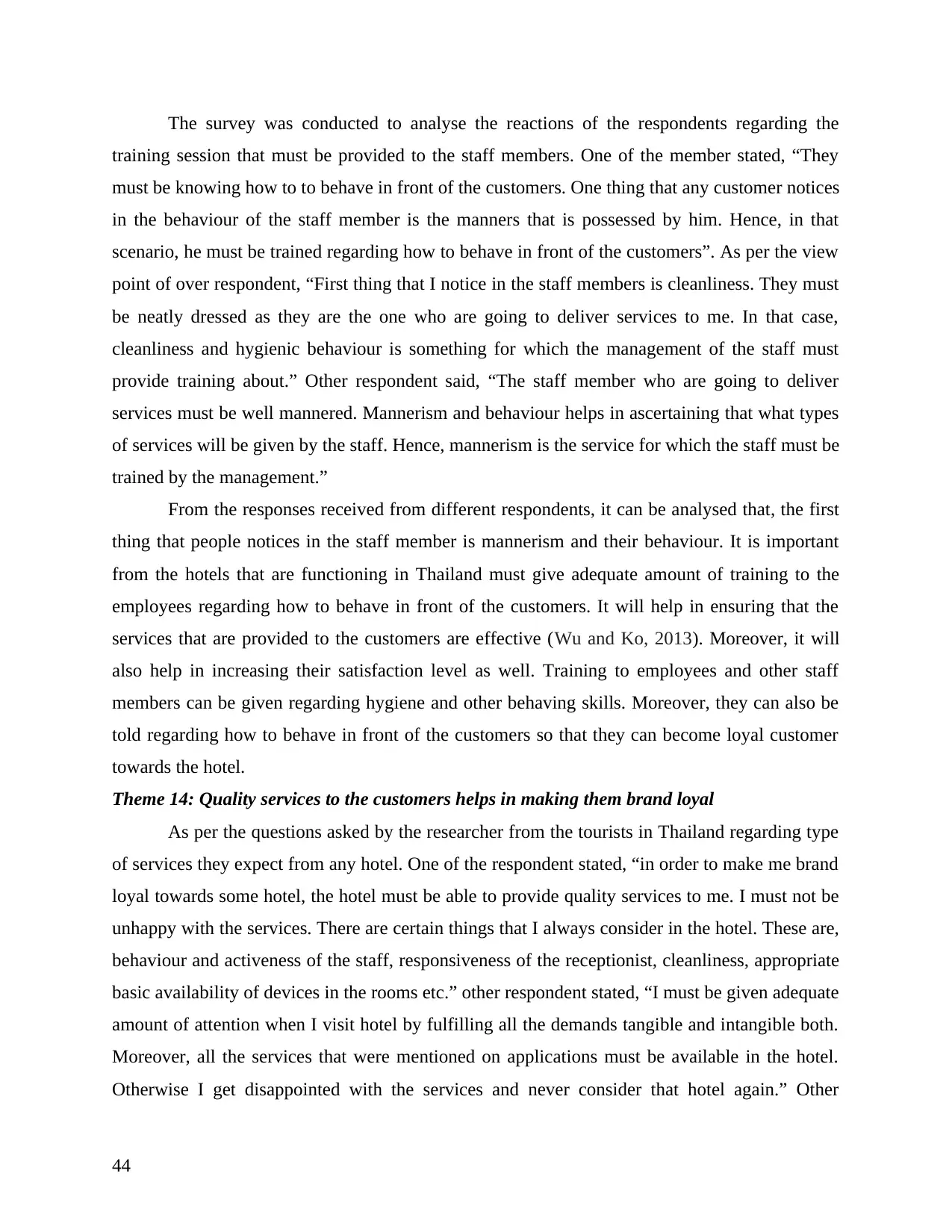
The survey was conducted to analyse the reactions of the respondents regarding the
training session that must be provided to the staff members. One of the member stated, “They
must be knowing how to to behave in front of the customers. One thing that any customer notices
in the behaviour of the staff member is the manners that is possessed by him. Hence, in that
scenario, he must be trained regarding how to behave in front of the customers”. As per the view
point of over respondent, “First thing that I notice in the staff members is cleanliness. They must
be neatly dressed as they are the one who are going to deliver services to me. In that case,
cleanliness and hygienic behaviour is something for which the management of the staff must
provide training about.” Other respondent said, “The staff member who are going to deliver
services must be well mannered. Mannerism and behaviour helps in ascertaining that what types
of services will be given by the staff. Hence, mannerism is the service for which the staff must be
trained by the management.”
From the responses received from different respondents, it can be analysed that, the first
thing that people notices in the staff member is mannerism and their behaviour. It is important
from the hotels that are functioning in Thailand must give adequate amount of training to the
employees regarding how to behave in front of the customers. It will help in ensuring that the
services that are provided to the customers are effective (Wu and Ko, 2013). Moreover, it will
also help in increasing their satisfaction level as well. Training to employees and other staff
members can be given regarding hygiene and other behaving skills. Moreover, they can also be
told regarding how to behave in front of the customers so that they can become loyal customer
towards the hotel.
Theme 14: Quality services to the customers helps in making them brand loyal
As per the questions asked by the researcher from the tourists in Thailand regarding type
of services they expect from any hotel. One of the respondent stated, “in order to make me brand
loyal towards some hotel, the hotel must be able to provide quality services to me. I must not be
unhappy with the services. There are certain things that I always consider in the hotel. These are,
behaviour and activeness of the staff, responsiveness of the receptionist, cleanliness, appropriate
basic availability of devices in the rooms etc.” other respondent stated, “I must be given adequate
amount of attention when I visit hotel by fulfilling all the demands tangible and intangible both.
Moreover, all the services that were mentioned on applications must be available in the hotel.
Otherwise I get disappointed with the services and never consider that hotel again.” Other
44
training session that must be provided to the staff members. One of the member stated, “They
must be knowing how to to behave in front of the customers. One thing that any customer notices
in the behaviour of the staff member is the manners that is possessed by him. Hence, in that
scenario, he must be trained regarding how to behave in front of the customers”. As per the view
point of over respondent, “First thing that I notice in the staff members is cleanliness. They must
be neatly dressed as they are the one who are going to deliver services to me. In that case,
cleanliness and hygienic behaviour is something for which the management of the staff must
provide training about.” Other respondent said, “The staff member who are going to deliver
services must be well mannered. Mannerism and behaviour helps in ascertaining that what types
of services will be given by the staff. Hence, mannerism is the service for which the staff must be
trained by the management.”
From the responses received from different respondents, it can be analysed that, the first
thing that people notices in the staff member is mannerism and their behaviour. It is important
from the hotels that are functioning in Thailand must give adequate amount of training to the
employees regarding how to behave in front of the customers. It will help in ensuring that the
services that are provided to the customers are effective (Wu and Ko, 2013). Moreover, it will
also help in increasing their satisfaction level as well. Training to employees and other staff
members can be given regarding hygiene and other behaving skills. Moreover, they can also be
told regarding how to behave in front of the customers so that they can become loyal customer
towards the hotel.
Theme 14: Quality services to the customers helps in making them brand loyal
As per the questions asked by the researcher from the tourists in Thailand regarding type
of services they expect from any hotel. One of the respondent stated, “in order to make me brand
loyal towards some hotel, the hotel must be able to provide quality services to me. I must not be
unhappy with the services. There are certain things that I always consider in the hotel. These are,
behaviour and activeness of the staff, responsiveness of the receptionist, cleanliness, appropriate
basic availability of devices in the rooms etc.” other respondent stated, “I must be given adequate
amount of attention when I visit hotel by fulfilling all the demands tangible and intangible both.
Moreover, all the services that were mentioned on applications must be available in the hotel.
Otherwise I get disappointed with the services and never consider that hotel again.” Other
44
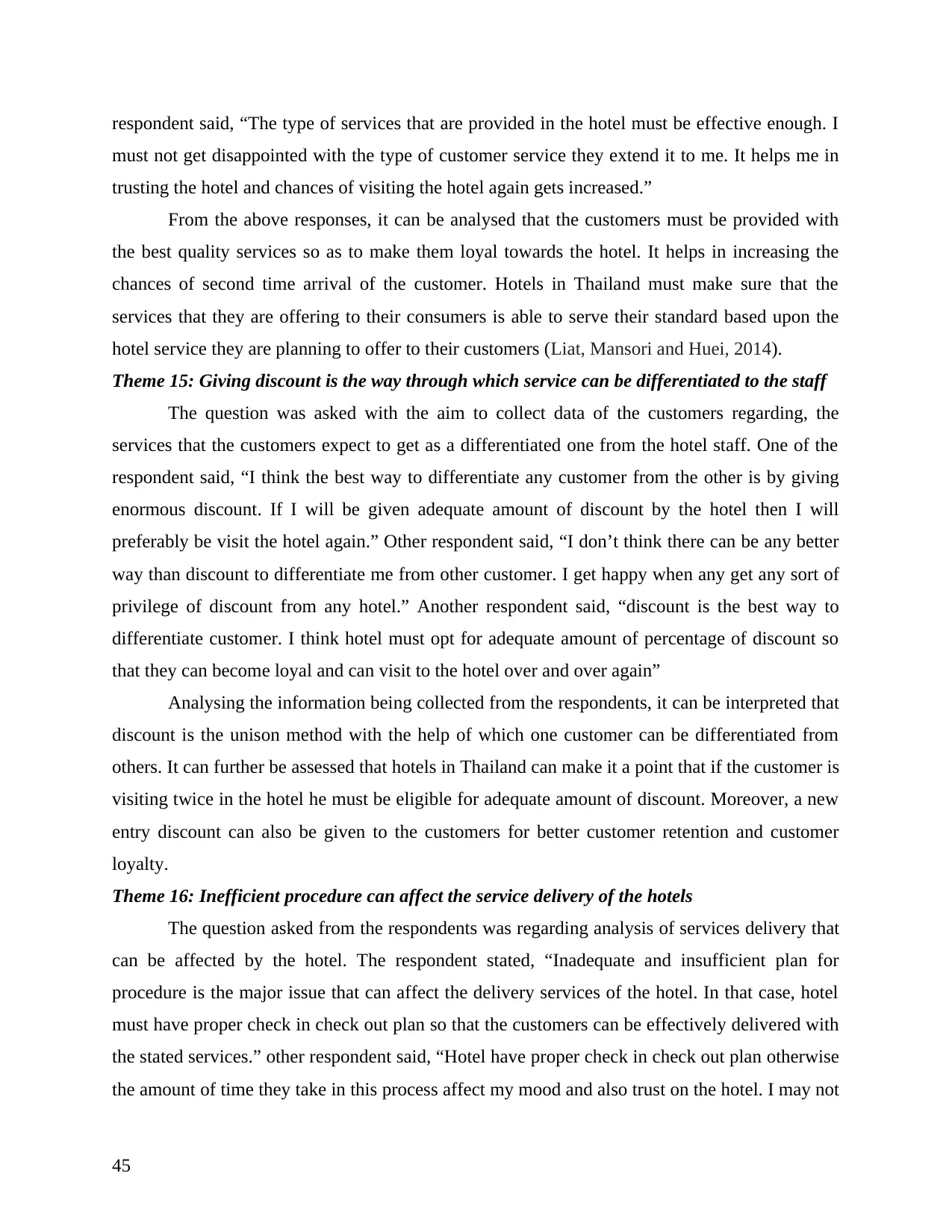
respondent said, “The type of services that are provided in the hotel must be effective enough. I
must not get disappointed with the type of customer service they extend it to me. It helps me in
trusting the hotel and chances of visiting the hotel again gets increased.”
From the above responses, it can be analysed that the customers must be provided with
the best quality services so as to make them loyal towards the hotel. It helps in increasing the
chances of second time arrival of the customer. Hotels in Thailand must make sure that the
services that they are offering to their consumers is able to serve their standard based upon the
hotel service they are planning to offer to their customers (Liat, Mansori and Huei, 2014).
Theme 15: Giving discount is the way through which service can be differentiated to the staff
The question was asked with the aim to collect data of the customers regarding, the
services that the customers expect to get as a differentiated one from the hotel staff. One of the
respondent said, “I think the best way to differentiate any customer from the other is by giving
enormous discount. If I will be given adequate amount of discount by the hotel then I will
preferably be visit the hotel again.” Other respondent said, “I don’t think there can be any better
way than discount to differentiate me from other customer. I get happy when any get any sort of
privilege of discount from any hotel.” Another respondent said, “discount is the best way to
differentiate customer. I think hotel must opt for adequate amount of percentage of discount so
that they can become loyal and can visit to the hotel over and over again”
Analysing the information being collected from the respondents, it can be interpreted that
discount is the unison method with the help of which one customer can be differentiated from
others. It can further be assessed that hotels in Thailand can make it a point that if the customer is
visiting twice in the hotel he must be eligible for adequate amount of discount. Moreover, a new
entry discount can also be given to the customers for better customer retention and customer
loyalty.
Theme 16: Inefficient procedure can affect the service delivery of the hotels
The question asked from the respondents was regarding analysis of services delivery that
can be affected by the hotel. The respondent stated, “Inadequate and insufficient plan for
procedure is the major issue that can affect the delivery services of the hotel. In that case, hotel
must have proper check in check out plan so that the customers can be effectively delivered with
the stated services.” other respondent said, “Hotel have proper check in check out plan otherwise
the amount of time they take in this process affect my mood and also trust on the hotel. I may not
45
must not get disappointed with the type of customer service they extend it to me. It helps me in
trusting the hotel and chances of visiting the hotel again gets increased.”
From the above responses, it can be analysed that the customers must be provided with
the best quality services so as to make them loyal towards the hotel. It helps in increasing the
chances of second time arrival of the customer. Hotels in Thailand must make sure that the
services that they are offering to their consumers is able to serve their standard based upon the
hotel service they are planning to offer to their customers (Liat, Mansori and Huei, 2014).
Theme 15: Giving discount is the way through which service can be differentiated to the staff
The question was asked with the aim to collect data of the customers regarding, the
services that the customers expect to get as a differentiated one from the hotel staff. One of the
respondent said, “I think the best way to differentiate any customer from the other is by giving
enormous discount. If I will be given adequate amount of discount by the hotel then I will
preferably be visit the hotel again.” Other respondent said, “I don’t think there can be any better
way than discount to differentiate me from other customer. I get happy when any get any sort of
privilege of discount from any hotel.” Another respondent said, “discount is the best way to
differentiate customer. I think hotel must opt for adequate amount of percentage of discount so
that they can become loyal and can visit to the hotel over and over again”
Analysing the information being collected from the respondents, it can be interpreted that
discount is the unison method with the help of which one customer can be differentiated from
others. It can further be assessed that hotels in Thailand can make it a point that if the customer is
visiting twice in the hotel he must be eligible for adequate amount of discount. Moreover, a new
entry discount can also be given to the customers for better customer retention and customer
loyalty.
Theme 16: Inefficient procedure can affect the service delivery of the hotels
The question asked from the respondents was regarding analysis of services delivery that
can be affected by the hotel. The respondent stated, “Inadequate and insufficient plan for
procedure is the major issue that can affect the delivery services of the hotel. In that case, hotel
must have proper check in check out plan so that the customers can be effectively delivered with
the stated services.” other respondent said, “Hotel have proper check in check out plan otherwise
the amount of time they take in this process affect my mood and also trust on the hotel. I may not
45
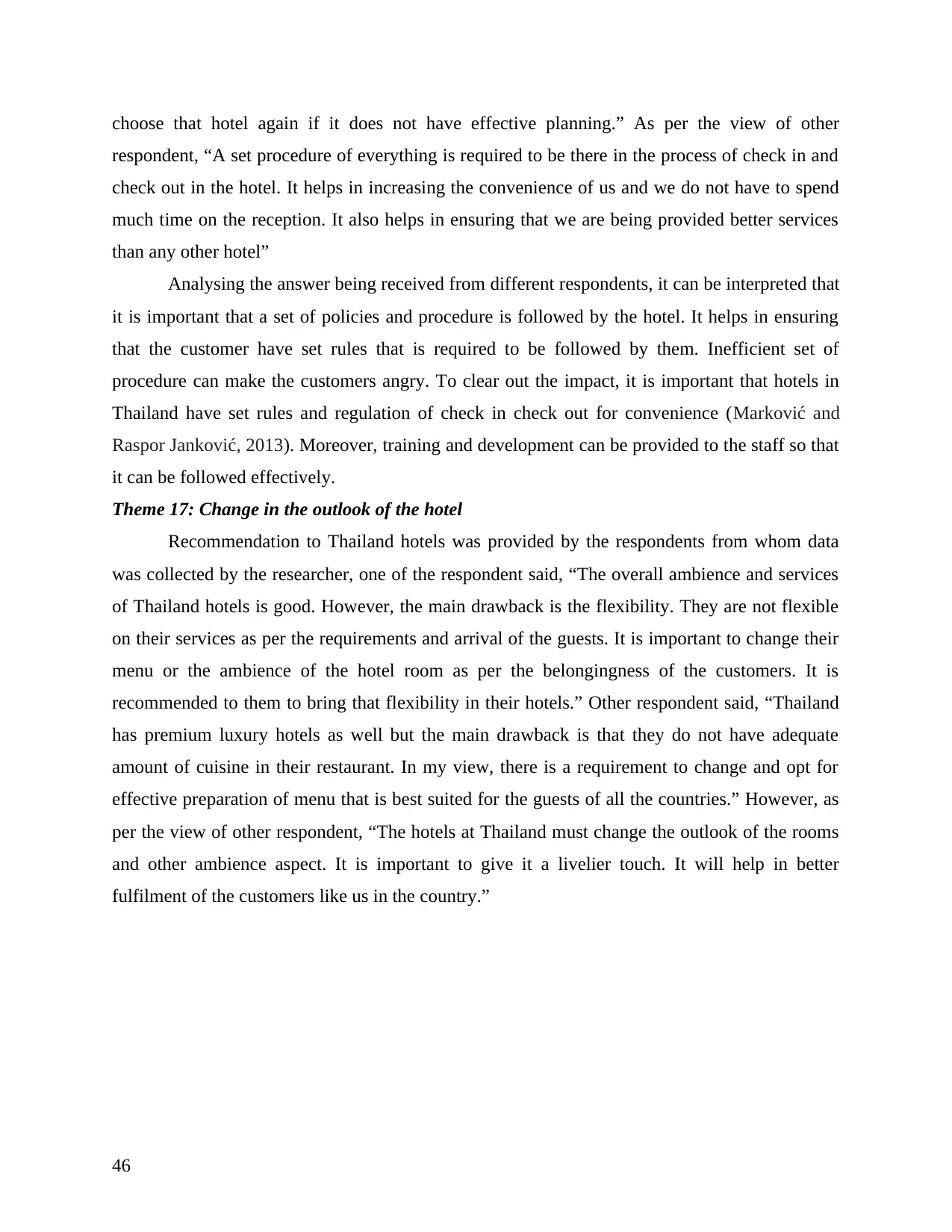
choose that hotel again if it does not have effective planning.” As per the view of other
respondent, “A set procedure of everything is required to be there in the process of check in and
check out in the hotel. It helps in increasing the convenience of us and we do not have to spend
much time on the reception. It also helps in ensuring that we are being provided better services
than any other hotel”
Analysing the answer being received from different respondents, it can be interpreted that
it is important that a set of policies and procedure is followed by the hotel. It helps in ensuring
that the customer have set rules that is required to be followed by them. Inefficient set of
procedure can make the customers angry. To clear out the impact, it is important that hotels in
Thailand have set rules and regulation of check in check out for convenience (Marković and
Raspor Janković, 2013). Moreover, training and development can be provided to the staff so that
it can be followed effectively.
Theme 17: Change in the outlook of the hotel
Recommendation to Thailand hotels was provided by the respondents from whom data
was collected by the researcher, one of the respondent said, “The overall ambience and services
of Thailand hotels is good. However, the main drawback is the flexibility. They are not flexible
on their services as per the requirements and arrival of the guests. It is important to change their
menu or the ambience of the hotel room as per the belongingness of the customers. It is
recommended to them to bring that flexibility in their hotels.” Other respondent said, “Thailand
has premium luxury hotels as well but the main drawback is that they do not have adequate
amount of cuisine in their restaurant. In my view, there is a requirement to change and opt for
effective preparation of menu that is best suited for the guests of all the countries.” However, as
per the view of other respondent, “The hotels at Thailand must change the outlook of the rooms
and other ambience aspect. It is important to give it a livelier touch. It will help in better
fulfilment of the customers like us in the country.”
46
respondent, “A set procedure of everything is required to be there in the process of check in and
check out in the hotel. It helps in increasing the convenience of us and we do not have to spend
much time on the reception. It also helps in ensuring that we are being provided better services
than any other hotel”
Analysing the answer being received from different respondents, it can be interpreted that
it is important that a set of policies and procedure is followed by the hotel. It helps in ensuring
that the customer have set rules that is required to be followed by them. Inefficient set of
procedure can make the customers angry. To clear out the impact, it is important that hotels in
Thailand have set rules and regulation of check in check out for convenience (Marković and
Raspor Janković, 2013). Moreover, training and development can be provided to the staff so that
it can be followed effectively.
Theme 17: Change in the outlook of the hotel
Recommendation to Thailand hotels was provided by the respondents from whom data
was collected by the researcher, one of the respondent said, “The overall ambience and services
of Thailand hotels is good. However, the main drawback is the flexibility. They are not flexible
on their services as per the requirements and arrival of the guests. It is important to change their
menu or the ambience of the hotel room as per the belongingness of the customers. It is
recommended to them to bring that flexibility in their hotels.” Other respondent said, “Thailand
has premium luxury hotels as well but the main drawback is that they do not have adequate
amount of cuisine in their restaurant. In my view, there is a requirement to change and opt for
effective preparation of menu that is best suited for the guests of all the countries.” However, as
per the view of other respondent, “The hotels at Thailand must change the outlook of the rooms
and other ambience aspect. It is important to give it a livelier touch. It will help in better
fulfilment of the customers like us in the country.”
46
Secure Best Marks with AI Grader
Need help grading? Try our AI Grader for instant feedback on your assignments.
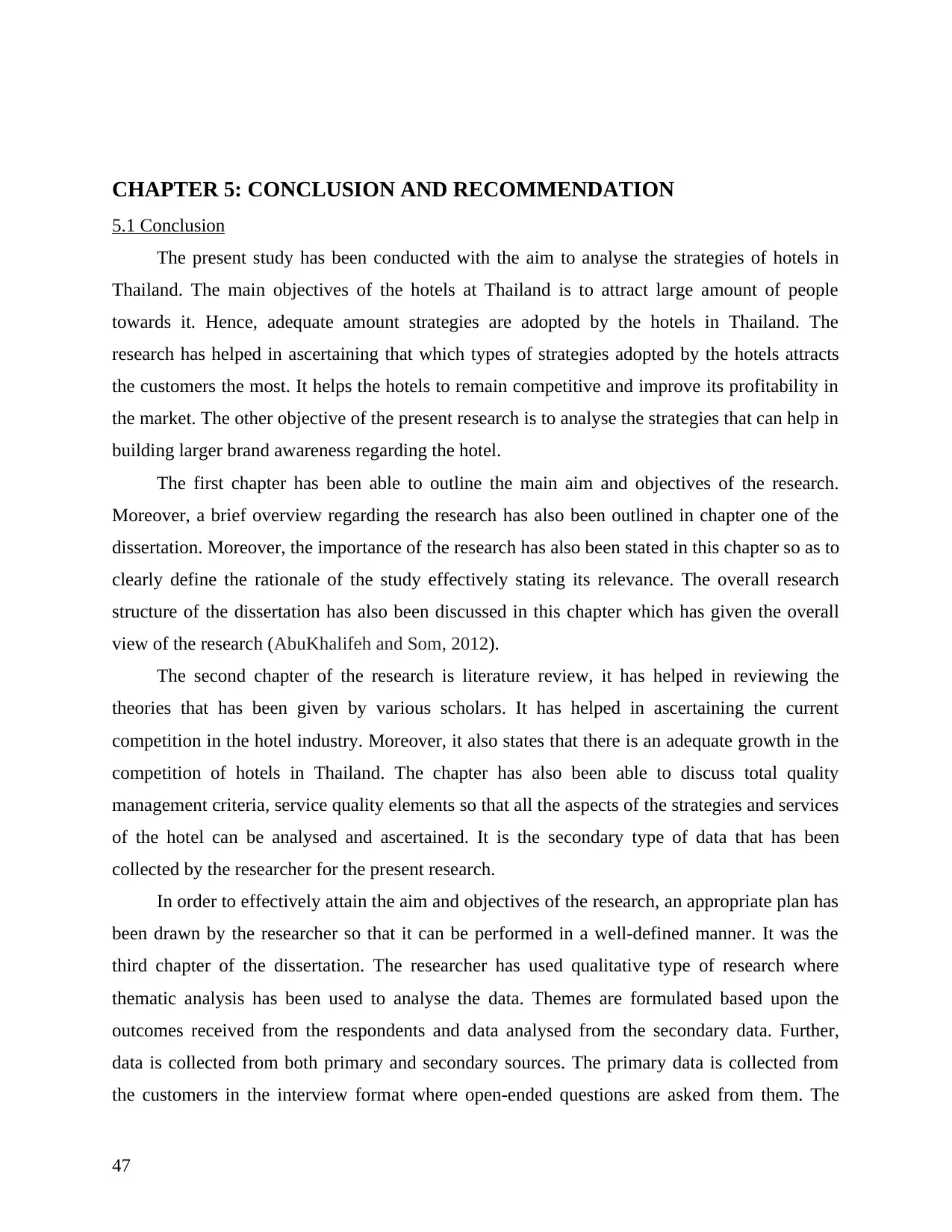
CHAPTER 5: CONCLUSION AND RECOMMENDATION
5.1 Conclusion
The present study has been conducted with the aim to analyse the strategies of hotels in
Thailand. The main objectives of the hotels at Thailand is to attract large amount of people
towards it. Hence, adequate amount strategies are adopted by the hotels in Thailand. The
research has helped in ascertaining that which types of strategies adopted by the hotels attracts
the customers the most. It helps the hotels to remain competitive and improve its profitability in
the market. The other objective of the present research is to analyse the strategies that can help in
building larger brand awareness regarding the hotel.
The first chapter has been able to outline the main aim and objectives of the research.
Moreover, a brief overview regarding the research has also been outlined in chapter one of the
dissertation. Moreover, the importance of the research has also been stated in this chapter so as to
clearly define the rationale of the study effectively stating its relevance. The overall research
structure of the dissertation has also been discussed in this chapter which has given the overall
view of the research (AbuKhalifeh and Som, 2012).
The second chapter of the research is literature review, it has helped in reviewing the
theories that has been given by various scholars. It has helped in ascertaining the current
competition in the hotel industry. Moreover, it also states that there is an adequate growth in the
competition of hotels in Thailand. The chapter has also been able to discuss total quality
management criteria, service quality elements so that all the aspects of the strategies and services
of the hotel can be analysed and ascertained. It is the secondary type of data that has been
collected by the researcher for the present research.
In order to effectively attain the aim and objectives of the research, an appropriate plan has
been drawn by the researcher so that it can be performed in a well-defined manner. It was the
third chapter of the dissertation. The researcher has used qualitative type of research where
thematic analysis has been used to analyse the data. Themes are formulated based upon the
outcomes received from the respondents and data analysed from the secondary data. Further,
data is collected from both primary and secondary sources. The primary data is collected from
the customers in the interview format where open-ended questions are asked from them. The
47
5.1 Conclusion
The present study has been conducted with the aim to analyse the strategies of hotels in
Thailand. The main objectives of the hotels at Thailand is to attract large amount of people
towards it. Hence, adequate amount strategies are adopted by the hotels in Thailand. The
research has helped in ascertaining that which types of strategies adopted by the hotels attracts
the customers the most. It helps the hotels to remain competitive and improve its profitability in
the market. The other objective of the present research is to analyse the strategies that can help in
building larger brand awareness regarding the hotel.
The first chapter has been able to outline the main aim and objectives of the research.
Moreover, a brief overview regarding the research has also been outlined in chapter one of the
dissertation. Moreover, the importance of the research has also been stated in this chapter so as to
clearly define the rationale of the study effectively stating its relevance. The overall research
structure of the dissertation has also been discussed in this chapter which has given the overall
view of the research (AbuKhalifeh and Som, 2012).
The second chapter of the research is literature review, it has helped in reviewing the
theories that has been given by various scholars. It has helped in ascertaining the current
competition in the hotel industry. Moreover, it also states that there is an adequate growth in the
competition of hotels in Thailand. The chapter has also been able to discuss total quality
management criteria, service quality elements so that all the aspects of the strategies and services
of the hotel can be analysed and ascertained. It is the secondary type of data that has been
collected by the researcher for the present research.
In order to effectively attain the aim and objectives of the research, an appropriate plan has
been drawn by the researcher so that it can be performed in a well-defined manner. It was the
third chapter of the dissertation. The researcher has used qualitative type of research where
thematic analysis has been used to analyse the data. Themes are formulated based upon the
outcomes received from the respondents and data analysed from the secondary data. Further,
data is collected from both primary and secondary sources. The primary data is collected from
the customers in the interview format where open-ended questions are asked from them. The
47
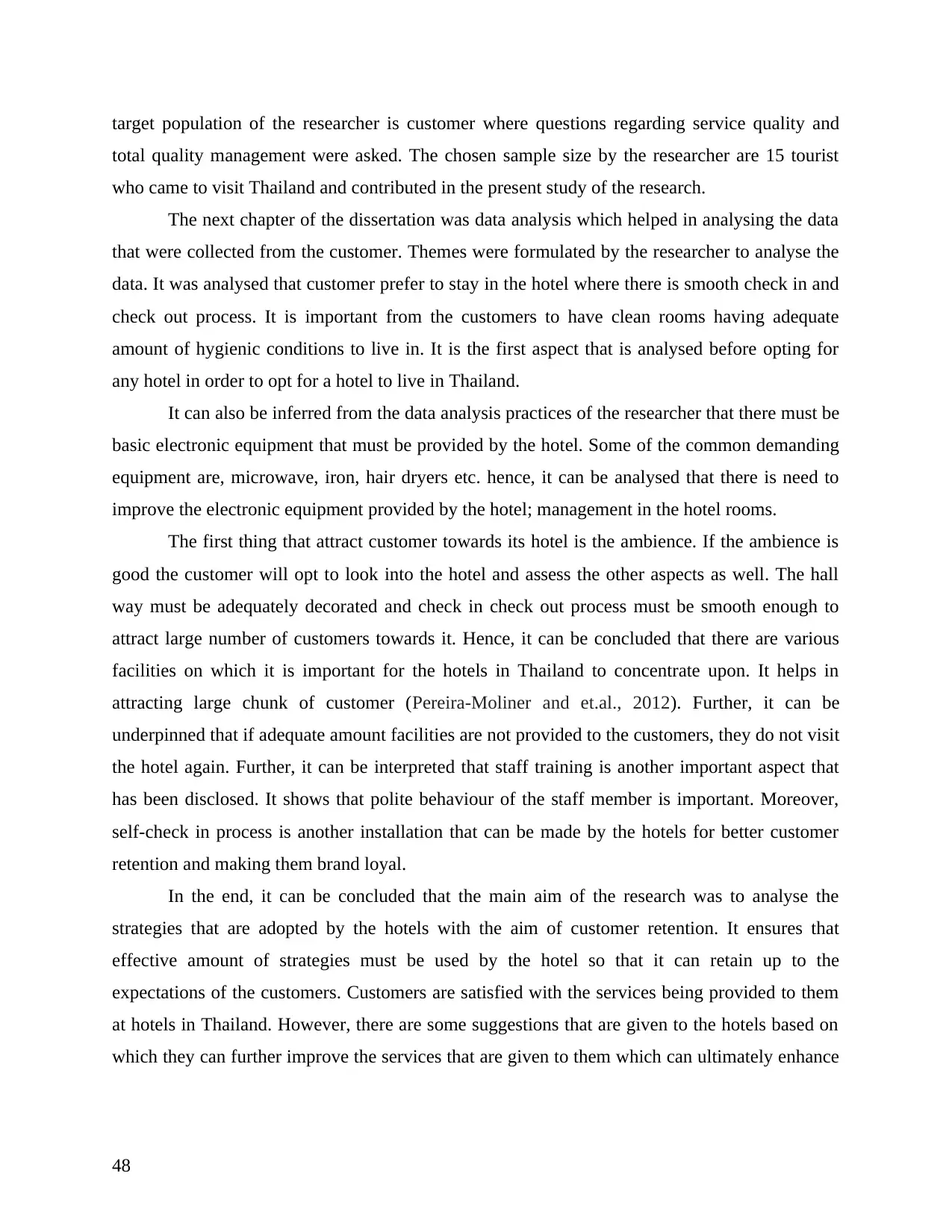
target population of the researcher is customer where questions regarding service quality and
total quality management were asked. The chosen sample size by the researcher are 15 tourist
who came to visit Thailand and contributed in the present study of the research.
The next chapter of the dissertation was data analysis which helped in analysing the data
that were collected from the customer. Themes were formulated by the researcher to analyse the
data. It was analysed that customer prefer to stay in the hotel where there is smooth check in and
check out process. It is important from the customers to have clean rooms having adequate
amount of hygienic conditions to live in. It is the first aspect that is analysed before opting for
any hotel in order to opt for a hotel to live in Thailand.
It can also be inferred from the data analysis practices of the researcher that there must be
basic electronic equipment that must be provided by the hotel. Some of the common demanding
equipment are, microwave, iron, hair dryers etc. hence, it can be analysed that there is need to
improve the electronic equipment provided by the hotel; management in the hotel rooms.
The first thing that attract customer towards its hotel is the ambience. If the ambience is
good the customer will opt to look into the hotel and assess the other aspects as well. The hall
way must be adequately decorated and check in check out process must be smooth enough to
attract large number of customers towards it. Hence, it can be concluded that there are various
facilities on which it is important for the hotels in Thailand to concentrate upon. It helps in
attracting large chunk of customer (Pereira-Moliner and et.al., 2012). Further, it can be
underpinned that if adequate amount facilities are not provided to the customers, they do not visit
the hotel again. Further, it can be interpreted that staff training is another important aspect that
has been disclosed. It shows that polite behaviour of the staff member is important. Moreover,
self-check in process is another installation that can be made by the hotels for better customer
retention and making them brand loyal.
In the end, it can be concluded that the main aim of the research was to analyse the
strategies that are adopted by the hotels with the aim of customer retention. It ensures that
effective amount of strategies must be used by the hotel so that it can retain up to the
expectations of the customers. Customers are satisfied with the services being provided to them
at hotels in Thailand. However, there are some suggestions that are given to the hotels based on
which they can further improve the services that are given to them which can ultimately enhance
48
total quality management were asked. The chosen sample size by the researcher are 15 tourist
who came to visit Thailand and contributed in the present study of the research.
The next chapter of the dissertation was data analysis which helped in analysing the data
that were collected from the customer. Themes were formulated by the researcher to analyse the
data. It was analysed that customer prefer to stay in the hotel where there is smooth check in and
check out process. It is important from the customers to have clean rooms having adequate
amount of hygienic conditions to live in. It is the first aspect that is analysed before opting for
any hotel in order to opt for a hotel to live in Thailand.
It can also be inferred from the data analysis practices of the researcher that there must be
basic electronic equipment that must be provided by the hotel. Some of the common demanding
equipment are, microwave, iron, hair dryers etc. hence, it can be analysed that there is need to
improve the electronic equipment provided by the hotel; management in the hotel rooms.
The first thing that attract customer towards its hotel is the ambience. If the ambience is
good the customer will opt to look into the hotel and assess the other aspects as well. The hall
way must be adequately decorated and check in check out process must be smooth enough to
attract large number of customers towards it. Hence, it can be concluded that there are various
facilities on which it is important for the hotels in Thailand to concentrate upon. It helps in
attracting large chunk of customer (Pereira-Moliner and et.al., 2012). Further, it can be
underpinned that if adequate amount facilities are not provided to the customers, they do not visit
the hotel again. Further, it can be interpreted that staff training is another important aspect that
has been disclosed. It shows that polite behaviour of the staff member is important. Moreover,
self-check in process is another installation that can be made by the hotels for better customer
retention and making them brand loyal.
In the end, it can be concluded that the main aim of the research was to analyse the
strategies that are adopted by the hotels with the aim of customer retention. It ensures that
effective amount of strategies must be used by the hotel so that it can retain up to the
expectations of the customers. Customers are satisfied with the services being provided to them
at hotels in Thailand. However, there are some suggestions that are given to the hotels based on
which they can further improve the services that are given to them which can ultimately enhance
48
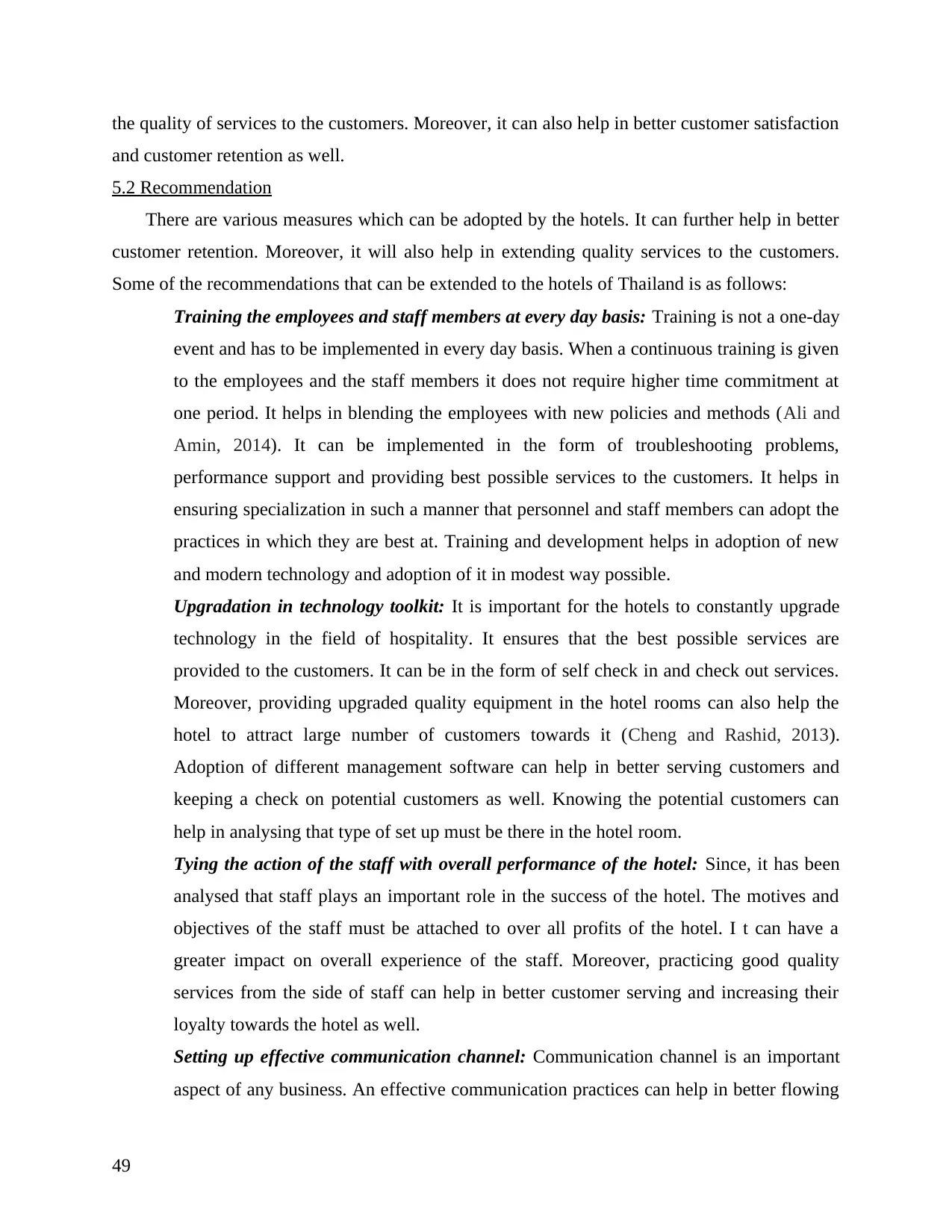
the quality of services to the customers. Moreover, it can also help in better customer satisfaction
and customer retention as well.
5.2 Recommendation
There are various measures which can be adopted by the hotels. It can further help in better
customer retention. Moreover, it will also help in extending quality services to the customers.
Some of the recommendations that can be extended to the hotels of Thailand is as follows:
Training the employees and staff members at every day basis: Training is not a one-day
event and has to be implemented in every day basis. When a continuous training is given
to the employees and the staff members it does not require higher time commitment at
one period. It helps in blending the employees with new policies and methods (Ali and
Amin, 2014). It can be implemented in the form of troubleshooting problems,
performance support and providing best possible services to the customers. It helps in
ensuring specialization in such a manner that personnel and staff members can adopt the
practices in which they are best at. Training and development helps in adoption of new
and modern technology and adoption of it in modest way possible.
Upgradation in technology toolkit: It is important for the hotels to constantly upgrade
technology in the field of hospitality. It ensures that the best possible services are
provided to the customers. It can be in the form of self check in and check out services.
Moreover, providing upgraded quality equipment in the hotel rooms can also help the
hotel to attract large number of customers towards it (Cheng and Rashid, 2013).
Adoption of different management software can help in better serving customers and
keeping a check on potential customers as well. Knowing the potential customers can
help in analysing that type of set up must be there in the hotel room.
Tying the action of the staff with overall performance of the hotel: Since, it has been
analysed that staff plays an important role in the success of the hotel. The motives and
objectives of the staff must be attached to over all profits of the hotel. I t can have a
greater impact on overall experience of the staff. Moreover, practicing good quality
services from the side of staff can help in better customer serving and increasing their
loyalty towards the hotel as well.
Setting up effective communication channel: Communication channel is an important
aspect of any business. An effective communication practices can help in better flowing
49
and customer retention as well.
5.2 Recommendation
There are various measures which can be adopted by the hotels. It can further help in better
customer retention. Moreover, it will also help in extending quality services to the customers.
Some of the recommendations that can be extended to the hotels of Thailand is as follows:
Training the employees and staff members at every day basis: Training is not a one-day
event and has to be implemented in every day basis. When a continuous training is given
to the employees and the staff members it does not require higher time commitment at
one period. It helps in blending the employees with new policies and methods (Ali and
Amin, 2014). It can be implemented in the form of troubleshooting problems,
performance support and providing best possible services to the customers. It helps in
ensuring specialization in such a manner that personnel and staff members can adopt the
practices in which they are best at. Training and development helps in adoption of new
and modern technology and adoption of it in modest way possible.
Upgradation in technology toolkit: It is important for the hotels to constantly upgrade
technology in the field of hospitality. It ensures that the best possible services are
provided to the customers. It can be in the form of self check in and check out services.
Moreover, providing upgraded quality equipment in the hotel rooms can also help the
hotel to attract large number of customers towards it (Cheng and Rashid, 2013).
Adoption of different management software can help in better serving customers and
keeping a check on potential customers as well. Knowing the potential customers can
help in analysing that type of set up must be there in the hotel room.
Tying the action of the staff with overall performance of the hotel: Since, it has been
analysed that staff plays an important role in the success of the hotel. The motives and
objectives of the staff must be attached to over all profits of the hotel. I t can have a
greater impact on overall experience of the staff. Moreover, practicing good quality
services from the side of staff can help in better customer serving and increasing their
loyalty towards the hotel as well.
Setting up effective communication channel: Communication channel is an important
aspect of any business. An effective communication practices can help in better flowing
49
Paraphrase This Document
Need a fresh take? Get an instant paraphrase of this document with our AI Paraphraser
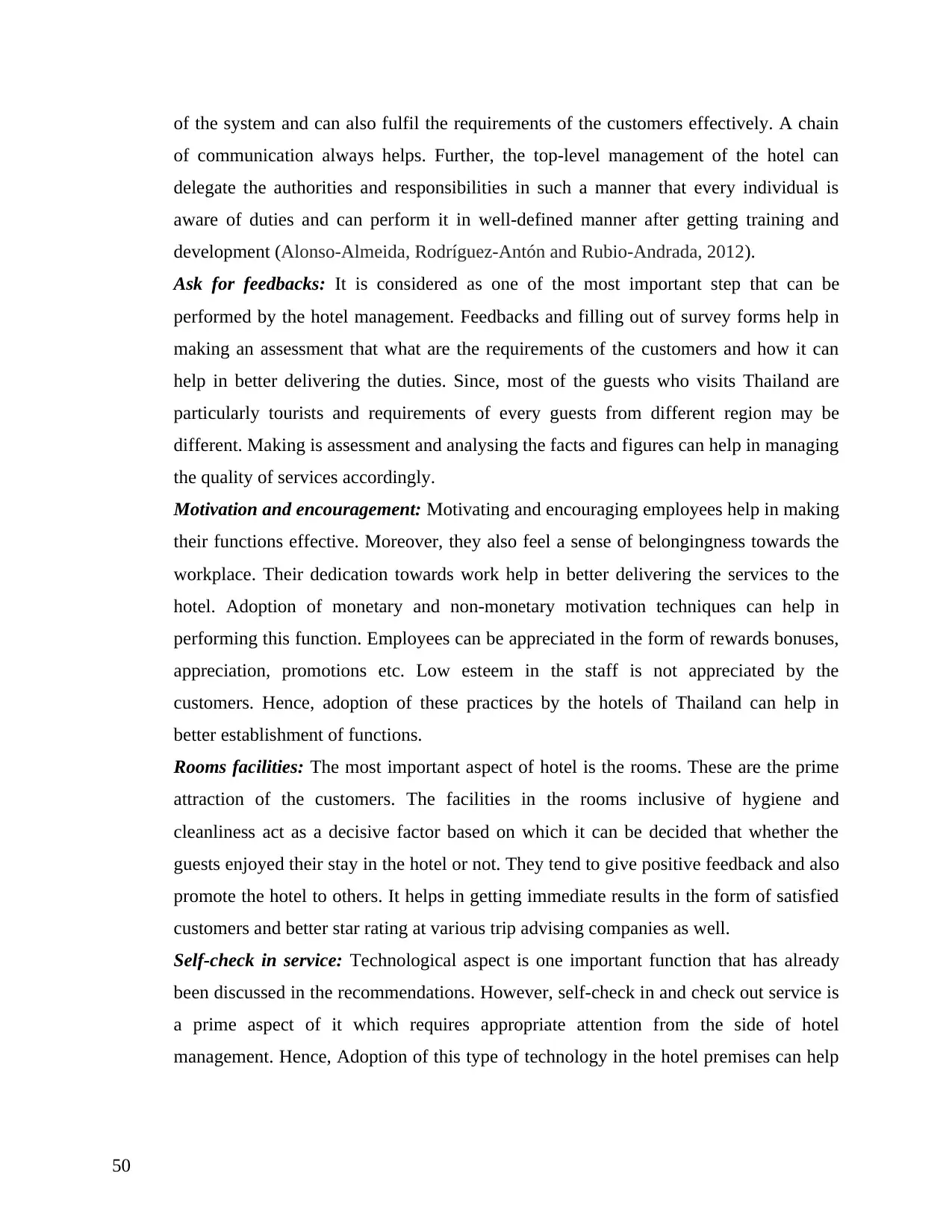
of the system and can also fulfil the requirements of the customers effectively. A chain
of communication always helps. Further, the top-level management of the hotel can
delegate the authorities and responsibilities in such a manner that every individual is
aware of duties and can perform it in well-defined manner after getting training and
development (Alonso-Almeida, Rodríguez-Antón and Rubio-Andrada, 2012).
Ask for feedbacks: It is considered as one of the most important step that can be
performed by the hotel management. Feedbacks and filling out of survey forms help in
making an assessment that what are the requirements of the customers and how it can
help in better delivering the duties. Since, most of the guests who visits Thailand are
particularly tourists and requirements of every guests from different region may be
different. Making is assessment and analysing the facts and figures can help in managing
the quality of services accordingly.
Motivation and encouragement: Motivating and encouraging employees help in making
their functions effective. Moreover, they also feel a sense of belongingness towards the
workplace. Their dedication towards work help in better delivering the services to the
hotel. Adoption of monetary and non-monetary motivation techniques can help in
performing this function. Employees can be appreciated in the form of rewards bonuses,
appreciation, promotions etc. Low esteem in the staff is not appreciated by the
customers. Hence, adoption of these practices by the hotels of Thailand can help in
better establishment of functions.
Rooms facilities: The most important aspect of hotel is the rooms. These are the prime
attraction of the customers. The facilities in the rooms inclusive of hygiene and
cleanliness act as a decisive factor based on which it can be decided that whether the
guests enjoyed their stay in the hotel or not. They tend to give positive feedback and also
promote the hotel to others. It helps in getting immediate results in the form of satisfied
customers and better star rating at various trip advising companies as well.
Self-check in service: Technological aspect is one important function that has already
been discussed in the recommendations. However, self-check in and check out service is
a prime aspect of it which requires appropriate attention from the side of hotel
management. Hence, Adoption of this type of technology in the hotel premises can help
50
of communication always helps. Further, the top-level management of the hotel can
delegate the authorities and responsibilities in such a manner that every individual is
aware of duties and can perform it in well-defined manner after getting training and
development (Alonso-Almeida, Rodríguez-Antón and Rubio-Andrada, 2012).
Ask for feedbacks: It is considered as one of the most important step that can be
performed by the hotel management. Feedbacks and filling out of survey forms help in
making an assessment that what are the requirements of the customers and how it can
help in better delivering the duties. Since, most of the guests who visits Thailand are
particularly tourists and requirements of every guests from different region may be
different. Making is assessment and analysing the facts and figures can help in managing
the quality of services accordingly.
Motivation and encouragement: Motivating and encouraging employees help in making
their functions effective. Moreover, they also feel a sense of belongingness towards the
workplace. Their dedication towards work help in better delivering the services to the
hotel. Adoption of monetary and non-monetary motivation techniques can help in
performing this function. Employees can be appreciated in the form of rewards bonuses,
appreciation, promotions etc. Low esteem in the staff is not appreciated by the
customers. Hence, adoption of these practices by the hotels of Thailand can help in
better establishment of functions.
Rooms facilities: The most important aspect of hotel is the rooms. These are the prime
attraction of the customers. The facilities in the rooms inclusive of hygiene and
cleanliness act as a decisive factor based on which it can be decided that whether the
guests enjoyed their stay in the hotel or not. They tend to give positive feedback and also
promote the hotel to others. It helps in getting immediate results in the form of satisfied
customers and better star rating at various trip advising companies as well.
Self-check in service: Technological aspect is one important function that has already
been discussed in the recommendations. However, self-check in and check out service is
a prime aspect of it which requires appropriate attention from the side of hotel
management. Hence, Adoption of this type of technology in the hotel premises can help
50
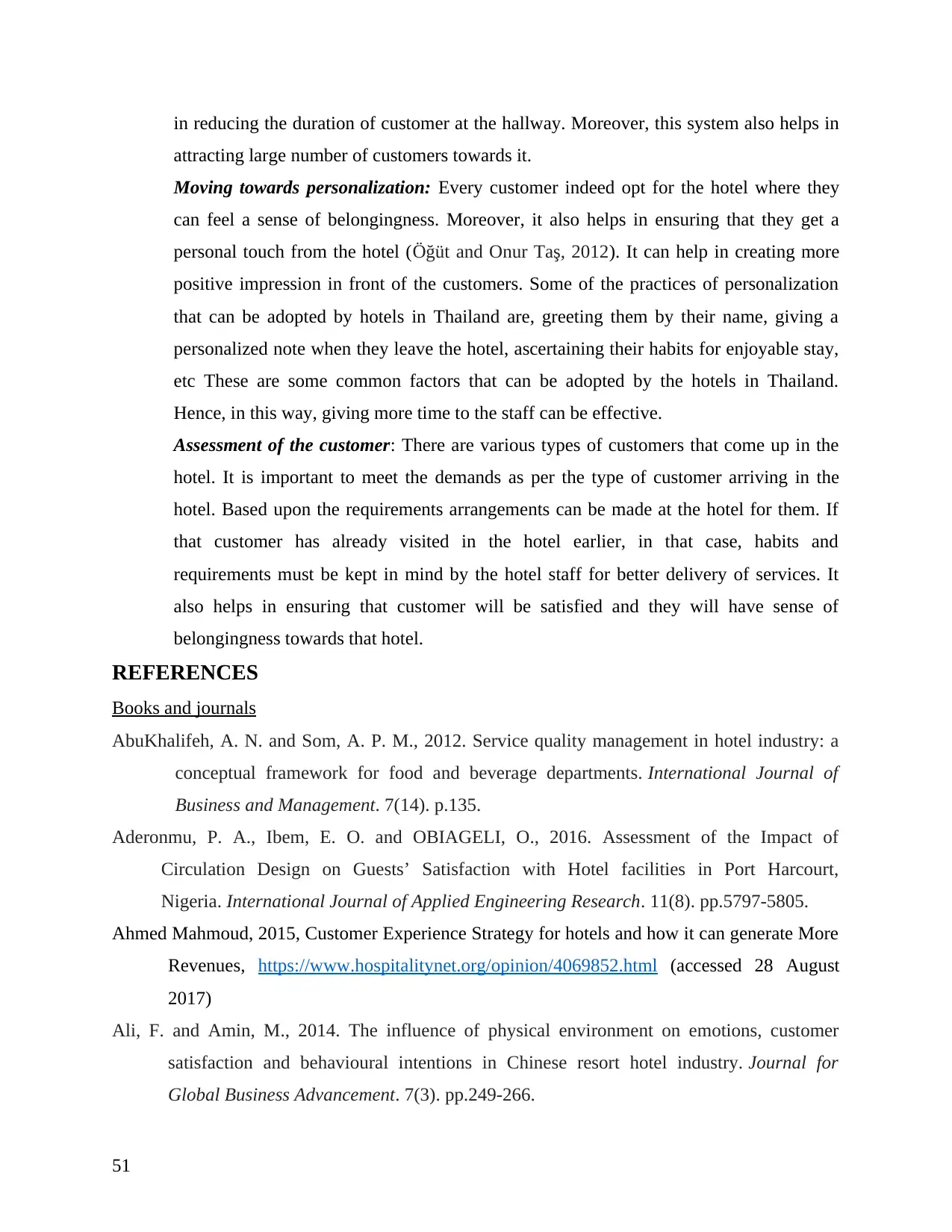
in reducing the duration of customer at the hallway. Moreover, this system also helps in
attracting large number of customers towards it.
Moving towards personalization: Every customer indeed opt for the hotel where they
can feel a sense of belongingness. Moreover, it also helps in ensuring that they get a
personal touch from the hotel (Öğüt and Onur Taş, 2012). It can help in creating more
positive impression in front of the customers. Some of the practices of personalization
that can be adopted by hotels in Thailand are, greeting them by their name, giving a
personalized note when they leave the hotel, ascertaining their habits for enjoyable stay,
etc These are some common factors that can be adopted by the hotels in Thailand.
Hence, in this way, giving more time to the staff can be effective.
Assessment of the customer: There are various types of customers that come up in the
hotel. It is important to meet the demands as per the type of customer arriving in the
hotel. Based upon the requirements arrangements can be made at the hotel for them. If
that customer has already visited in the hotel earlier, in that case, habits and
requirements must be kept in mind by the hotel staff for better delivery of services. It
also helps in ensuring that customer will be satisfied and they will have sense of
belongingness towards that hotel.
REFERENCES
Books and journals
AbuKhalifeh, A. N. and Som, A. P. M., 2012. Service quality management in hotel industry: a
conceptual framework for food and beverage departments. International Journal of
Business and Management. 7(14). p.135.
Aderonmu, P. A., Ibem, E. O. and OBIAGELI, O., 2016. Assessment of the Impact of
Circulation Design on Guests’ Satisfaction with Hotel facilities in Port Harcourt,
Nigeria. International Journal of Applied Engineering Research. 11(8). pp.5797-5805.
Ahmed Mahmoud, 2015, Customer Experience Strategy for hotels and how it can generate More
Revenues, https://www.hospitalitynet.org/opinion/4069852.html (accessed 28 August
2017)
Ali, F. and Amin, M., 2014. The influence of physical environment on emotions, customer
satisfaction and behavioural intentions in Chinese resort hotel industry. Journal for
Global Business Advancement. 7(3). pp.249-266.
51
attracting large number of customers towards it.
Moving towards personalization: Every customer indeed opt for the hotel where they
can feel a sense of belongingness. Moreover, it also helps in ensuring that they get a
personal touch from the hotel (Öğüt and Onur Taş, 2012). It can help in creating more
positive impression in front of the customers. Some of the practices of personalization
that can be adopted by hotels in Thailand are, greeting them by their name, giving a
personalized note when they leave the hotel, ascertaining their habits for enjoyable stay,
etc These are some common factors that can be adopted by the hotels in Thailand.
Hence, in this way, giving more time to the staff can be effective.
Assessment of the customer: There are various types of customers that come up in the
hotel. It is important to meet the demands as per the type of customer arriving in the
hotel. Based upon the requirements arrangements can be made at the hotel for them. If
that customer has already visited in the hotel earlier, in that case, habits and
requirements must be kept in mind by the hotel staff for better delivery of services. It
also helps in ensuring that customer will be satisfied and they will have sense of
belongingness towards that hotel.
REFERENCES
Books and journals
AbuKhalifeh, A. N. and Som, A. P. M., 2012. Service quality management in hotel industry: a
conceptual framework for food and beverage departments. International Journal of
Business and Management. 7(14). p.135.
Aderonmu, P. A., Ibem, E. O. and OBIAGELI, O., 2016. Assessment of the Impact of
Circulation Design on Guests’ Satisfaction with Hotel facilities in Port Harcourt,
Nigeria. International Journal of Applied Engineering Research. 11(8). pp.5797-5805.
Ahmed Mahmoud, 2015, Customer Experience Strategy for hotels and how it can generate More
Revenues, https://www.hospitalitynet.org/opinion/4069852.html (accessed 28 August
2017)
Ali, F. and Amin, M., 2014. The influence of physical environment on emotions, customer
satisfaction and behavioural intentions in Chinese resort hotel industry. Journal for
Global Business Advancement. 7(3). pp.249-266.
51
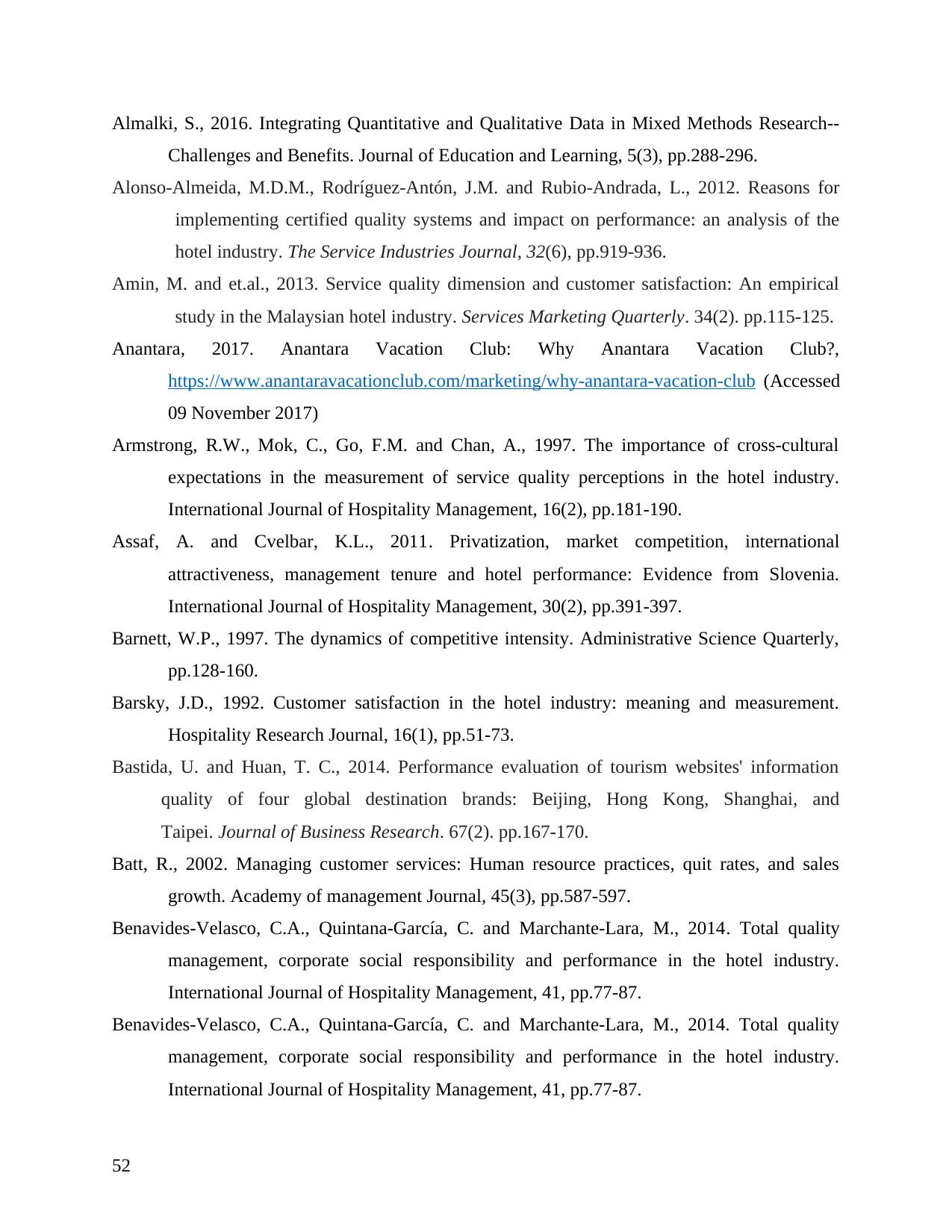
Almalki, S., 2016. Integrating Quantitative and Qualitative Data in Mixed Methods Research--
Challenges and Benefits. Journal of Education and Learning, 5(3), pp.288-296.
Alonso-Almeida, M.D.M., Rodríguez-Antón, J.M. and Rubio-Andrada, L., 2012. Reasons for
implementing certified quality systems and impact on performance: an analysis of the
hotel industry. The Service Industries Journal, 32(6), pp.919-936.
Amin, M. and et.al., 2013. Service quality dimension and customer satisfaction: An empirical
study in the Malaysian hotel industry. Services Marketing Quarterly. 34(2). pp.115-125.
Anantara, 2017. Anantara Vacation Club: Why Anantara Vacation Club?,
https://www.anantaravacationclub.com/marketing/why-anantara-vacation-club (Accessed
09 November 2017)
Armstrong, R.W., Mok, C., Go, F.M. and Chan, A., 1997. The importance of cross-cultural
expectations in the measurement of service quality perceptions in the hotel industry.
International Journal of Hospitality Management, 16(2), pp.181-190.
Assaf, A. and Cvelbar, K.L., 2011. Privatization, market competition, international
attractiveness, management tenure and hotel performance: Evidence from Slovenia.
International Journal of Hospitality Management, 30(2), pp.391-397.
Barnett, W.P., 1997. The dynamics of competitive intensity. Administrative Science Quarterly,
pp.128-160.
Barsky, J.D., 1992. Customer satisfaction in the hotel industry: meaning and measurement.
Hospitality Research Journal, 16(1), pp.51-73.
Bastida, U. and Huan, T. C., 2014. Performance evaluation of tourism websites' information
quality of four global destination brands: Beijing, Hong Kong, Shanghai, and
Taipei. Journal of Business Research. 67(2). pp.167-170.
Batt, R., 2002. Managing customer services: Human resource practices, quit rates, and sales
growth. Academy of management Journal, 45(3), pp.587-597.
Benavides-Velasco, C.A., Quintana-García, C. and Marchante-Lara, M., 2014. Total quality
management, corporate social responsibility and performance in the hotel industry.
International Journal of Hospitality Management, 41, pp.77-87.
Benavides-Velasco, C.A., Quintana-García, C. and Marchante-Lara, M., 2014. Total quality
management, corporate social responsibility and performance in the hotel industry.
International Journal of Hospitality Management, 41, pp.77-87.
52
Challenges and Benefits. Journal of Education and Learning, 5(3), pp.288-296.
Alonso-Almeida, M.D.M., Rodríguez-Antón, J.M. and Rubio-Andrada, L., 2012. Reasons for
implementing certified quality systems and impact on performance: an analysis of the
hotel industry. The Service Industries Journal, 32(6), pp.919-936.
Amin, M. and et.al., 2013. Service quality dimension and customer satisfaction: An empirical
study in the Malaysian hotel industry. Services Marketing Quarterly. 34(2). pp.115-125.
Anantara, 2017. Anantara Vacation Club: Why Anantara Vacation Club?,
https://www.anantaravacationclub.com/marketing/why-anantara-vacation-club (Accessed
09 November 2017)
Armstrong, R.W., Mok, C., Go, F.M. and Chan, A., 1997. The importance of cross-cultural
expectations in the measurement of service quality perceptions in the hotel industry.
International Journal of Hospitality Management, 16(2), pp.181-190.
Assaf, A. and Cvelbar, K.L., 2011. Privatization, market competition, international
attractiveness, management tenure and hotel performance: Evidence from Slovenia.
International Journal of Hospitality Management, 30(2), pp.391-397.
Barnett, W.P., 1997. The dynamics of competitive intensity. Administrative Science Quarterly,
pp.128-160.
Barsky, J.D., 1992. Customer satisfaction in the hotel industry: meaning and measurement.
Hospitality Research Journal, 16(1), pp.51-73.
Bastida, U. and Huan, T. C., 2014. Performance evaluation of tourism websites' information
quality of four global destination brands: Beijing, Hong Kong, Shanghai, and
Taipei. Journal of Business Research. 67(2). pp.167-170.
Batt, R., 2002. Managing customer services: Human resource practices, quit rates, and sales
growth. Academy of management Journal, 45(3), pp.587-597.
Benavides-Velasco, C.A., Quintana-García, C. and Marchante-Lara, M., 2014. Total quality
management, corporate social responsibility and performance in the hotel industry.
International Journal of Hospitality Management, 41, pp.77-87.
Benavides-Velasco, C.A., Quintana-García, C. and Marchante-Lara, M., 2014. Total quality
management, corporate social responsibility and performance in the hotel industry.
International Journal of Hospitality Management, 41, pp.77-87.
52
Secure Best Marks with AI Grader
Need help grading? Try our AI Grader for instant feedback on your assignments.
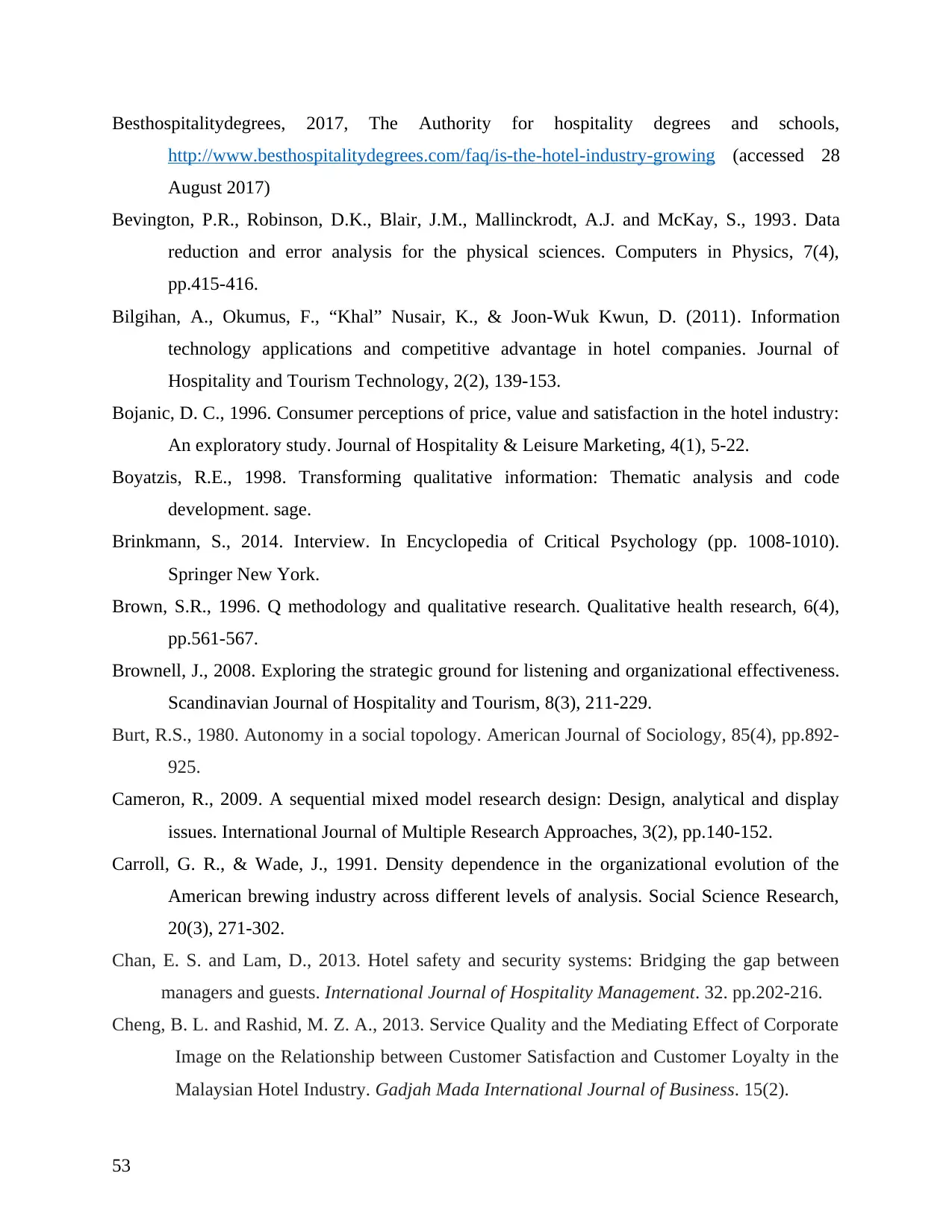
Besthospitalitydegrees, 2017, The Authority for hospitality degrees and schools,
http://www.besthospitalitydegrees.com/faq/is-the-hotel-industry-growing (accessed 28
August 2017)
Bevington, P.R., Robinson, D.K., Blair, J.M., Mallinckrodt, A.J. and McKay, S., 1993. Data
reduction and error analysis for the physical sciences. Computers in Physics, 7(4),
pp.415-416.
Bilgihan, A., Okumus, F., “Khal” Nusair, K., & Joon-Wuk Kwun, D. (2011). Information
technology applications and competitive advantage in hotel companies. Journal of
Hospitality and Tourism Technology, 2(2), 139-153.
Bojanic, D. C., 1996. Consumer perceptions of price, value and satisfaction in the hotel industry:
An exploratory study. Journal of Hospitality & Leisure Marketing, 4(1), 5-22.
Boyatzis, R.E., 1998. Transforming qualitative information: Thematic analysis and code
development. sage.
Brinkmann, S., 2014. Interview. In Encyclopedia of Critical Psychology (pp. 1008-1010).
Springer New York.
Brown, S.R., 1996. Q methodology and qualitative research. Qualitative health research, 6(4),
pp.561-567.
Brownell, J., 2008. Exploring the strategic ground for listening and organizational effectiveness.
Scandinavian Journal of Hospitality and Tourism, 8(3), 211-229.
Burt, R.S., 1980. Autonomy in a social topology. American Journal of Sociology, 85(4), pp.892-
925.
Cameron, R., 2009. A sequential mixed model research design: Design, analytical and display
issues. International Journal of Multiple Research Approaches, 3(2), pp.140-152.
Carroll, G. R., & Wade, J., 1991. Density dependence in the organizational evolution of the
American brewing industry across different levels of analysis. Social Science Research,
20(3), 271-302.
Chan, E. S. and Lam, D., 2013. Hotel safety and security systems: Bridging the gap between
managers and guests. International Journal of Hospitality Management. 32. pp.202-216.
Cheng, B. L. and Rashid, M. Z. A., 2013. Service Quality and the Mediating Effect of Corporate
Image on the Relationship between Customer Satisfaction and Customer Loyalty in the
Malaysian Hotel Industry. Gadjah Mada International Journal of Business. 15(2).
53
http://www.besthospitalitydegrees.com/faq/is-the-hotel-industry-growing (accessed 28
August 2017)
Bevington, P.R., Robinson, D.K., Blair, J.M., Mallinckrodt, A.J. and McKay, S., 1993. Data
reduction and error analysis for the physical sciences. Computers in Physics, 7(4),
pp.415-416.
Bilgihan, A., Okumus, F., “Khal” Nusair, K., & Joon-Wuk Kwun, D. (2011). Information
technology applications and competitive advantage in hotel companies. Journal of
Hospitality and Tourism Technology, 2(2), 139-153.
Bojanic, D. C., 1996. Consumer perceptions of price, value and satisfaction in the hotel industry:
An exploratory study. Journal of Hospitality & Leisure Marketing, 4(1), 5-22.
Boyatzis, R.E., 1998. Transforming qualitative information: Thematic analysis and code
development. sage.
Brinkmann, S., 2014. Interview. In Encyclopedia of Critical Psychology (pp. 1008-1010).
Springer New York.
Brown, S.R., 1996. Q methodology and qualitative research. Qualitative health research, 6(4),
pp.561-567.
Brownell, J., 2008. Exploring the strategic ground for listening and organizational effectiveness.
Scandinavian Journal of Hospitality and Tourism, 8(3), 211-229.
Burt, R.S., 1980. Autonomy in a social topology. American Journal of Sociology, 85(4), pp.892-
925.
Cameron, R., 2009. A sequential mixed model research design: Design, analytical and display
issues. International Journal of Multiple Research Approaches, 3(2), pp.140-152.
Carroll, G. R., & Wade, J., 1991. Density dependence in the organizational evolution of the
American brewing industry across different levels of analysis. Social Science Research,
20(3), 271-302.
Chan, E. S. and Lam, D., 2013. Hotel safety and security systems: Bridging the gap between
managers and guests. International Journal of Hospitality Management. 32. pp.202-216.
Cheng, B. L. and Rashid, M. Z. A., 2013. Service Quality and the Mediating Effect of Corporate
Image on the Relationship between Customer Satisfaction and Customer Loyalty in the
Malaysian Hotel Industry. Gadjah Mada International Journal of Business. 15(2).
53
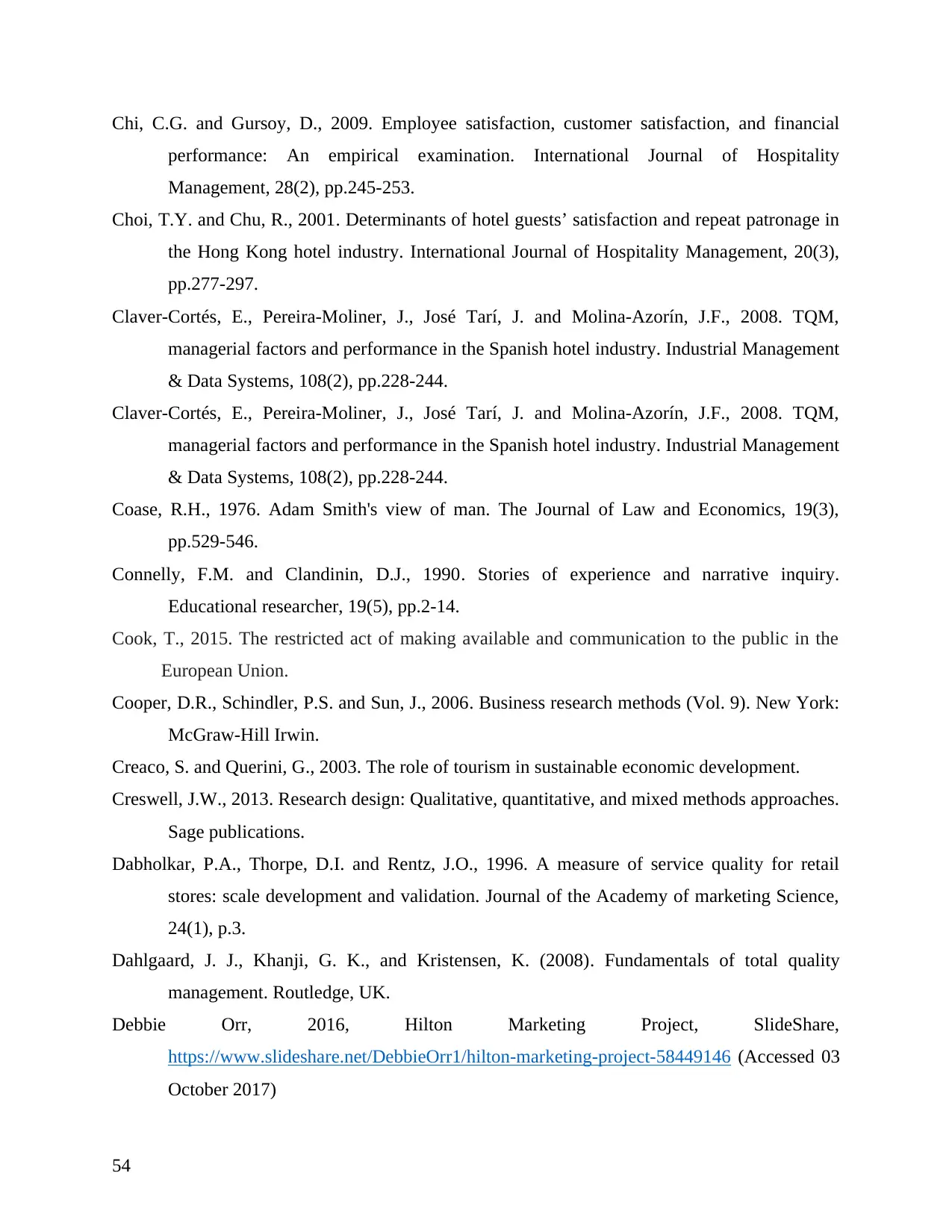
Chi, C.G. and Gursoy, D., 2009. Employee satisfaction, customer satisfaction, and financial
performance: An empirical examination. International Journal of Hospitality
Management, 28(2), pp.245-253.
Choi, T.Y. and Chu, R., 2001. Determinants of hotel guests’ satisfaction and repeat patronage in
the Hong Kong hotel industry. International Journal of Hospitality Management, 20(3),
pp.277-297.
Claver-Cortés, E., Pereira-Moliner, J., José Tarí, J. and Molina-Azorín, J.F., 2008. TQM,
managerial factors and performance in the Spanish hotel industry. Industrial Management
& Data Systems, 108(2), pp.228-244.
Claver-Cortés, E., Pereira-Moliner, J., José Tarí, J. and Molina-Azorín, J.F., 2008. TQM,
managerial factors and performance in the Spanish hotel industry. Industrial Management
& Data Systems, 108(2), pp.228-244.
Coase, R.H., 1976. Adam Smith's view of man. The Journal of Law and Economics, 19(3),
pp.529-546.
Connelly, F.M. and Clandinin, D.J., 1990. Stories of experience and narrative inquiry.
Educational researcher, 19(5), pp.2-14.
Cook, T., 2015. The restricted act of making available and communication to the public in the
European Union.
Cooper, D.R., Schindler, P.S. and Sun, J., 2006. Business research methods (Vol. 9). New York:
McGraw-Hill Irwin.
Creaco, S. and Querini, G., 2003. The role of tourism in sustainable economic development.
Creswell, J.W., 2013. Research design: Qualitative, quantitative, and mixed methods approaches.
Sage publications.
Dabholkar, P.A., Thorpe, D.I. and Rentz, J.O., 1996. A measure of service quality for retail
stores: scale development and validation. Journal of the Academy of marketing Science,
24(1), p.3.
Dahlgaard, J. J., Khanji, G. K., and Kristensen, K. (2008). Fundamentals of total quality
management. Routledge, UK.
Debbie Orr, 2016, Hilton Marketing Project, SlideShare,
https://www.slideshare.net/DebbieOrr1/hilton-marketing-project-58449146 (Accessed 03
October 2017)
54
performance: An empirical examination. International Journal of Hospitality
Management, 28(2), pp.245-253.
Choi, T.Y. and Chu, R., 2001. Determinants of hotel guests’ satisfaction and repeat patronage in
the Hong Kong hotel industry. International Journal of Hospitality Management, 20(3),
pp.277-297.
Claver-Cortés, E., Pereira-Moliner, J., José Tarí, J. and Molina-Azorín, J.F., 2008. TQM,
managerial factors and performance in the Spanish hotel industry. Industrial Management
& Data Systems, 108(2), pp.228-244.
Claver-Cortés, E., Pereira-Moliner, J., José Tarí, J. and Molina-Azorín, J.F., 2008. TQM,
managerial factors and performance in the Spanish hotel industry. Industrial Management
& Data Systems, 108(2), pp.228-244.
Coase, R.H., 1976. Adam Smith's view of man. The Journal of Law and Economics, 19(3),
pp.529-546.
Connelly, F.M. and Clandinin, D.J., 1990. Stories of experience and narrative inquiry.
Educational researcher, 19(5), pp.2-14.
Cook, T., 2015. The restricted act of making available and communication to the public in the
European Union.
Cooper, D.R., Schindler, P.S. and Sun, J., 2006. Business research methods (Vol. 9). New York:
McGraw-Hill Irwin.
Creaco, S. and Querini, G., 2003. The role of tourism in sustainable economic development.
Creswell, J.W., 2013. Research design: Qualitative, quantitative, and mixed methods approaches.
Sage publications.
Dabholkar, P.A., Thorpe, D.I. and Rentz, J.O., 1996. A measure of service quality for retail
stores: scale development and validation. Journal of the Academy of marketing Science,
24(1), p.3.
Dahlgaard, J. J., Khanji, G. K., and Kristensen, K. (2008). Fundamentals of total quality
management. Routledge, UK.
Debbie Orr, 2016, Hilton Marketing Project, SlideShare,
https://www.slideshare.net/DebbieOrr1/hilton-marketing-project-58449146 (Accessed 03
October 2017)
54
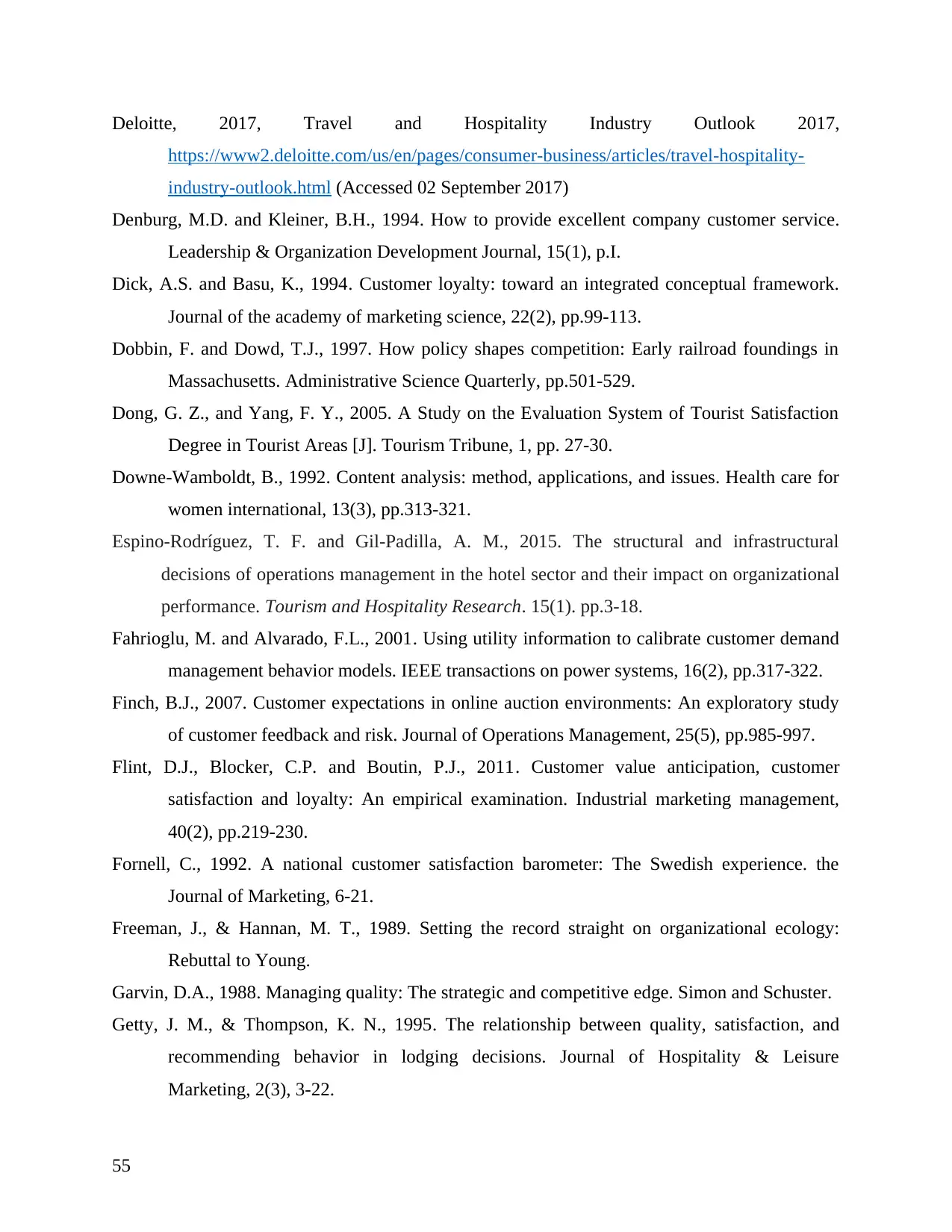
Deloitte, 2017, Travel and Hospitality Industry Outlook 2017,
https://www2.deloitte.com/us/en/pages/consumer-business/articles/travel-hospitality-
industry-outlook.html (Accessed 02 September 2017)
Denburg, M.D. and Kleiner, B.H., 1994. How to provide excellent company customer service.
Leadership & Organization Development Journal, 15(1), p.I.
Dick, A.S. and Basu, K., 1994. Customer loyalty: toward an integrated conceptual framework.
Journal of the academy of marketing science, 22(2), pp.99-113.
Dobbin, F. and Dowd, T.J., 1997. How policy shapes competition: Early railroad foundings in
Massachusetts. Administrative Science Quarterly, pp.501-529.
Dong, G. Z., and Yang, F. Y., 2005. A Study on the Evaluation System of Tourist Satisfaction
Degree in Tourist Areas [J]. Tourism Tribune, 1, pp. 27-30.
Downe‐Wamboldt, B., 1992. Content analysis: method, applications, and issues. Health care for
women international, 13(3), pp.313-321.
Espino-Rodríguez, T. F. and Gil-Padilla, A. M., 2015. The structural and infrastructural
decisions of operations management in the hotel sector and their impact on organizational
performance. Tourism and Hospitality Research. 15(1). pp.3-18.
Fahrioglu, M. and Alvarado, F.L., 2001. Using utility information to calibrate customer demand
management behavior models. IEEE transactions on power systems, 16(2), pp.317-322.
Finch, B.J., 2007. Customer expectations in online auction environments: An exploratory study
of customer feedback and risk. Journal of Operations Management, 25(5), pp.985-997.
Flint, D.J., Blocker, C.P. and Boutin, P.J., 2011. Customer value anticipation, customer
satisfaction and loyalty: An empirical examination. Industrial marketing management,
40(2), pp.219-230.
Fornell, C., 1992. A national customer satisfaction barometer: The Swedish experience. the
Journal of Marketing, 6-21.
Freeman, J., & Hannan, M. T., 1989. Setting the record straight on organizational ecology:
Rebuttal to Young.
Garvin, D.A., 1988. Managing quality: The strategic and competitive edge. Simon and Schuster.
Getty, J. M., & Thompson, K. N., 1995. The relationship between quality, satisfaction, and
recommending behavior in lodging decisions. Journal of Hospitality & Leisure
Marketing, 2(3), 3-22.
55
https://www2.deloitte.com/us/en/pages/consumer-business/articles/travel-hospitality-
industry-outlook.html (Accessed 02 September 2017)
Denburg, M.D. and Kleiner, B.H., 1994. How to provide excellent company customer service.
Leadership & Organization Development Journal, 15(1), p.I.
Dick, A.S. and Basu, K., 1994. Customer loyalty: toward an integrated conceptual framework.
Journal of the academy of marketing science, 22(2), pp.99-113.
Dobbin, F. and Dowd, T.J., 1997. How policy shapes competition: Early railroad foundings in
Massachusetts. Administrative Science Quarterly, pp.501-529.
Dong, G. Z., and Yang, F. Y., 2005. A Study on the Evaluation System of Tourist Satisfaction
Degree in Tourist Areas [J]. Tourism Tribune, 1, pp. 27-30.
Downe‐Wamboldt, B., 1992. Content analysis: method, applications, and issues. Health care for
women international, 13(3), pp.313-321.
Espino-Rodríguez, T. F. and Gil-Padilla, A. M., 2015. The structural and infrastructural
decisions of operations management in the hotel sector and their impact on organizational
performance. Tourism and Hospitality Research. 15(1). pp.3-18.
Fahrioglu, M. and Alvarado, F.L., 2001. Using utility information to calibrate customer demand
management behavior models. IEEE transactions on power systems, 16(2), pp.317-322.
Finch, B.J., 2007. Customer expectations in online auction environments: An exploratory study
of customer feedback and risk. Journal of Operations Management, 25(5), pp.985-997.
Flint, D.J., Blocker, C.P. and Boutin, P.J., 2011. Customer value anticipation, customer
satisfaction and loyalty: An empirical examination. Industrial marketing management,
40(2), pp.219-230.
Fornell, C., 1992. A national customer satisfaction barometer: The Swedish experience. the
Journal of Marketing, 6-21.
Freeman, J., & Hannan, M. T., 1989. Setting the record straight on organizational ecology:
Rebuttal to Young.
Garvin, D.A., 1988. Managing quality: The strategic and competitive edge. Simon and Schuster.
Getty, J. M., & Thompson, K. N., 1995. The relationship between quality, satisfaction, and
recommending behavior in lodging decisions. Journal of Hospitality & Leisure
Marketing, 2(3), 3-22.
55
Paraphrase This Document
Need a fresh take? Get an instant paraphrase of this document with our AI Paraphraser
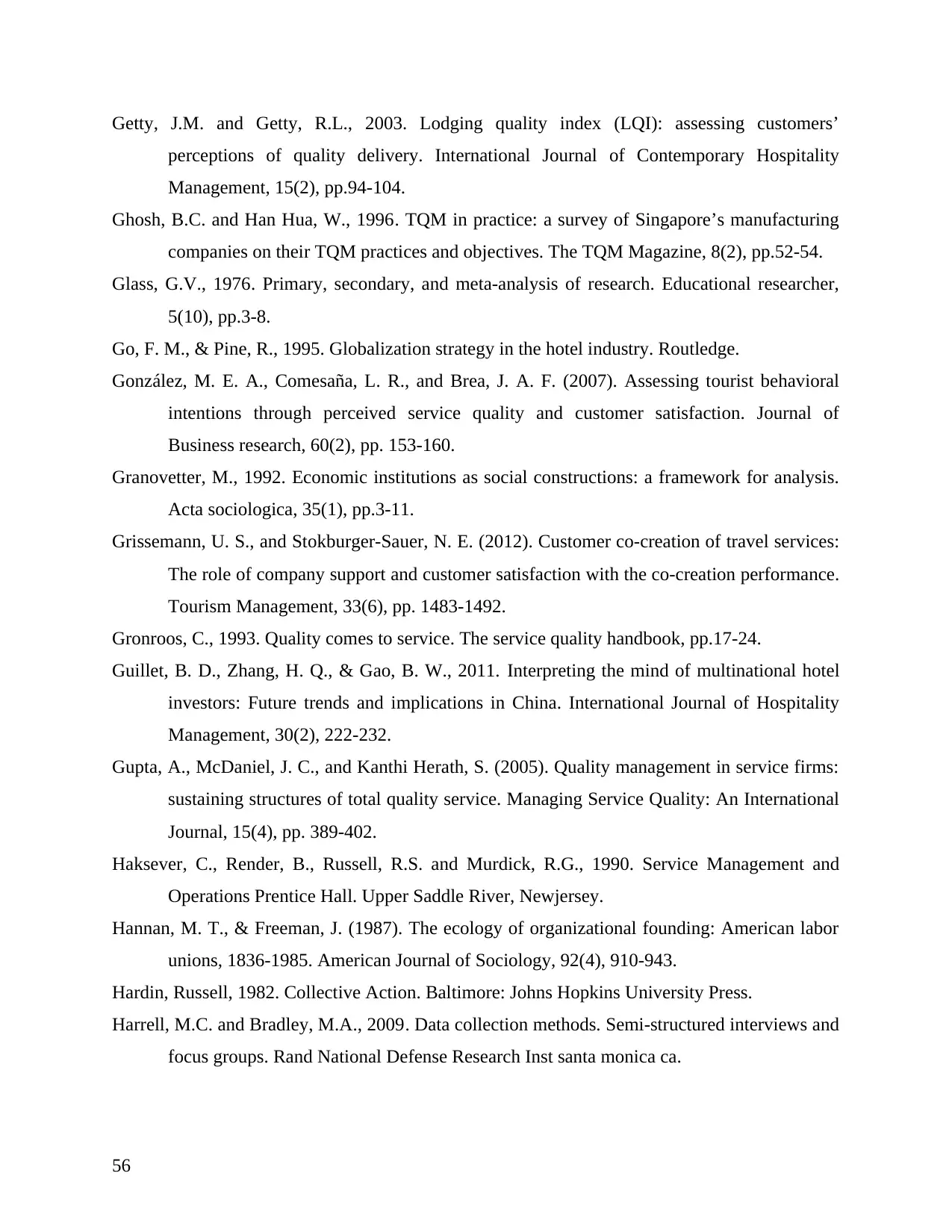
Getty, J.M. and Getty, R.L., 2003. Lodging quality index (LQI): assessing customers’
perceptions of quality delivery. International Journal of Contemporary Hospitality
Management, 15(2), pp.94-104.
Ghosh, B.C. and Han Hua, W., 1996. TQM in practice: a survey of Singapore’s manufacturing
companies on their TQM practices and objectives. The TQM Magazine, 8(2), pp.52-54.
Glass, G.V., 1976. Primary, secondary, and meta-analysis of research. Educational researcher,
5(10), pp.3-8.
Go, F. M., & Pine, R., 1995. Globalization strategy in the hotel industry. Routledge.
González, M. E. A., Comesaña, L. R., and Brea, J. A. F. (2007). Assessing tourist behavioral
intentions through perceived service quality and customer satisfaction. Journal of
Business research, 60(2), pp. 153-160.
Granovetter, M., 1992. Economic institutions as social constructions: a framework for analysis.
Acta sociologica, 35(1), pp.3-11.
Grissemann, U. S., and Stokburger-Sauer, N. E. (2012). Customer co-creation of travel services:
The role of company support and customer satisfaction with the co-creation performance.
Tourism Management, 33(6), pp. 1483-1492.
Gronroos, C., 1993. Quality comes to service. The service quality handbook, pp.17-24.
Guillet, B. D., Zhang, H. Q., & Gao, B. W., 2011. Interpreting the mind of multinational hotel
investors: Future trends and implications in China. International Journal of Hospitality
Management, 30(2), 222-232.
Gupta, A., McDaniel, J. C., and Kanthi Herath, S. (2005). Quality management in service firms:
sustaining structures of total quality service. Managing Service Quality: An International
Journal, 15(4), pp. 389-402.
Haksever, C., Render, B., Russell, R.S. and Murdick, R.G., 1990. Service Management and
Operations Prentice Hall. Upper Saddle River, Newjersey.
Hannan, M. T., & Freeman, J. (1987). The ecology of organizational founding: American labor
unions, 1836-1985. American Journal of Sociology, 92(4), 910-943.
Hardin, Russell, 1982. Collective Action. Baltimore: Johns Hopkins University Press.
Harrell, M.C. and Bradley, M.A., 2009. Data collection methods. Semi-structured interviews and
focus groups. Rand National Defense Research Inst santa monica ca.
56
perceptions of quality delivery. International Journal of Contemporary Hospitality
Management, 15(2), pp.94-104.
Ghosh, B.C. and Han Hua, W., 1996. TQM in practice: a survey of Singapore’s manufacturing
companies on their TQM practices and objectives. The TQM Magazine, 8(2), pp.52-54.
Glass, G.V., 1976. Primary, secondary, and meta-analysis of research. Educational researcher,
5(10), pp.3-8.
Go, F. M., & Pine, R., 1995. Globalization strategy in the hotel industry. Routledge.
González, M. E. A., Comesaña, L. R., and Brea, J. A. F. (2007). Assessing tourist behavioral
intentions through perceived service quality and customer satisfaction. Journal of
Business research, 60(2), pp. 153-160.
Granovetter, M., 1992. Economic institutions as social constructions: a framework for analysis.
Acta sociologica, 35(1), pp.3-11.
Grissemann, U. S., and Stokburger-Sauer, N. E. (2012). Customer co-creation of travel services:
The role of company support and customer satisfaction with the co-creation performance.
Tourism Management, 33(6), pp. 1483-1492.
Gronroos, C., 1993. Quality comes to service. The service quality handbook, pp.17-24.
Guillet, B. D., Zhang, H. Q., & Gao, B. W., 2011. Interpreting the mind of multinational hotel
investors: Future trends and implications in China. International Journal of Hospitality
Management, 30(2), 222-232.
Gupta, A., McDaniel, J. C., and Kanthi Herath, S. (2005). Quality management in service firms:
sustaining structures of total quality service. Managing Service Quality: An International
Journal, 15(4), pp. 389-402.
Haksever, C., Render, B., Russell, R.S. and Murdick, R.G., 1990. Service Management and
Operations Prentice Hall. Upper Saddle River, Newjersey.
Hannan, M. T., & Freeman, J. (1987). The ecology of organizational founding: American labor
unions, 1836-1985. American Journal of Sociology, 92(4), 910-943.
Hardin, Russell, 1982. Collective Action. Baltimore: Johns Hopkins University Press.
Harrell, M.C. and Bradley, M.A., 2009. Data collection methods. Semi-structured interviews and
focus groups. Rand National Defense Research Inst santa monica ca.
56
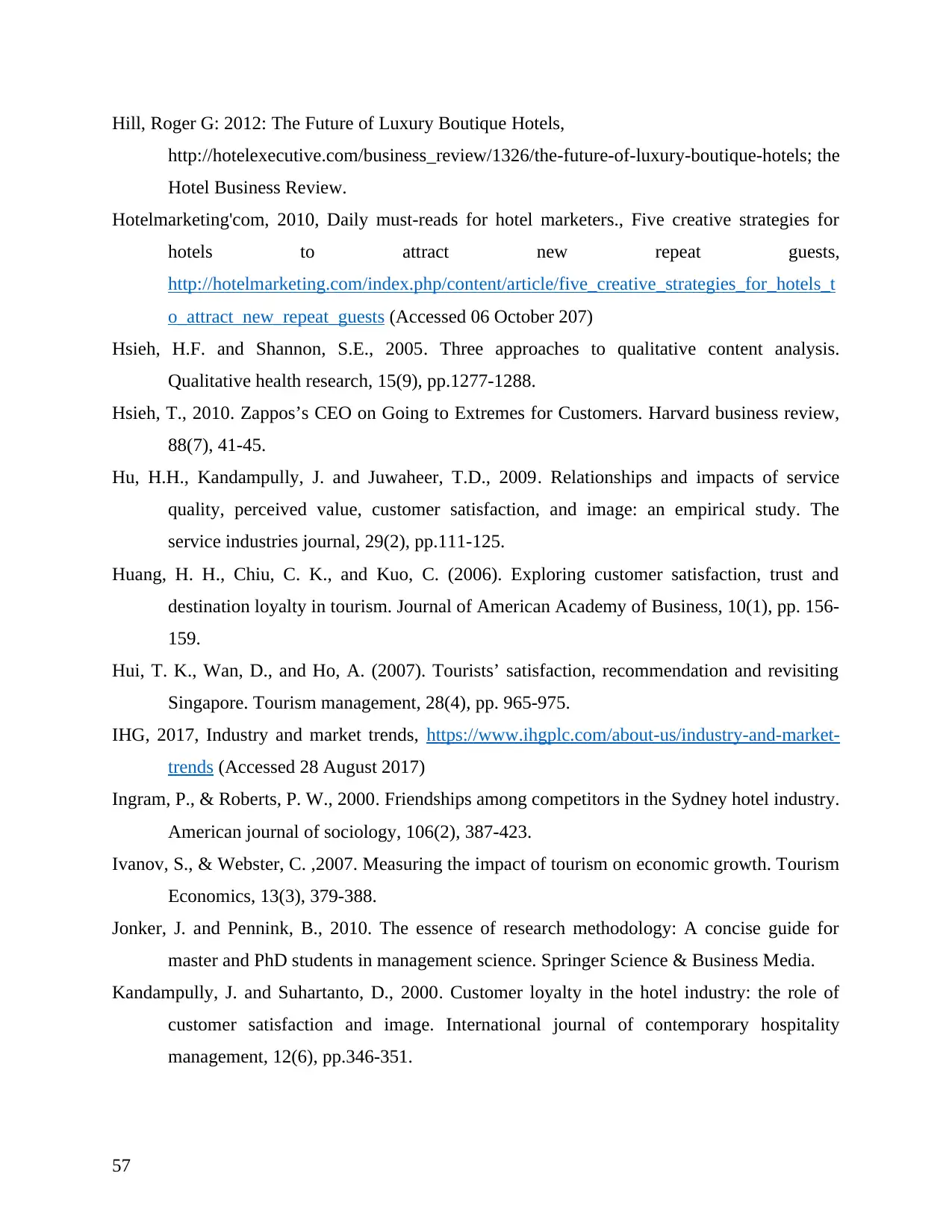
Hill, Roger G: 2012: The Future of Luxury Boutique Hotels,
http://hotelexecutive.com/business_review/1326/the‐future‐of‐luxury‐boutique‐hotels; the
Hotel Business Review.
Hotelmarketing'com, 2010, Daily must-reads for hotel marketers., Five creative strategies for
hotels to attract new repeat guests,
http://hotelmarketing.com/index.php/content/article/five_creative_strategies_for_hotels_t
o_attract_new_repeat_guests (Accessed 06 October 207)
Hsieh, H.F. and Shannon, S.E., 2005. Three approaches to qualitative content analysis.
Qualitative health research, 15(9), pp.1277-1288.
Hsieh, T., 2010. Zappos’s CEO on Going to Extremes for Customers. Harvard business review,
88(7), 41-45.
Hu, H.H., Kandampully, J. and Juwaheer, T.D., 2009. Relationships and impacts of service
quality, perceived value, customer satisfaction, and image: an empirical study. The
service industries journal, 29(2), pp.111-125.
Huang, H. H., Chiu, C. K., and Kuo, C. (2006). Exploring customer satisfaction, trust and
destination loyalty in tourism. Journal of American Academy of Business, 10(1), pp. 156-
159.
Hui, T. K., Wan, D., and Ho, A. (2007). Tourists’ satisfaction, recommendation and revisiting
Singapore. Tourism management, 28(4), pp. 965-975.
IHG, 2017, Industry and market trends, https://www.ihgplc.com/about-us/industry-and-market-
trends (Accessed 28 August 2017)
Ingram, P., & Roberts, P. W., 2000. Friendships among competitors in the Sydney hotel industry.
American journal of sociology, 106(2), 387-423.
Ivanov, S., & Webster, C. ,2007. Measuring the impact of tourism on economic growth. Tourism
Economics, 13(3), 379-388.
Jonker, J. and Pennink, B., 2010. The essence of research methodology: A concise guide for
master and PhD students in management science. Springer Science & Business Media.
Kandampully, J. and Suhartanto, D., 2000. Customer loyalty in the hotel industry: the role of
customer satisfaction and image. International journal of contemporary hospitality
management, 12(6), pp.346-351.
57
http://hotelexecutive.com/business_review/1326/the‐future‐of‐luxury‐boutique‐hotels; the
Hotel Business Review.
Hotelmarketing'com, 2010, Daily must-reads for hotel marketers., Five creative strategies for
hotels to attract new repeat guests,
http://hotelmarketing.com/index.php/content/article/five_creative_strategies_for_hotels_t
o_attract_new_repeat_guests (Accessed 06 October 207)
Hsieh, H.F. and Shannon, S.E., 2005. Three approaches to qualitative content analysis.
Qualitative health research, 15(9), pp.1277-1288.
Hsieh, T., 2010. Zappos’s CEO on Going to Extremes for Customers. Harvard business review,
88(7), 41-45.
Hu, H.H., Kandampully, J. and Juwaheer, T.D., 2009. Relationships and impacts of service
quality, perceived value, customer satisfaction, and image: an empirical study. The
service industries journal, 29(2), pp.111-125.
Huang, H. H., Chiu, C. K., and Kuo, C. (2006). Exploring customer satisfaction, trust and
destination loyalty in tourism. Journal of American Academy of Business, 10(1), pp. 156-
159.
Hui, T. K., Wan, D., and Ho, A. (2007). Tourists’ satisfaction, recommendation and revisiting
Singapore. Tourism management, 28(4), pp. 965-975.
IHG, 2017, Industry and market trends, https://www.ihgplc.com/about-us/industry-and-market-
trends (Accessed 28 August 2017)
Ingram, P., & Roberts, P. W., 2000. Friendships among competitors in the Sydney hotel industry.
American journal of sociology, 106(2), 387-423.
Ivanov, S., & Webster, C. ,2007. Measuring the impact of tourism on economic growth. Tourism
Economics, 13(3), 379-388.
Jonker, J. and Pennink, B., 2010. The essence of research methodology: A concise guide for
master and PhD students in management science. Springer Science & Business Media.
Kandampully, J. and Suhartanto, D., 2000. Customer loyalty in the hotel industry: the role of
customer satisfaction and image. International journal of contemporary hospitality
management, 12(6), pp.346-351.
57
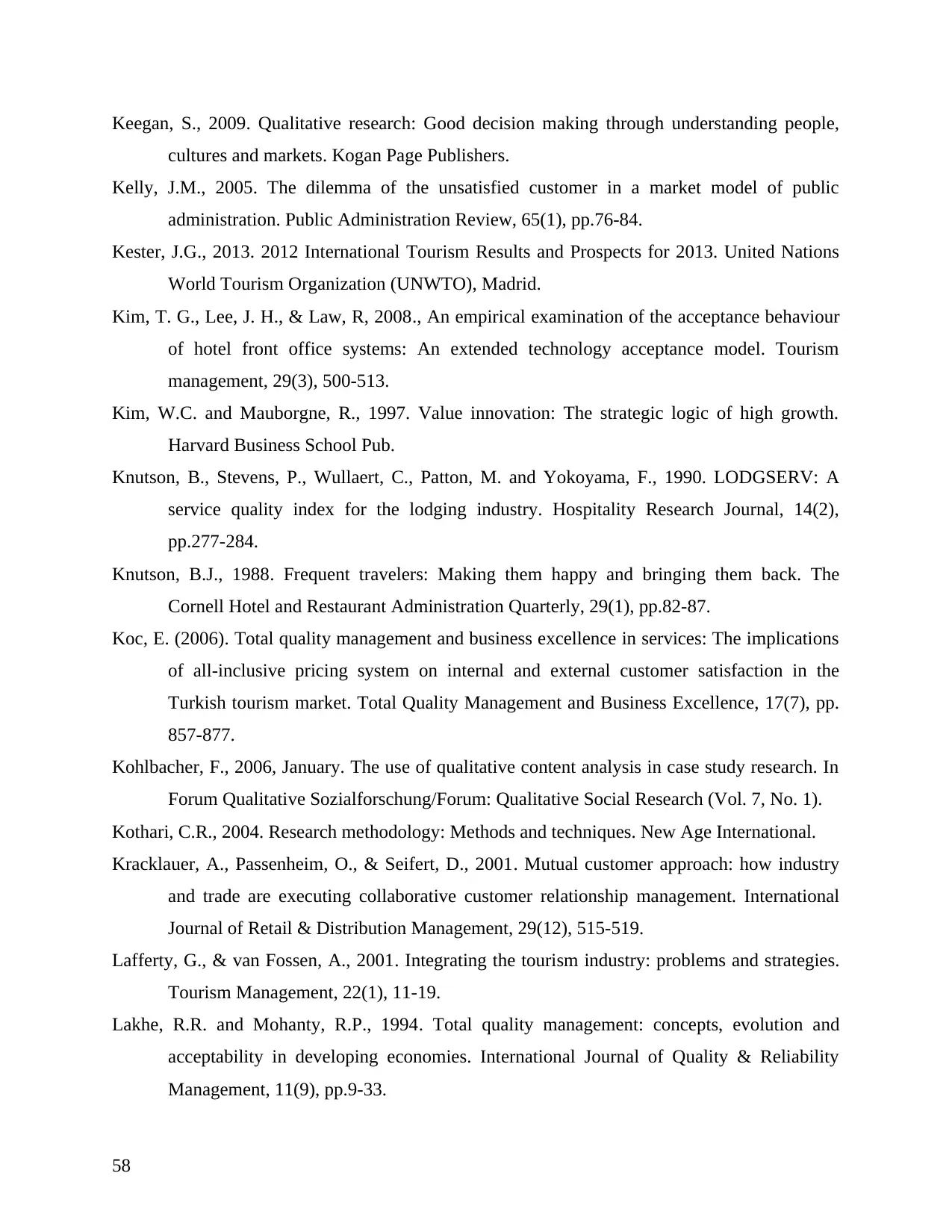
Keegan, S., 2009. Qualitative research: Good decision making through understanding people,
cultures and markets. Kogan Page Publishers.
Kelly, J.M., 2005. The dilemma of the unsatisfied customer in a market model of public
administration. Public Administration Review, 65(1), pp.76-84.
Kester, J.G., 2013. 2012 International Tourism Results and Prospects for 2013. United Nations
World Tourism Organization (UNWTO), Madrid.
Kim, T. G., Lee, J. H., & Law, R, 2008., An empirical examination of the acceptance behaviour
of hotel front office systems: An extended technology acceptance model. Tourism
management, 29(3), 500-513.
Kim, W.C. and Mauborgne, R., 1997. Value innovation: The strategic logic of high growth.
Harvard Business School Pub.
Knutson, B., Stevens, P., Wullaert, C., Patton, M. and Yokoyama, F., 1990. LODGSERV: A
service quality index for the lodging industry. Hospitality Research Journal, 14(2),
pp.277-284.
Knutson, B.J., 1988. Frequent travelers: Making them happy and bringing them back. The
Cornell Hotel and Restaurant Administration Quarterly, 29(1), pp.82-87.
Koc, E. (2006). Total quality management and business excellence in services: The implications
of all-inclusive pricing system on internal and external customer satisfaction in the
Turkish tourism market. Total Quality Management and Business Excellence, 17(7), pp.
857-877.
Kohlbacher, F., 2006, January. The use of qualitative content analysis in case study research. In
Forum Qualitative Sozialforschung/Forum: Qualitative Social Research (Vol. 7, No. 1).
Kothari, C.R., 2004. Research methodology: Methods and techniques. New Age International.
Kracklauer, A., Passenheim, O., & Seifert, D., 2001. Mutual customer approach: how industry
and trade are executing collaborative customer relationship management. International
Journal of Retail & Distribution Management, 29(12), 515-519.
Lafferty, G., & van Fossen, A., 2001. Integrating the tourism industry: problems and strategies.
Tourism Management, 22(1), 11-19.
Lakhe, R.R. and Mohanty, R.P., 1994. Total quality management: concepts, evolution and
acceptability in developing economies. International Journal of Quality & Reliability
Management, 11(9), pp.9-33.
58
cultures and markets. Kogan Page Publishers.
Kelly, J.M., 2005. The dilemma of the unsatisfied customer in a market model of public
administration. Public Administration Review, 65(1), pp.76-84.
Kester, J.G., 2013. 2012 International Tourism Results and Prospects for 2013. United Nations
World Tourism Organization (UNWTO), Madrid.
Kim, T. G., Lee, J. H., & Law, R, 2008., An empirical examination of the acceptance behaviour
of hotel front office systems: An extended technology acceptance model. Tourism
management, 29(3), 500-513.
Kim, W.C. and Mauborgne, R., 1997. Value innovation: The strategic logic of high growth.
Harvard Business School Pub.
Knutson, B., Stevens, P., Wullaert, C., Patton, M. and Yokoyama, F., 1990. LODGSERV: A
service quality index for the lodging industry. Hospitality Research Journal, 14(2),
pp.277-284.
Knutson, B.J., 1988. Frequent travelers: Making them happy and bringing them back. The
Cornell Hotel and Restaurant Administration Quarterly, 29(1), pp.82-87.
Koc, E. (2006). Total quality management and business excellence in services: The implications
of all-inclusive pricing system on internal and external customer satisfaction in the
Turkish tourism market. Total Quality Management and Business Excellence, 17(7), pp.
857-877.
Kohlbacher, F., 2006, January. The use of qualitative content analysis in case study research. In
Forum Qualitative Sozialforschung/Forum: Qualitative Social Research (Vol. 7, No. 1).
Kothari, C.R., 2004. Research methodology: Methods and techniques. New Age International.
Kracklauer, A., Passenheim, O., & Seifert, D., 2001. Mutual customer approach: how industry
and trade are executing collaborative customer relationship management. International
Journal of Retail & Distribution Management, 29(12), 515-519.
Lafferty, G., & van Fossen, A., 2001. Integrating the tourism industry: problems and strategies.
Tourism Management, 22(1), 11-19.
Lakhe, R.R. and Mohanty, R.P., 1994. Total quality management: concepts, evolution and
acceptability in developing economies. International Journal of Quality & Reliability
Management, 11(9), pp.9-33.
58
Secure Best Marks with AI Grader
Need help grading? Try our AI Grader for instant feedback on your assignments.
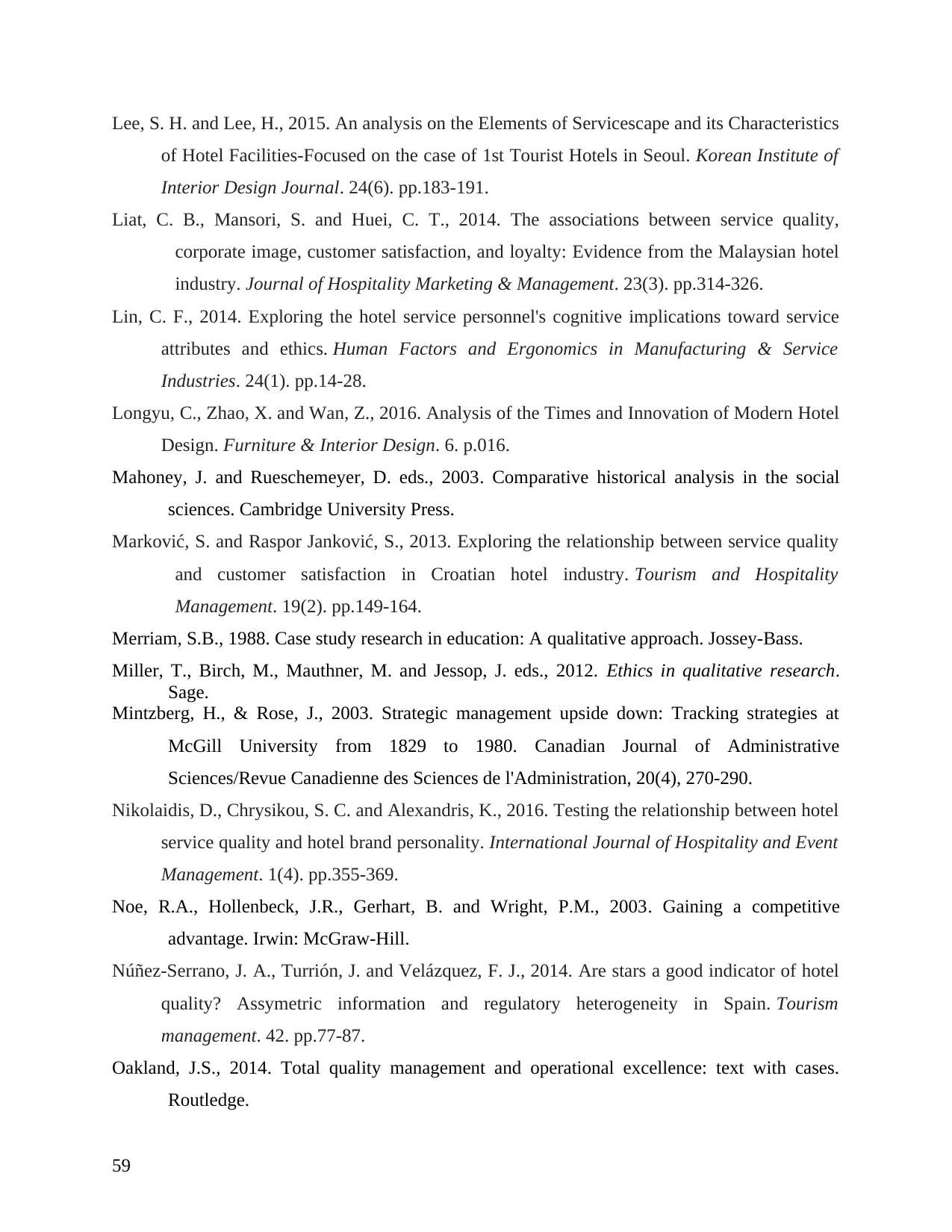
Lee, S. H. and Lee, H., 2015. An analysis on the Elements of Servicescape and its Characteristics
of Hotel Facilities-Focused on the case of 1st Tourist Hotels in Seoul. Korean Institute of
Interior Design Journal. 24(6). pp.183-191.
Liat, C. B., Mansori, S. and Huei, C. T., 2014. The associations between service quality,
corporate image, customer satisfaction, and loyalty: Evidence from the Malaysian hotel
industry. Journal of Hospitality Marketing & Management. 23(3). pp.314-326.
Lin, C. F., 2014. Exploring the hotel service personnel's cognitive implications toward service
attributes and ethics. Human Factors and Ergonomics in Manufacturing & Service
Industries. 24(1). pp.14-28.
Longyu, C., Zhao, X. and Wan, Z., 2016. Analysis of the Times and Innovation of Modern Hotel
Design. Furniture & Interior Design. 6. p.016.
Mahoney, J. and Rueschemeyer, D. eds., 2003. Comparative historical analysis in the social
sciences. Cambridge University Press.
Marković, S. and Raspor Janković, S., 2013. Exploring the relationship between service quality
and customer satisfaction in Croatian hotel industry. Tourism and Hospitality
Management. 19(2). pp.149-164.
Merriam, S.B., 1988. Case study research in education: A qualitative approach. Jossey-Bass.
Miller, T., Birch, M., Mauthner, M. and Jessop, J. eds., 2012. Ethics in qualitative research.
Sage.
Mintzberg, H., & Rose, J., 2003. Strategic management upside down: Tracking strategies at
McGill University from 1829 to 1980. Canadian Journal of Administrative
Sciences/Revue Canadienne des Sciences de l'Administration, 20(4), 270-290.
Nikolaidis, D., Chrysikou, S. C. and Alexandris, K., 2016. Testing the relationship between hotel
service quality and hotel brand personality. International Journal of Hospitality and Event
Management. 1(4). pp.355-369.
Noe, R.A., Hollenbeck, J.R., Gerhart, B. and Wright, P.M., 2003. Gaining a competitive
advantage. Irwin: McGraw-Hill.
Núñez-Serrano, J. A., Turrión, J. and Velázquez, F. J., 2014. Are stars a good indicator of hotel
quality? Assymetric information and regulatory heterogeneity in Spain. Tourism
management. 42. pp.77-87.
Oakland, J.S., 2014. Total quality management and operational excellence: text with cases.
Routledge.
59
of Hotel Facilities-Focused on the case of 1st Tourist Hotels in Seoul. Korean Institute of
Interior Design Journal. 24(6). pp.183-191.
Liat, C. B., Mansori, S. and Huei, C. T., 2014. The associations between service quality,
corporate image, customer satisfaction, and loyalty: Evidence from the Malaysian hotel
industry. Journal of Hospitality Marketing & Management. 23(3). pp.314-326.
Lin, C. F., 2014. Exploring the hotel service personnel's cognitive implications toward service
attributes and ethics. Human Factors and Ergonomics in Manufacturing & Service
Industries. 24(1). pp.14-28.
Longyu, C., Zhao, X. and Wan, Z., 2016. Analysis of the Times and Innovation of Modern Hotel
Design. Furniture & Interior Design. 6. p.016.
Mahoney, J. and Rueschemeyer, D. eds., 2003. Comparative historical analysis in the social
sciences. Cambridge University Press.
Marković, S. and Raspor Janković, S., 2013. Exploring the relationship between service quality
and customer satisfaction in Croatian hotel industry. Tourism and Hospitality
Management. 19(2). pp.149-164.
Merriam, S.B., 1988. Case study research in education: A qualitative approach. Jossey-Bass.
Miller, T., Birch, M., Mauthner, M. and Jessop, J. eds., 2012. Ethics in qualitative research.
Sage.
Mintzberg, H., & Rose, J., 2003. Strategic management upside down: Tracking strategies at
McGill University from 1829 to 1980. Canadian Journal of Administrative
Sciences/Revue Canadienne des Sciences de l'Administration, 20(4), 270-290.
Nikolaidis, D., Chrysikou, S. C. and Alexandris, K., 2016. Testing the relationship between hotel
service quality and hotel brand personality. International Journal of Hospitality and Event
Management. 1(4). pp.355-369.
Noe, R.A., Hollenbeck, J.R., Gerhart, B. and Wright, P.M., 2003. Gaining a competitive
advantage. Irwin: McGraw-Hill.
Núñez-Serrano, J. A., Turrión, J. and Velázquez, F. J., 2014. Are stars a good indicator of hotel
quality? Assymetric information and regulatory heterogeneity in Spain. Tourism
management. 42. pp.77-87.
Oakland, J.S., 2014. Total quality management and operational excellence: text with cases.
Routledge.
59
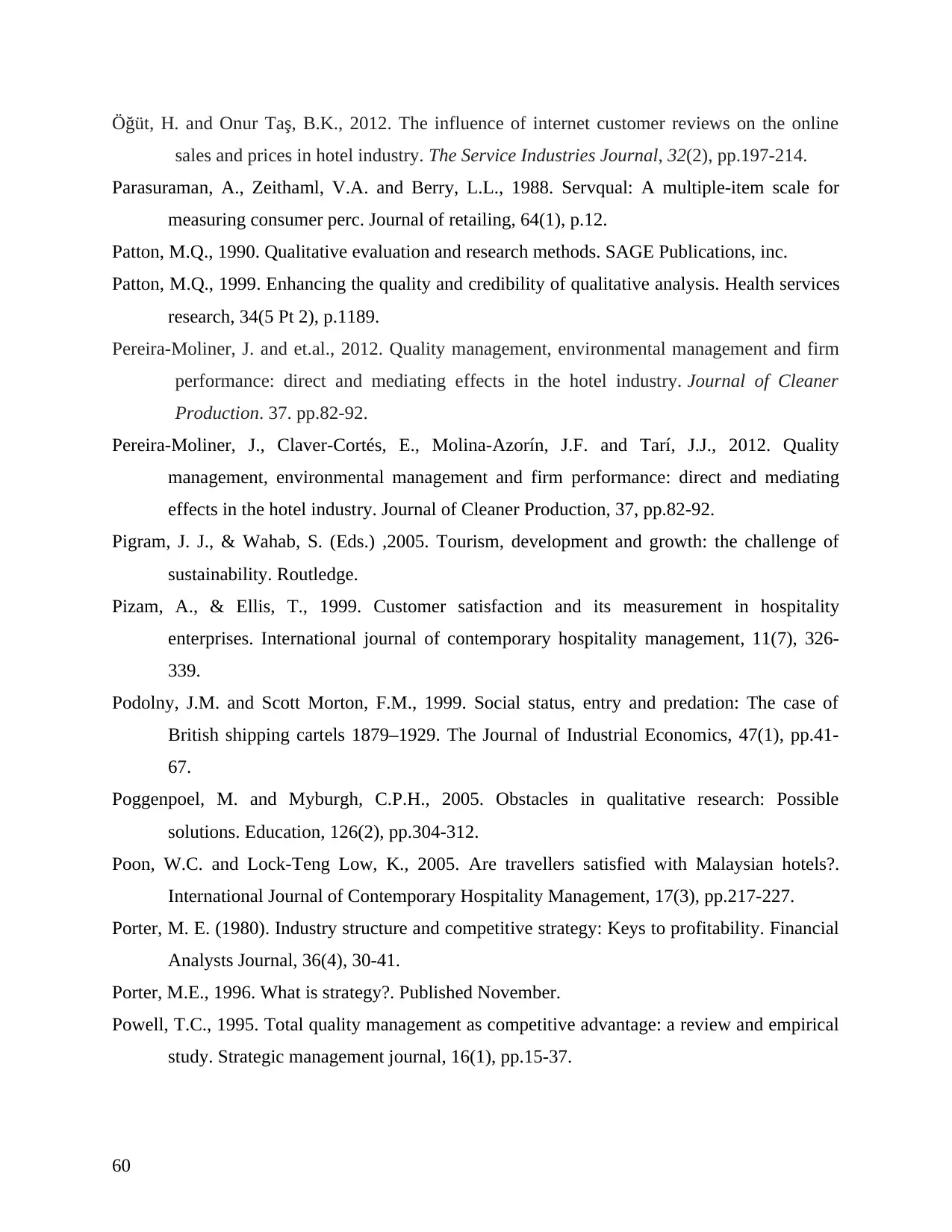
Öğüt, H. and Onur Taş, B.K., 2012. The influence of internet customer reviews on the online
sales and prices in hotel industry. The Service Industries Journal, 32(2), pp.197-214.
Parasuraman, A., Zeithaml, V.A. and Berry, L.L., 1988. Servqual: A multiple-item scale for
measuring consumer perc. Journal of retailing, 64(1), p.12.
Patton, M.Q., 1990. Qualitative evaluation and research methods. SAGE Publications, inc.
Patton, M.Q., 1999. Enhancing the quality and credibility of qualitative analysis. Health services
research, 34(5 Pt 2), p.1189.
Pereira-Moliner, J. and et.al., 2012. Quality management, environmental management and firm
performance: direct and mediating effects in the hotel industry. Journal of Cleaner
Production. 37. pp.82-92.
Pereira-Moliner, J., Claver-Cortés, E., Molina-Azorín, J.F. and Tarí, J.J., 2012. Quality
management, environmental management and firm performance: direct and mediating
effects in the hotel industry. Journal of Cleaner Production, 37, pp.82-92.
Pigram, J. J., & Wahab, S. (Eds.) ,2005. Tourism, development and growth: the challenge of
sustainability. Routledge.
Pizam, A., & Ellis, T., 1999. Customer satisfaction and its measurement in hospitality
enterprises. International journal of contemporary hospitality management, 11(7), 326-
339.
Podolny, J.M. and Scott Morton, F.M., 1999. Social status, entry and predation: The case of
British shipping cartels 1879–1929. The Journal of Industrial Economics, 47(1), pp.41-
67.
Poggenpoel, M. and Myburgh, C.P.H., 2005. Obstacles in qualitative research: Possible
solutions. Education, 126(2), pp.304-312.
Poon, W.C. and Lock-Teng Low, K., 2005. Are travellers satisfied with Malaysian hotels?.
International Journal of Contemporary Hospitality Management, 17(3), pp.217-227.
Porter, M. E. (1980). Industry structure and competitive strategy: Keys to profitability. Financial
Analysts Journal, 36(4), 30-41.
Porter, M.E., 1996. What is strategy?. Published November.
Powell, T.C., 1995. Total quality management as competitive advantage: a review and empirical
study. Strategic management journal, 16(1), pp.15-37.
60
sales and prices in hotel industry. The Service Industries Journal, 32(2), pp.197-214.
Parasuraman, A., Zeithaml, V.A. and Berry, L.L., 1988. Servqual: A multiple-item scale for
measuring consumer perc. Journal of retailing, 64(1), p.12.
Patton, M.Q., 1990. Qualitative evaluation and research methods. SAGE Publications, inc.
Patton, M.Q., 1999. Enhancing the quality and credibility of qualitative analysis. Health services
research, 34(5 Pt 2), p.1189.
Pereira-Moliner, J. and et.al., 2012. Quality management, environmental management and firm
performance: direct and mediating effects in the hotel industry. Journal of Cleaner
Production. 37. pp.82-92.
Pereira-Moliner, J., Claver-Cortés, E., Molina-Azorín, J.F. and Tarí, J.J., 2012. Quality
management, environmental management and firm performance: direct and mediating
effects in the hotel industry. Journal of Cleaner Production, 37, pp.82-92.
Pigram, J. J., & Wahab, S. (Eds.) ,2005. Tourism, development and growth: the challenge of
sustainability. Routledge.
Pizam, A., & Ellis, T., 1999. Customer satisfaction and its measurement in hospitality
enterprises. International journal of contemporary hospitality management, 11(7), 326-
339.
Podolny, J.M. and Scott Morton, F.M., 1999. Social status, entry and predation: The case of
British shipping cartels 1879–1929. The Journal of Industrial Economics, 47(1), pp.41-
67.
Poggenpoel, M. and Myburgh, C.P.H., 2005. Obstacles in qualitative research: Possible
solutions. Education, 126(2), pp.304-312.
Poon, W.C. and Lock-Teng Low, K., 2005. Are travellers satisfied with Malaysian hotels?.
International Journal of Contemporary Hospitality Management, 17(3), pp.217-227.
Porter, M. E. (1980). Industry structure and competitive strategy: Keys to profitability. Financial
Analysts Journal, 36(4), 30-41.
Porter, M.E., 1996. What is strategy?. Published November.
Powell, T.C., 1995. Total quality management as competitive advantage: a review and empirical
study. Strategic management journal, 16(1), pp.15-37.
60
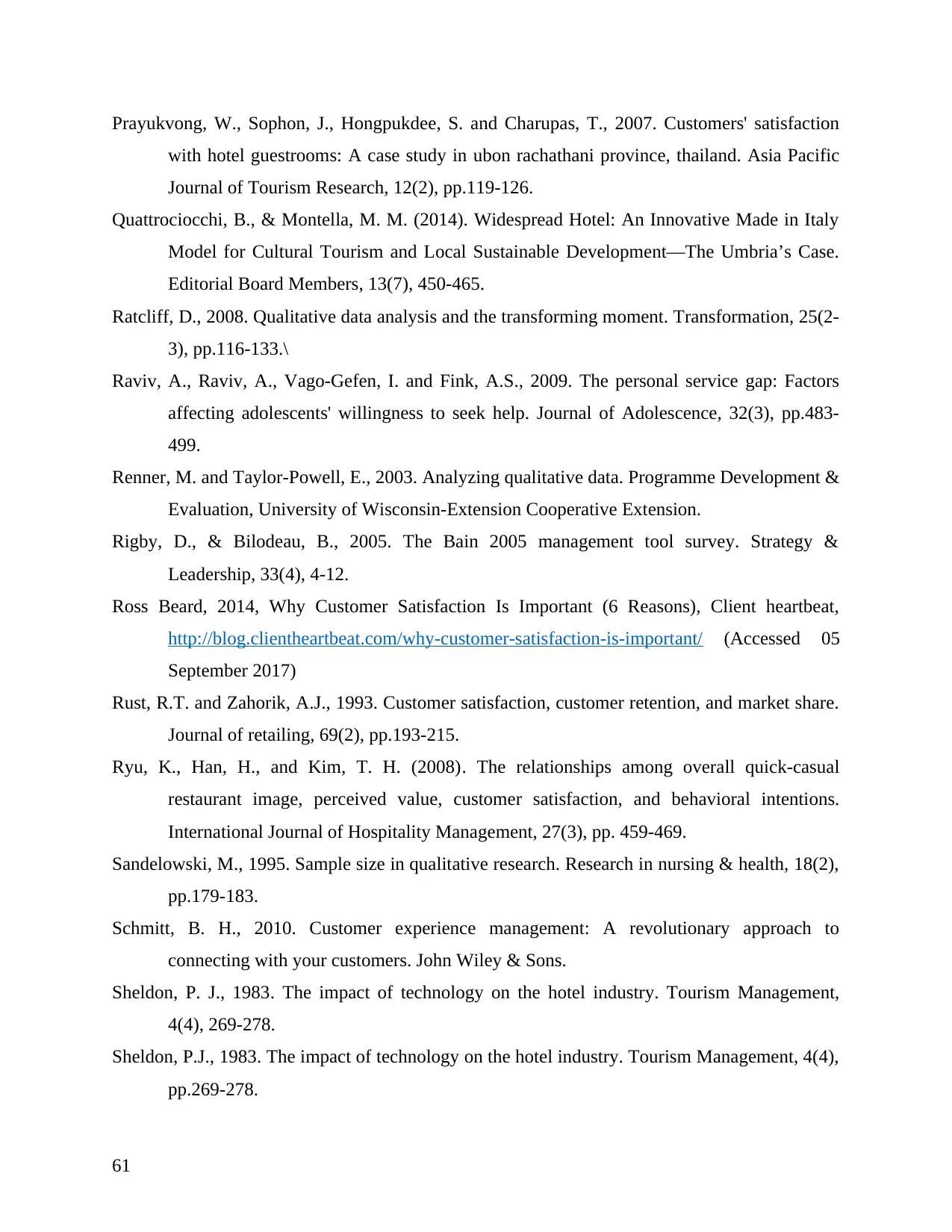
Prayukvong, W., Sophon, J., Hongpukdee, S. and Charupas, T., 2007. Customers' satisfaction
with hotel guestrooms: A case study in ubon rachathani province, thailand. Asia Pacific
Journal of Tourism Research, 12(2), pp.119-126.
Quattrociocchi, B., & Montella, M. M. (2014). Widespread Hotel: An Innovative Made in Italy
Model for Cultural Tourism and Local Sustainable Development—The Umbria’s Case.
Editorial Board Members, 13(7), 450-465.
Ratcliff, D., 2008. Qualitative data analysis and the transforming moment. Transformation, 25(2-
3), pp.116-133.\
Raviv, A., Raviv, A., Vago-Gefen, I. and Fink, A.S., 2009. The personal service gap: Factors
affecting adolescents' willingness to seek help. Journal of Adolescence, 32(3), pp.483-
499.
Renner, M. and Taylor-Powell, E., 2003. Analyzing qualitative data. Programme Development &
Evaluation, University of Wisconsin-Extension Cooperative Extension.
Rigby, D., & Bilodeau, B., 2005. The Bain 2005 management tool survey. Strategy &
Leadership, 33(4), 4-12.
Ross Beard, 2014, Why Customer Satisfaction Is Important (6 Reasons), Client heartbeat,
http://blog.clientheartbeat.com/why-customer-satisfaction-is-important/ (Accessed 05
September 2017)
Rust, R.T. and Zahorik, A.J., 1993. Customer satisfaction, customer retention, and market share.
Journal of retailing, 69(2), pp.193-215.
Ryu, K., Han, H., and Kim, T. H. (2008). The relationships among overall quick-casual
restaurant image, perceived value, customer satisfaction, and behavioral intentions.
International Journal of Hospitality Management, 27(3), pp. 459-469.
Sandelowski, M., 1995. Sample size in qualitative research. Research in nursing & health, 18(2),
pp.179-183.
Schmitt, B. H., 2010. Customer experience management: A revolutionary approach to
connecting with your customers. John Wiley & Sons.
Sheldon, P. J., 1983. The impact of technology on the hotel industry. Tourism Management,
4(4), 269-278.
Sheldon, P.J., 1983. The impact of technology on the hotel industry. Tourism Management, 4(4),
pp.269-278.
61
with hotel guestrooms: A case study in ubon rachathani province, thailand. Asia Pacific
Journal of Tourism Research, 12(2), pp.119-126.
Quattrociocchi, B., & Montella, M. M. (2014). Widespread Hotel: An Innovative Made in Italy
Model for Cultural Tourism and Local Sustainable Development—The Umbria’s Case.
Editorial Board Members, 13(7), 450-465.
Ratcliff, D., 2008. Qualitative data analysis and the transforming moment. Transformation, 25(2-
3), pp.116-133.\
Raviv, A., Raviv, A., Vago-Gefen, I. and Fink, A.S., 2009. The personal service gap: Factors
affecting adolescents' willingness to seek help. Journal of Adolescence, 32(3), pp.483-
499.
Renner, M. and Taylor-Powell, E., 2003. Analyzing qualitative data. Programme Development &
Evaluation, University of Wisconsin-Extension Cooperative Extension.
Rigby, D., & Bilodeau, B., 2005. The Bain 2005 management tool survey. Strategy &
Leadership, 33(4), 4-12.
Ross Beard, 2014, Why Customer Satisfaction Is Important (6 Reasons), Client heartbeat,
http://blog.clientheartbeat.com/why-customer-satisfaction-is-important/ (Accessed 05
September 2017)
Rust, R.T. and Zahorik, A.J., 1993. Customer satisfaction, customer retention, and market share.
Journal of retailing, 69(2), pp.193-215.
Ryu, K., Han, H., and Kim, T. H. (2008). The relationships among overall quick-casual
restaurant image, perceived value, customer satisfaction, and behavioral intentions.
International Journal of Hospitality Management, 27(3), pp. 459-469.
Sandelowski, M., 1995. Sample size in qualitative research. Research in nursing & health, 18(2),
pp.179-183.
Schmitt, B. H., 2010. Customer experience management: A revolutionary approach to
connecting with your customers. John Wiley & Sons.
Sheldon, P. J., 1983. The impact of technology on the hotel industry. Tourism Management,
4(4), 269-278.
Sheldon, P.J., 1983. The impact of technology on the hotel industry. Tourism Management, 4(4),
pp.269-278.
61
Paraphrase This Document
Need a fresh take? Get an instant paraphrase of this document with our AI Paraphraser
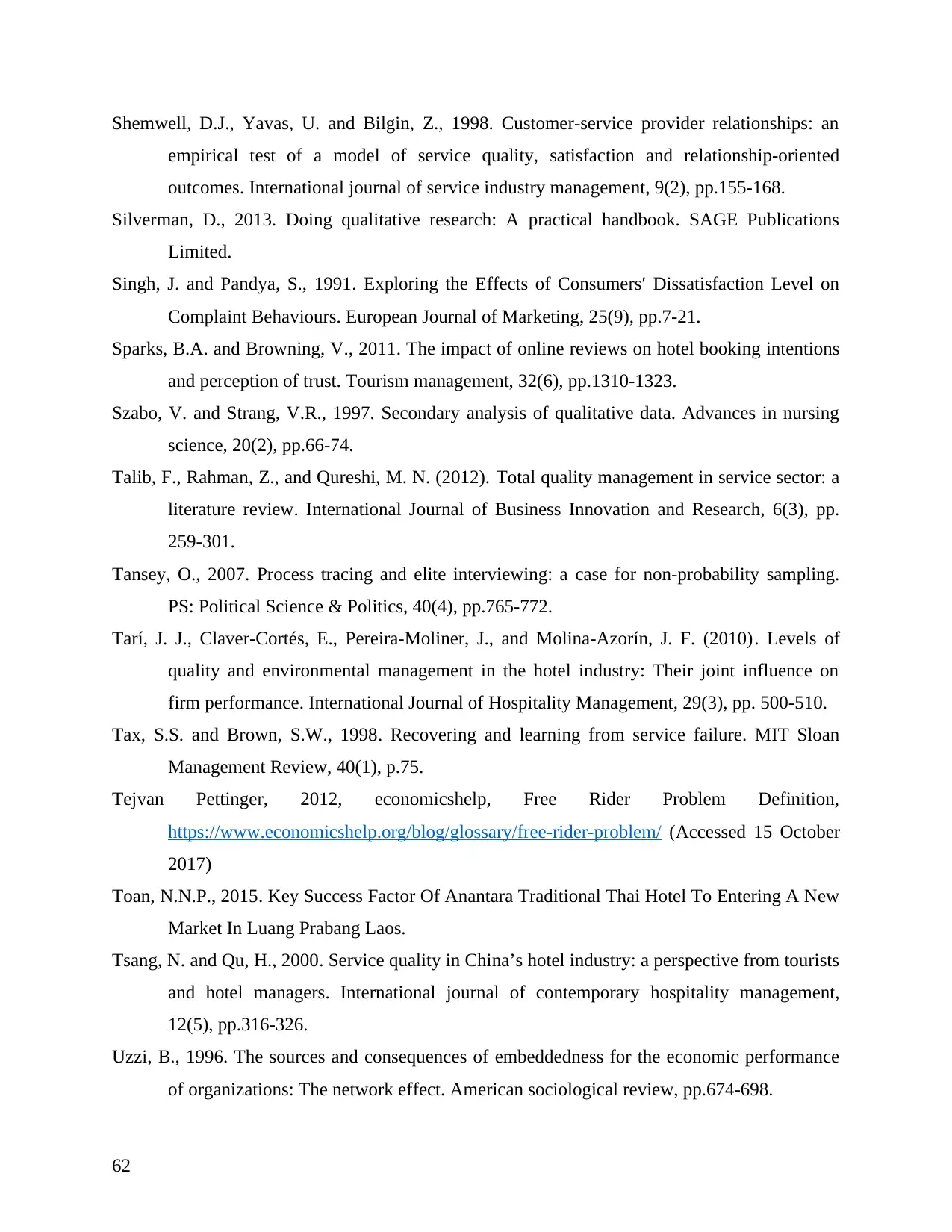
Shemwell, D.J., Yavas, U. and Bilgin, Z., 1998. Customer-service provider relationships: an
empirical test of a model of service quality, satisfaction and relationship-oriented
outcomes. International journal of service industry management, 9(2), pp.155-168.
Silverman, D., 2013. Doing qualitative research: A practical handbook. SAGE Publications
Limited.
Singh, J. and Pandya, S., 1991. Exploring the Effects of Consumers′ Dissatisfaction Level on
Complaint Behaviours. European Journal of Marketing, 25(9), pp.7-21.
Sparks, B.A. and Browning, V., 2011. The impact of online reviews on hotel booking intentions
and perception of trust. Tourism management, 32(6), pp.1310-1323.
Szabo, V. and Strang, V.R., 1997. Secondary analysis of qualitative data. Advances in nursing
science, 20(2), pp.66-74.
Talib, F., Rahman, Z., and Qureshi, M. N. (2012). Total quality management in service sector: a
literature review. International Journal of Business Innovation and Research, 6(3), pp.
259-301.
Tansey, O., 2007. Process tracing and elite interviewing: a case for non-probability sampling.
PS: Political Science & Politics, 40(4), pp.765-772.
Tarí, J. J., Claver-Cortés, E., Pereira-Moliner, J., and Molina-Azorín, J. F. (2010). Levels of
quality and environmental management in the hotel industry: Their joint influence on
firm performance. International Journal of Hospitality Management, 29(3), pp. 500-510.
Tax, S.S. and Brown, S.W., 1998. Recovering and learning from service failure. MIT Sloan
Management Review, 40(1), p.75.
Tejvan Pettinger, 2012, economicshelp, Free Rider Problem Definition,
https://www.economicshelp.org/blog/glossary/free-rider-problem/ (Accessed 15 October
2017)
Toan, N.N.P., 2015. Key Success Factor Of Anantara Traditional Thai Hotel To Entering A New
Market In Luang Prabang Laos.
Tsang, N. and Qu, H., 2000. Service quality in China’s hotel industry: a perspective from tourists
and hotel managers. International journal of contemporary hospitality management,
12(5), pp.316-326.
Uzzi, B., 1996. The sources and consequences of embeddedness for the economic performance
of organizations: The network effect. American sociological review, pp.674-698.
62
empirical test of a model of service quality, satisfaction and relationship-oriented
outcomes. International journal of service industry management, 9(2), pp.155-168.
Silverman, D., 2013. Doing qualitative research: A practical handbook. SAGE Publications
Limited.
Singh, J. and Pandya, S., 1991. Exploring the Effects of Consumers′ Dissatisfaction Level on
Complaint Behaviours. European Journal of Marketing, 25(9), pp.7-21.
Sparks, B.A. and Browning, V., 2011. The impact of online reviews on hotel booking intentions
and perception of trust. Tourism management, 32(6), pp.1310-1323.
Szabo, V. and Strang, V.R., 1997. Secondary analysis of qualitative data. Advances in nursing
science, 20(2), pp.66-74.
Talib, F., Rahman, Z., and Qureshi, M. N. (2012). Total quality management in service sector: a
literature review. International Journal of Business Innovation and Research, 6(3), pp.
259-301.
Tansey, O., 2007. Process tracing and elite interviewing: a case for non-probability sampling.
PS: Political Science & Politics, 40(4), pp.765-772.
Tarí, J. J., Claver-Cortés, E., Pereira-Moliner, J., and Molina-Azorín, J. F. (2010). Levels of
quality and environmental management in the hotel industry: Their joint influence on
firm performance. International Journal of Hospitality Management, 29(3), pp. 500-510.
Tax, S.S. and Brown, S.W., 1998. Recovering and learning from service failure. MIT Sloan
Management Review, 40(1), p.75.
Tejvan Pettinger, 2012, economicshelp, Free Rider Problem Definition,
https://www.economicshelp.org/blog/glossary/free-rider-problem/ (Accessed 15 October
2017)
Toan, N.N.P., 2015. Key Success Factor Of Anantara Traditional Thai Hotel To Entering A New
Market In Luang Prabang Laos.
Tsang, N. and Qu, H., 2000. Service quality in China’s hotel industry: a perspective from tourists
and hotel managers. International journal of contemporary hospitality management,
12(5), pp.316-326.
Uzzi, B., 1996. The sources and consequences of embeddedness for the economic performance
of organizations: The network effect. American sociological review, pp.674-698.
62
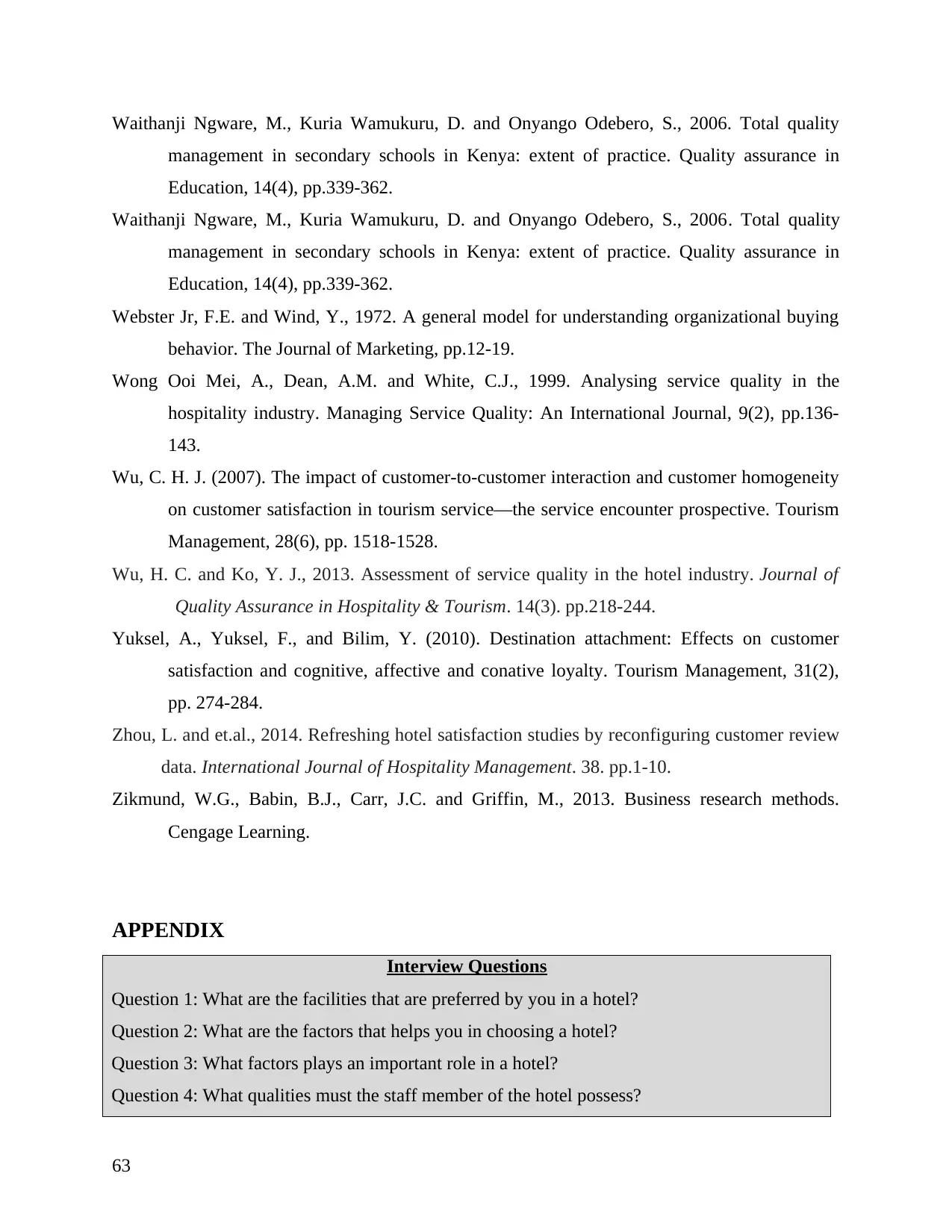
Waithanji Ngware, M., Kuria Wamukuru, D. and Onyango Odebero, S., 2006. Total quality
management in secondary schools in Kenya: extent of practice. Quality assurance in
Education, 14(4), pp.339-362.
Waithanji Ngware, M., Kuria Wamukuru, D. and Onyango Odebero, S., 2006. Total quality
management in secondary schools in Kenya: extent of practice. Quality assurance in
Education, 14(4), pp.339-362.
Webster Jr, F.E. and Wind, Y., 1972. A general model for understanding organizational buying
behavior. The Journal of Marketing, pp.12-19.
Wong Ooi Mei, A., Dean, A.M. and White, C.J., 1999. Analysing service quality in the
hospitality industry. Managing Service Quality: An International Journal, 9(2), pp.136-
143.
Wu, C. H. J. (2007). The impact of customer-to-customer interaction and customer homogeneity
on customer satisfaction in tourism service—the service encounter prospective. Tourism
Management, 28(6), pp. 1518-1528.
Wu, H. C. and Ko, Y. J., 2013. Assessment of service quality in the hotel industry. Journal of
Quality Assurance in Hospitality & Tourism. 14(3). pp.218-244.
Yuksel, A., Yuksel, F., and Bilim, Y. (2010). Destination attachment: Effects on customer
satisfaction and cognitive, affective and conative loyalty. Tourism Management, 31(2),
pp. 274-284.
Zhou, L. and et.al., 2014. Refreshing hotel satisfaction studies by reconfiguring customer review
data. International Journal of Hospitality Management. 38. pp.1-10.
Zikmund, W.G., Babin, B.J., Carr, J.C. and Griffin, M., 2013. Business research methods.
Cengage Learning.
APPENDIX
Interview Questions
Question 1: What are the facilities that are preferred by you in a hotel?
Question 2: What are the factors that helps you in choosing a hotel?
Question 3: What factors plays an important role in a hotel?
Question 4: What qualities must the staff member of the hotel possess?
63
management in secondary schools in Kenya: extent of practice. Quality assurance in
Education, 14(4), pp.339-362.
Waithanji Ngware, M., Kuria Wamukuru, D. and Onyango Odebero, S., 2006. Total quality
management in secondary schools in Kenya: extent of practice. Quality assurance in
Education, 14(4), pp.339-362.
Webster Jr, F.E. and Wind, Y., 1972. A general model for understanding organizational buying
behavior. The Journal of Marketing, pp.12-19.
Wong Ooi Mei, A., Dean, A.M. and White, C.J., 1999. Analysing service quality in the
hospitality industry. Managing Service Quality: An International Journal, 9(2), pp.136-
143.
Wu, C. H. J. (2007). The impact of customer-to-customer interaction and customer homogeneity
on customer satisfaction in tourism service—the service encounter prospective. Tourism
Management, 28(6), pp. 1518-1528.
Wu, H. C. and Ko, Y. J., 2013. Assessment of service quality in the hotel industry. Journal of
Quality Assurance in Hospitality & Tourism. 14(3). pp.218-244.
Yuksel, A., Yuksel, F., and Bilim, Y. (2010). Destination attachment: Effects on customer
satisfaction and cognitive, affective and conative loyalty. Tourism Management, 31(2),
pp. 274-284.
Zhou, L. and et.al., 2014. Refreshing hotel satisfaction studies by reconfiguring customer review
data. International Journal of Hospitality Management. 38. pp.1-10.
Zikmund, W.G., Babin, B.J., Carr, J.C. and Griffin, M., 2013. Business research methods.
Cengage Learning.
APPENDIX
Interview Questions
Question 1: What are the facilities that are preferred by you in a hotel?
Question 2: What are the factors that helps you in choosing a hotel?
Question 3: What factors plays an important role in a hotel?
Question 4: What qualities must the staff member of the hotel possess?
63
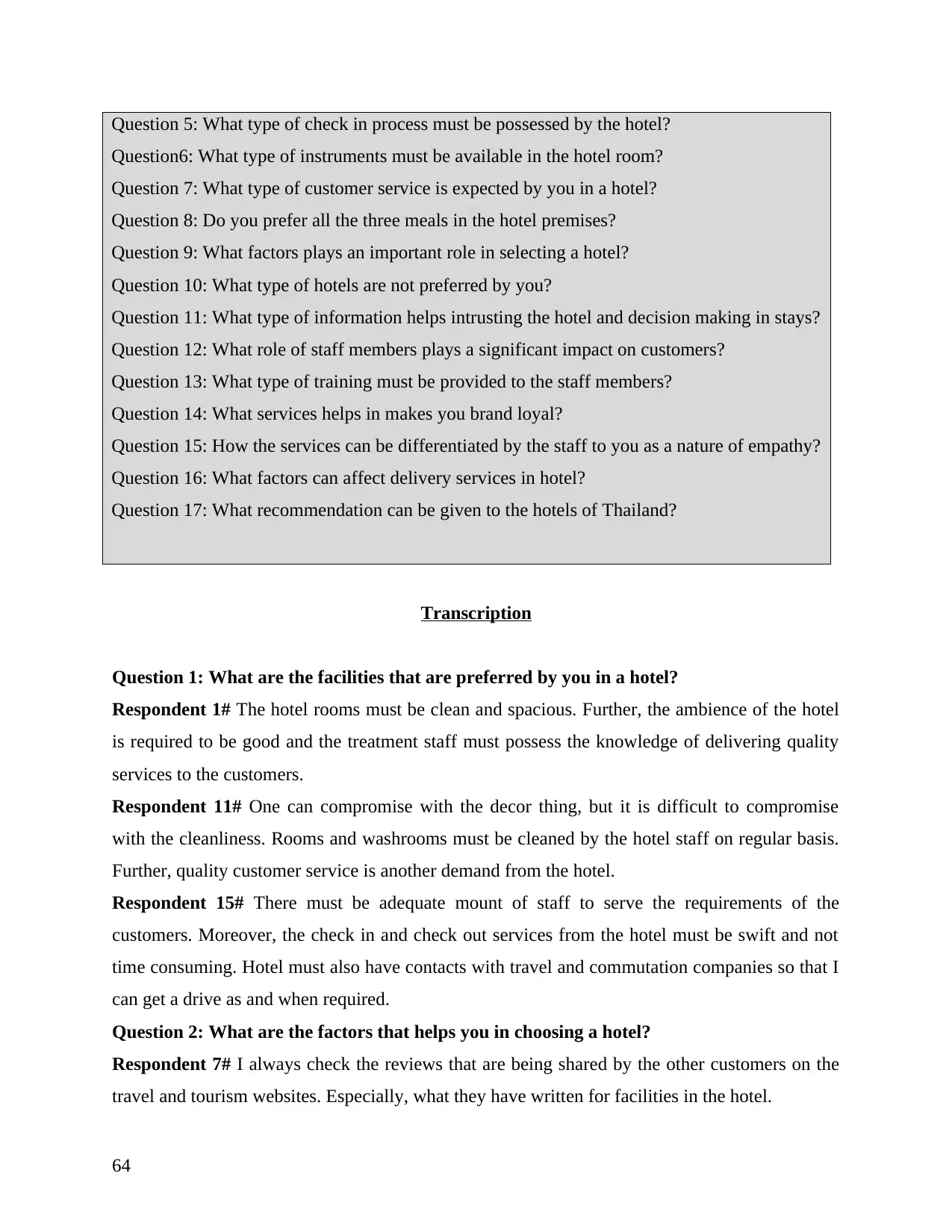
Question 5: What type of check in process must be possessed by the hotel?
Question6: What type of instruments must be available in the hotel room?
Question 7: What type of customer service is expected by you in a hotel?
Question 8: Do you prefer all the three meals in the hotel premises?
Question 9: What factors plays an important role in selecting a hotel?
Question 10: What type of hotels are not preferred by you?
Question 11: What type of information helps intrusting the hotel and decision making in stays?
Question 12: What role of staff members plays a significant impact on customers?
Question 13: What type of training must be provided to the staff members?
Question 14: What services helps in makes you brand loyal?
Question 15: How the services can be differentiated by the staff to you as a nature of empathy?
Question 16: What factors can affect delivery services in hotel?
Question 17: What recommendation can be given to the hotels of Thailand?
Transcription
Question 1: What are the facilities that are preferred by you in a hotel?
Respondent 1# The hotel rooms must be clean and spacious. Further, the ambience of the hotel
is required to be good and the treatment staff must possess the knowledge of delivering quality
services to the customers.
Respondent 11# One can compromise with the decor thing, but it is difficult to compromise
with the cleanliness. Rooms and washrooms must be cleaned by the hotel staff on regular basis.
Further, quality customer service is another demand from the hotel.
Respondent 15# There must be adequate mount of staff to serve the requirements of the
customers. Moreover, the check in and check out services from the hotel must be swift and not
time consuming. Hotel must also have contacts with travel and commutation companies so that I
can get a drive as and when required.
Question 2: What are the factors that helps you in choosing a hotel?
Respondent 7# I always check the reviews that are being shared by the other customers on the
travel and tourism websites. Especially, what they have written for facilities in the hotel.
64
Question6: What type of instruments must be available in the hotel room?
Question 7: What type of customer service is expected by you in a hotel?
Question 8: Do you prefer all the three meals in the hotel premises?
Question 9: What factors plays an important role in selecting a hotel?
Question 10: What type of hotels are not preferred by you?
Question 11: What type of information helps intrusting the hotel and decision making in stays?
Question 12: What role of staff members plays a significant impact on customers?
Question 13: What type of training must be provided to the staff members?
Question 14: What services helps in makes you brand loyal?
Question 15: How the services can be differentiated by the staff to you as a nature of empathy?
Question 16: What factors can affect delivery services in hotel?
Question 17: What recommendation can be given to the hotels of Thailand?
Transcription
Question 1: What are the facilities that are preferred by you in a hotel?
Respondent 1# The hotel rooms must be clean and spacious. Further, the ambience of the hotel
is required to be good and the treatment staff must possess the knowledge of delivering quality
services to the customers.
Respondent 11# One can compromise with the decor thing, but it is difficult to compromise
with the cleanliness. Rooms and washrooms must be cleaned by the hotel staff on regular basis.
Further, quality customer service is another demand from the hotel.
Respondent 15# There must be adequate mount of staff to serve the requirements of the
customers. Moreover, the check in and check out services from the hotel must be swift and not
time consuming. Hotel must also have contacts with travel and commutation companies so that I
can get a drive as and when required.
Question 2: What are the factors that helps you in choosing a hotel?
Respondent 7# I always check the reviews that are being shared by the other customers on the
travel and tourism websites. Especially, what they have written for facilities in the hotel.
64
Secure Best Marks with AI Grader
Need help grading? Try our AI Grader for instant feedback on your assignments.
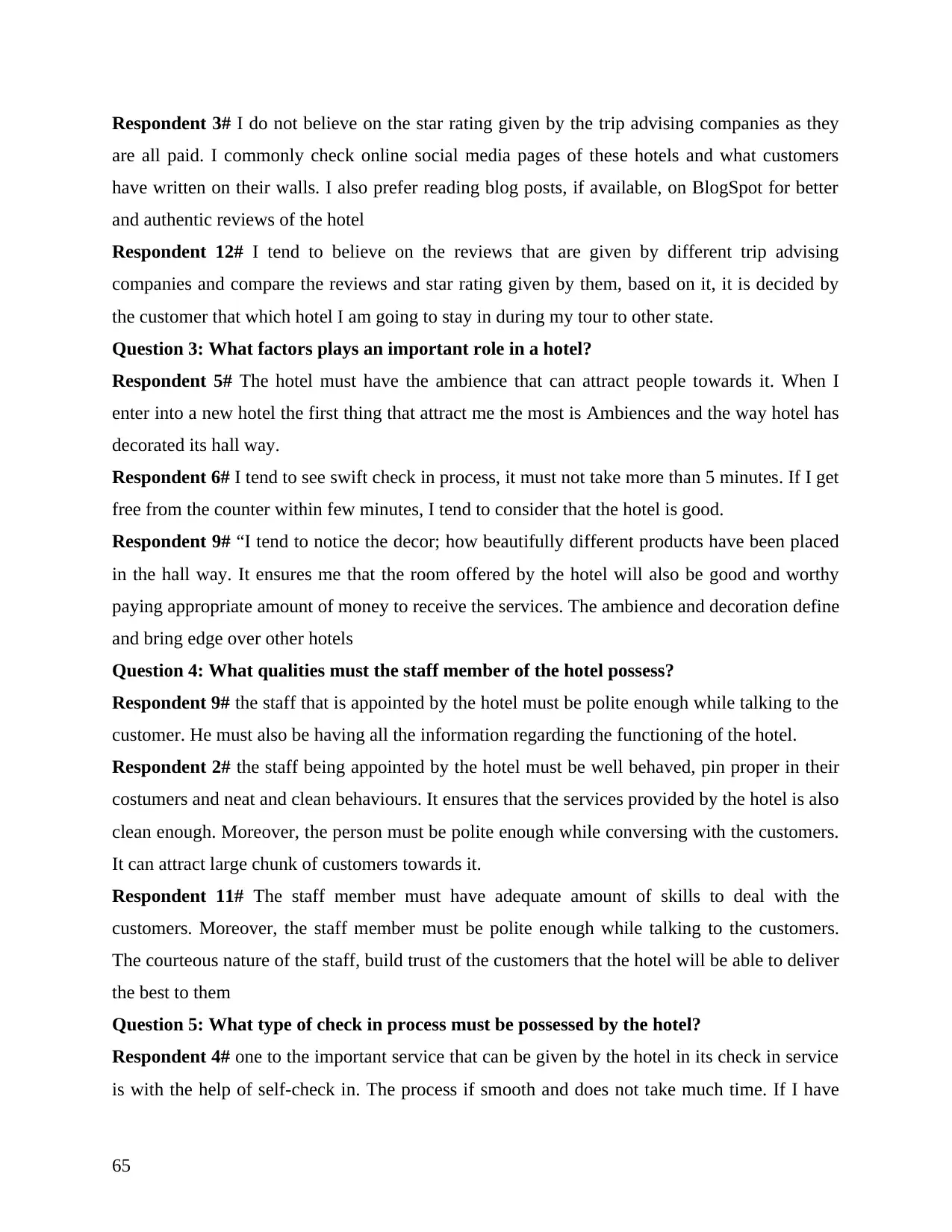
Respondent 3# I do not believe on the star rating given by the trip advising companies as they
are all paid. I commonly check online social media pages of these hotels and what customers
have written on their walls. I also prefer reading blog posts, if available, on BlogSpot for better
and authentic reviews of the hotel
Respondent 12# I tend to believe on the reviews that are given by different trip advising
companies and compare the reviews and star rating given by them, based on it, it is decided by
the customer that which hotel I am going to stay in during my tour to other state.
Question 3: What factors plays an important role in a hotel?
Respondent 5# The hotel must have the ambience that can attract people towards it. When I
enter into a new hotel the first thing that attract me the most is Ambiences and the way hotel has
decorated its hall way.
Respondent 6# I tend to see swift check in process, it must not take more than 5 minutes. If I get
free from the counter within few minutes, I tend to consider that the hotel is good.
Respondent 9# “I tend to notice the decor; how beautifully different products have been placed
in the hall way. It ensures me that the room offered by the hotel will also be good and worthy
paying appropriate amount of money to receive the services. The ambience and decoration define
and bring edge over other hotels
Question 4: What qualities must the staff member of the hotel possess?
Respondent 9# the staff that is appointed by the hotel must be polite enough while talking to the
customer. He must also be having all the information regarding the functioning of the hotel.
Respondent 2# the staff being appointed by the hotel must be well behaved, pin proper in their
costumers and neat and clean behaviours. It ensures that the services provided by the hotel is also
clean enough. Moreover, the person must be polite enough while conversing with the customers.
It can attract large chunk of customers towards it.
Respondent 11# The staff member must have adequate amount of skills to deal with the
customers. Moreover, the staff member must be polite enough while talking to the customers.
The courteous nature of the staff, build trust of the customers that the hotel will be able to deliver
the best to them
Question 5: What type of check in process must be possessed by the hotel?
Respondent 4# one to the important service that can be given by the hotel in its check in service
is with the help of self-check in. The process if smooth and does not take much time. If I have
65
are all paid. I commonly check online social media pages of these hotels and what customers
have written on their walls. I also prefer reading blog posts, if available, on BlogSpot for better
and authentic reviews of the hotel
Respondent 12# I tend to believe on the reviews that are given by different trip advising
companies and compare the reviews and star rating given by them, based on it, it is decided by
the customer that which hotel I am going to stay in during my tour to other state.
Question 3: What factors plays an important role in a hotel?
Respondent 5# The hotel must have the ambience that can attract people towards it. When I
enter into a new hotel the first thing that attract me the most is Ambiences and the way hotel has
decorated its hall way.
Respondent 6# I tend to see swift check in process, it must not take more than 5 minutes. If I get
free from the counter within few minutes, I tend to consider that the hotel is good.
Respondent 9# “I tend to notice the decor; how beautifully different products have been placed
in the hall way. It ensures me that the room offered by the hotel will also be good and worthy
paying appropriate amount of money to receive the services. The ambience and decoration define
and bring edge over other hotels
Question 4: What qualities must the staff member of the hotel possess?
Respondent 9# the staff that is appointed by the hotel must be polite enough while talking to the
customer. He must also be having all the information regarding the functioning of the hotel.
Respondent 2# the staff being appointed by the hotel must be well behaved, pin proper in their
costumers and neat and clean behaviours. It ensures that the services provided by the hotel is also
clean enough. Moreover, the person must be polite enough while conversing with the customers.
It can attract large chunk of customers towards it.
Respondent 11# The staff member must have adequate amount of skills to deal with the
customers. Moreover, the staff member must be polite enough while talking to the customers.
The courteous nature of the staff, build trust of the customers that the hotel will be able to deliver
the best to them
Question 5: What type of check in process must be possessed by the hotel?
Respondent 4# one to the important service that can be given by the hotel in its check in service
is with the help of self-check in. The process if smooth and does not take much time. If I have
65
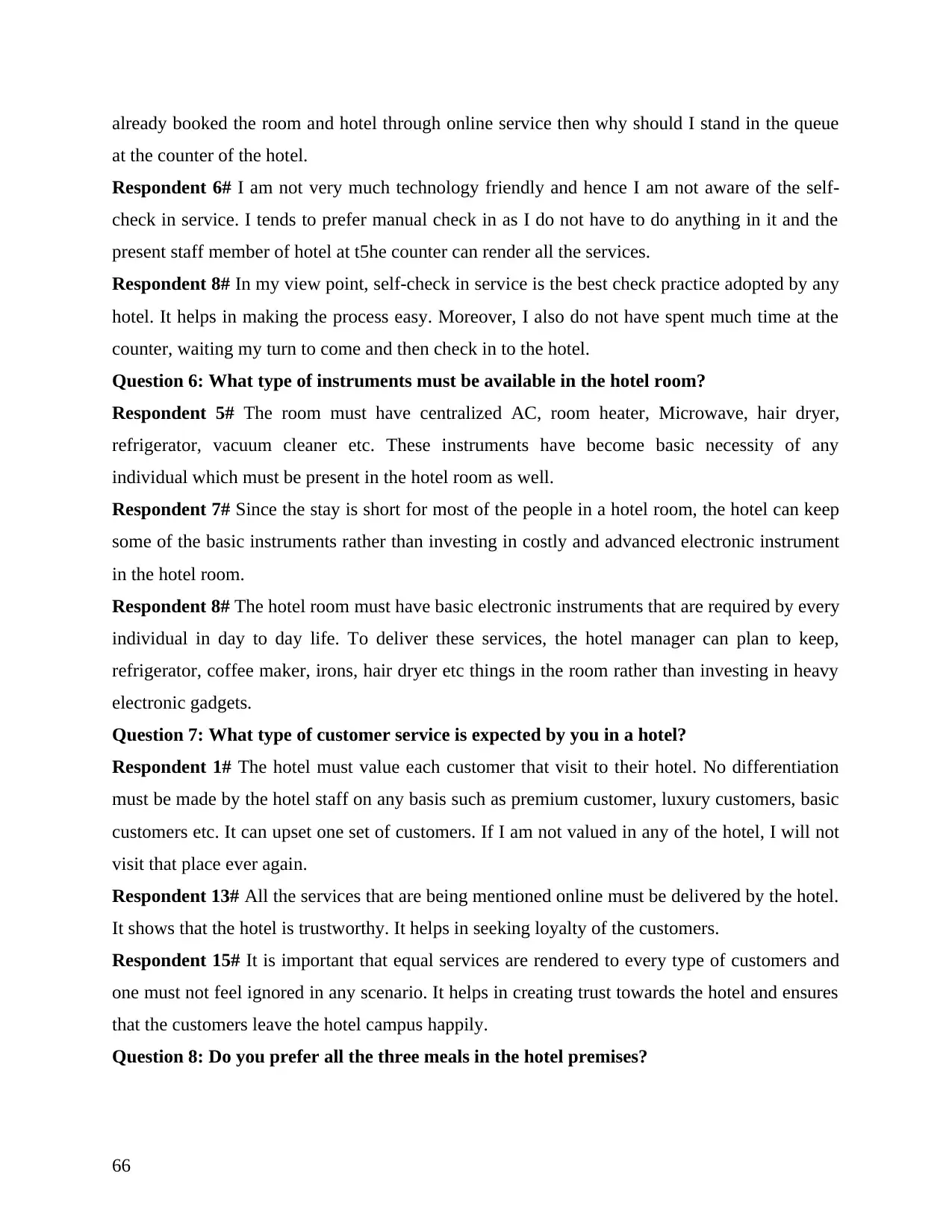
already booked the room and hotel through online service then why should I stand in the queue
at the counter of the hotel.
Respondent 6# I am not very much technology friendly and hence I am not aware of the self-
check in service. I tends to prefer manual check in as I do not have to do anything in it and the
present staff member of hotel at t5he counter can render all the services.
Respondent 8# In my view point, self-check in service is the best check practice adopted by any
hotel. It helps in making the process easy. Moreover, I also do not have spent much time at the
counter, waiting my turn to come and then check in to the hotel.
Question 6: What type of instruments must be available in the hotel room?
Respondent 5# The room must have centralized AC, room heater, Microwave, hair dryer,
refrigerator, vacuum cleaner etc. These instruments have become basic necessity of any
individual which must be present in the hotel room as well.
Respondent 7# Since the stay is short for most of the people in a hotel room, the hotel can keep
some of the basic instruments rather than investing in costly and advanced electronic instrument
in the hotel room.
Respondent 8# The hotel room must have basic electronic instruments that are required by every
individual in day to day life. To deliver these services, the hotel manager can plan to keep,
refrigerator, coffee maker, irons, hair dryer etc things in the room rather than investing in heavy
electronic gadgets.
Question 7: What type of customer service is expected by you in a hotel?
Respondent 1# The hotel must value each customer that visit to their hotel. No differentiation
must be made by the hotel staff on any basis such as premium customer, luxury customers, basic
customers etc. It can upset one set of customers. If I am not valued in any of the hotel, I will not
visit that place ever again.
Respondent 13# All the services that are being mentioned online must be delivered by the hotel.
It shows that the hotel is trustworthy. It helps in seeking loyalty of the customers.
Respondent 15# It is important that equal services are rendered to every type of customers and
one must not feel ignored in any scenario. It helps in creating trust towards the hotel and ensures
that the customers leave the hotel campus happily.
Question 8: Do you prefer all the three meals in the hotel premises?
66
at the counter of the hotel.
Respondent 6# I am not very much technology friendly and hence I am not aware of the self-
check in service. I tends to prefer manual check in as I do not have to do anything in it and the
present staff member of hotel at t5he counter can render all the services.
Respondent 8# In my view point, self-check in service is the best check practice adopted by any
hotel. It helps in making the process easy. Moreover, I also do not have spent much time at the
counter, waiting my turn to come and then check in to the hotel.
Question 6: What type of instruments must be available in the hotel room?
Respondent 5# The room must have centralized AC, room heater, Microwave, hair dryer,
refrigerator, vacuum cleaner etc. These instruments have become basic necessity of any
individual which must be present in the hotel room as well.
Respondent 7# Since the stay is short for most of the people in a hotel room, the hotel can keep
some of the basic instruments rather than investing in costly and advanced electronic instrument
in the hotel room.
Respondent 8# The hotel room must have basic electronic instruments that are required by every
individual in day to day life. To deliver these services, the hotel manager can plan to keep,
refrigerator, coffee maker, irons, hair dryer etc things in the room rather than investing in heavy
electronic gadgets.
Question 7: What type of customer service is expected by you in a hotel?
Respondent 1# The hotel must value each customer that visit to their hotel. No differentiation
must be made by the hotel staff on any basis such as premium customer, luxury customers, basic
customers etc. It can upset one set of customers. If I am not valued in any of the hotel, I will not
visit that place ever again.
Respondent 13# All the services that are being mentioned online must be delivered by the hotel.
It shows that the hotel is trustworthy. It helps in seeking loyalty of the customers.
Respondent 15# It is important that equal services are rendered to every type of customers and
one must not feel ignored in any scenario. It helps in creating trust towards the hotel and ensures
that the customers leave the hotel campus happily.
Question 8: Do you prefer all the three meals in the hotel premises?
66
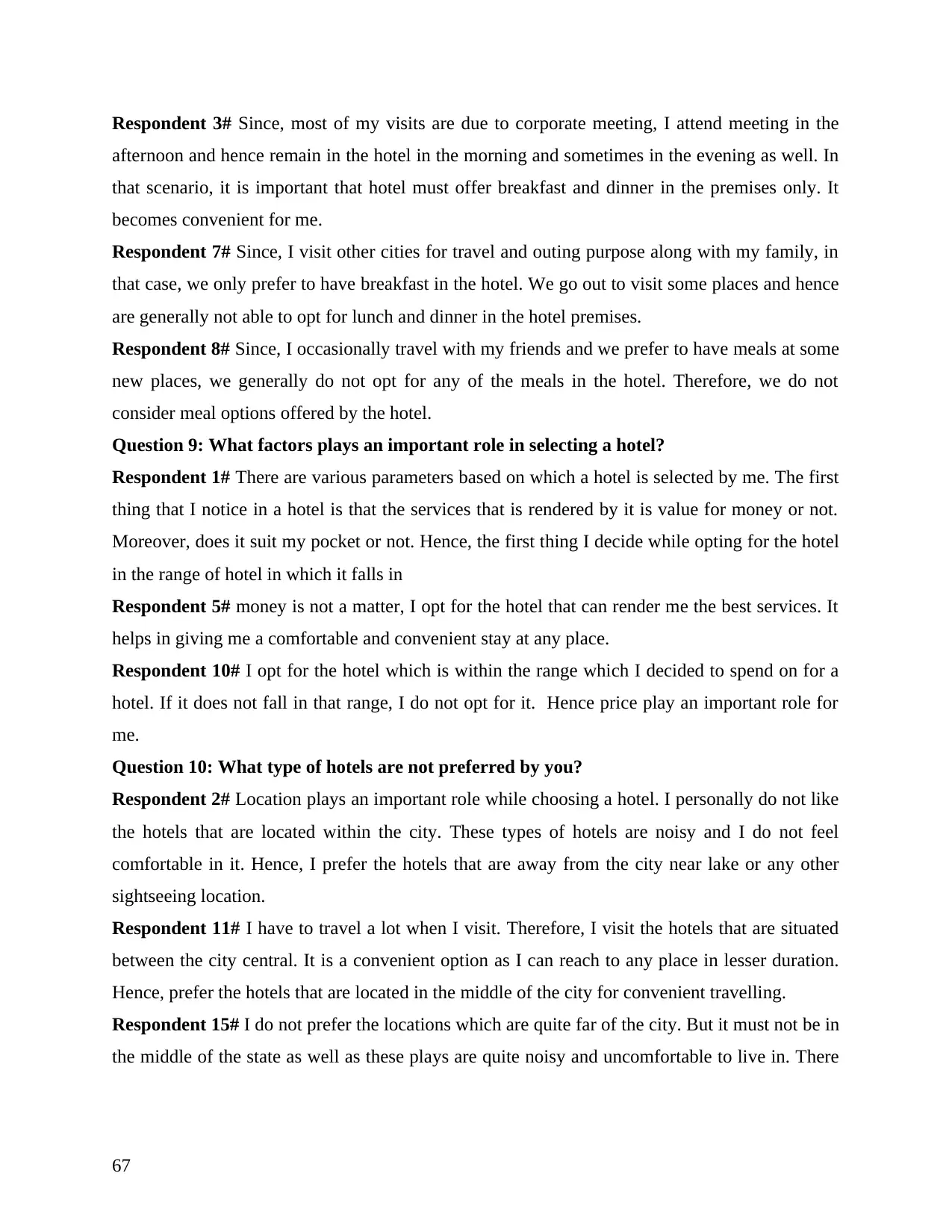
Respondent 3# Since, most of my visits are due to corporate meeting, I attend meeting in the
afternoon and hence remain in the hotel in the morning and sometimes in the evening as well. In
that scenario, it is important that hotel must offer breakfast and dinner in the premises only. It
becomes convenient for me.
Respondent 7# Since, I visit other cities for travel and outing purpose along with my family, in
that case, we only prefer to have breakfast in the hotel. We go out to visit some places and hence
are generally not able to opt for lunch and dinner in the hotel premises.
Respondent 8# Since, I occasionally travel with my friends and we prefer to have meals at some
new places, we generally do not opt for any of the meals in the hotel. Therefore, we do not
consider meal options offered by the hotel.
Question 9: What factors plays an important role in selecting a hotel?
Respondent 1# There are various parameters based on which a hotel is selected by me. The first
thing that I notice in a hotel is that the services that is rendered by it is value for money or not.
Moreover, does it suit my pocket or not. Hence, the first thing I decide while opting for the hotel
in the range of hotel in which it falls in
Respondent 5# money is not a matter, I opt for the hotel that can render me the best services. It
helps in giving me a comfortable and convenient stay at any place.
Respondent 10# I opt for the hotel which is within the range which I decided to spend on for a
hotel. If it does not fall in that range, I do not opt for it. Hence price play an important role for
me.
Question 10: What type of hotels are not preferred by you?
Respondent 2# Location plays an important role while choosing a hotel. I personally do not like
the hotels that are located within the city. These types of hotels are noisy and I do not feel
comfortable in it. Hence, I prefer the hotels that are away from the city near lake or any other
sightseeing location.
Respondent 11# I have to travel a lot when I visit. Therefore, I visit the hotels that are situated
between the city central. It is a convenient option as I can reach to any place in lesser duration.
Hence, prefer the hotels that are located in the middle of the city for convenient travelling.
Respondent 15# I do not prefer the locations which are quite far of the city. But it must not be in
the middle of the state as well as these plays are quite noisy and uncomfortable to live in. There
67
afternoon and hence remain in the hotel in the morning and sometimes in the evening as well. In
that scenario, it is important that hotel must offer breakfast and dinner in the premises only. It
becomes convenient for me.
Respondent 7# Since, I visit other cities for travel and outing purpose along with my family, in
that case, we only prefer to have breakfast in the hotel. We go out to visit some places and hence
are generally not able to opt for lunch and dinner in the hotel premises.
Respondent 8# Since, I occasionally travel with my friends and we prefer to have meals at some
new places, we generally do not opt for any of the meals in the hotel. Therefore, we do not
consider meal options offered by the hotel.
Question 9: What factors plays an important role in selecting a hotel?
Respondent 1# There are various parameters based on which a hotel is selected by me. The first
thing that I notice in a hotel is that the services that is rendered by it is value for money or not.
Moreover, does it suit my pocket or not. Hence, the first thing I decide while opting for the hotel
in the range of hotel in which it falls in
Respondent 5# money is not a matter, I opt for the hotel that can render me the best services. It
helps in giving me a comfortable and convenient stay at any place.
Respondent 10# I opt for the hotel which is within the range which I decided to spend on for a
hotel. If it does not fall in that range, I do not opt for it. Hence price play an important role for
me.
Question 10: What type of hotels are not preferred by you?
Respondent 2# Location plays an important role while choosing a hotel. I personally do not like
the hotels that are located within the city. These types of hotels are noisy and I do not feel
comfortable in it. Hence, I prefer the hotels that are away from the city near lake or any other
sightseeing location.
Respondent 11# I have to travel a lot when I visit. Therefore, I visit the hotels that are situated
between the city central. It is a convenient option as I can reach to any place in lesser duration.
Hence, prefer the hotels that are located in the middle of the city for convenient travelling.
Respondent 15# I do not prefer the locations which are quite far of the city. But it must not be in
the middle of the state as well as these plays are quite noisy and uncomfortable to live in. There
67
Paraphrase This Document
Need a fresh take? Get an instant paraphrase of this document with our AI Paraphraser
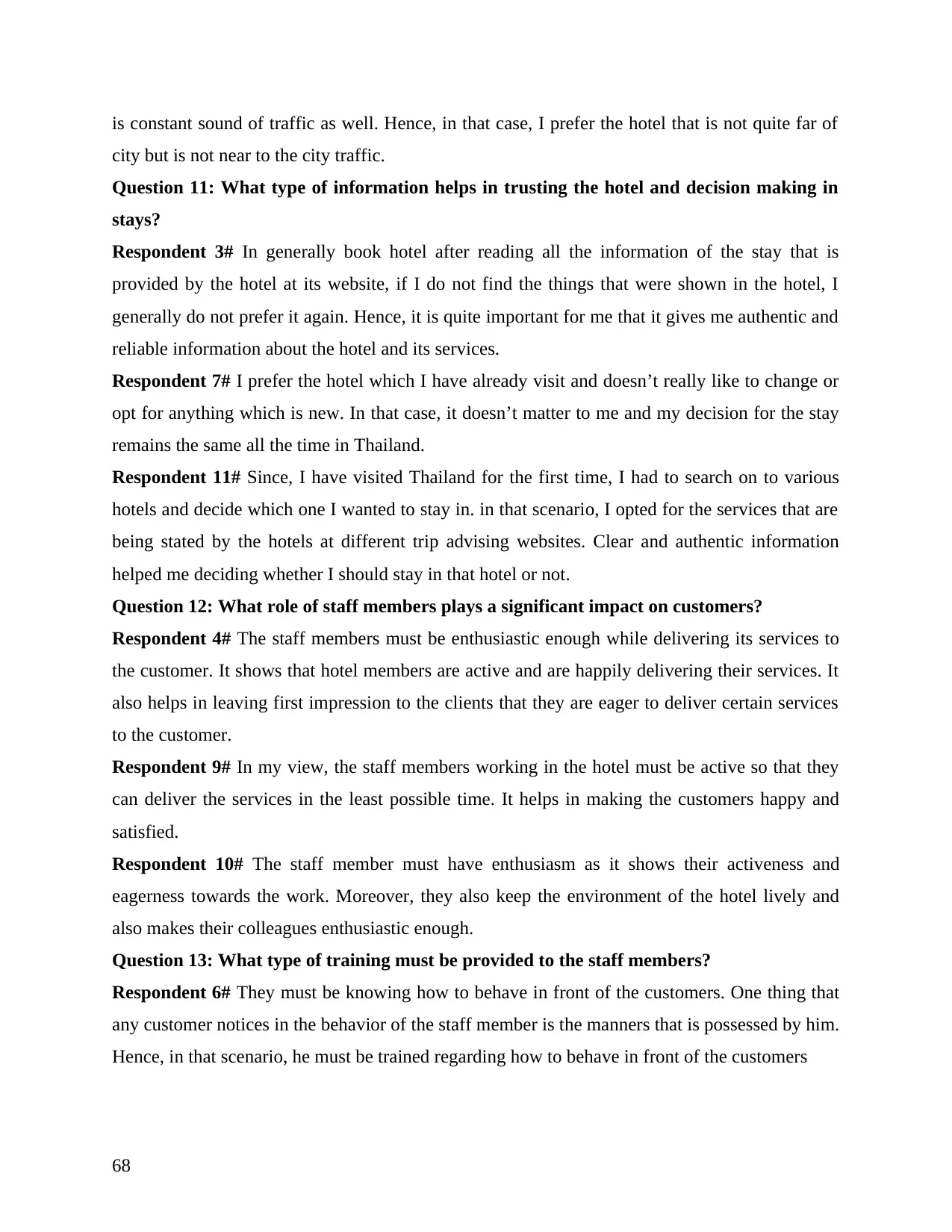
is constant sound of traffic as well. Hence, in that case, I prefer the hotel that is not quite far of
city but is not near to the city traffic.
Question 11: What type of information helps in trusting the hotel and decision making in
stays?
Respondent 3# In generally book hotel after reading all the information of the stay that is
provided by the hotel at its website, if I do not find the things that were shown in the hotel, I
generally do not prefer it again. Hence, it is quite important for me that it gives me authentic and
reliable information about the hotel and its services.
Respondent 7# I prefer the hotel which I have already visit and doesn’t really like to change or
opt for anything which is new. In that case, it doesn’t matter to me and my decision for the stay
remains the same all the time in Thailand.
Respondent 11# Since, I have visited Thailand for the first time, I had to search on to various
hotels and decide which one I wanted to stay in. in that scenario, I opted for the services that are
being stated by the hotels at different trip advising websites. Clear and authentic information
helped me deciding whether I should stay in that hotel or not.
Question 12: What role of staff members plays a significant impact on customers?
Respondent 4# The staff members must be enthusiastic enough while delivering its services to
the customer. It shows that hotel members are active and are happily delivering their services. It
also helps in leaving first impression to the clients that they are eager to deliver certain services
to the customer.
Respondent 9# In my view, the staff members working in the hotel must be active so that they
can deliver the services in the least possible time. It helps in making the customers happy and
satisfied.
Respondent 10# The staff member must have enthusiasm as it shows their activeness and
eagerness towards the work. Moreover, they also keep the environment of the hotel lively and
also makes their colleagues enthusiastic enough.
Question 13: What type of training must be provided to the staff members?
Respondent 6# They must be knowing how to behave in front of the customers. One thing that
any customer notices in the behavior of the staff member is the manners that is possessed by him.
Hence, in that scenario, he must be trained regarding how to behave in front of the customers
68
city but is not near to the city traffic.
Question 11: What type of information helps in trusting the hotel and decision making in
stays?
Respondent 3# In generally book hotel after reading all the information of the stay that is
provided by the hotel at its website, if I do not find the things that were shown in the hotel, I
generally do not prefer it again. Hence, it is quite important for me that it gives me authentic and
reliable information about the hotel and its services.
Respondent 7# I prefer the hotel which I have already visit and doesn’t really like to change or
opt for anything which is new. In that case, it doesn’t matter to me and my decision for the stay
remains the same all the time in Thailand.
Respondent 11# Since, I have visited Thailand for the first time, I had to search on to various
hotels and decide which one I wanted to stay in. in that scenario, I opted for the services that are
being stated by the hotels at different trip advising websites. Clear and authentic information
helped me deciding whether I should stay in that hotel or not.
Question 12: What role of staff members plays a significant impact on customers?
Respondent 4# The staff members must be enthusiastic enough while delivering its services to
the customer. It shows that hotel members are active and are happily delivering their services. It
also helps in leaving first impression to the clients that they are eager to deliver certain services
to the customer.
Respondent 9# In my view, the staff members working in the hotel must be active so that they
can deliver the services in the least possible time. It helps in making the customers happy and
satisfied.
Respondent 10# The staff member must have enthusiasm as it shows their activeness and
eagerness towards the work. Moreover, they also keep the environment of the hotel lively and
also makes their colleagues enthusiastic enough.
Question 13: What type of training must be provided to the staff members?
Respondent 6# They must be knowing how to behave in front of the customers. One thing that
any customer notices in the behavior of the staff member is the manners that is possessed by him.
Hence, in that scenario, he must be trained regarding how to behave in front of the customers
68
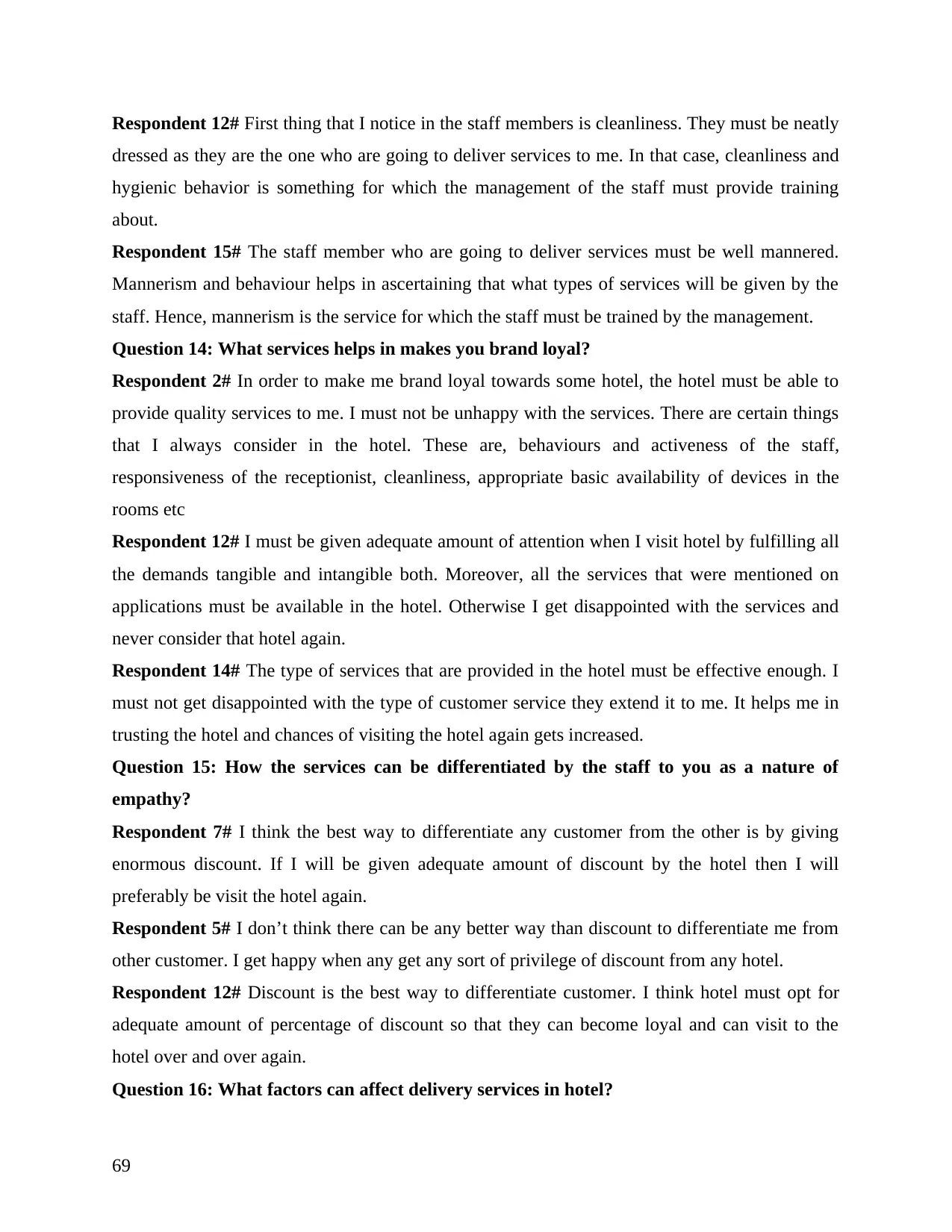
Respondent 12# First thing that I notice in the staff members is cleanliness. They must be neatly
dressed as they are the one who are going to deliver services to me. In that case, cleanliness and
hygienic behavior is something for which the management of the staff must provide training
about.
Respondent 15# The staff member who are going to deliver services must be well mannered.
Mannerism and behaviour helps in ascertaining that what types of services will be given by the
staff. Hence, mannerism is the service for which the staff must be trained by the management.
Question 14: What services helps in makes you brand loyal?
Respondent 2# In order to make me brand loyal towards some hotel, the hotel must be able to
provide quality services to me. I must not be unhappy with the services. There are certain things
that I always consider in the hotel. These are, behaviours and activeness of the staff,
responsiveness of the receptionist, cleanliness, appropriate basic availability of devices in the
rooms etc
Respondent 12# I must be given adequate amount of attention when I visit hotel by fulfilling all
the demands tangible and intangible both. Moreover, all the services that were mentioned on
applications must be available in the hotel. Otherwise I get disappointed with the services and
never consider that hotel again.
Respondent 14# The type of services that are provided in the hotel must be effective enough. I
must not get disappointed with the type of customer service they extend it to me. It helps me in
trusting the hotel and chances of visiting the hotel again gets increased.
Question 15: How the services can be differentiated by the staff to you as a nature of
empathy?
Respondent 7# I think the best way to differentiate any customer from the other is by giving
enormous discount. If I will be given adequate amount of discount by the hotel then I will
preferably be visit the hotel again.
Respondent 5# I don’t think there can be any better way than discount to differentiate me from
other customer. I get happy when any get any sort of privilege of discount from any hotel.
Respondent 12# Discount is the best way to differentiate customer. I think hotel must opt for
adequate amount of percentage of discount so that they can become loyal and can visit to the
hotel over and over again.
Question 16: What factors can affect delivery services in hotel?
69
dressed as they are the one who are going to deliver services to me. In that case, cleanliness and
hygienic behavior is something for which the management of the staff must provide training
about.
Respondent 15# The staff member who are going to deliver services must be well mannered.
Mannerism and behaviour helps in ascertaining that what types of services will be given by the
staff. Hence, mannerism is the service for which the staff must be trained by the management.
Question 14: What services helps in makes you brand loyal?
Respondent 2# In order to make me brand loyal towards some hotel, the hotel must be able to
provide quality services to me. I must not be unhappy with the services. There are certain things
that I always consider in the hotel. These are, behaviours and activeness of the staff,
responsiveness of the receptionist, cleanliness, appropriate basic availability of devices in the
rooms etc
Respondent 12# I must be given adequate amount of attention when I visit hotel by fulfilling all
the demands tangible and intangible both. Moreover, all the services that were mentioned on
applications must be available in the hotel. Otherwise I get disappointed with the services and
never consider that hotel again.
Respondent 14# The type of services that are provided in the hotel must be effective enough. I
must not get disappointed with the type of customer service they extend it to me. It helps me in
trusting the hotel and chances of visiting the hotel again gets increased.
Question 15: How the services can be differentiated by the staff to you as a nature of
empathy?
Respondent 7# I think the best way to differentiate any customer from the other is by giving
enormous discount. If I will be given adequate amount of discount by the hotel then I will
preferably be visit the hotel again.
Respondent 5# I don’t think there can be any better way than discount to differentiate me from
other customer. I get happy when any get any sort of privilege of discount from any hotel.
Respondent 12# Discount is the best way to differentiate customer. I think hotel must opt for
adequate amount of percentage of discount so that they can become loyal and can visit to the
hotel over and over again.
Question 16: What factors can affect delivery services in hotel?
69
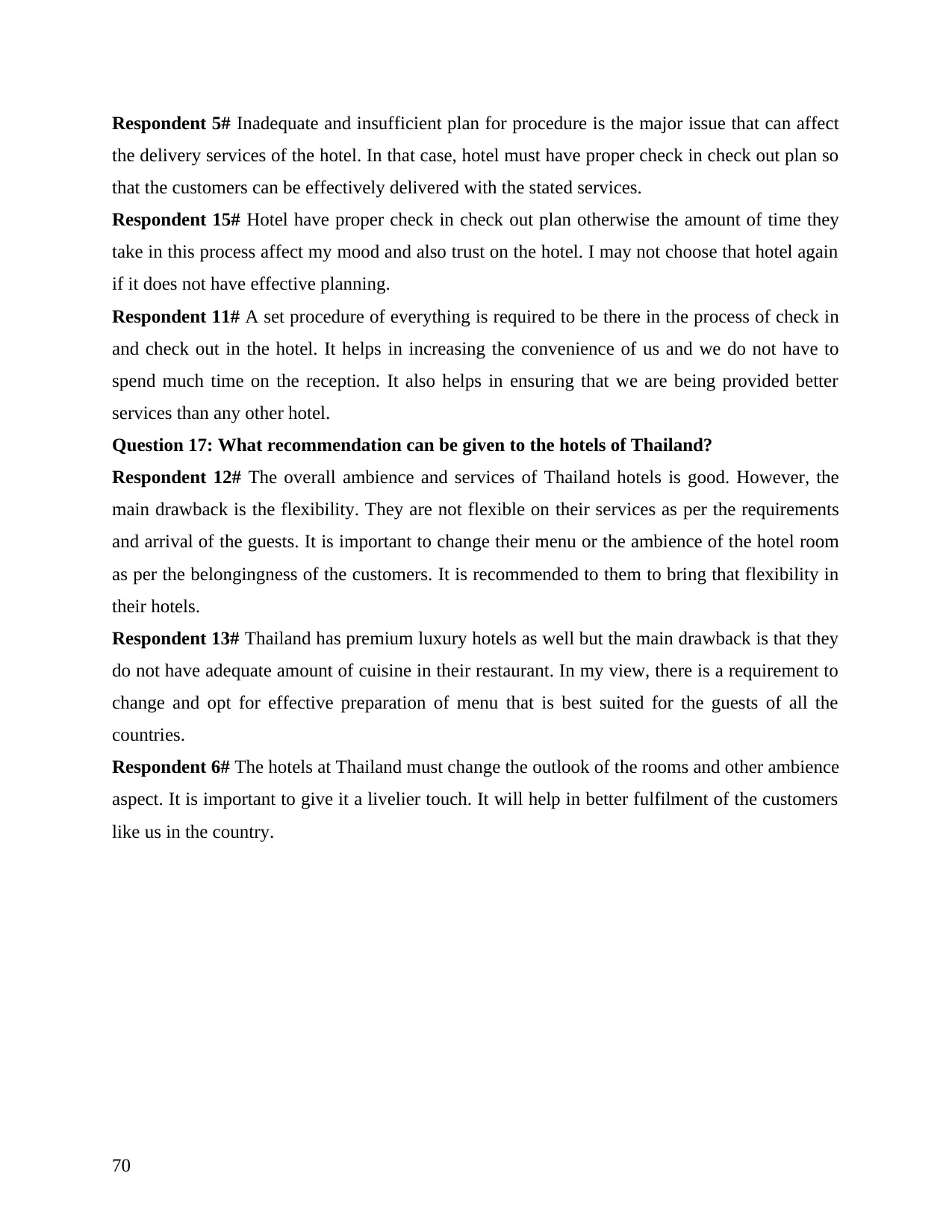
Respondent 5# Inadequate and insufficient plan for procedure is the major issue that can affect
the delivery services of the hotel. In that case, hotel must have proper check in check out plan so
that the customers can be effectively delivered with the stated services.
Respondent 15# Hotel have proper check in check out plan otherwise the amount of time they
take in this process affect my mood and also trust on the hotel. I may not choose that hotel again
if it does not have effective planning.
Respondent 11# A set procedure of everything is required to be there in the process of check in
and check out in the hotel. It helps in increasing the convenience of us and we do not have to
spend much time on the reception. It also helps in ensuring that we are being provided better
services than any other hotel.
Question 17: What recommendation can be given to the hotels of Thailand?
Respondent 12# The overall ambience and services of Thailand hotels is good. However, the
main drawback is the flexibility. They are not flexible on their services as per the requirements
and arrival of the guests. It is important to change their menu or the ambience of the hotel room
as per the belongingness of the customers. It is recommended to them to bring that flexibility in
their hotels.
Respondent 13# Thailand has premium luxury hotels as well but the main drawback is that they
do not have adequate amount of cuisine in their restaurant. In my view, there is a requirement to
change and opt for effective preparation of menu that is best suited for the guests of all the
countries.
Respondent 6# The hotels at Thailand must change the outlook of the rooms and other ambience
aspect. It is important to give it a livelier touch. It will help in better fulfilment of the customers
like us in the country.
70
the delivery services of the hotel. In that case, hotel must have proper check in check out plan so
that the customers can be effectively delivered with the stated services.
Respondent 15# Hotel have proper check in check out plan otherwise the amount of time they
take in this process affect my mood and also trust on the hotel. I may not choose that hotel again
if it does not have effective planning.
Respondent 11# A set procedure of everything is required to be there in the process of check in
and check out in the hotel. It helps in increasing the convenience of us and we do not have to
spend much time on the reception. It also helps in ensuring that we are being provided better
services than any other hotel.
Question 17: What recommendation can be given to the hotels of Thailand?
Respondent 12# The overall ambience and services of Thailand hotels is good. However, the
main drawback is the flexibility. They are not flexible on their services as per the requirements
and arrival of the guests. It is important to change their menu or the ambience of the hotel room
as per the belongingness of the customers. It is recommended to them to bring that flexibility in
their hotels.
Respondent 13# Thailand has premium luxury hotels as well but the main drawback is that they
do not have adequate amount of cuisine in their restaurant. In my view, there is a requirement to
change and opt for effective preparation of menu that is best suited for the guests of all the
countries.
Respondent 6# The hotels at Thailand must change the outlook of the rooms and other ambience
aspect. It is important to give it a livelier touch. It will help in better fulfilment of the customers
like us in the country.
70
Secure Best Marks with AI Grader
Need help grading? Try our AI Grader for instant feedback on your assignments.

71
1 out of 71
Related Documents
Your All-in-One AI-Powered Toolkit for Academic Success.
+13062052269
info@desklib.com
Available 24*7 on WhatsApp / Email
![[object Object]](/_next/static/media/star-bottom.7253800d.svg)
Unlock your academic potential
© 2024 | Zucol Services PVT LTD | All rights reserved.





